
#GoodOrganisations
In the following blog, you will delve into a myriad of insights surrounding the topics of Trust, Ethics, HR, Leadership, Management and their intricate connections to the research I am currently engaged in. These are my personal reflections, which may occasionally challenge conventional views and stir debate.
13-07-2025



MEANING GOOD DOES NOT MEAN GOOD
Why Corporate Social Responsibility (CSR) is often bound to fail.
Capitalism doesn’t run smoothly. Rather it runs on contradiction. Exploitation and inequality. Ecological overshoot. Declining trust in institutions. These ruptures threaten the system’s legitimacy and its survival. But instead of forcing transformation, CSR helps seal the cracks.
As Schneider (2020) argues, CSR plays a systemic role: it stabilizes capitalism by managing its contradictions, not resolving them. It integrates critique into business-as-usual, preventing rupture while keeping the logic of accumulation intact.
🔹 1. Market Deepening (Economic Contradiction)
To stay competitive, firms rely on low-cost global supply chains. Yet pressure mounts for fair wages, safe conditions, and sustainability. CSR answers with supplier codes, audits, certifications. But who pays? Typically, not the lead firm. The costs are pushed upstream to small suppliers, workers, NGOs. In effect, CSR deepens commodification by pulling new actors and relationships into capitalist circuits under the guise of responsibility without altering how value or risk is shared.
🔹 2. Symbolic Expansion (Moral Contradiction)
Capitalism lacks an inherent moral language, yet firms must justify themselves. CSR fills the void but only in managerial terms: KPIs, ESG scores, dashboards. Moral complexity is flattened into metrics. Reflection becomes a reporting duty. Audit culture and functional stupidity abound, This symbolic expansion allows the system to absorb dissent by translating it into audit categories. Ethics is no longer about asking whether growth should be questioned rather it’s about proving it’s “sustainable.”
🔹 3. Political Legitimation (Political Contradiction)
Structural harm calls for systemic reform. But CSR offers an alternative: stakeholder dialogues, sustainability reports, voluntary pledges. These deflect demands for binding regulation. Instead of democratizing power or redistributing wealth, CSR legitimizes corporate autonomy. It offers credibility without transformation by ensuring the system can reproduce itself politically through narratives of care, not constraints on capital.
Schneider’s conclusion is sobering: CSR doesn't fail because it falls short—it fails because it functions exactly as the system needs it to. It helps capitalism adapt, not evolve. It reframes harm as strategy, dissent as engagement, and responsibility as brand.
👉 And yes, newer forms like B Corps risk the same trap. Even with better intentions, they often moralize without politicizing, individualize systemic issues, and uphold voluntarism over regulation. The pathologies might repeat unless the system truly changes.
Why must care, sustainability, and ethics always pass through the market?
📖 Link to article: https://journals.sagepub.com/doi/abs/10.1177/0007650319856616
12-07-2025



MORAL DISENGAGEMENT IS NOT NORMALLY DISTRIBUTED—NOR NORMAL
A colleague recently claimed that since most people are decent, we don’t really need to worry about morality or responsibility in organizations. Just hire smart, competent people—and everything else will take care of itself.
I beg to differ—loudly.
Research on moral disengagement tells a more troubling story. Moral disengagement refers to the mental maneuvers we use to act against our values without feeling guilt - like euphemistic labeling (“just business”), diffusing responsibility (“just following orders”), or dehumanizing others (“they brought it on themselves”). Yes, some individuals are more predisposed, for instance those high on narcissism, psychopathy, or Machiavellianism. But these are indeed the exception, not the rule.
The real danger lies elsewhere: organizations themselves can systematically produce moral disengagement.
A major review by Newman et al. (see comment 👇 ) shows how performance pressure, rigid hierarchies, silencing climates, hypercompetitive structures, and workplace injustice don’t just enable unethical behavior but make it even feel reasonable. These settings deactivate people’s moral self-regulation. Even decent, well-meaning employees begin to rationalize harm and disengage from responsibility.
And this matters. We spend 85,000 hours of our lives inside organizations. If those environments are designed around targets, efficiency, and control, without moral safeguards, then we’re not just risking isolated misconduct. We’re engineering moral apathy at scale.
So no (!) technical competence is not enough. It never was. The question isn’t just “can people do the job?” but “what kind of human being and humman community does the job turn them into?”
Because organizations don’t just reflect our character. They form it.
04-07-2025

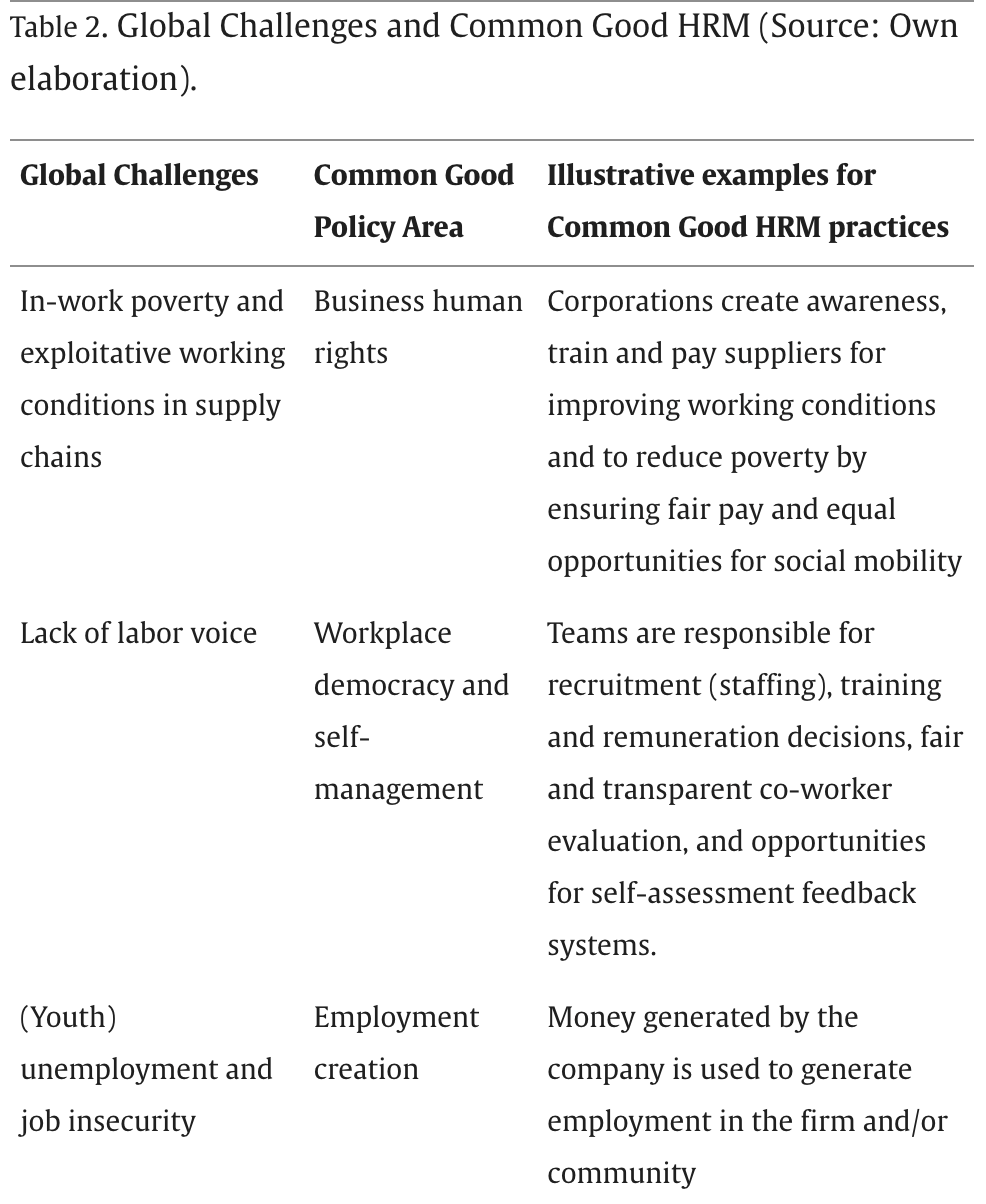

✨ I’ve long appreciated Prof. Dr. Ina A.’s work from her early research on trust to her later studies on sustainable HRM. But this paper, co-authored with Michael Muller-Camen and Brian Matthews, and building on the sustainability paradigm of Prof. em. Dr. Thomas Dyllick (emeritus professor at the University of St. Gallen), is the one I’d most love to recommend to all of you who are reimagining the future of work.
📘 In “Common Good HRM: A Paradigm Shift in Sustainable HRM?”, the authors leave the narrow logic of instrumentalism behind. They ask a bold (and in my opinion) the right question:
What if HR didn't just serve the company but truly served society?
Drawing from Dyllick & Muff’s business sustainability typology, they outline four types of Sustainable HRM and introduce a new fourth type: Common Good HRM, which reframes HR as a lever for social, ecological, and human flourishing.
🔍 A Quick Summary of Their Typology:
1️⃣ Type 1: Socially Responsible HRM
→ Focused on diversity, well-being, and safety but mainly to reduce reputational or legal risks. This approach treats social responsibility as an add-on to the core business model, not something that reshapes it.
2️⃣ Type 2: Green HRM
→ Promotes environmentally friendly behavior (e.g., green training, green bonuses), but framed as a business strategy. While it engages ecological issues, it still operates within a logic of cost savings, branding, or compliance.
3️⃣ Type 3: Triple Bottom Line HRM
→ Aims to balance people, planet, and profit. Yet this often leads to unresolved tensions and trade-offs. It opens space for dialogue and innovation, but frequently defaults to economic priorities in moments of conflict.
4️⃣ Type 4: Common Good HRM 🌍
→ A true paradigm shift: HR becomes a vehicle for solving grand societal challenges like inequality, climate change, and precarious work. Here, the purpose of the firm is redefined. And HR creates conditions for human dignity, democracy, and sustainability.
💡 What Common Good HRM Does Differently:
✅ Outside-in perspective: Begins with the needs of society, not just firm strategy.
✅ Human rights in supply chains: HR takes responsibility beyond company walls.
✅ Workplace democracy: Hiring, feedback, and compensation become shared responsibilities.
✅ Job creation as a purpose: Employment is not a cost but a value in itself.
One standout example: Sonnentor, an organic tea and spice company rooted in the Economy for the Common Good movement. Their HR approach includes hiring long-term unemployed and people with disabilities as a matter of principle, not charity. They deliberately avoid full automation, investing instead in manual, meaningful work that sustains local employment and human dignity.
🧭 This is for all of you who truly want to go further—who believe HR can be more than a function. It can be a practice of care, a force for justice, and a cornerstone of a future where humans, nature, and the economy flourish together.
📖 Link to article: https://www.sciencedirect.com/science/article/pii/S1053482218303917
01-07-2025

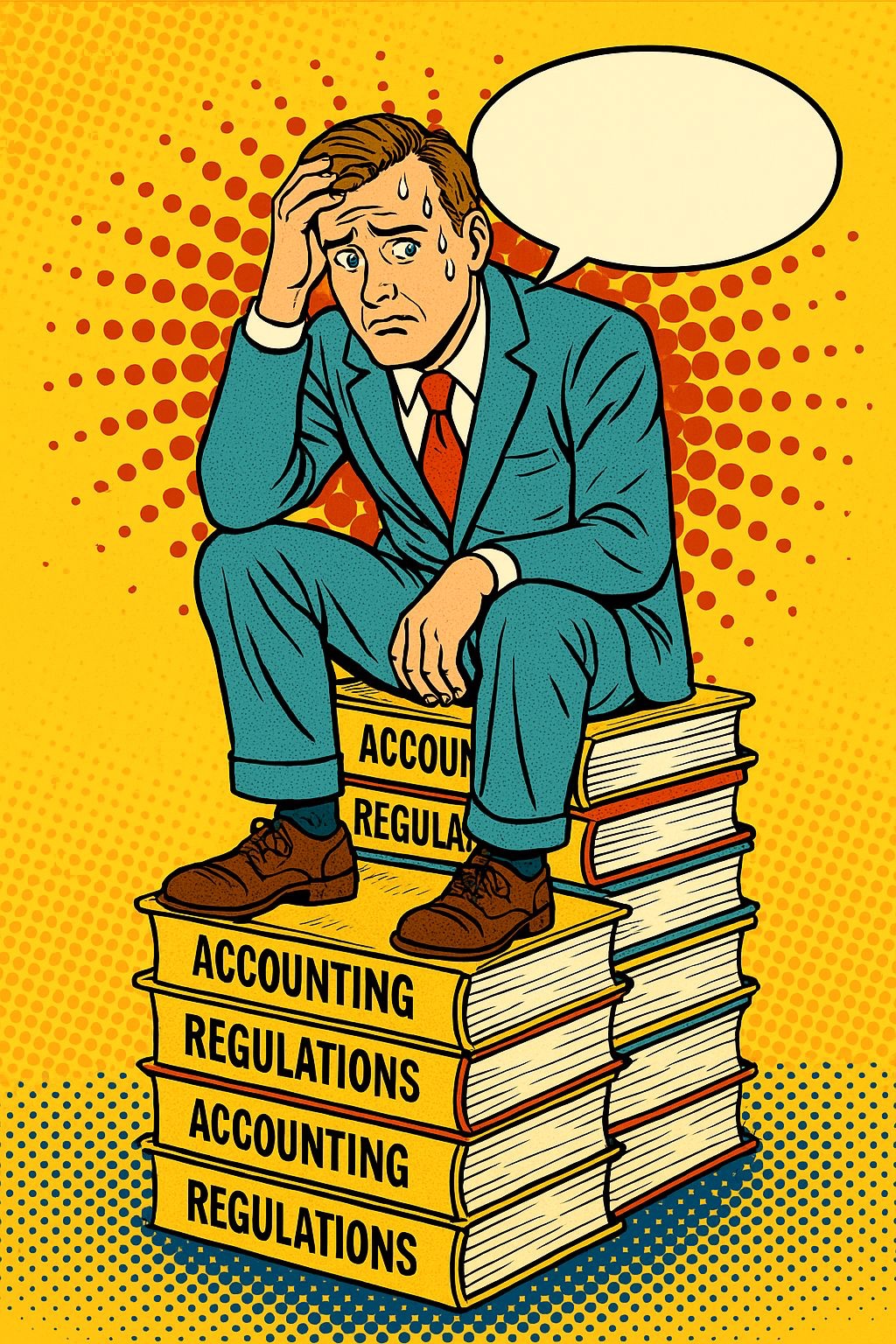

ESG: AGGREGATE CONFUSION
The ESG world is in disarray. A company celebrated as a sustainability leader by one rater may be labelled a laggard by another. This isn't a rounding error, this seems to be a structural confusion. And the consequences are far-reaching: for investors, firms, researchers, and regulators alike.
A recent paper by my colleague Julian Kölbel, together with Florian Berg and Roberto Rigobon, reveals the depth of this problem with empirical precision and conceptual clarity. In Aggregate Confusion: The Divergence of ESG Ratings (Review of Finance, 2022), the authors examine ESG ratings from six major agencies - KLD, Sustainalytics, Moody’s ESG, S&P Global, Refinitiv, and MSCI - and ask: Why do they disagree so much?
Their answer? It’s not just noise. It’s systemic.
THE PROBLEM
Correlations as compiled by other papers between overall ESG ratings range from 0.38 to 0.71 - far from reassuring. But it gets worse as their own analysis shows. At the category level, say, “climate risk management” or “labor practices”, correlations are often low, and sometimes even negative. That means one agency may rank a company high on, say, water management, while another gives it a low score on the exact same issue. This is not just divergence—it’s contradiction.
THE DIAGNOSIS
The authors dissect this chaos into three drivers:
🔶 Scope divergence (38%): agencies include different ESG issues.
🔶 Measurement divergence (56%): even when they look at the same issue, they assess it differently.
🔶 Weight divergence (6%): agencies prioritize issues differently.
The real "villain" here is measurement, i.e. the “how” of ESG, not just the “what” or “why”. Adding to the concern is a documented rater effect (15% of variation): agencies tend to rate firms consistently high or low across categories, suggesting subjective bias or organizational blind spots.
WHY THIS MATTERS
Such divergence weakens incentives for firms to improve, muddles investor decision-making, and undermines the legitimacy of ESG as a signal. It also limits our ability to link ESG to firm value, performance, or ethical behavior in academic research or policy frameworks.
THE WAY FORWARD
Berg, Kölbel, and Rigobon do not argue against ESG ratings per se. Rather, they emphasize the urgent need for:
🔶 Harmonized disclosure standards (like those under the CSRD),
🔶 A clear EU-wide taxonomy of ESG categories,
🔶 And greater transparency in how ESG data is generated and interpreted.
THE TAKEAWAY
If ESG is to live up to its promise, we need more than good intentions. We need clarity, consistency, and credibility. Otherwise, we create a system where opacity rewards those least committed to change.
📖 Full (open access) article here: https://lnkd.in/df38A34j
29-06-2025

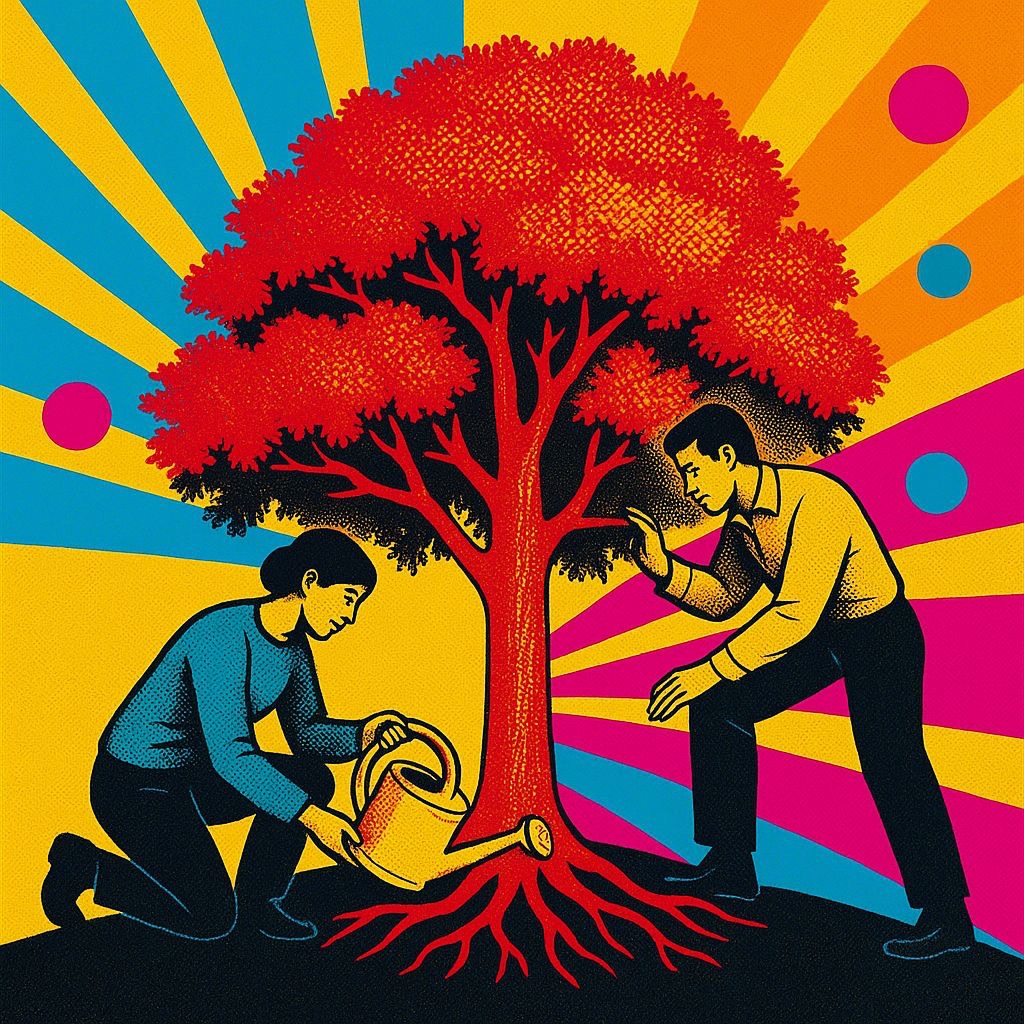

What would happen if we understood security not only as freedom from fear, but as a moral maturation environment?
👉 In the tradition of Lawrence Kohlberg, this is exactly what has been researched – under the term "Socio-Moral Climate" (SMC).
In an empirical study, Pircher, Verdorfer, Weber, Unterrainer & Seyr (2012) show:
Organizational democracy fosters a climate in which people feel not only safe, but also morally taken seriously, included, and called to account.
What characterizes such a climate?
1. Open confrontation with conflicts
2. Diversity of perspectives is recognised and discussed
3. Taking responsibility and care are encouraged
4. Participation in decision-making processes
5. Mutual respect and appreciation
Why is this important?
Because a socio-moral climate not only strengthens the thinking capacity, but also promotes the moral development of employees – and thus also the democratic resilience and ability to cooperate in the company.
And this is where Responsible Leadership comes into play:
Responsible leadership does not only mean making ethical decisions – but also creating ethical spaces. Spaces in which conflicts are not avoided, but thought through together. In which people are allowed to learn to be responsible instead of just "performing". (See also https://lnkd.in/d47BUwSC)
Leadership then does not mean control, but:
🧭 create the conditions for moral maturation
🤝 exemplify dialogical practices
🪞 see themselves as fellow learners
But: SMC is not a soft skill – it is a systemic construct! If you want to promote such a climate, you also have to rethink cooperation:
🔸 Enable participation in decision-making
🔸 Do not dampen conflicts, but work through dialogue
🔸 Valuing different points of view
🔸 Creating spaces where responsibility is shared
🔸 Understanding leadership as an enabler of moral development
Final Thought:
Psychological Safety is a start. But in a time of multiple crises, organizations need more than that. We need to take responsibility, the ability to be democratic, and the will to shape things together. This is exactly what promotes a socio-moral climate – if we take it courageously and systemically seriously.
📚 Source: Pircher Verdorfer, A., Weber, W. G., Unterrainer, C., & Seyr, S. (2012). The relationship between organizational democracy and socio-moral climate: Exploring effects of the ethical context in organizations. Economic and Industrial Democracy
27-06-2025



In my last post, I explored Dirk Matten’s idea that fascism isn’t just a political regime but that it’s a managerial ideology: one that promises to solve social problems through control, order, and depoliticised administration.
But these ideologies don’t emerge in a vacuum.
To understand where they flourish today, we might want to turn back to a paper that examined the so called Californian Ideology - a cultural fusion of three unlikely figures: the hippie, the nerd, and the libertarian.
In the 1990s, Barbrook and Cameron (https://lnkd.in/d2XcH4nd) showed how Silicon Valley combined countercultural dreams, hacker ethos, and free-market zeal to produce a seductive narrative: technology would liberate us but of course only if the state stayed out of the way.
At first, it had utopian qualities. An electronic agora. Radical decentralization. Liberation through connectivity.
But underneath, the contradictions ran deep.
♒ The hippie brought dreams of freedom but soon swapped collective struggle for lifestyle individualism and egocentric yoga optimisation.
⚛️ The nerd brought curiosity and code but ended up building monopolies and surveillance empires.
🗽 The libertarian brought suspicion of authority yet sanctified the market as a new form of domination.
Together, they built an ideology that promised individual empowerment, while ignoring the systemic exclusions on which that freedom depended: racialised labor, digital redlining, and public infrastructure built through collective sacrifice.
As inequalities deepened, the ideology had no answers. It had already deleted the concept of society.
And here - already in the 80ies enter the “angry white male.” As Barbrook and Cameron foresaw, this culture slid easily into reactionary politics. Tech elites sided with Gingrich, celebrated deregulation, and distanced themselves from “undeserving” populations. Libertarian dreams gave way to gated platforms, encrypted currencies, and post-human fantasies of transcendence.
The result? A techno-culture that preaches liberation while managing populations, enforcing fragmentation, and calling it “innovation.” This is where Matten’s fascist managerialism finds its first life. When contradiction is surveilled and manipulated rather than addressed, when freedom is reserved for the few, when code replaces law and efficiency trumps justice. We don’t get a revolution. We get a digitised restoration.
And its prophets still think they’re rebels.
But the funny thing is that the authors put their hope in Europe - as the place with a social democracy, with a democratic culture, with an understanding of egalité and fraternité and not only liberty. Will Europe finally accept the call and step into the "Schlamassel" - speak up, stay with at least some solidarity? Or will we have these tech bros letting to take over?
26-06-2025



What if fascism isn’t just a relic of history but a live ideology re-emerging in today’s management culture?
In a provocative new paper (https://lnkd.in/dtEas_Uv) Dirk Matten argues that while today’s tech elites aren’t overt fascists, their style of leadership, treatment of stakeholders, and view of the future eerily echo fascist ideology: strongman authority, glorified purpose, contempt for democratic messiness, and the fusion of power with moral destiny.
This isn’t just about bad people. It’s about the ideological structure of management itself.
For much of the 20th century, corporate governance was shaped by liberal-democratic ideals—balance, professionalism, stakeholder negotiation. But Matten shows that these ideals have eroded. Late-stage neoliberalism didn’t just replace democracy with markets and it made way for a new logic: visionary founders as sovereigns, answerable only to their mission.
🔹Elon Musk: “When I ask for something, you fucking give it to me.” Authority becomes destiny.
🔹Peter Thiel: “Competition is for losers.” Stakeholders become means to an end.
🔹Mark Zuckerberg: Society, he says, is “neutered”—we need more masculine energy.
🔹Marc Andreessen: “Everything good is downstream of growth.” Tech becomes moral compass.
Matten’s argument is clear: these companies don’t just shape the economy. They embody and spread a new moral order, one that romanticizes hierarchy, suppresses pluralism, and rebrands domination as innovation.
And this is not a sideshow; it’s mainstream. In VC circles, TED stages, and founder cults, we see a management style that is charismatic, anti-political, and aggressively utilitarian. When power wears a hoodie and calls itself “disruption,” it becomes harder and not easier to question.
🧭 Still, Matten’s critique isn’t flawless. It doesn’t fully address the contradictions within progressive liberalism or the ways other management ideologies contribute to the current moment. The risk: overplaying one dark pattern while underexamining others.
But his core question remains essential:
If management always embodies ideology - then whose ideology is winning?
Link to article: https://doi.org/10.1037/a0034515
25-06-2025

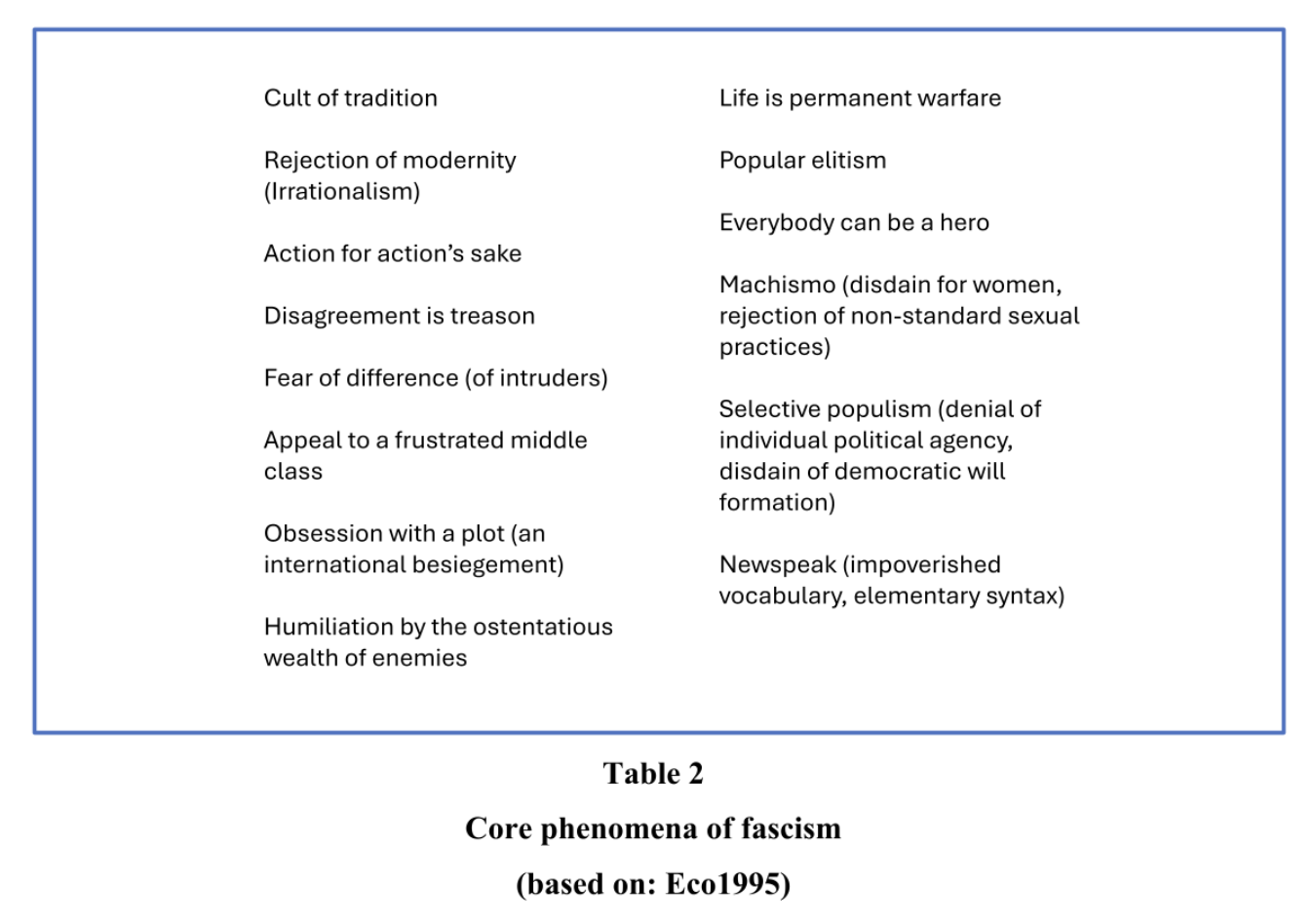

In his provocative and well-argued paper Fascism as a Management Philosophy, Dirk Matten makes a daring claim: fascism is not just a political danger of the past: it is resurfacing today through corporate leadership, especially in Silicon Valley. Drawing on Robert Paxton’s five-stage model of fascist movements, Matten argues that corporations today exhibit several defining features of fascism in their organizational and moral logic. The central thesis is not that companies are becoming fascist regimes in the classical sense, but that they increasingly mirror fascism’s philosophical core: the glorification of strongmen leaders, the instrumentalization of people for mission, the rejection of pluralism, and a faith in technology and destiny over democratic deliberation. What emerges is not just a critique of individual CEOs or practices, but a powerful narrative of how contemporary capitalism may be incubating forms of authoritarian moral order. This is a sober reflection on how corporate ideology is shifting from pluralist ethics to technocratic power.
Matten illustrates this by identifying four domains in which fascist logic has crept into management:
1️⃣ Leadership Styles: Fascist leadership thrives on personal charisma, central authority, and the silencing of dissent. Elon Musk has cultivated exactly such a persona. He has called himself a “nano-manager,” fired employees for questioning him, and famously tweeted: “When I ask for something, you fucking give it to me.”
2️⃣ Stakeholder Relations: In fascist logic, people exist to serve the mission. Peter Thiel expresses this instrumental view bluntly: “Competition is for losers… monopoly is the condition of every successful business.”
3️⃣ Patriarchy and Disdain for Minorities: The rejection of pluralism also manifests in gender and race dynamics. Mark Zuckerberg once claimed:
“Society has become neutered… we have embraced feminine energy too much.”
4️⃣ Mystification of Technocapitalism: Where fascism mystified the nation or race, today’s technocapitalism mystifies the company. Marc Andreessen’s Techno-Optimist Manifesto declares:
“We believe everything good is downstream of growth.” The corporation becomes a sovereign actor, animated by destiny, not bound by democratic oversight.
One word of Caution: Matten’s paper is a powerful and convincing critique of authoritarian drift in Silicon Valley. Yet, in highlighting the shadows of management, it sometimes flattens the landscape overlooking the pluralism within other leadership philosophies and avoiding a deeper critique of progressive liberalism’s own blind spots. Still, it is a timely and necessary provocation- one that forces us to ask not just where leadership is going, but what moral orders we are building along the way.
Link to article: https://papers.ssrn.com/sol3/papers.cfm?abstract_id=5203477
24-06-2025



In an open letter in the Guardian, 31 Nobel laureates and hundreds of intellectuals warn of the return of fascism. Her words are clear:
"The threat of fascism is back – and it is growing on the fringes as well as in the centers of world politics. Silence is no longer an option."
It is a rare but necessary moment: people whose authority is based on knowledge use their voice – not for reputation cultivation, but for public responsibility! (see here: https://lnkd.in/dHgU4KV5)
France stands for the tradition of the intellectuel engagé – the morally speaking individual who takes sides on principle. With J'Accuse, Émile Zola opposed anti-Semitic state arbitrariness in the name of universal justice. Simone de Beauvoir publicly fought for equal rights and against patriarchal structures with language that defended human rights, not relativized them.
In the USA, a different tradition was formed: resistant pragmatism. Cornel West speaks from an experience that is not abstract, but historically wounded – he calls America's betrayal of its promises by its name. Judith Butler defends the dignity of vulnerable bodies against state control as a critical corrective to the liberal order (for the differences, which sometimes lead to misunderstandings, see below).
We are living in a time of moral tests: in Gaza, in Ukraine, in the election campaigns of Western democracies. What unites these moments is not only violence, but the supposedly ideological gutting of public language. Euphemisms replace analysis. PR replaces attitude.
But right now, intellectuals are needed – not as experts, but as consciences. They have to name the cracks that produce systems. They must be allowed to be uncomfortable.
After all, we are not in a crisis of knowledge. We are in a crisis of courage.
What we need is not more content. But more conscience.
23-06-2025

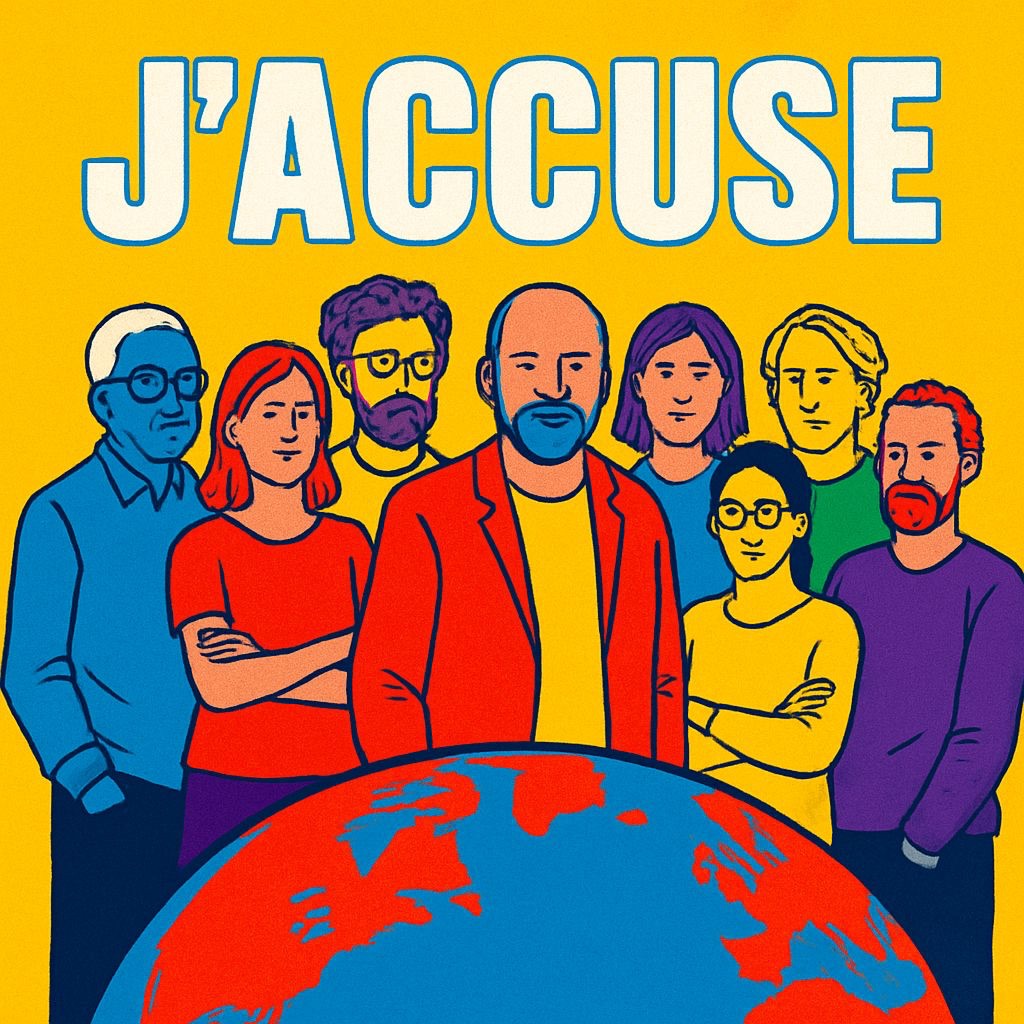

We need the return of the intellectuel engagé; and we need them now.
The French tradition of public intellectuals once held the powerful to account with unflinching moral clarity. Zola’s J’ACCUSE was not a tweet, no it was an act of moral risk. Sartre, de Beauvoir, Foucault, Bourdieu - these thinkers refused silence in the face of injustice, from colonial violence to state repression to neoliberal atomization. They didn’t sell frameworks. They stood firm, even when unpopular.
William James, across the Atlantic, offered a different but equally vital model: the pragmatist intellectual. He warned against “bigness”, i.e. systems that flatten conscience, ideologies that smother experience, institutions that demand loyalty over truth. His heirs include thinkers like Cornel West, who names American imperialism and racism for what they are; Danielle Allen, who works to restore civic trust; Judith Butler, who defends the precarity of life against the rhetoric of control; and Martha Nussbaum, who brings emotional and ethical depth to public reasoning.
Today, when authoritarianism no longer hides, we see both traditions reawaken.
In moments of rupture - think of Trumpism, Gaza, Modi’s India, democratic erosion across Europe -hundreds of scholars and 31 Nobel laureates recently signed a joint letter in The Guardian warning that “the threat of fascism is back.” Among them: Timothy Snyder, Jason Stanley, Masha Gessen, Eric Maskin, Barry Marshall, Daron Acemoglu. These are not consultants or pundits; they are thinkers who name danger when others euphemize it. They remind us that intellectual life is not an academic exercise. It is a form of resistance.
And yet, in this urgent hour, the dominant platforms of business ideas remain silent. Thinkers50, the self-proclaimed “Oscars of Management Thinking,” is a prime example. It elevates voices that optimize organizations, not confront them. Its model rewards performance, clarity, and scalability, but not contradiction, dissent, or moral inquiry. While democracy burns, it celebrates “thought leaders” who sell productivity hacks, culture decks, and agile mindsets. You will find no Timothy Snyder, no Masha Gessen, no Édouard Louis on their lists. Why? Because their ideas are not marketable. They are uncomfortable.
The problem isn’t that Thinkers50 and others promote mediocrity. Rather they promote compliance with power. It thrives on frameworks that assume neutrality in the face of structural injustice. It does not ask what kind of world we are managing as it simply tells us how to manage it better.
We are not in a crisis of intelligence. We are in a crisis of courage. Let’s stop mistaking visibility for virtue. Let’s demand more from our thinkers - because the stakes are no longer theoretical.
Link to article: https://www.theguardian.com/commentisfree/2025/jun/13/nobel-laureates-fascism
22-06-2025

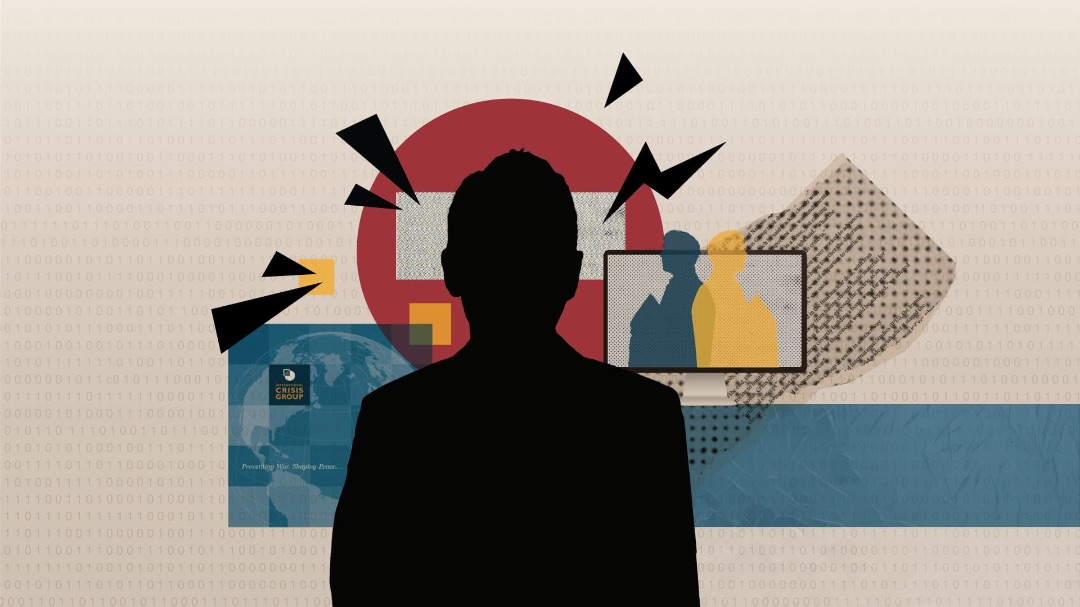

Why does misinformation remain so dangerously effective even when disproven? Lewandowsky et al.’s review (👇deep dive) into the psychology of misinformation offers a chilling answer: humans prefer a false story over an incomplete truth. If a claim provides narrative closure - like weapons of mass destruction justifying war - its retraction often fails to change beliefs unless a more coherent replacement is offered. Corrections without alternatives leave cognitive voids. And when misinformation aligns with identity, emotion, or fear, it becomes even stickier, surviving in memory long after facts have been clarified.
To counter this, the authors identify four essential strategies:
① replace myths with full alternative explanations;
② inoculate audiences early against manipulation;
③ use credible, trusted sources; and
④ frame corrections without attacking worldviews.
It’s not enough to “debunk.” Corrections must be better stories, ie. timely, human, and explanatory. Without this, the “continued influence effect” dominates public reasoning and history repeats.
This morning, President Trump released a memo warning that Iran is “racing toward nuclear warheads.” No fresh evidence was presented just recycled language. In contrast, IAEA Director-General Rafael Grossi reiterated this week that Iran’s programme remains under international safeguards, with no confirmed weaponisation. The juxtaposition is stark. A politically charged claim, dropped in the heat of a campaign. A scientific body, issuing a measured, evidence-based report. Two stories competing for narrative dominance. Not taking sides here just observing how the terrain is being shaped.
We’ve walked this path before. The Gulf of Tonkin “attack” that justified Vietnam. The invented story of Kuwaiti babies taken from incubators before the Gulf War. The “smoking gun” of Saddam’s imaginary WMDs. Each episode, a turning point. Each driven by emotionally potent but factually fragile claims. Corrections came but far too late to prevent war.
Which raises urgent questions: How should the press respond when emotionally compelling misinformation surfaces again? What duty do other Western governments have when narrative asymmetries shape global sentiment? Can science-led institutions like the IAEA proactively communicate before political storytelling dominates the stage? And most importantly who will write the stronger, truer story first?
Link to article: https://doi.org/10.1037/a0034515
19-06-2025



…but without it, everything gets harder.
That might sound like a commonplace after three days of deep dives into trust research but it’s the insight I take home with most conviction.
Two moments struck a particular chord.
First, our symposium on vulnerability. Andrea Piccaluga opened with examples of regenerative entrepreneurship: businesses that start from vulnerability - whether personal, social, or structural - and turn it into a site of innovation. Entrepreneurs who design solutions inspired by their own struggles or those of people they love. Companies that create dignified work for people whose lives began with fewer options.
But here’s the catch: this kind of regeneration only becomes possible when we trust the vulnerable and when the vulnerable trust that their dignity will be honored. We need more of this kind of entrepreneurship. The world would be better for it.
Second, a set of insights on distrust. It’s easy to talk about trust. Harder to really engage with how distrust unfolds and how it might be reversed. Several colleagues Frédérique Six and Tiziana Gaito showed that once distrust takes root, it operates in insidious ways: self-reinforcing, relationally corrosive.
And yet, it can be brought to the point where at least listening and talking becomes possible again, at least before it calcifies into protracted conflict. But it requires:
💡trusted third parties
💡serious reflexivity
💡humility from those in power
💡and often invisible backstage work long before official dialogue resumes.
All this made Trump’s “deal-making” approach to geopolitics look even more dangerously naive 🙈.
So yes, trust research matters - a lot. But research alone won’t cut it. We need to get our hands dirty in practice. Only then can trust insights become not just interesting, but transformative.
16-06-2025

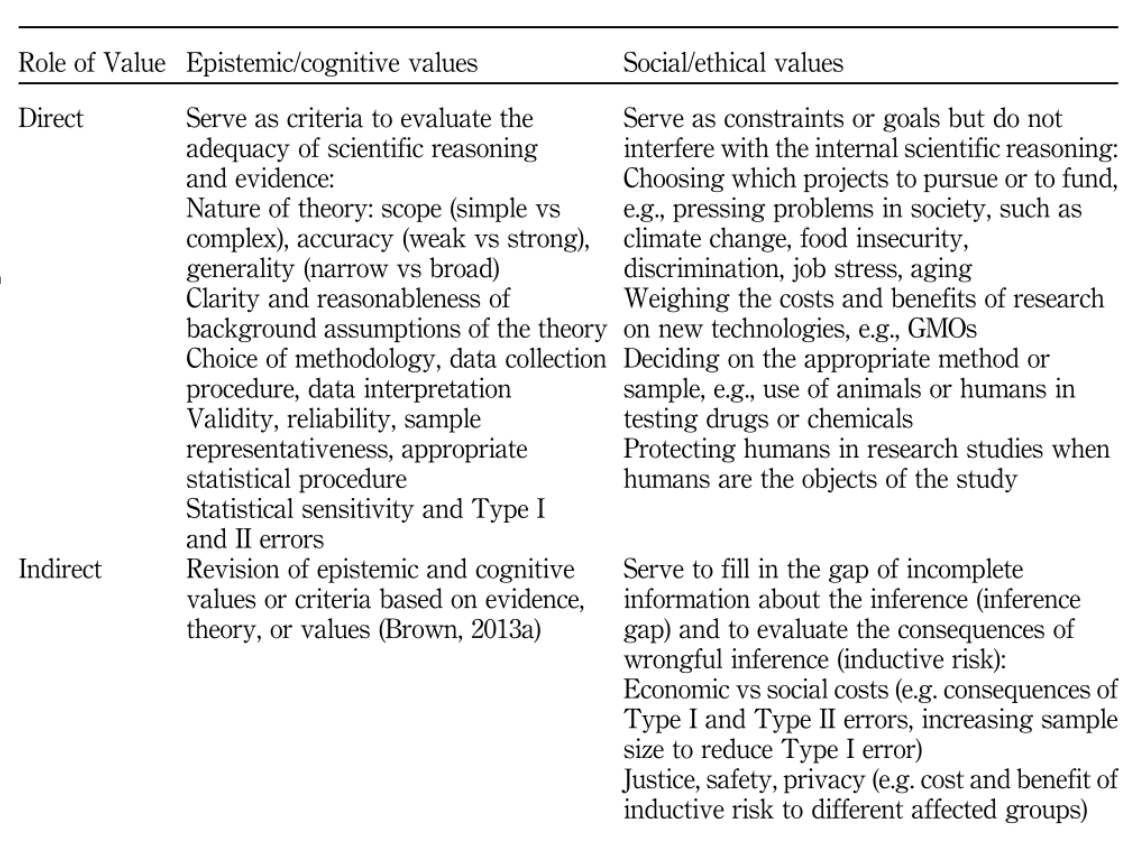

Anne Tsui’s landmark essay 👇 exposes a silent flaw in (business) research: the enduring belief that science can, and should, be “value-free.” This ideal claims that scientists should pursue only epistemic values like objectivity and validity, keeping moral or political concerns out of their work.
But Tsui shows this is both unrealistic and harmful. In social science, epistemic values themselves are socially and politically shaped. What counts as a valid method, a relevant theory, or a publishable finding often reflects academic norms, career pressures, and journal tastes - not just scientific logic.
Crucially, Tsui highlights inductive risk: every research decision involves a risk of error, and errors have real-world consequences. Choosing to avoid one type of mistake over another (e.g., falsely claiming a CEO pay model works) isn’t neutral. Rather it reflects implicit social judgments.
This brings her to a paradox in business schools: while they claim to seek both rigor and relevance, they often reward neither. Research tends to serve academic prestige rather than social purpose. Peer review punishes novelty. Theory is fetishized over problem-solving. And flawed theories - like agency theory - get normalized despite evidence of harm.
Tsui calls for a shift: Responsible Science. She outlines four reforms:
1️⃣ Choose problems worth solving, not just gaps in theory.
2️⃣ Conduct research with both epistemic and social care—acknowledge risks and consequences.
3️⃣ Publish for impact, not prestige.
4️⃣ Reform peer review to make hidden values visible.
Her call is simple but radical: science must be both rigorous and responsible. Not neutral, but honest. Not insulated, but accountable.
“We cannot afford to pursue rigor without relevance, nor knowledge without conscience.”
My take? “Normal science,” which runs smoothly when the system runs smoothly, reveals its fragility when that system is being abused. If I study trust but fail to show how trust can be manipulated, or if I write about psychological safety but never ask if it's just virtue-washing, then my research, and my thinking, becomes a slave to power. At minimum, we need more reflexivity. But ultimately, I believe science must serve the greater good. And sometimes, that means speaking not just with clarity, but with courage: truth to power.
Link to article: https://doi.org/10.1108/CCSM-08-2015-0101
12-06-2025

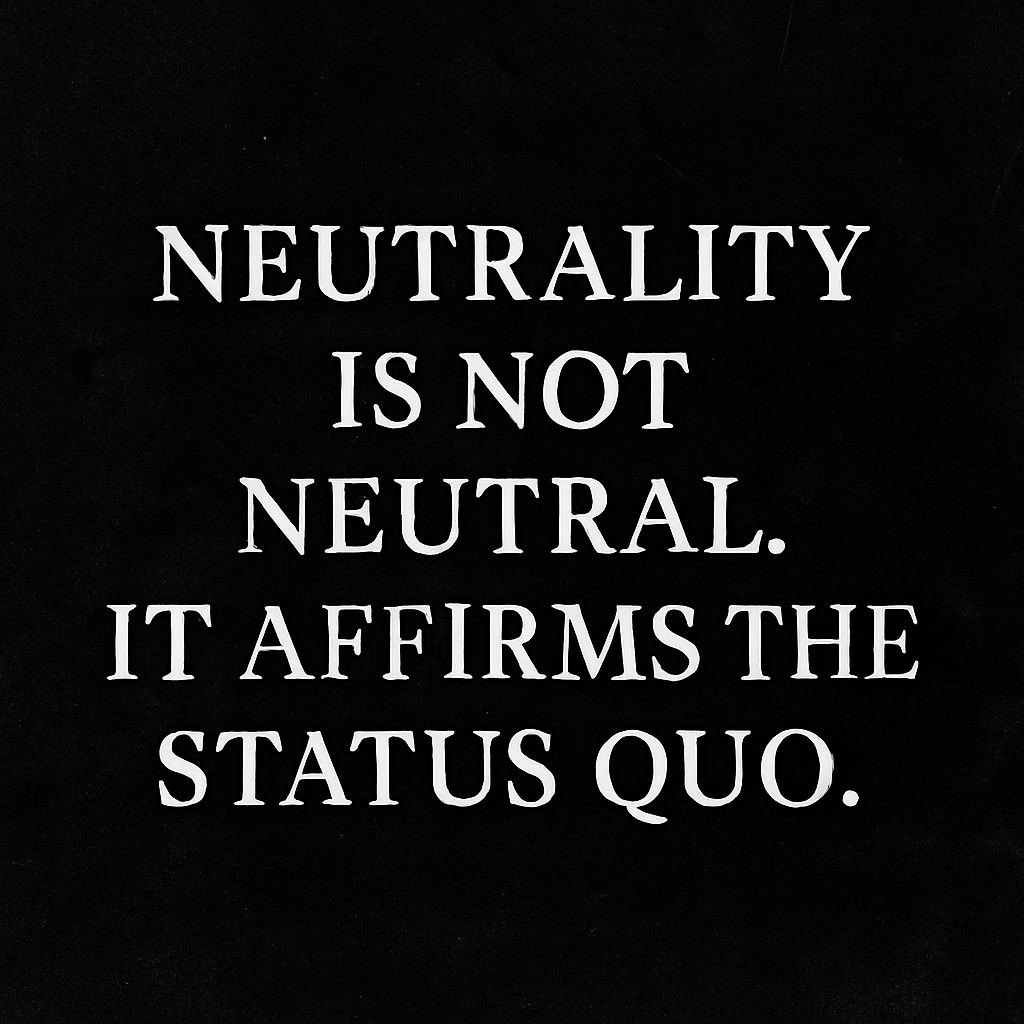

TRUST IS NOT NEUTRAL — AND NEITHER IS TRUSTWORTHINESS
I’ve often heard: „Even the mafia has trust.” So: should trust and above all trustworthiness be morally neutral? Is there really no difference between trusting Trump and trusting Mother Teresa?
Some of our most-used models seem to suggest that. Mayer, Davis & Schoorman’s influential framework defines perceived integrity as “the perception that the trustee adheres to a set of principles the trustor finds acceptable.” In other words: if I think you follow principles I approve of, you’re trustworthy; regardless of what those principles actually are.
This reduces trust to value congruence and trustworthiness to alignment, not ethical quality. No reflection on whether those values are just, inclusive, or life-affirming.
Why does this persist? Maybe because it keeps trust research within the bounds of a liberal paradigm - one that avoids taking a stance on what counts as good or just. But that neutrality is not innocent. By avoiding substance, we legitimize systems that reward performance over principle, utility over virtue.
And there is a cost.
When trust is defined without ethical reflection, we risk flattening important distinctions. We may end up treating instrumental alignment as equivalent to moral integrity. This can obscure how trust functions differently in democratic institutions, exploitative regimes, or purpose-driven organizations. Over time, such minimal definitions make it harder to hold individuals and systems accountable to more than efficiency or loyalty.
But we have alternatives — thinkers who anchor trustworthiness in moral depth:
🔹 Annette Baier reminds us that trust is moral because it involves vulnerability — and trustworthiness means responsibility toward the other’s dependency.
🔹Bernard Barber links trust to social roles and moral obligations, arguing that professions must act with integrity, not just competence.
🔹Robert Solomon sees trust as an emotional-moral commitment, grounded in authenticity, not mere calculation.
🔹Onora O’Neill insists that trustworthiness comes from honesty, competence, and respect for others’ autonomy - a Kantian standard that binds.
🔹Luigino Bruni calls for a relational economy, where trust is rooted in reciprocity and gratuitousness, not strategic alignment.
These views don’t shy away from moral philosophy. They deepen our understandings about trust. They re-moralize it.
So let me ask: If we want a society worth trusting, shouldn’t we start by redefining what makes someone trustworthy? What would it take for trust to be not just useful but just?
10-06-2025

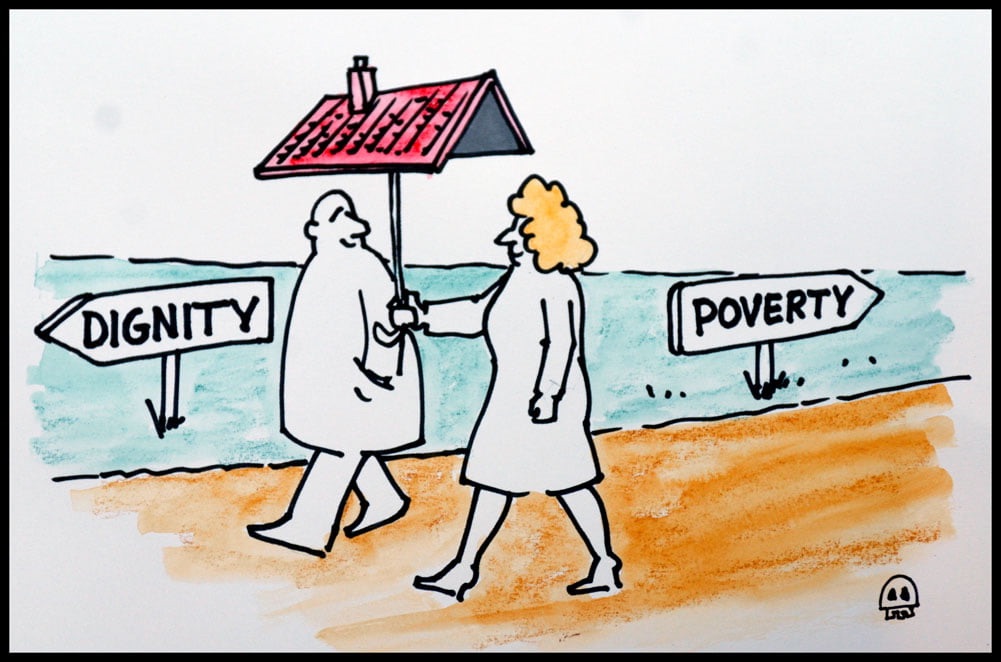

DEEP DIVE: teaching on poverty
Why is poverty still missing from business education? It’s not just an oversight. It’s an ethical failure.
Poverty is treated as a marginal topic in most business schools and if addressed at all, it’s buried under “CSR,” “sustainability,” or framed as a charity case.
But poverty is not peripheral to business. It is a systemic outcome of how global markets are structured, managed, and legitimized.
So why the silence?
Because confronting poverty means confronting uncomfortable truths:
😤That many business models depend on low-cost labor and regulatory arbitrage.
😤That shareholder primacy often rewards value extraction from the vulnerable.
😤That the global economy produces poverty, even as it claims to fight it.
This isn’t just a blind spot. It’s a value choice. We’ve built a curriculum that can track consumer behavior to the millisecond but can’t explain why billions remain economically excluded.
📚 This post draws on an article by Mark Neal (2017), who argues that we must place poverty at the heart of management education; not as a moral add-on, but as a lens to understand business itself.
Here’s how:
Teach business students to:
💡Analyze corporate involvement in poverty—as both creator and potential alleviator (e.g. FDI in Vietnam).
💡Debate the ethics of microfinance—is it empowerment or institutionalized debt?
💡Interrogate the “Bottom of the Pyramid”—are we meeting real needs or marketing dependency?
This isn’t about virtue signaling. It’s about pedagogy and power. If we don’t teach students how business intersects with poverty, we’re graduating leaders unfit to govern in a world of inequality.
🧭 Poverty is not a niche topic. It’s the mirror business education avoids.
Time to look in. And it might save democracy too.
Link to article: https://www.jstor.org/stable/26400164
08-06-2025



Sunday Musings: Business Schools and Poverty
A colleague made me pause. She shared that for their Grand Challenges conference, a significant number of papers addressed environmental crises. Some explored the neglect of human rights in global value chains. But very few tackled poverty. And a quick search on google scholar revealed that this was true for our larger research on management science too.
Even fewer asked the hard question: how do corporations, especially large ones, exacerbate or alleviate poverty? Not only in less industrialized countries, but right here, in industrialized economies. How do corporate decisions widen inequality or build more inclusive job markets? How do they generate either extremely well-paid or precariously underpaid work? How do their hiring practices either open or close the door to workforce participation for people with fewer resources? And how does tax optimization - let’s call it what it is, legal avoidance - drain the very state budgets meant to reduce poverty?
It’s a strange silence. Because how can we expect people struggling to pay rent or put food on the table to care about climate, AI ethics, or biodiversity loss if they’re barely surviving?
And if business students never engage with the full picture, if they never learn how business decisions shape the economic conditions of the poor, how can they be expected to design the novel, systemic solutions we so badly need?
Of course, business schools are driven by rankings. And rankings have, in fairness, nudged us toward better environmental and sustainability metrics. But on poverty, they remain largely mute. And as usual we have not really taken the intiative from our side (McKinsey did not consult us to 😉.
Maybe it’s time to leave the ivory tower and take a hard look around. Even in our own countries, the numbers speak volumes:
😡In the UK, roughly 1 in 5 people (22%) live in relative poverty after housing costs.
😡In the EU, around 95.3 million people (21.6% of the population) were at risk of poverty or social exclusion in 2023.
😡In Switzerland—one of the wealthiest countries on Earth—more than 720,000 people (8.5%) live in income poverty, and over 13% are at risk of social exclusion.
These are not edge cases. This is the systemic underside of the economies we teach our students to manage.
Poverty isn’t someone else’s problem. And it’s long past time we taught it that way.
07-06-2025

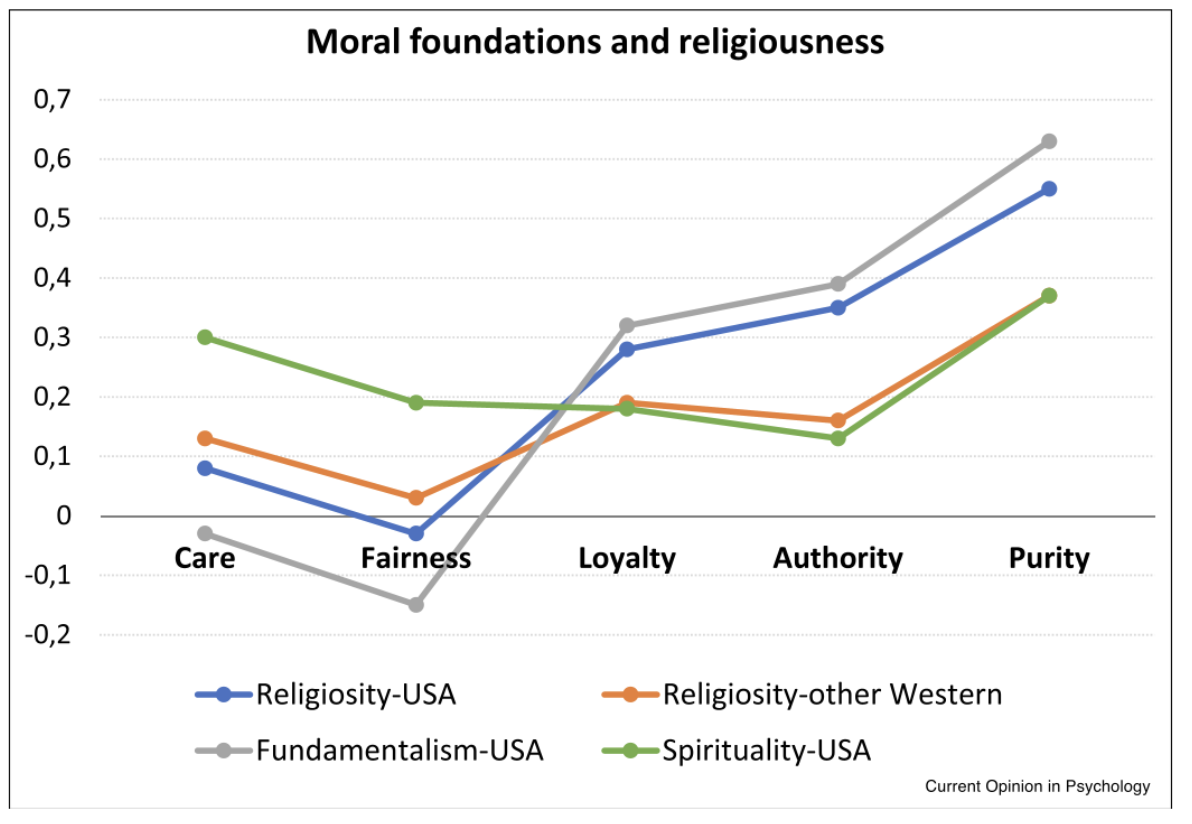

THE MORAL PSYCHOLOGY OF U.S. CONSERVATISM—AND ITS THEOLOGICAL ROOTS
I am still trying to make sense of how the current US executive can call themselves deeply religious and at the same time behave so mercyless towards those outside their (rather narrow) moral circle of concern. So: Why does today’s U.S. right-wing moral discourse emphasize purity over justice, loyalty over care, rule-following over consequences?
A meta-analysis by Saroglou & Craninx (2021) offers clues.
Synthesizing dozens of studies, they show that religiosity is strongly associated with:
👉 Loyalty (group cohesion and allegiance)
👉 Authority (deference to tradition and hierarchy)
👉 Purity (avoidance of moral and social contamination)
And only weakly linked to:
👇 Care (sensitivity to suffering)
👇 Fairness (equity and justice)
Religious individuals also tend toward rule-based (deontological) morality, even when it leads to harm. “Spiritual” individuals, by contrast, align more with fairness- and compassion-based ethics.
But of course this begs the questionof what kind of religion is being measured here? Though the paper treats religiosity as a general category, what it captures is likely the moral psychology of Protestantism, especially in its Calvinist-Puritan form in the U.S.
As Michael Walzer (via Charles Taylor) argues, Puritanism was born from a profound horror at disorder in both social (vagabonds, beggars) and personal (licentiousness, idleness) areas. Its remedy was a disciplined, self-governing elite: individuals whose visible conduct., i.e. steady work, self-restraint, moral rigor, signaled inner regeneration. The resulting order was not liberal democracy, but a covenantal hierarchy between the regenerate and the unregenerate. The former ruled themselves through moral discipline and mutual admonition; the latter were to be ruled coercively if needed. In this framework, purity functioned as a moral boundary, loyalty as a test of belonging, and authority as the expression of earned moral standing. Care and fairness were largely reserved for those within the elect community; echoing today’s findings.
This makes the paper empirically insightful but ontologically and politically naïve. It treats “religion” as a monolith, failing to distinguish between divergent ethical traditions based on different religions, for instance Catholic social teaching, Jewish covenantal justice, Islamic mercy ethics, or Buddhist compassion.
Hence it seems that we might not need less religion in politics. But that we must ask: Which religion? Which morality? Which politics? And how do they interlink? At the very least we should ask this in research before we come to such rather sweeping "said-to-be" causalities.
Link to article: https://www.sciencedirect.com/science/article/abs/pii/S2352250X20301834
06-06-2025



🔍 What if the biggest problem with our politics isn’t partisanship but our imagination?
Charles Taylor taught us that every society lives within a social imaginary: not just a set of theories, but a felt understanding of how life fits together: who we are, what we owe one another, and what institutions are for. It’s the cultural “background hum” that shapes both identity and institutional design.
For decades, that background has been one of neoliberalism: a social imaginary of the autonomous individual, free to choose, compete, and consume. It has shaped us from toe to head: from the language of self-optimization to the structure of our economies and governance. But it has also eroded social bonds, hollowed out institutions, and left many isolated and precarious. It rendered many societies prey to new authoritanism and populism - because of the (so) many loosing out*, no solidarity left and the fantasm of "it is all your own fault".
🌀 In an interesting, Marcia Pally and Adrian Pabst offer an alternative: a social imaginary of the commons.
Rather than choosing between individualism or collectivism, they propose an ontology of “separability-amid-situatedness.” We are distinct, but never disconnected. Identity is not self-made, but co-constituted. It is formed in webs of care, place, infrastructure, and mutual recognition.
And just like the neoliberal imaginary shaped institutions built for competition and extraction, this relational imaginary could inform institutions designed for reciprocity, resilience, and repair.
🌱 But how do we get there? Here are their thoughts:
“Accounting for separability and situatedness together requires not an economic or legal codex but a process of reciprocal consideration, of seeing and seeing to the networks of relations and physical infrastructures that inform individual identity and broad-based opportunity.”
And it starts with a politics of formation:
“The task of politics is to ask: do societal arrangements cultivate among the citizenry, its leaders, and the next generation an understanding of our interdependent, reciprocal situation? Do institutions… provide the means for economic development, problem-solving, and decision-making based on the inter-dependence of those involved?”
This is more than policy: it’s a transformation of what we value, how we educate, how we govern, and who we become.
*approximately half of the US have very low literary skills (read border to functional analphabetism according to a Gallup study), and according to LISEP around 25% are considered to be functionally unemployed which includes those who earn a wage which leaves them under the poverty line).
05-06-2025

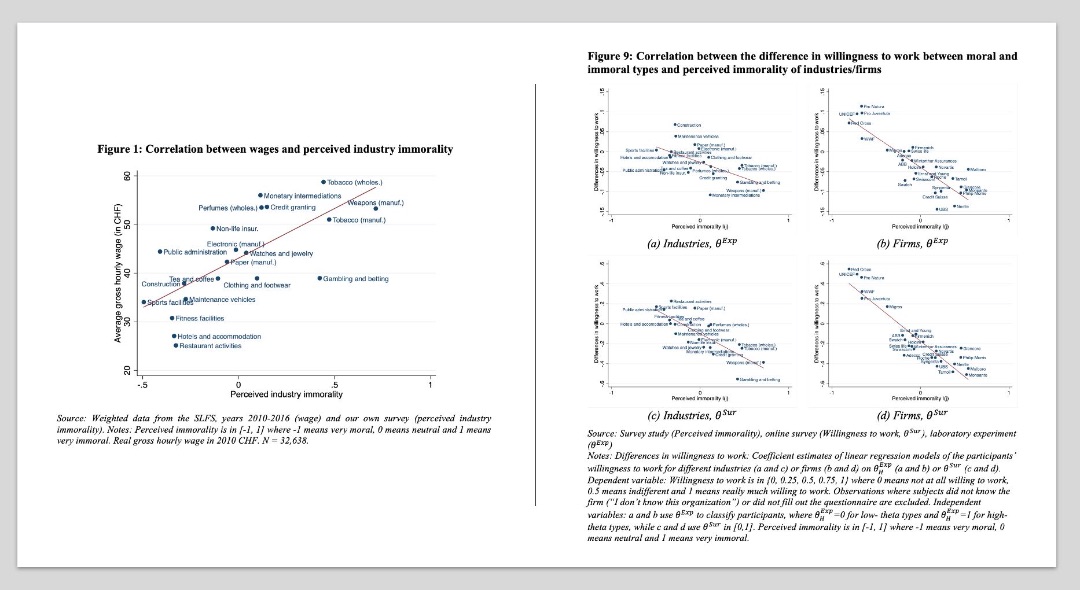

WHEN HARMFUL JOBS PAY MORE—AND ATTRACT THE WRONG PEOPLE
New research (see in the comment Schneider and colleagues👇) challenges the idea that labor markets are morally neutral. It shows that industries like tobacco, gambling, or arms don’t just offer higher pay because the work is unpleasant. Rather they offer more because the jobs are morally tainted. Most people need extra money to justify doing them. But crucially, those who don’t need that justification, those with low moral aversion, are also the ones most likely to take the job.
The researchers test two key hypotheses:
👉 Immorality Premium – immoral jobs pay more to compensate for moral discomfort.
👉 Moral Sorting – people who care less about morality are more likely to accept these jobs.
They back this up with four studies:
🧪 Study 1: Swiss labor market data show that industries perceived as immoral systematically pay more, even after controlling for education, occupation, and firm size (see figure 1).
🧪 Study 2: In a lab experiment, participants accepted harmful tasks (e.g., misleading others) only when paid more. People with low moral sensitivity were significantly more likely to accept.
🧪 Study 3: Survey data showed a stark sorting effect, i.e. those with higher moral aversion avoid working for immoral firms and industries (see figure 9 - and zoom in as it is also interesting to see what students saw as immoral).
🧪 Study 4: An external validation confirmed that the “immoral” job used in the lab caused real harm and was judged as such by neutral observers.
The most disturbing insight: the people most willing to work in harmful sectors are the ones least likely to challenge them from the inside or to excercise prudence in difficult situations (think about the weapons industry for instance). Where we need moral courage, we find moral indifference.
This creates a self-reinforcing cycle: Immoral jobs pay more → attract the least ethically sensitive → repel those who care → reinforce the culture of harm. It’s not just about incentives. It’s about who’s left standing in the room when things go wrong.
What can we do?
💡 Reward moral work. Roles in care, education, and responsible governance are undervalued but vital. Let’s recognize and reward them both financially and socially.
💡 Tell better stories. Highlight those who say no to unethical work or exit harmful companies. Make moral refusal visible.
💡 Renew the license to manage. Just as law and medicine require ethical certification, morally hazardous leadership roles should demand competence in ethics and responsibility (Otti Vogt).
We say leadership is about character. Time to design for it.
03-06-2025

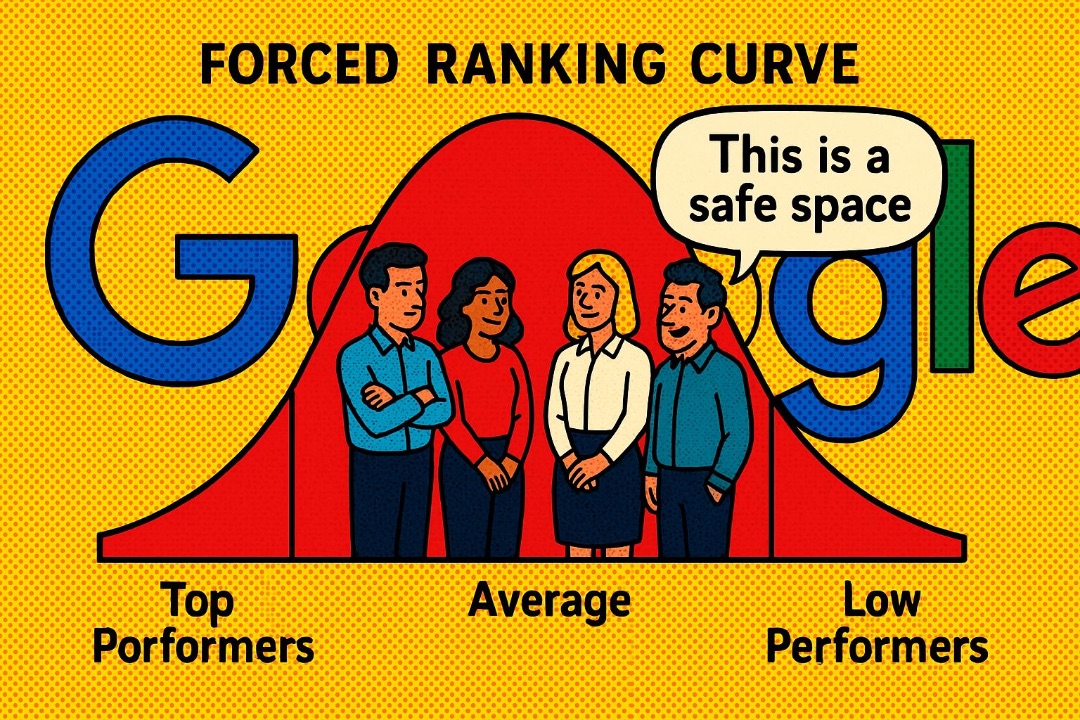

When even "psychological safety" becomes an obligation to perform... THE SELF-REINFORCING SPIRAL OF NEOLIBERAL WORK
This is the silent paradox at the heart of modern work. In their article "Neoliberal Ideology in Work and Organizational Psychology", which is well worth reading, Bal & Dóci (in the commentary 👇) show how neoliberal ideology permeates our organizations (and also research). Using political, social, and fantasy logics, they analyze how instrumentality, individualism, and competition have become unquestioned truths. Even scientific findings often serve to increase efficiency – not to search for meaning.
But the real perfidious thing is that neoliberalism does not work through coercion, but through fantasies. Namely: to be free. Self-determined. Successful if you only give enough. Those who fail were simply not committed enough in this logic (see also the language of the CDU at the moment). And it is precisely because this feels liberating that it is so effective – and so difficult to question.
This is where a self-reinforcing negative spiral begins: Organizations are based on the assumption that people are rational, self-reliant, and competitive. They create structures that generate exactly this beh * avior: self-optimization, peer competition, inner performance control. And it is precisely this behavior that seems to confirm the original theory.
The ideology thus proves itself. When the system fails, it does not look for the fault in itself – but in the individual. The answer: resilience training, coaching, feedback loops:
🦸 Exhaustion is reinterpreted – as an "opportunity for growth".
🦸 Criticism becomes performance.
🦸 Resistance to service. And so psychological safety also becomes a product line.
Google case study:
The company is considered a pioneer in "psychological safety" – at least since the internally acclaimed Project Aristotle, which identified psychological safety as a central factor for high-performance teams. A company that presents itself as a future laboratory for good work.
And at the same time?
At the end of 2022, Google introduced a new performance system that requires up to 6% of employees to be classified as "low performers" – regardless of actual team performance. (CNBC, 12/22/2022) In addition: regular, quiet layoffs. Results-oriented. Calculated.
The episode?
You can speak openly – but please with output.
You can feel safe – as long as you deliver.
You can live purpose – as long as you don't slow down.
And you can look forward to your own self-optimization including a "warm feeling".
But that's already the spiral. It does not drag itself out because it works – but because it so elegantly translates its own failures into self-responsibility.
The phase-out begins there,
where we stop treating the individual –
and begin to demystify systems.
02-06-2025

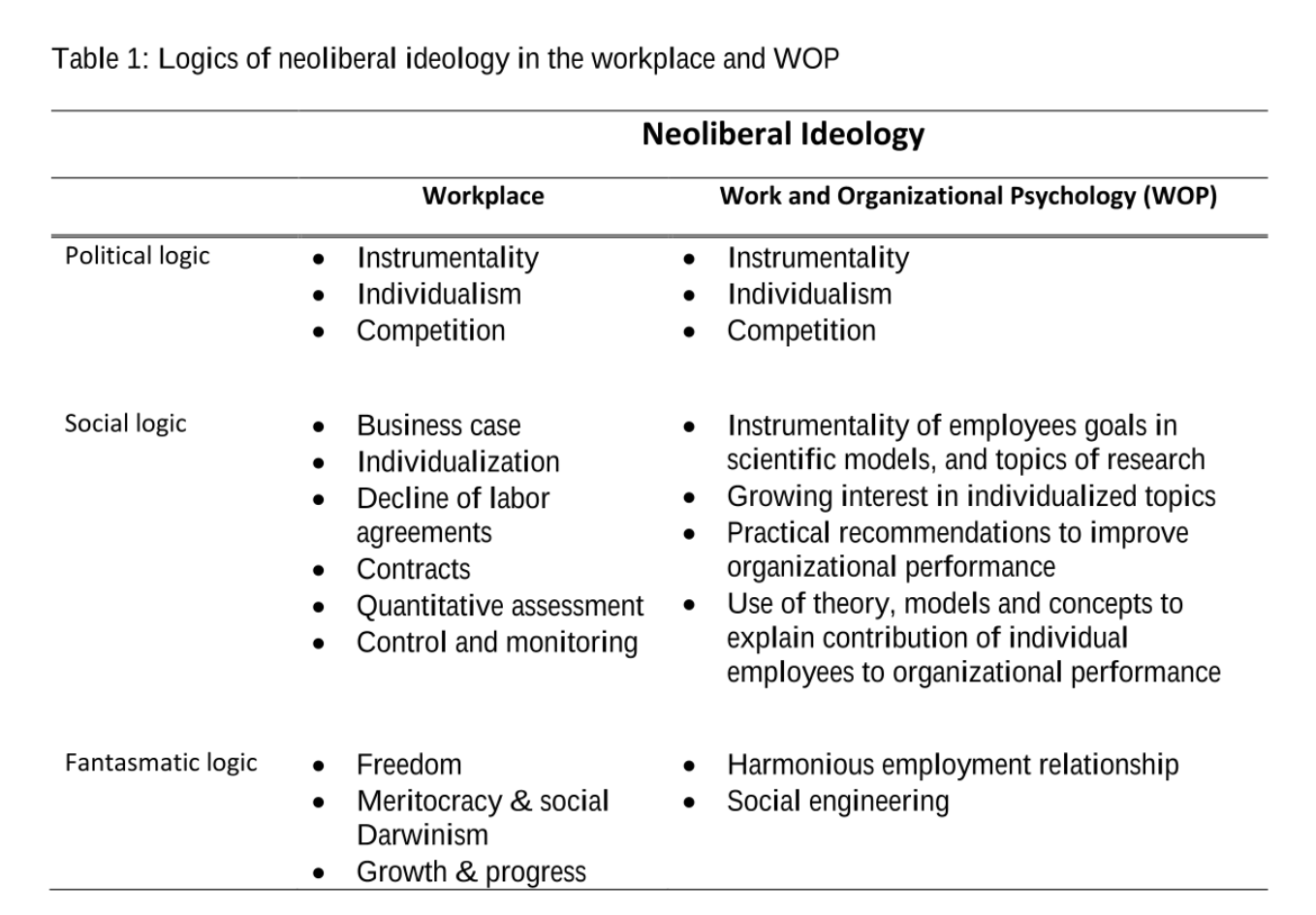

THE SELF-FULFILLING SPIRAL OF NEOLIBERAL WORK
That’s the silent paradox at the heart of modern work.
In their brilliant article 👇 , “Neoliberal Ideology in Work and Organizational Psychology”, Bal & Dóci dissect how neoliberal logic has captured both workplace practice and the discipline meant to study it. Through the lens of political, social, and fantasmatic logics, they show how instrumentality, individualism, and competition have become the unquestioned truths of our time. Even Work and Organisational Psychology research often serves to fine-tune performance, not question purpose.
But the authors go deeper. They argue that neoliberalism does not just govern through structures or incentives - it works through fantasy. It seduces us with the idea that we are free agents, choosing our paths, responsible for our own outcomes. If we work hard enough, we will succeed. If we fail, we must not have tried hard enough. This fantasy persists even in the face of burnout, inequality, and disillusionment. It is precisely because it feels empowering that it becomes so hard to resist.
This is where I would argue the negative spiral begins. Neoliberal assumptions about human nature, namely that people are rational, self-interested, and motivated by competition, are embedded in organizational systems. These systems, in turn, shape how people behave: employees learn to self-optimize, to treat colleagues as competitors, to manage their own motivation as if it were a resource. These behaviors appear to confirm the original assumptions, making the ideology seem not only true, but natural.
Through the shared phantasy (and note how we here go beyond Theory Y/ McGregor and even beyond Ghoshal) when things go wrong, the system does not blame itself. Instead, it places responsibility on the individual, who is encouraged to be more resilient, more agile, more self-aware. Interventions focus on mindset, not on power. Critique becomes another performance tool. Even exhaustion is reframed as a growth opportunity.
🌀 Every “solution” (coaching, mindfulness, peer feedback) reinforces the belief that change lies within the individual.
🌀 Even resistance becomes productized - sold as purpose or psychological safety.
🌀 The system becomes both invisible and irresistible.
Insidious, isn't it? This is how ideology becomes structure, and structure becomes self. And all the while, the underlying promise- "that this is what freedom looks like" - remains intact. The spiral tightens not because it works, but because it is so good at explaining away its own failures. That is the genius of its design and the challenge of breaking free.
Link to article: https://doi.org/10.1080/1359432X.2018.1449108
28-05-2025

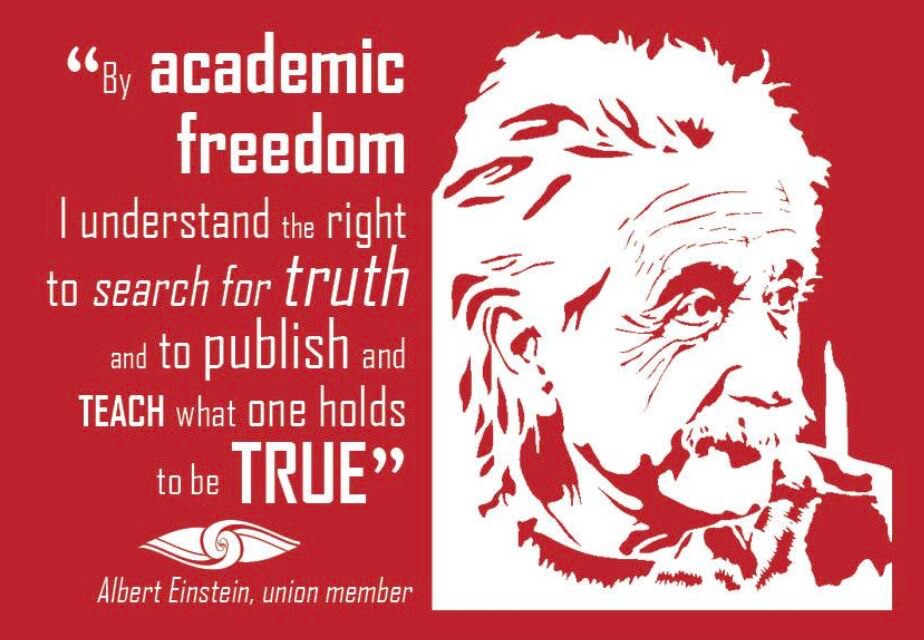

🎓 Why Academic Freedom Matters — From Humboldt to Weber
Academic freedom isn’t a luxury. It’s the lifeblood of critical inquiry, societal progress, and democratic resilience. It began with Wilhelm von Humboldt’s vision in early 19th-century Prussia: a university should be a space where Lehre (teaching) and Forschung (research) are united in the pursuit of truth, free from political or economic interference. The university, in his eyes, should cultivate not just knowledge, but autonomous individuals.
Decades later, Max Weber sharpened this ideal: Scholars must speak inconvenient truths even if it costs them. In his famous lecture "Science as a Vocation" (1919), Weber called for integrity over ideology, responsibility over influence.
Today, this freedom is under pressure but defending academic freedom is not about privilege. It’s about preserving the conditions that allow societies to reflect, innovate, and hold power to account.
With Harvard we stand (or fall)!
28-05-2025



🎓 Why Academic Freedom Matters — From Humboldt to Weber
Academic freedom isn’t a luxury. It’s the lifeblood of critical inquiry, societal progress, and democratic resilience. It began with Wilhelm von Humboldt’s vision in early 19th-century Prussia: a university should be a space where Lehre (teaching) and Forschung (research) are united in the pursuit of truth, free from political or economic interference. The university, in his eyes, should cultivate not just knowledge, but autonomous individuals.
Decades later, Max Weber sharpened this ideal: Scholars must speak inconvenient truths even if it costs them. In his famous lecture "Science as a Vocation" (1919), Weber called for integrity over ideology, responsibility over influence.
Today, this freedom is under pressure but defending academic freedom is not about privilege. It’s about preserving the conditions that allow societies to reflect, innovate, and hold power to account.
With Harvard we stand (or fall)!
26-05-2025

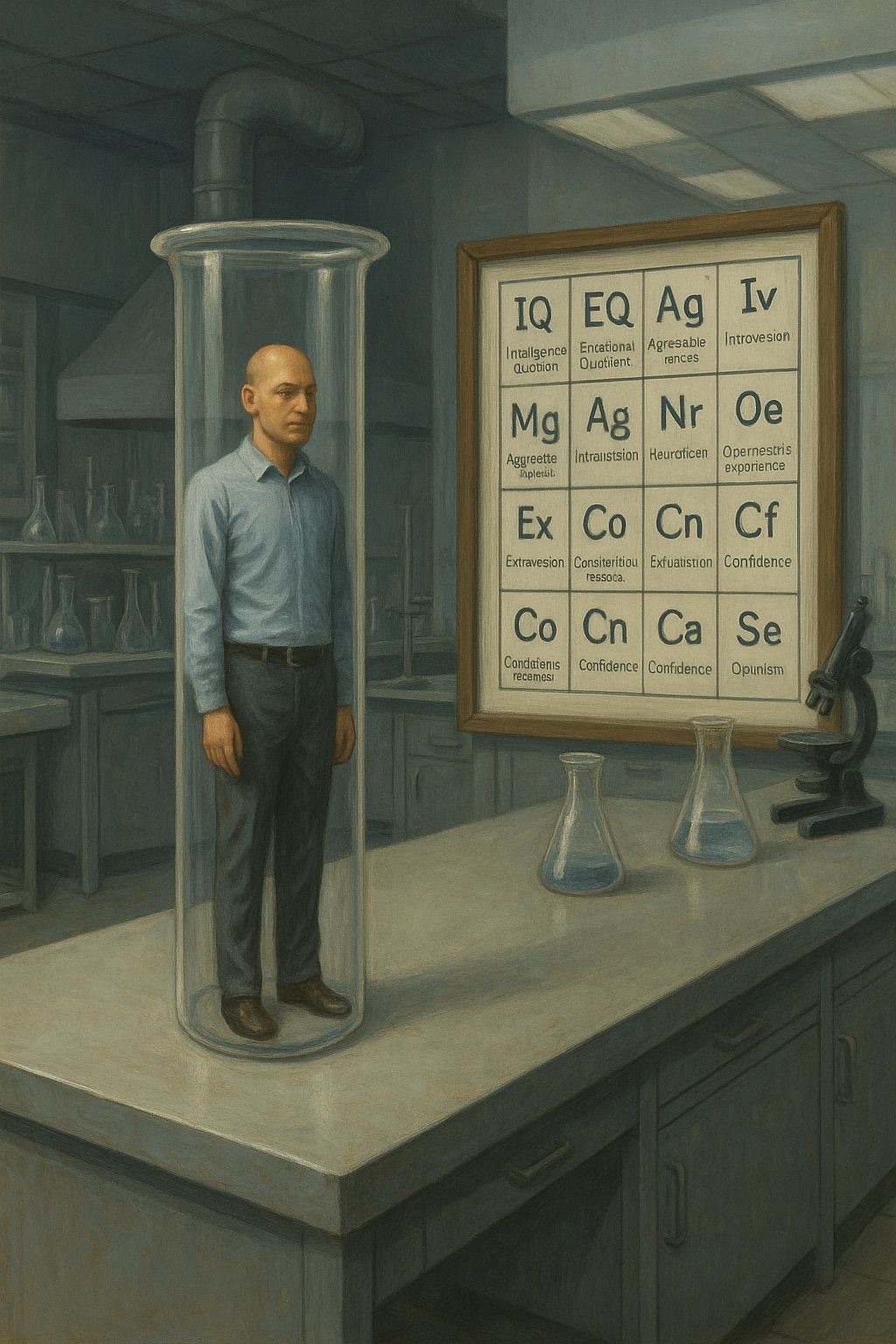

THEORY IS DEAD. LONG LIVE EXPERIMENTS?
The other day a colleague in economics told me: “We don’t do theory anymore. Science today is about experiments.”
It sounded innocuous. Evidence over ideology. Precision over speculation. What could be wrong? But I heard John Locke in the background. This is the punctual self Charles Taylor describes: a disembedded agent, disengaged from history or value, made legible only through behavior. In this view, science begins from sensation, avoids reflection, and reduces understanding to data. But when theory is abandoned, much more is lost than speculation.
What remains hidden?
▶ Orientation: Without theory, data lacks direction. Experiments tell us what works, but never what’s right, what’s human, or what’s just. Policy designs based on “impact” often presuppose questionable values: utility, compliance, behavioral adjustability.
▶ The Subject: Locke’s model of a self-regulating unit echoes in "randomized controlled trials" and behavioral economics (and also for much of psychology for that matter). But people aren’t programmable modules, they are also narrating, interpreting, embedded beings. What gets erased? Identity, contradiction, moral striving.
▶ Reflexivity: The social sciences are not like physics. As Giddens put it, they involve a double hermeneutic: we study beings who study themselves and adjust accordingly (which also "ruins" our findings). When we reframe humans as utility-maximizing or irrational nudgers, we don’t just describe we also always shape. Beliefs become self-fulfilling prophecies. And management theories once meant as tools become norms that deform.
▶ Responsibility: Ghoshal warned us: a theory that assumes people are selfish, or even opportunistic, and mechanistically influenceable will create practices - and people - that make it so. Theory is never innocent. And abandoning it doesn’t avoid distortion. Rather it ensures it.
So no, sorry to say, theory is not dead! It’s just gone underground. It has gone embedded in unexamined assumptions, power-laden categories, and silent norms. Without it, science cannot critique itself. It becomes technically sound (maybe) but morally blind.
💡 A truly human science doesn’t just measure. It orients. It reflects. It engages. It remembers that the way we see the human affects the way we treat the human.
In a disoriented world, we don’t need fewer theories.
We need better ones. Your views?
25-05-2025

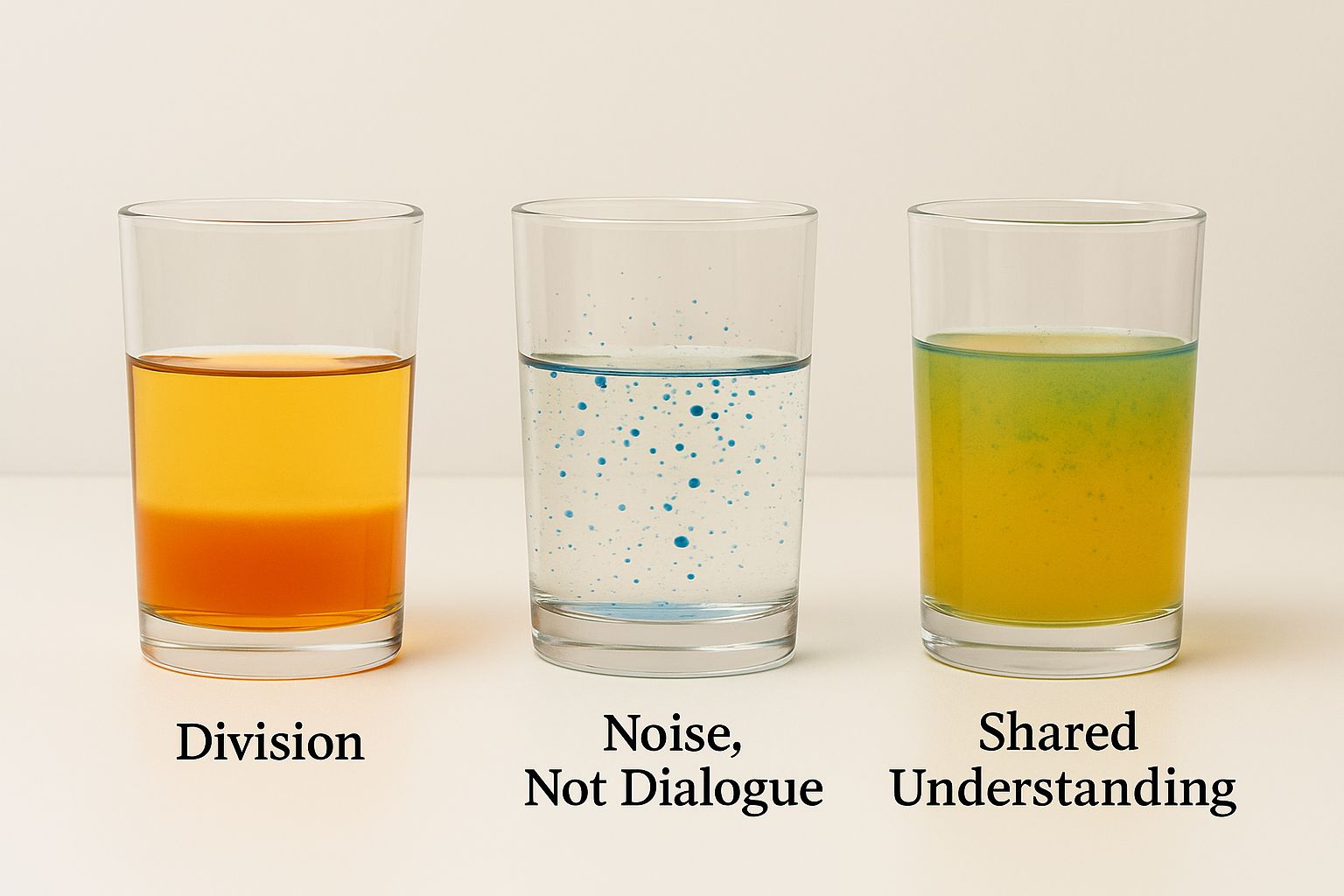

FROM EVALUATION TO ENCOUNTER: RETHINKING DIVERSITY THROUGH THE FUSION OF HORIZONS
Why does mutual understanding feel increasingly out of reach? As Robert Putnam once noted, we have moved from we to I, and often to division. One reason may lie in our confidence that we can assess others from a so-called view from nowhere. This is a stance that claims neutrality but typically reflects an unexamined moral horizon and thereby introduces our own prejudices without us becoming aware of it.
This becomes especially visible in how organizations approach diversity and inclusion. Diversity is often reduced to visible difference or statistical variety. Inclusion, in the traditional DEI view, becomes a question of integrating others into pre-established norms. Meanwhile, HR is tasked with “evaluating” people through standardized criteria - as if human beings were isolated, interchangeable inputs rather than selves situated in moral space, shaped by histories, frameworks, and aspirations.
Charles Taylor, drawing on Hans-Georg Gadamer, offers a deeper vision: the fusion of horizons. This is not mere tolerance of difference. It is the ethical encounter with another as a (moral) self, oriented by their own understanding of the good. It means entering into dialogue. The aim is not to erase difference, but to articulate our respective frameworks, to listen, and to allow ourselves to be morally stretched.
This is what genuine understanding demands: not just participation, but shared articulation of what matters. And this is what diversity truly offers: not just variety of attributes, but the presence of persons who orient toward different goods, each capable of enriching our collective understanding (but not necessarily so).
Such encounters, then, would not flatten difference - they would deepen it. And in doing so, they can reveal more about who we are, too.
So what if work became a place where dialogue, not data, shaped how we relate? What if our frameworks for diversity moved from formal rights to mutual recognition AND to risk being fully present to one another? What if inclusion meant co-creating a shared moral space, rather than fitting people into an existing one?
We might discover that such fusion of horizons would be deeply generative - enabling us to become better versions of ourselves (and finding better solutions together for the troubles ahead).
24-05-2025

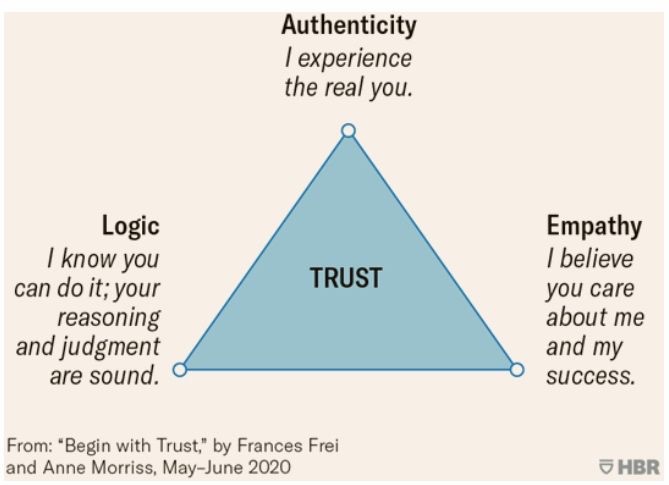

Trust Isn’t a Checklist. It’s a Moral Achievement!
For some reason, everyone seems to love the HBR trust triangle. And maybe even as more rigorous trust researchers we could eventually make peace with it.
Our own beloved three legged ABI model (Ability, Benevolence, Integrity) does capture something important: that trustworthiness is judged along multiple dimensions.
🤓Ability maps to competence and reason.
🤓Benevolence corresponds to care, even empathy.
🤓Integrity suggests a kind of moral coherence, or at least consistency.
And we know: goodwill - the “BI” part - carries the lion’s share. Competence might be enough for contracting. But not for vulnerability. The popular HBR triangle (Logic, Empathy, Authenticity) reinforces this in more digestible terms.
It works. But it flattens - personality indicators instead of self with commitment and depth. And this is where Aristotle’s triangle still outshines them all.
Unlike modern models, Aristotle doesn’t reduce trust to traits or checkboxes. His rhetor is not a triangle of functions but a vision of the human being as capable of moral growth and shared discernment. It consists of:
🏛️Ethos is not just “being yourself.” It is excellence. It is character, practical wisdom (phronēsis), and goodwill (eunoia). It is integrity in the sense of being integrative, not simply “authentic”- even if “yourself” is, frankly, an asshole.
🏛️Pathos is not just empathy. It is the capacity to arouse commitment to a higher good. To invoke solidarity, courage, or hope when needed most. Empathy may be part of it but it’s more than feeling with. It’s moving toward.
🏛️Logos is not just logic. It is knowing and communicating the good. Not just what works - but what is just. It is the ability to speak from a horizon, not just from inside a system.
So what does this mean?
That we would come to trust a leader for their character, for their respect and moral clarity, for their understanding of the good- ethical and political - and for their ability to inspire shared movement toward it.
Not an easy feat. It takes time, formation, reflection. But wouldn’t it be something tohave leaders who don’t just demand our trust, but truly merit?
23-05-2025

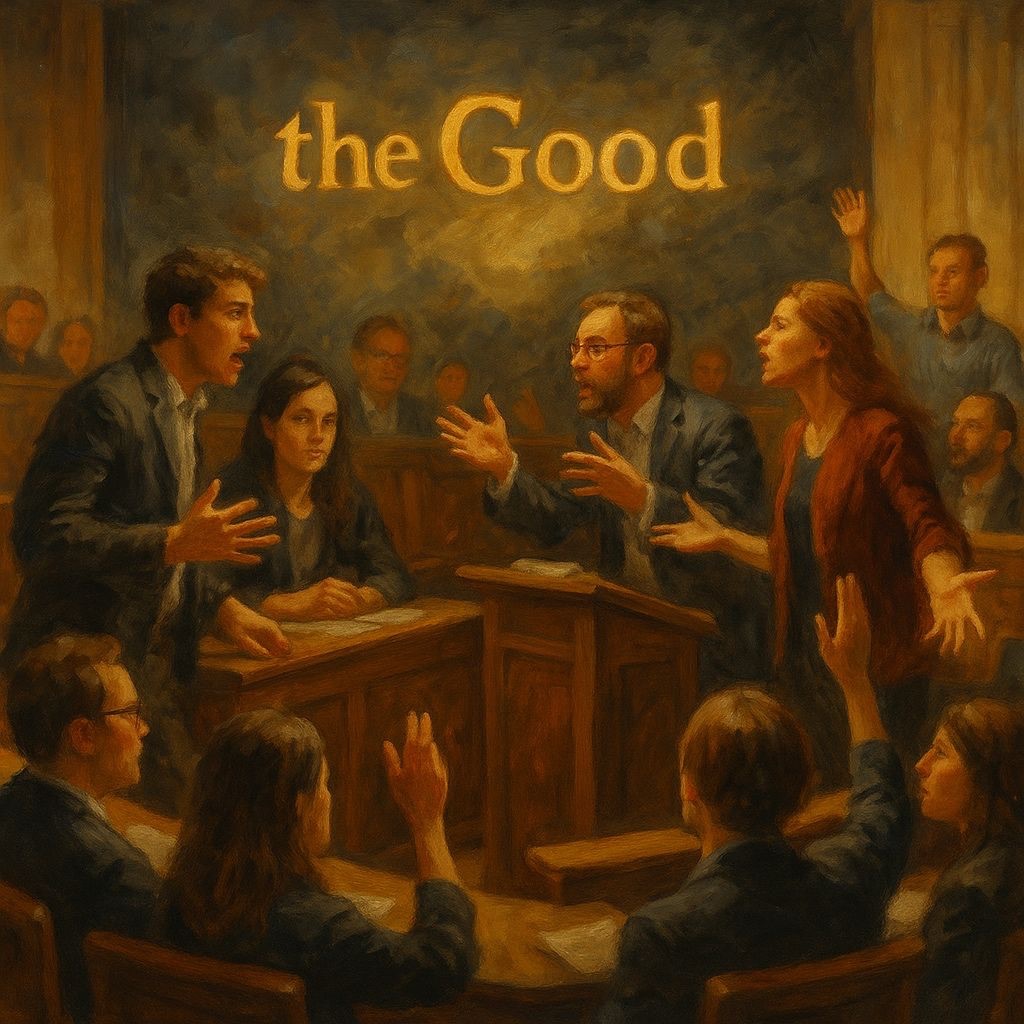

On the Disappearance—and Possible Return—of the Common Good in the University
You might think this is the academic ideal: a community in universitas, striving together in dialogue, struggling in good faith toward the truth, and seeking a common good. A space where tensions refine our convictions, where disagreement carves new horizons.
And yet - think again.
Enter the performative university.
Here, what counts are audits and rankings, metrics and outputs. Time is money - so why wrestle too long with hard questions? In the age of procedural liberalism, we settle for a watered-down tolerance: to each their own good, because a common one feels too difficult to articulate.
Even truth is no longer shared labor. Instead, we’re caught in the old epistemological turf war: correlation-mongers versus hermeneuts, with little space for ontological depth. Our shared ontology is flat and so, increasingly, are our ambitions.
But reality may bite back.
In the age of AI, a renewed struggle for truth and the good may become not just desirable but essential. Without it, the university may dissolve into mere content provision, and our students may find themselves enrolling in McAI, taught by shallow generative models trained on noise and nonsense.
What we need now is a leap of faith: A belief that intelligent and well-hearted people can still orient toward a common good. And arecognition that productive tensions are not distractions but the groundwork of shared insight.
Because the alternative is not only uninspiring. It is, quite simply, untrue to what learning demands of us.
22-05-2025

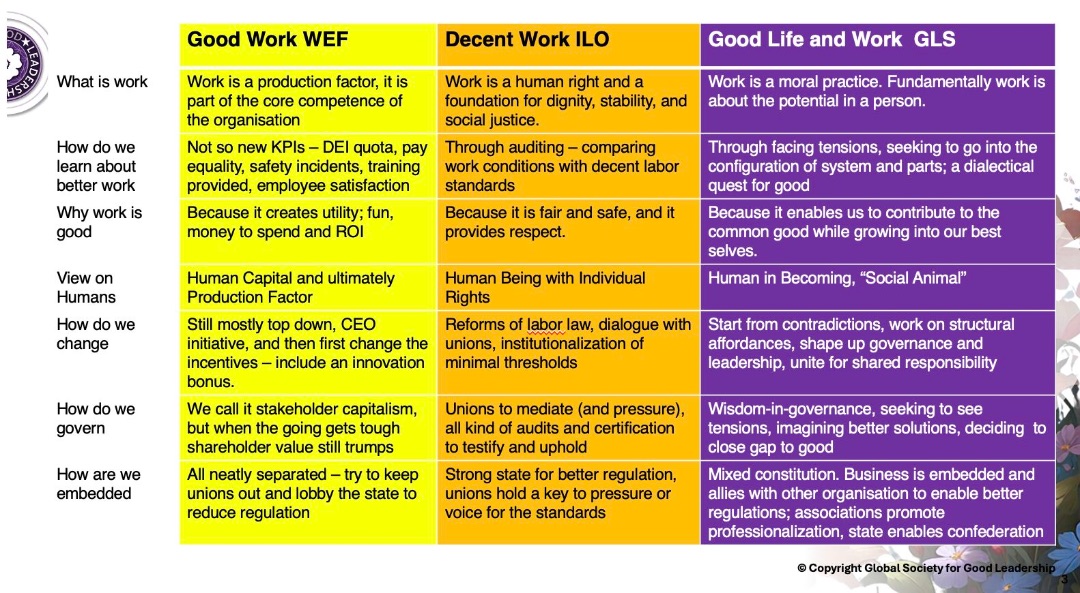

Good Work?
For some reason, “good work” seems to be the new hype. That could be good news, but often, it’s not. A lot of initiatives popping up today haven’t spent much time thinking about what exactly they claim to be good. Is “good” just the new “new”? A fresh spin on flexible work, remote options, with some coaching vouchers thrown in? Or is “good” just “good for business” i.e. being nice because it pays off, happy cows give more milk?
To explore that, I’ve brought together three radically different understandings of “good work.” But let’s start with the Yellow view - the neoliberal version -which, for now, seems to dominate. Here, “good” means “more good than bad,” your typical utilitarian shortcut. In practice, it usually just means “good for business.”
Now I hear you say: But what’s wrong with that? Isn’t it great that even the WEF is thinking about good work? And isn’t ‘a bit better’ still better than nothing?
Well. I’m not so sure. Or rather: no, not good at all!
First, this definition of “good” offers a convenient way out. Change the mood, change the metrics. A new American president comes in and out go the DEI quotas (as done by some of the WEF signatories). Look at the KPIs: not ambitious, not structural, not transformative. No audits, no public scrutiny, no mechanisms for accountability. If “good” is just a formula, you can always tinker with the bits and usually the bits that matter most to workers.
But that’s only the beginning of the problem.
Look at their view on embeddedness. In this model, business alone defines what’s good. No unions. No government. No public deliberation. It’s the same old libertarian fantasy of the heroic free enterprise: deciding the rules and reaping the glory. And just like before, that’s unlikely to lead to real change. Bad companies will still outperform the “good” ones, because neither the state mandates nor unions enforce the shift. Being better is optional and often, it's only skin deep.
Not to mention the dubious assumptions that go unchallenged. Workers are still treated as factors, not persons; lone agents, not relational beings. And when things go wrong, the system is never questioned - it’s always the individual who needs fixing.
So next time you see another event or special issue on “good work,” do yourself a favour: read the language carefully.
🍊 If they lead with “the business case,” steer clear.
🍊 If the speakers are all from business schools and corporations, steer clear.
🍊 If they treat “good” as self-evident, steer clear.
Instead, go where you’ll be challenged by unions, philosophers, critical scholars. Go where the ideas are too complex, the practices too ambitious, the discomfort too real. Where “next practices” matter more than “best practices.”
Because only then will you start facing the real tensions.
And maybe, just maybe begin doing good work.
21-05-2025

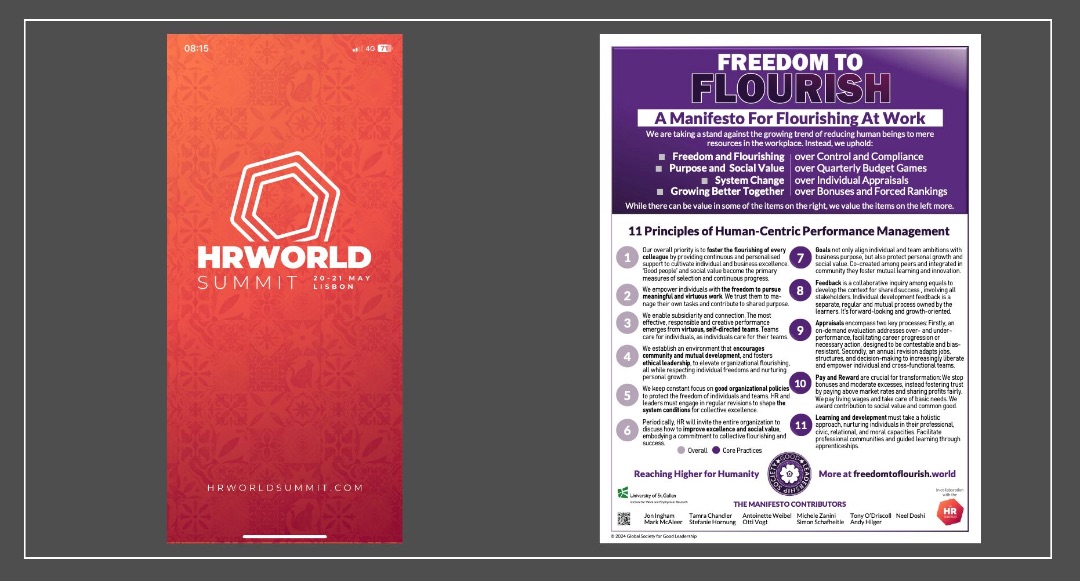

HRWorld Summit for Good – Here We Come!
We’re hugely looking forward to connecting and co-creating with many wise and eager HR leaders who are ready to reimagine the future of work.
At last year’s Summit, we introduced our HR Flourishing Manifesto. This year, we’re excited to share ARC – our transformation theory for organizations ready to move beyond survival mode.
ARC maps the path from a relentless, competition-driven, performance-obsessed system…toward businesses that enable common prosperity and unleash the generative potential of people and institutions.
If you’re wondering whether this is a session for you (we’re pretty sure it is), here are a few nuggets to ponder:
😉 Has your CEO recently declared a return to “meritocracy” – while sidelining HR’s efforts to strictly promote only i also maturity, integrity, and character fit - beyond pure sales performance?
😉 Has your company rebranded from employee satisfaction to employee excellence – convinced that excellence can be captured in a single KPI?
😉 Have you sat through conferences proclaiming “New Work is dead, Good Work is the new black,” while still preaching that "happy cows give more milk"?
Then you might be working in what we call a yellow organization: one that grants more autonomy, but ultimately still worships at the altar of growth and profit. A place where even HR reinvention depends on whether the political winds in Washington shift.
If you’re tired of that, if you believe there are better ways to work and live and if
ou believe organizations can help people grow into their best selves while solving real, urgent problems:
…then join us.
Help us.
Push the system toward flourishing – not just better performance management.
20-05-2025

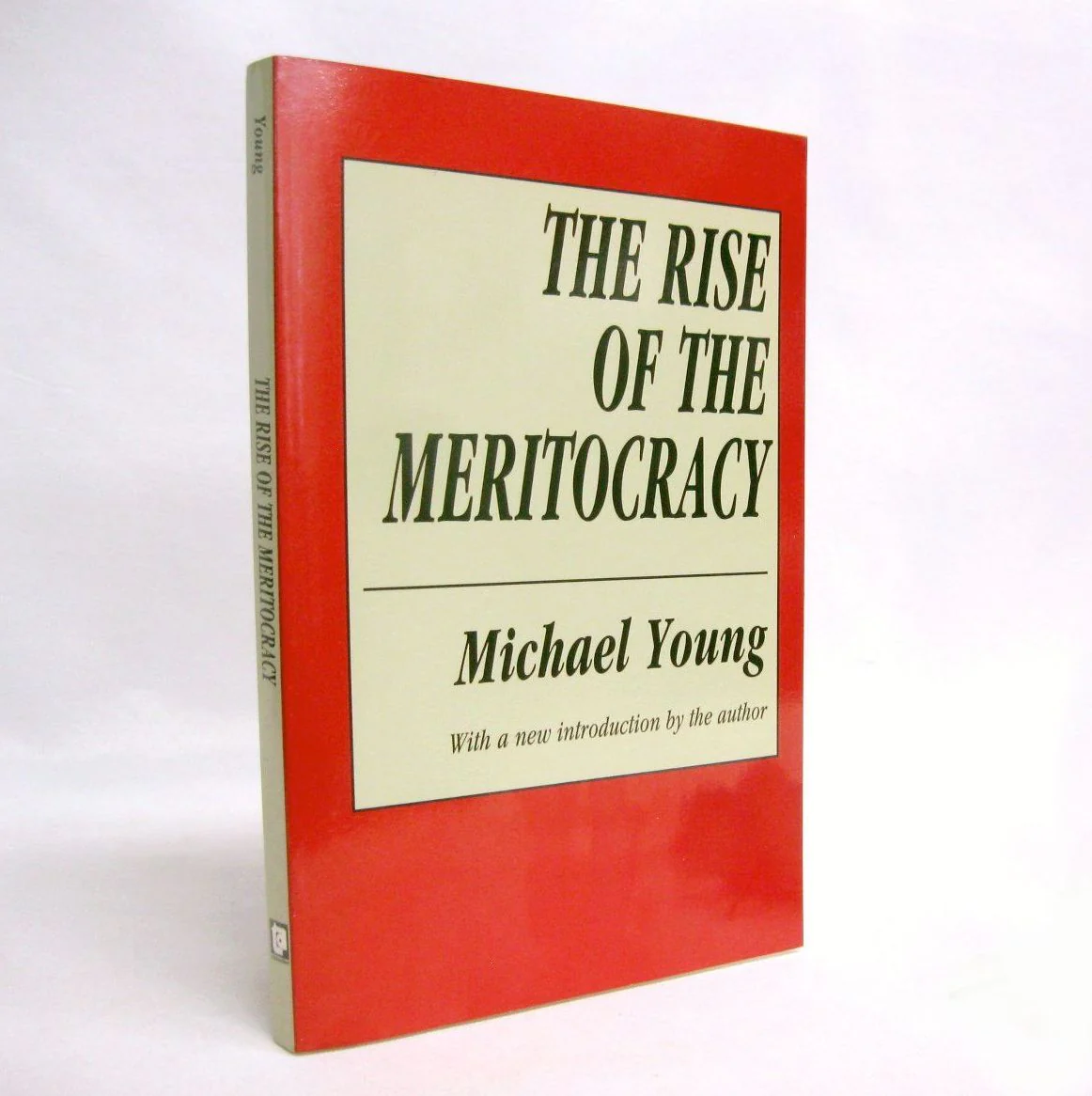

The Persistent Myth of Meritocracy
“Not class or birth, but merit.”
A powerful ideal—only we never quite got there.
In the postwar decades, especially the 1960s, we made some progress in reducing the bad luck of birth. But since then, social mobility has stagnated. It’s still immensely harder to get into top universities if you come from a working-class background - and that’s just the beginning. Despite all the talk of objective metrics and fair performance management, modern organizations often amplify unequal starting conditions rather than correct them.
Zoom out to the global stage, and what grows isn’t meritocracy but brogligarchy: networks of privilege, wealth, and selective gatekeeping. Success is still more tied to your golf handicap or bank balance than to talent or effort.
Michael Young foresaw all this. His 1958 satire The Rise of the Meritocracy imagined a future where the ruling class believed they truly deserved their power because they had “earned” it. The result was not fairness, but a new kind of tyranny: smug, closed, and self-justifying.
Instead of defending a broken ideal, maybe it’s time to shift the goal.
Not just equal opportunity to compete, but equal freedom to contribute.
Not meritocracy - but contributive justice. And rewards go to those who contribute to society at large.
Let’s redesign systems so everyone can shape, build, and belong.
Link to article: https://www.theguardian.com/politics/2001/jun/29/comment?CMP=Share_iOSApp_Other
18-05-2025

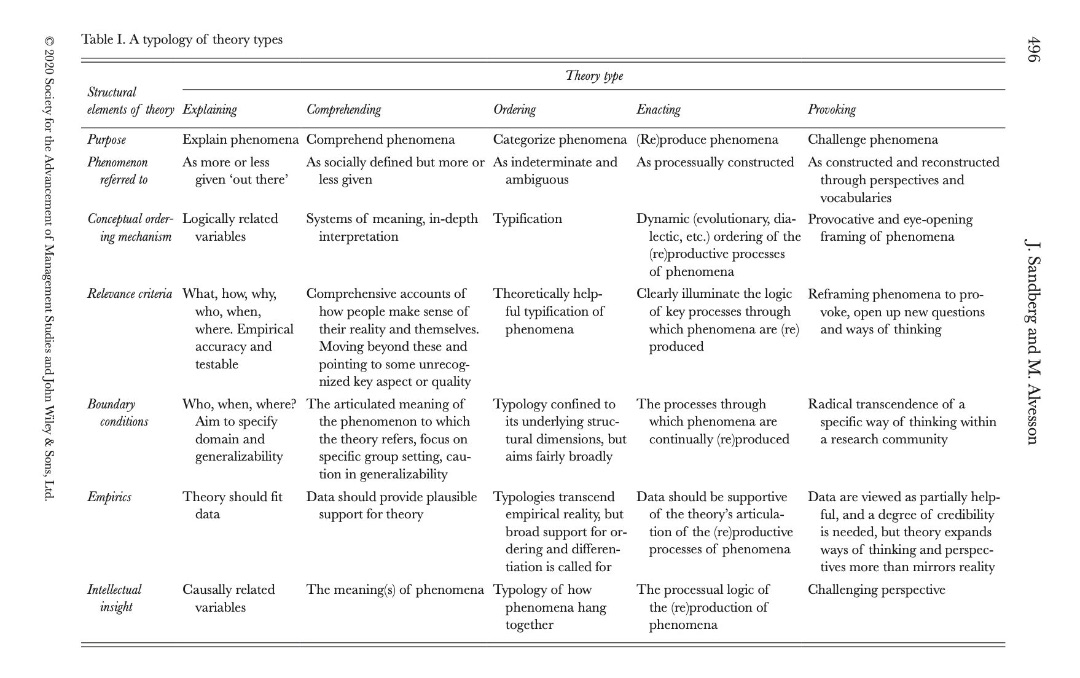

💡 Why You Should Care About Theory
As a girl, I loved books. As a scholar, I still do. But whether in academia or in business, I’ve often been told: “Get a grip. Go do something. Be practical.”
And I get it. We live in a world obsessed with evidence, action, outcomes. So when you offer theory be it concepts, frameworks, or structured thought you’re often met with skepticism. Even in academia, the pressure to produce “data” often outweighs the encouragement to think.
Some try to bridge the gap by becoming “pracademics” (as Julian Kirchherr puts it). And yes, I absolutely believe in engaged scholarship, ie in framing problems with practitioners, staying close to the tensions of real life.
But I also believe this: practice has a theory deficit.
And I wish we’d say it more often. We talk a lot about bias, but rarely about theoretical bias. Most people operate from implicit theories they’ve never made conscious; about human nature, power, value, success, responsibility. And without theory, we rarely challenge those assumptions. We just act them out.
So maybe it’s time we turned the tables. Instead of always telling scholars to “get practical,” maybe we should ask practice to “get reflective.” Start theorizing.
This is where the typology by Alvesson and Sandberg is so useful. It shows that good theory isn’t just abstract: it explains, helps us comprehend, reorders, reveals hidden processes, and sometimes provokes us to think in entirely new ways.
A good theory can:
👏 Help us see the lens through which we interpret the world (and how distorted it may be).
👏 Group things together we never thought belonged.
👏 Reveal why we keep reliving “Groundhog Day” at work.
👏 Or make visible what we’ve trained ourselves not to see.
Theory, in this sense, isn’t the opposite of action.
It’s what makes meaningful action possible. So next time someone retreats into data or leans too hard into “just do it” logic, I might be tempted to say:
Get a grip. Start theorizing!
The world needs more reflection, not less.
16-05-2025

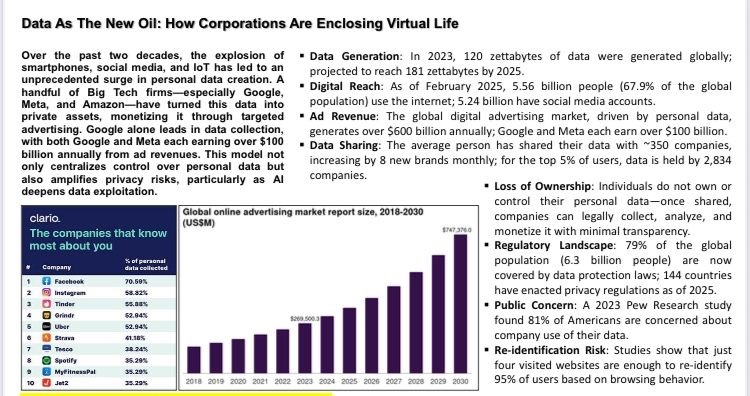

Can you have your chocolate and eat it?
Turns out, Big Tech can.
Over the past decade, tech giants like Google and Meta didn’t just get our data; no they colonized it. They collected it under the sweet promise of connection, traded it like candy across thousands of companies, and now use it to predict, manipulate, and monetize our every click.
The results?
• $600 billion in ad revenue.
• Political influence through microtargeted persuasion.
• Monopoly rents from network effects.
• And a rising bromarchy—a tightly knit elite of data barons who know us better than we know ourselves.
Just 5% of users have their data shared with over 2,800 companies. Four website visits are enough to re-identify 95% of us. And 81% of Americans are worried but at the sane time stuck.
Data is the new oil, yes. But unlike oil, you are the well.
The question is: when will we stop letting them?
15-05-2025



Can a Company Be a Good Employer If It Undermines the Common Good?
We are quick to praise companies for their internal reforms: de-bossing, self-management, psychological safety. We applaud progressive HR policies, leadership humility, the dismantling of hierarchy.
And yet, something crucial is often left unexamined.
A company is not just a workplace. It is a node in a web of relationships - ecological, economic, political. What it does to the world matters as much as what it does for its employees. And these things are not separable. Because we grow into the work we do. We become who we are, individually and collectively, through our labor and its consequences.
This question came alive for me as I studied the seed industry.
Bayer, widely admired in some business circles for its organizational culture, acquired Monsanto in 2018. Monsanto is known for:
🌱aggressively patenting seeds and suing farmers whose crops were accidentally contaminated,
🌱pushing genetically modified monocultures that threaten biodiversity and food sovereignty,
🌱ghostwriting scientific articles and suppressing evidence about the risks of glyphosate.
This is not ancient history. These practices have shaped agricultural systems, legal frameworks, and public discourse in profound ways.
So the question persists: Can a company foster “good work” while producing bad outcomes?
Is it ethical to be a “liberated” worker inside a system that concentrates power, silences dissent, and undermines planetary well-being?
Too often, we separate internal excellence from external ethics. But governance is not just internal. Culture is not just about values: it’s about character. A place that treats its people well while harming the commons teaches complicity, not character.
As scholars, practitioners, and citizens, we must stop admiring surface-level innovation when it masks systemic harm. We must resist the seduction of workplace “revolutions” that ignore relational and ecological realities.
Because integrity is not a vibe. It’s a total pattern.
13-05-2025

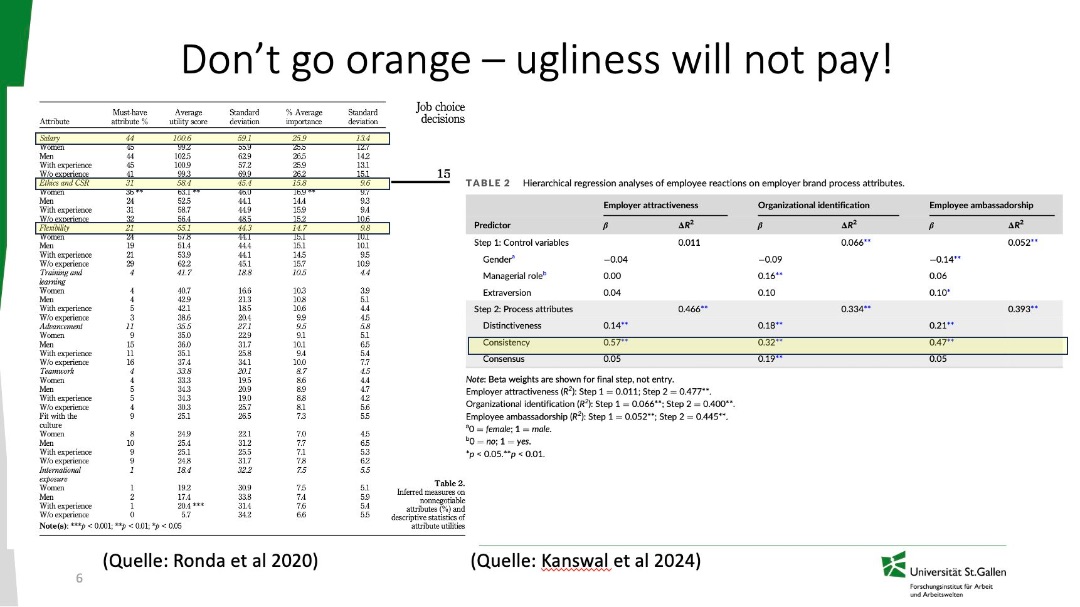

Don't go orange - ugliness will not pay!
For those abandoning DEI initiatives in the wake of Trump's election, the data should make you think twice.
After my previous ethical appeals fell on deaf ears, perhaps the financial impact will finally get your attention. This isn't just about doing what's right anymore; it's about your bottom line.
The evidence is methodologically robust. Ronda et al. (2021) employed an adaptive Choice-Based Conjoint Analysis (ACBC), not the usual wishlist studies that merely rank preferences. This method mirrors actual decision-making processes where candidates first eliminate unacceptable options before making trade-offs among remaining choices.
Their findings are striking: Corporate Social Responsibility emerges as the second most important non-negotiable attribute (31%), surpassed only by salary (44%). This isn't just a preference — it's a screening mechanism that removes your company from consideration for nearly one-third of candidates before they even evaluate your other offerings.
Even more compelling, Kanwal & Van Hoye's (2023) longitudinal study demonstrates the critical importance of consistency between stated values and actual practices. Their hierarchical regression analyses reveal that Consistency has the strongest impact on employer attractiveness (β = 0.57), organizational identification (β = 0.32), and employee ambassadorship (β = 0.47) — far outweighing other factors.
Two critical warnings for companies "going orange":
🍊 If you abandon your DEI commitments, you will lose out on a significant talent pool: 31% of candidates will immediately filter you out based on your ethics and CSR positioning.
🍊Even worse, if you show you were just virtue washing, nobody will stand up for you any longer; the longitudinal data clearly demonstrates that inconsistency destroys employee loyalty and advocacy.
The political climate may have shifted, but talent expectations haven't. The methodologically sound research demonstrates that candidates apply non-compensatory decision rules when evaluating employers' moral stances. Companies hastily dropping DEI initiatives are sending a clear signal about their values PLUS and the research shows candidates are making consequential decisions accordingly.
Going "orange" isn't just ethically questionable; it's a demonstrable disaster for your talent pipeline and will cost you real Dollars or Euros.
10-05-2025



No Performance, No Merit, No Justice!
It's a familiar pattern: a company publicly proclaims a return to meritocracy and so-called meritocracy, but fails to recognize the necessary foundations. All that usually remains are facades, a staging of performance orientation without substance.
SAP provides a particularly clear example.
Some time ago, the company declared that it wanted to distance itself from the zeitgeist surrounding “New Work”. No more too much freedom, too much ease, now performance should count again. After some wrangling with the works council, SAP introduced a new evaluation system, a school grading system for adults.
It is obvious that the company's management has established one thing above all with this reform: its own self-image. Those who are already at the top see themselves as a benchmark, a role model, a model of success, a superstar. Everyone else has to adapt or fall behind.
In the process, we lose sight of what large organizations do so reliably: the reproduction of structural inequalities. Systematic distortions, implicit biases, the Golem effect, network effects and career logics that determine who is visible and who is not do not create a meritocracy. Such mechanisms cannot be corrected with evaluation tables, they can only be reinforced.
In this context, a second SAP decision is particularly significant, namely the extensive withdrawal of binding targets in the areas of diversity, equality and inclusion. Under pressure from political developments in the USA, key terms were removed from the official reports. There is hardly any mention of concrete targets for diversity. Inclusion is thus declared a risk instead of a prerequisite for fair performance.
Both developments, the simplified evaluation system and the withdrawal from DEI responsibility, show that SAP not only misses the idea of a genuine meritocracy. It misses the principle of merit even more fundamentally.
Because merit, in the original Aristotelian sense, means that people assume responsibility where they contribute to the common good with attitude, performance and character. Leadership is only deserved by those who not only have specialist knowledge, but also the power of judgment, moral integrity and the ability to act wisely and courageously in difficult situations.
This would have meant not simply bowing to political pressure, but looking for smarter ways, ways that do not come at the expense of credibility and justice.
If SAP took this understanding of merit seriously, it would not have introduced such a form of evaluation, nor would it have lost sight of diversity and inclusion. Because one thing is clear: only those who deserve responsibility should be at the top - not just those who claim power!
08-05-2025



No Merits, No Deservedness!
Here we are again. The usual pattern unfolds. A company proclaims its return to meritocracy, only to cave at the first sign of real-world power dynamics. What’s left isn’t principle but it’s performance optics.
Let’s take SAP. Some time ago, SAP proudly declared the end of the “New Work” era. Enough with all the fun and flexibility. Time to focus on performance and - finally - merit 😉 . After some haggling with the worker council, they introduced their newly rediscovered tool: grading. Employees are now sorted into neat categories, into overachievers, achievers, underachievers all written straight into their records.
Of course, those sitting at the helm already knew the outcome. They were the apex, the glory, the heroes. Or in today's terms: the superstars. Everyone else? Follow suit, or stay where you belong.
In this all-too-familiar tale of hubris, one thing gets forgotten: Large organizations are exceptionally good at producing inequalities. Not always maliciously - sometimes through bias, sometimes through the Golem effect, often through network closures and design choices that subtly shape who shines and who stagnates. None of this is fixed by slapping grades onto people.
Then enters Trump, and the verdict comes swiftly. Let’s quietly rid ourselves of DEI. No more binding goals. Too risky. Possibly un-American. And let’s pretend that inclusion was a problem for meritocracy all along. Systemic injustice? Not visible from the top floor anyhow.
But here's what’s most telling: By walking away from DEI and reducing performance to school-style grading, SAP fails not only on merit but even more so on desert.
Desert is that ancient principle from Aristotle: that people should hold positions they are fit for. So that each can develop their potential, for the common good. It’s not about being clever or efficient. It’s about being morally formed. A leader, in this view, must not only know, they must judge wisely and act courageously.
That includes the courage to resist pressure from a big orange head across the Atlantic. And the practical wisdom to find better responses than cowardly giving in.
The truth is: if SAP truly honored desert, it would have done neither. No grading. No DEI rollback.
As one thing is clear: No desert, no superstar, no justice!
07-05-2025



Driver's License for Leadership
Driver's license for leadership? Or finally a real professional license? But what does that mean in concrete terms?
First of all, it's not about a driver's license in the technical sense, but about a professional license that needs to be renewed regularly - linked to knowledge, ethical obligation and responsibility. More importantly, this license would have to be backed by a genuine professional association.
Because if we take leadership seriously as a profession, it needs the appropriate characteristics:
🔊 A common canon of knowledge and expertise,
🔊 A normative self-commitment that goes beyond self-interest,
🔊 Institutions that secure values, enable exchange - and also sanction if necessary.
In management research, this idea has been on the table for a long time - for example with Khurana, Nohria and Penrice ( 👇 ). They show: Leaders have long had the power of a profession without its accountability structures.
And what are the practical implications of this? We have to face up to the debate about what must be part of the canon of professional leadership today. One thing is clear: business administration alone is not enough. We need social, ethical, political and philosophical perspectives - and the ability for critical self-reflection.
And we finally need institutions that take this requirement seriously. Business schools are not currently doing this. We often reproduce the logic that we should actually be questioning. We promote competitive thinking, ego optimization and shareholder thinking and, unfortunately, rarely professional integrity.
The many small academies, as well as chambers of commerce and even professional associations, could start here - if they join forces, muster the courage to self-regulate and see themselves as public partners in the ethical discourse on leadership vis-à-vis the state and society.
Leadership needs more than methodological knowledge. It needs attitude - and structures that demand and promote this attitude.
Link to article: https://onlinelibrary.wiley.com/doi/abs/10.1002/9781118785317.weom020208
05-05-2025

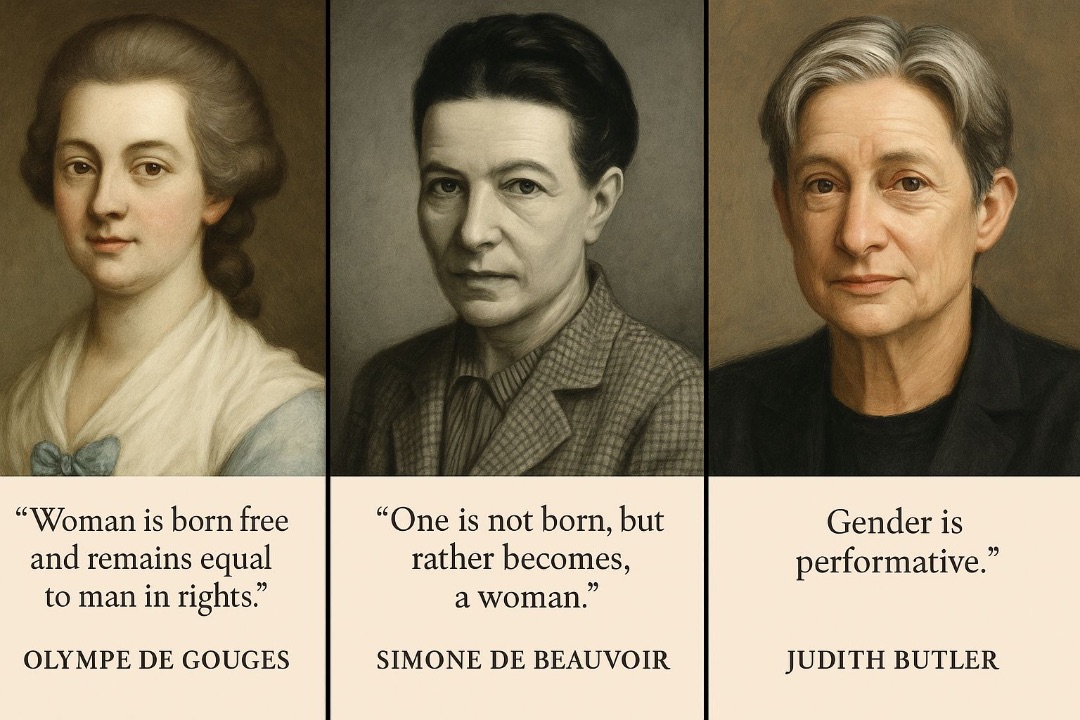

From Rights to Recognition - and Now Back Again?
Let us reintroduce three women who shaped feminist thought across centuries:
Olympe de Gouges (1748–1793) responded to the French Revolution’s Declaration of the Rights of Man with her own Declaration of the Rights of Woman. Her message was clear: liberty and equality cannot be exclusive. Gouges demanded political rights, education, and an end to slavery laying the groundwork for first-wave feminism focused on formal equality.
Simone de Beauvoir (1908–1986), in The Second Sex, moved beyond legal rights to interrogate the social construction of gender. “One is not born, but rather becomes, a woman.” Beauvoir’s existentialist lens shaped second-wave feminism, with its focus on emancipation, bodily autonomy, and breaking free from prescribed roles.
Judith Butler (b. 1956) unsettled the category of “woman” itself. For Butler, gender is not something we are, but something we perform. Her work gave third-wave feminism new tools: intersectionality, queer theory, and the refusal to fix identity in binary terms.
Over time, feminism moved from demanding equality, to exposing power, to deconstructing identity.
And yet today, all three of these ways of thinking are under siege. Not only have identity-based analyses been dismissed as “woke,” but calls for structural change are ridiculed as ideology, and even formal rights - really hard-won in the 20th century - are under open attack.
In parts of the world, especially the U.S., the political agenda seems bent not just on halting progress, but on reversing it going beyond Butler, beyond Beauvoir, beyond even de Gouges.
This is not a steady tide of progress. It is a rip current!
So the task now is not to pick a wave but to rise with force, to meet the undertow.
04-05-2025

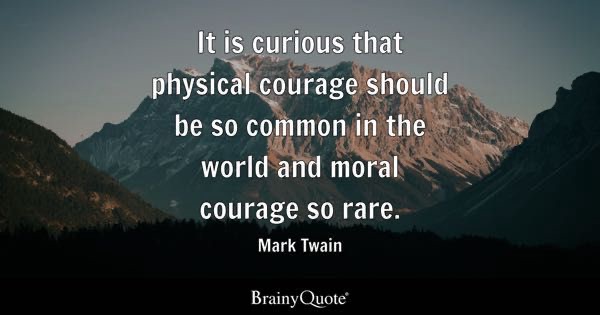

First DEI. Now deeper investments in the U.S.
Novartis and Roche have quietly scaled back their commitments to diversity, equity, and inclusion (DEI) — just as they deepen investments in the U.S., where political forces are dismantling equity efforts and calling for an end to research that includes people like me.
This isn’t just a shift in tone. It’s a test of moral courage — and a test of greed.
Both companies publicly commit to purpose-driven missions:
❄️Novartis vows to “reimagine medicine to improve and extend people’s lives.”
❄️Roche claims to be “doing now what patients need next.”
But will those promises still hold when profit and power pull in the opposite direction?
Since Donald Trump began threatening Swiss pharmaceutical companies with tariffs on medicine exports to the U.S. - their largest and most profitable market - the industry’s response has been telling. Instead of challenging political pressure in Washington, Novartis CEO Vas Narasimhan directed his criticism toward Europe. If governments want innovation to stay, he warned, they must be willing to pay more. “Don’t just expect us to produce here because other conditions are good,” he said. “You need to make it attractive.”
So let’s ask the obvious:
If you’re willing to abandon DEI to preserve access and avoid controversy - will you also abandon the kind of research that women need to survive?
As Invisible Women made clear, women are still misdiagnosed because clinical research is based on male symptoms. They still suffer more side effects because drug dosages are calibrated for male bodies. And they still live in a medical system that fails them because the data never truly saw them.
Without DEI, this will not change.
So: Will Novartis and Roche stand by their missions?
Or will they sell them off - one compromise at a time?
03-05-2025



Liberalism didn’t fail because it lost control of the economy. It failed because it lost the plot of what it means to be human.
For decades, liberalism promised freedom and fairness. But what it delivered—at its deepest level—was a moral vacuum and social fragmentation.
It replaced community with identity.
Meaning with choice.
Belonging with mobility.
Purpose with procedure.
It celebrated the individual as sovereign but left them alone, disoriented, and craving something thicker than rights or options: a home, a story, a shared “we.”
As Adrian Pabst puts it, liberalism’s universalism flattens tradition and culture in the name of equality. But the result isn’t unity, it’s tribalism. Without a common good, we fracture into curated selves and competitive groups, each seeking recognition in a system built on abstraction.
Worse still, liberalism refuses to say what is good only that you’re free to choose it. But freedom without purpose is existential drift. No amount of GDP growth can fill that void.
Perhaps the crisis of liberalism isn’t just political. It’s ontological. It’s about the loss of a shared imagination of the good.
Maybe the question for our time isn’t left vs. right, or open vs. closed.
Maybe it’s: How do we recover a moral language deep enough to bind us back!
If you want to engage deeper - not with my far to shallow pop insight: https://www.amazon.com/Politics-Virtue-Future-Perfect-Philosophy/dp/178348649X
02-05-2025



We talk about fixing market failures. But what if the real failure is our failure to The perfect partner in crime: desire itself.
As Bernard Stiegler observed, marketing no longer waits for considered choice — it bypasses reflection, hijacks impulse, and slowly erodes the very capacity for desire itself.
We are invited to choose endlessly, but without anchoring those choices in any hierarchy of goods, any vision of a good life. What emerges is not emancipation, but what William Burroughs called a "society of control" where manipulation operates beneath awareness, saturating attention, dulling imagination, and leaving people trapped in restless cycles of overconsumption, addiction, and despair.
Even techniques marketed as “nudging” prove the point: we increasingly assume that steering people subliminally toward “better” behaviors is preferable to cultivating their capacity to reason and choose well. We move not beyond unhappiness, but beyond even the pursuit of happiness - into a space where pleasure is exhausted, choice is hollowed out, and liberty itself becomes the perfect accomplice in our loss of freedom.
The real question is no longer whether we are free to choose. It is whether we are still allowed - and still able - to desire wisely.
Inspired by reading a book by Adrian Pabst on postliberalism..
27-04-2025



We talk about fixing market failures. But what if the real failure is our failure to imagine a different economy?
Reading Mariana Mazzucato’s new article (see in comment), “Governing the Economics of the Common Good,” I kept returning to one thought: neutrality is not enough. Markets do not simply fail at the margins. They drift, often deepening inequality, accelerating environmental collapse, and eroding public trust.
Mazzucato challenges the idea that governance should only intervene when markets go wrong.
She shows that markets are always shaped - by choices, by structures, by power.
If we refuse to set collective goals, we shape by default - often in ways no one would choose consciously.
Her alternative is simple but radical: govern markets around the common good from the outset.
Set direction. Foster participation. Share knowledge. Distribute rewards fairly. Demand accountability.
Governance is not just fixing. It is shaping, co-creating, building toward the outcomes we actually value.
Neutrality is itself a choice. If we want an economy that serves the common good, we must imagine it — and shape it — together.
What kind of economy do we want to build?
Link to article: https://www.tandfonline.com/doi/pdf/10.1080/17487870.2023.2280969
26-04-2025

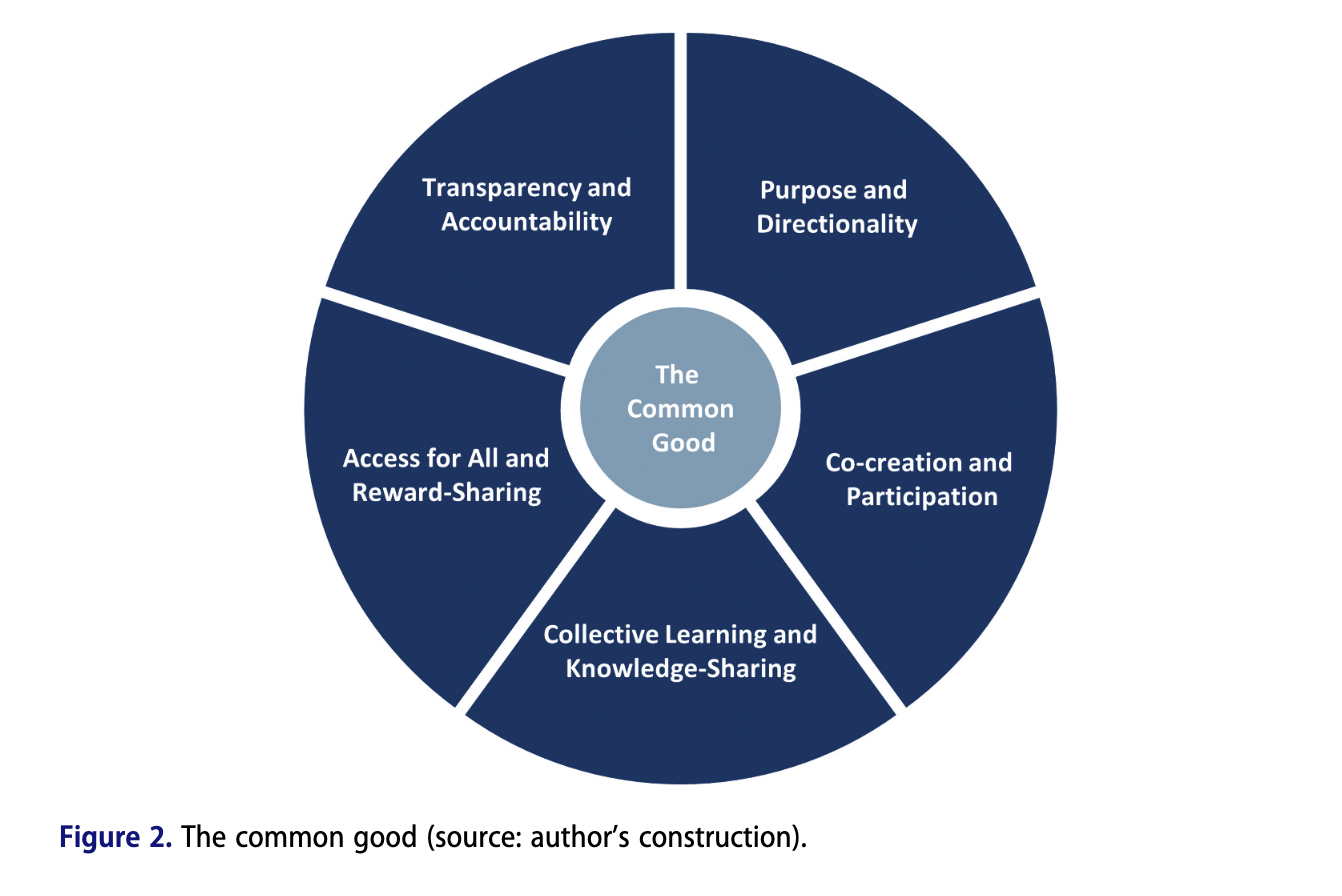

We talk about fixing market failures. But what if the real failure is our failure to imagine a different economy?
Reading Mariana Mazzucato's new article (see 👇 ), "Governing the Economics of the Common Good," I was struck by how deeply we have internalized the idea that neutrality is enough. For decades, we have treated the economy as a natural phenomenon, with the state stepping in only to fix occasional failures. Governance, in this view, should remain procedural, technical, impartial — avoiding any ambition to define the collective good. Yet as I read Mazzucato’s argument, it became clear how inadequate this imagination has become.
Climate breakdown, inequality, and systemic fragility are not isolated malfunctions of an otherwise healthy system. They are the result of allowing markets to drift without collective purpose or direction. Mazzucato shows that markets are never neutral. Instead they are always shaped, whether by deliberate choices or by the inertia of existing power structures.
Fixing failures after the fact is no longer enough. We need to ask, more fundamentally, what kind of economy we are building and for whom.
Mazzucato proposes a bold but pragmatic shift: to govern markets around the common good, not by retreating into top-down control, but by embracing collective goal-setting, co-creation, and shared accountability. She outlines five interconnected pillars: 1) setting purpose and directionality, 2) fostering participation, 3) building collective intelligence through open knowledge-sharing, 4) ensuring broad-based access to rewards, and 5) embedding transparency and democratic accountability at every level. Governance, in her view, is not a repair job. It is a creative, participatory act of shaping the economy toward human flourishing.
The more I reflect on it, the clearer it becomes: neutrality has a lot of unintended consequences (say a Swiss). It is a choice but not always the best one.
The future will not be shaped by those who stand aside. It will be shaped by those willing to ask what we owe each other — and to build an economy that answers.
Link to article: https://www.tandfonline.com/doi/full/10.1080/17487870.2023.2280969
24-04-2025



What if the Purpose of Education Isn’t to Know More — But to (Moral) Becoming?
For centuries, education in the West has been tethered to a humanist ideal: we teach in order to realize some fixed human nature whether that’s the rational thinker, the responsible citizen, or the productive worker. In this view, education is about qualification and socialization. It is about equipping people with knowledge, and integrating them into society. But what if education is not about fulfilling a predefined essence but more about becoming a subject in response to others?
This is where Emmanuel Levinas offers something radical: a different foundation for subjectivity. He challenges the idea that we begin as autonomous individuals. For Levinas, we become subjects because we are interrupted - called into responsibility by the face of the other. Ethics comes before identity. Responsibility precedes freedom.
Two educational responses to Levinas have emerged:
🧠 Gert Biesta: A Pedagogy of Interruption
Biesta argues that education serves three functions:
(1) Qualification, (2) Socialization and (3) Subjectification. The problem, he says, is that subjectification has been reduced to normalization. We don’t foster genuine selves but we produce conforming individuals!
Levinas helps here. For Biesta, education must become an interruption: disrupting the student’s self-certainty. Subjectification begins when a learner is de-centered and made responsible for more than themselves.
🧠 Guoping Zhao: A Pedagogy of Becoming (deep dive)
Zhao agrees, but offers a crucial correction: Biesta overstates the passivity in Levinas. There is more to subjectivity than being endlessly interrupted.
Levinas’s subject is not erased. It returns, but changed. Zhao highlights the dialectic at the heart of Levinas’s thought: the self moves between being and not-being, presence and exposure, identity and responsibility.
Subjectivity, then, is not fixed, but neither is it void. It is a moral and historical becoming—a continuous effort to respond to the other while still gathering a self that can act justly.
Zhao also cautions against the posthumanist rush to abandon the subject altogether. The task is not to erase subjectivity, but to recover its ethical depth; to attend to what Levinas calls the trace, the absent presence of the other that calls me to be more than I am.
❓ Why It Matters
In an age of metrics, standardization, and moral uncertainty, this reframing of education is urgent.
We don’t just need better outcomes. We need deeper becomings!
Levinas invites us to ask:
1) What kind of self is education forming?
2) Is it capable of responsibility?
3) Can it respond to absence—to injustice, suffering, or the call of the other?
Education, then, is not just about producing knowers. It’s about forming subjects who are unfinished, responsive, and ethically alive.
20-04-2025



Bullies Arriving - And Why Systems Let Them Win
What if bullying isn't a flaw in the system—but the result of how the system is designed?
I just read a comprehensive review of 20 years of workplace bullying research (Samnani & Singh, Aggression and Violent Behavior, 2012). It's about toxic organizations but it felt disturbingly close to the state of U.S. politics today. Here's what the research found:
Who bullies?
Bullies are often deeply insecure: neurotic, emotionally volatile, driven by negative affect. They may have high stress jobs or feel entitled because they believe they can get away with it. Some were once victims themselves.
Who gets bullied?
People who are less powerful: those with lower self-esteem, more anxious, less socially connected. Often, women and ethnic minorities are disproportionately targeted. The same traits that make someone hesitant to fight back also make them visible to those looking for someone to dominate.
What enables bullying?
👊 Bystanders stay silent, often out of fear.
👊 Leaders disengage, or worse, model authoritarian behavior.
👊 Group norms shift: bullying becomes normalized.
👊 Toxic cultures reward aggression: especially in competitive, individualistic, high power-distance environments.
👊 Rules are vague or unenforced, signalling tacit approval.
The system doesn’t just tolerate the bully—it rewards them. Promotions, visibility, influence. Others mimic their behavior. Bullying spreads.
One chilling line from the study: “Some organizations perceive bullying as an efficient way of inducing performance.”
It’s not about one person. It’s about how the system is built to protect and elevate the wrong kind of strength.
💬 Reading this, I didn’t just see workplace dynamics. I saw the U.S. (top floor) government. A neurotic (and what not else) president lashing out. Women and minorities in the crosshairs. A party (or maybe even two?) standing by. A culture that mistakes bullying for leadership. Law and accountability fading into theater. Competitive zero-sum politics masquerading as democracy. Not a company—but the same script. The system makes the bully. Unless we change the system.
19-04-2025

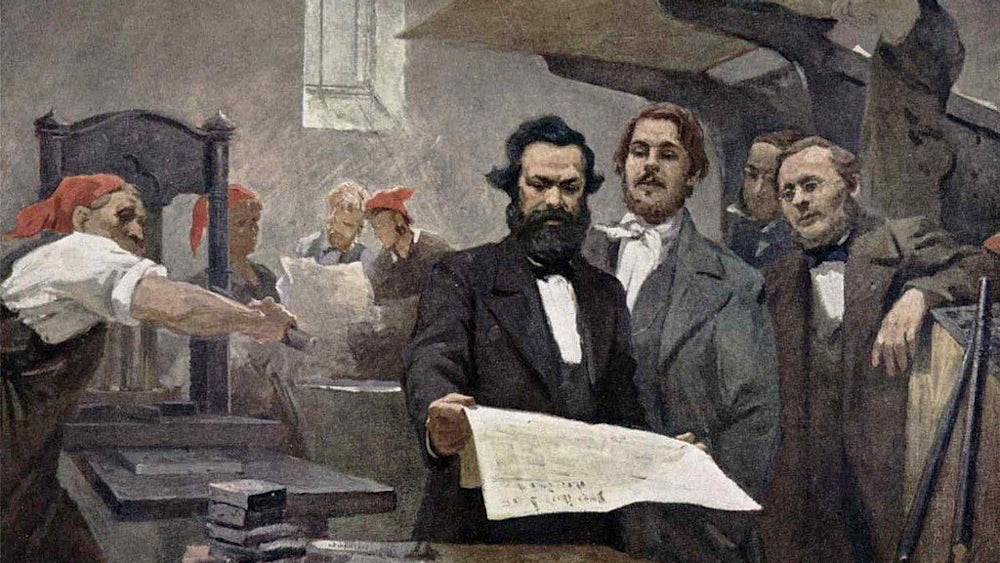

An Interview with Karl Marx, Friedrich Engels and Pope Francis
What happens when you bring Karl Marx, Friedrich Engels and Pope Francis into a joint discussion - not as a provocation, but as a serious invitation to analyze?
In an unusual chapter entitled “Last Call” (Schäfer/Ludwig, 2025), central passages from Das Kapital, the encyclical Laudato si' and other texts are juxtaposed in such a way as to create a factual, profound dialog. It is not an essay on ideological reconciliation, but an invitation to look at the seriousness of the ecological situation from different traditions of thought.
What becomes visible: The criticism of an economic system that systematically overburdens the environment and people is not an exclusively left-wing or religious position. It is a common observation.
Marx and Engels clearly describe how the capitalist mode of production destroys the natural foundations of life, always out of internal system logic. Profit takes precedence over conservation. The soil is depleted, the workforce exhausted, the environment externalized. Engels speaks of nature's “acts of revenge” when man believes he can control it.
In Laudato si', Pope Francis also names an ecologically and socially disintegrating dynamic, driven by a “technocratic paradigm” that confuses everything that is feasible with progress. He also speaks of a destruction of the foundations of life, and he also names structural causes - including a global system that enables exploitation in the global South while the North profits from it.
What is interesting here is less the similarity in the choice of words than the parallelism in thinking: both sides call for a profound change in perspective. Humans are not above nature. They do not have a right of ownership over the world, but a responsibility. Francis says: “We are not the owners of the earth.” Marx criticizes a mode of production that has no regard for ecological limits or social issues.
The fact that these analyses are so close today is probably due to the seriousness of the situation. And one may wonder why it has taken so long for the Church to formulate such a critique of the system, despite Francis of Assisi and the long tradition of preserving creation.
But one thing remains clear: Francis is not a Marxist. But when a pope and a critic of capitalism draw similar conclusions on key issues of responsibility and ecological limitation, it is worth listening. We certainly need both at the moment: an ethical and a structural critique. A moral stance and an economic rethink.
And it is certainly time to read Marx again - not to be right, but to better understand what has brought us into this situation.
Because one thing is clear from this intellectual dialog: we should behave as stewards, not owners, of the earth.
Link to article: https://link.springer.com/content/pdf/10.1007/978-3-658-44410-5_3
18-04-2025

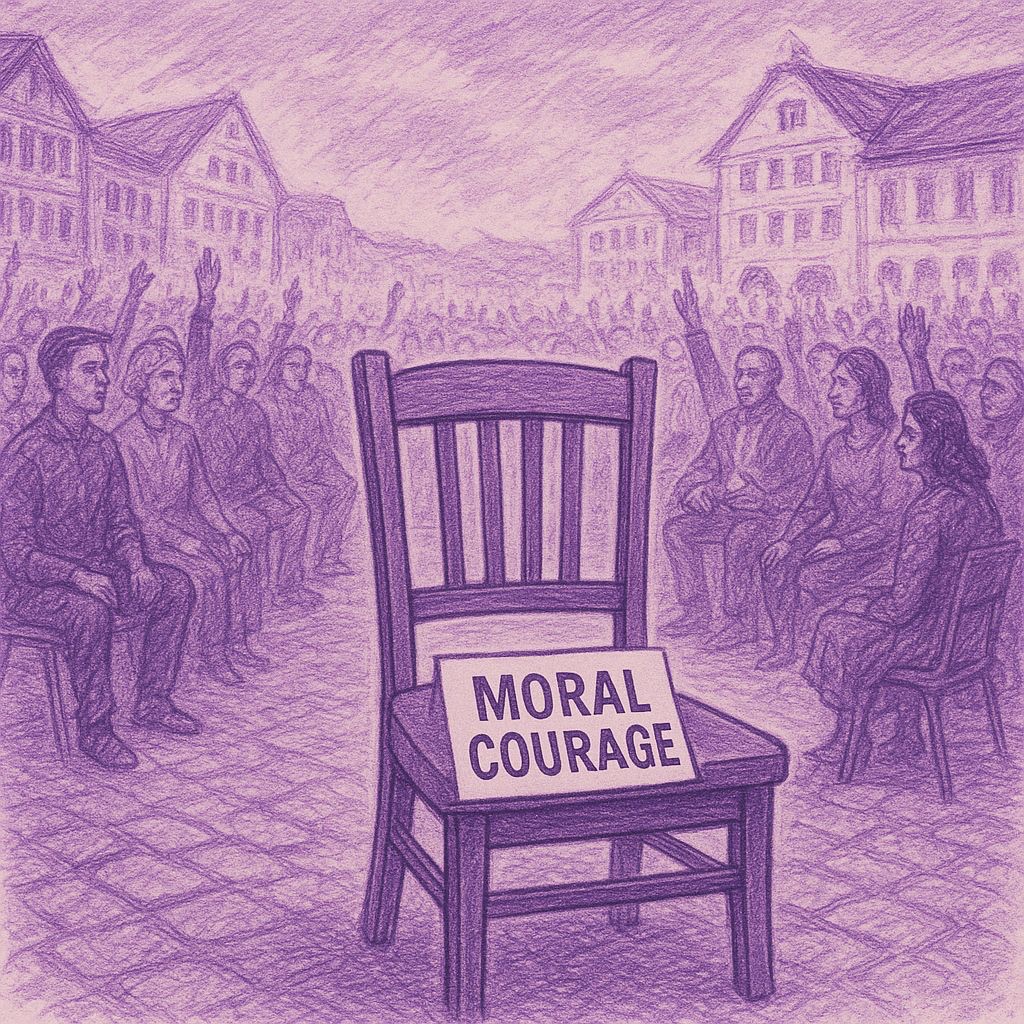

What is the Price of Morality?
A friend said to me recently: “Why make such a fuss? You live in safe, secure Switzerland. The US is far away.” And yes, materially speaking, he’s right.
We have little to lose when we speak up. Maybe a fraction of GDP. Maybe some trade friction. But we are not the ones dragged from our homes. We are not the ones jailed without trial. We are not the ones whose judges are ignored, whose rule of law is hollowed out in real time.
And precisely because we have so little to lose, our silence becomes indefensible.
What does it cost us to speak the truth? To support those trying to hold the line? To offer solidarity—not just thoughts and prayers, but real consequences, real political stance?
Hannah Arendt once wrote:
“The sad truth is that most evil is done by people who never make up their minds to be good or evil.”
When morality becomes cheap, and we still refuse to pay the price—what does that say about us?
What, if anything, are we still willing to risk for justice?
16-04-2025

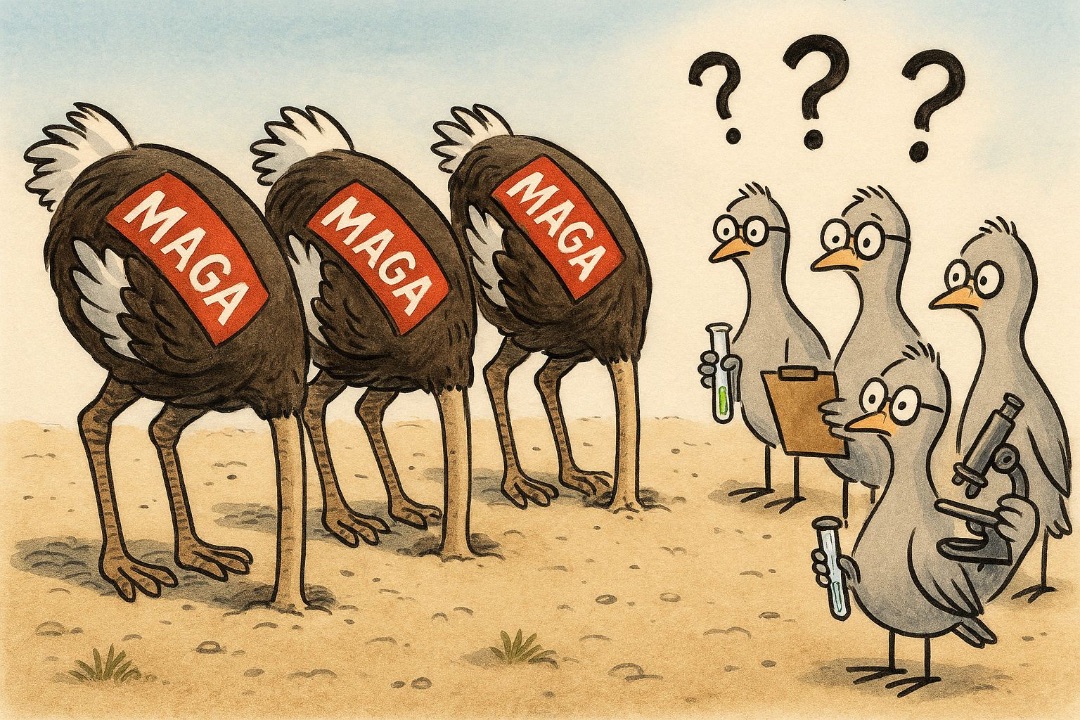

🔬 Still Trusted, But Under Fire: When Science Meets Ideology
The good news? Science is still broadly trusted.
The bad news? That trust is eroding—unevenly, and tellingly.
A new large-scale study in Nature Human Behaviour confirms a persistent pattern: liberals in the U.S. show consistently higher levels of trust in scientists than conservatives. That in itself may not be surprising. But what should give us pause is where these gaps appear most sharply.
Trust is not equally distributed across disciplines. It falters where science touches societal fault lines: climate change, public health, environmental impact, social inequality. In other words, where science doesn’t just describe the world, but suggests we may need to change it.
This isn’t a blanket rejection of science—it’s a selective one, driven by perceived threats to identity, ideology, or economic interests. And it’s not unique to the U.S. Other countries show similar patterns, though the divide is particularly stark here.
Even more troubling: the study tested five carefully designed interventions to bridge this ideological trust gap. They tried framing science in conservative values, showcasing credible conservative scientists, highlighting shared benefits, and more. None of them worked.
Once science is ideologically discredited, it’s hard to shake that off. Distrust appears sticky—rooted less in information than in identity. That’s not just a communications problem. It’s a governance problem. A societal one. An ethical one.
Because when scientific authority is accepted only when it aligns with existing worldviews, collective action becomes nearly impossible. And yet, the challenges we face—from pandemics to planetary boundaries—demand just that: coordinated, evidence-based, cross-ideological responses.
Maybe the answer isn’t persuasion, but dialogue. It takes us scientists to embrace engaged scholarship while still walking the fine line to show that we remain critical and apply rigor. And it takes the remaining sane governments to speak up—to show they are trusting in science.
Because trust isn’t built through slogans— It’s lived, shared, co-created.
Link to article: https://www.nature.com/articles/s41562-025-02147-z
14-04-2025

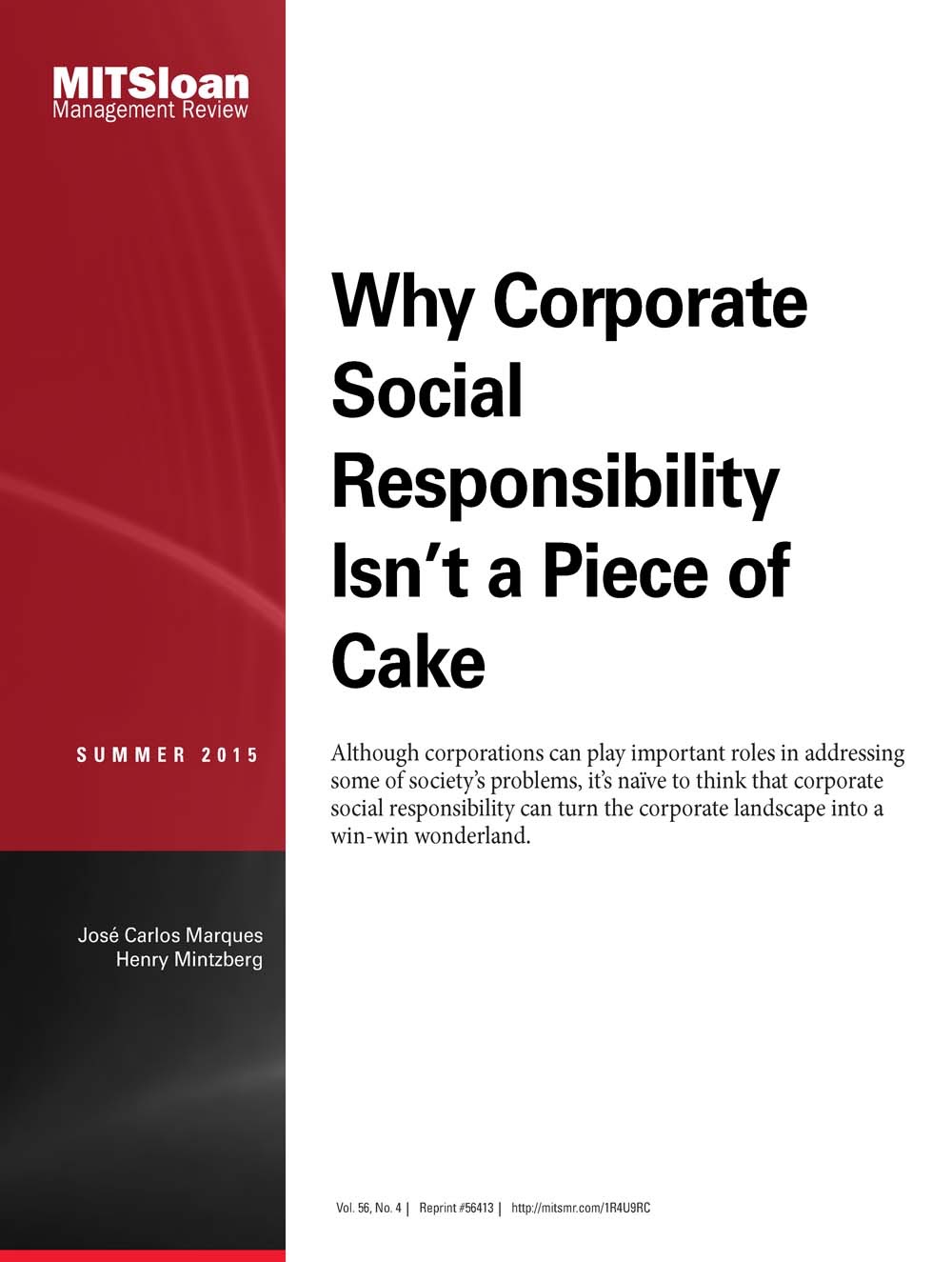

“Everyone deserves a slice of the cake.” Sounds nice. But is it enough?
Mintzberg and Marques take aim at the illusion that corporate social responsibility (CSR) can be both easy and effective. They dissect four familiar metaphors:
1) “Let them eat cake” (Friedman’s profit-only logic),
2) “Icing on the cake” (CSR as PR or philanthropy),
3) “Everyone gets a slice” (stakeholder balancing),
4) “Having your cake and eating it too” (the win-win CSR fantasy).
Each, they argue, hides structural contradictions and reinforces the status quo.
One metaphor deserves a closer look: “everyone deserves a slice.” The stakeholder view acknowledges a broader set of duties—but, as Mintzberg points out, it rarely offers a meaningful way to resolve conflicts between stakeholders. It often becomes moral vagueness, not moral clarity.
👉 This is where his critique hits home. Real responsibility isn’t about treating all interests equally—it’s about ethical contextuality: the capacity to judge, to deliberate, to weigh what truly matters in a given situation. Not every issue is of equal weight, but each deserves conscious attention. This kind of judgment—messy, grounded, situated—is where ethics lives. The slice doesn’t just need to be shared. It needs to be justified.
So what’s the alternative to CSR slogans? Mintzberg calls for attention to the bread and butter of responsible business. He names six essentials:
1) Fostering ethical judgment
2) Rethinking executive compensation
3) Acknowledging the role of regulation
4) Holding lobbying to account
5) Empowering the plural sector
6) Building cross-sector collaboration
Two stand out.
Regulation. Without it, pretending to be good will almost always outcompete being good. Greenwashing is cheaper than transformation. If we want responsible companies to succeed, we must design a level playing field—where integrity isn’t a disadvantage.
👉 I often see how regulation is dismissed as a constraint—yet without it, the market penalizes moral commitment. Decency needs not just courage, but conditions. It's time we acknowledge that voluntary goodness isn't enough.
Cross-sector collaboration. Complex problems demand partnerships. But responsibility cannot dissolve in the process. Just because labor is divided doesn’t mean responsibility can be. We need collective responsibility that’s aware of interdependence—but refuses to blur accountability.
👉 For me, this is the ethical core: even in a fragmented world, we must hold on to the idea that the common good belongs to us all. Complexity should be an invitation to moral cooperation, not an excuse to look away.
We don’t need another slice of cake. We need to bake better bread.
Link to article: https://sloanreview.mit.edu/article/why-corporate-social-responsibility-isnt-a-piece-of-cake/
10-04-2025



ESG Isn’t Dead—but It May Have Lost Its Soul
Deep Dive and Reflections on Alex Edmans’ “The End of ESG”
Alex Edmans makes a good argument: ESG is both “extremely important—and nothing special.” That’s not a contradiction. It’s a call to more thoughtfulness in a field focused too squarely on metrics, labels, and performance "theatre".
Here’s where his critique cuts deepest:
1. ESG Is Not a Add-On, rather it should be fully integrated! By isolating ESG from mainstream business practice, we risk turning it into an ornamental badge—rather than a way of seeing. If a factor matters for long-term value, why carve it out as “extra”?
Implication: The real question is not whether something is “ESG enough,” but whether it serves the good life—for people, planet, and the enterprise.
2. ESG Metrics Risk Hollowing Out Meaning! What gets measured may get managed—but only if it still carries meaning. Most ESG metrics reward harm reduction, not value creation. Worse, they invite us to manage by compliance rather than by conscience.
Implication: We need fewer indicators that reassure stakeholders—and more that challenge us. Ask: Does this metric cultivate practical wisdom? Or just signal virtue?
3. ESG-Linked Pay Can Undermine Moral Motivation! Tying executive pay to ESG goals seems progressive—but it reduces complex moral trade-offs to contractual proxies. Edmans reminds us: leaders may “hit the target but miss the point.”
Implication: Stewardship is not a KPI. It is a character. Let’s build practices that form moral motivation, not just incentivize performance on pre-approved metrics.
And the rest, briefly—but no less urgently:
4. ESG Doesn’t Own Externalities! Innovation, care, and courage also generate public value. Let’s resist the temptation to sanctify ESG while ignoring other moral forces within business.
5. ESG Funds Deserve Scrutiny, Not Sanctimony!Engagement is vital—but not inherently more noble than strategic or cultural transformation. Every fund owes its investors honesty.
So, what now?
If ESG is to matter, it must stop trying to be special—and start becoming sincere. This is not about metrics or mandates. It’s about whether business can serve the common good with integrity, beyond the performance.
Let’s return to the deeper question: What kind of world is our business helping to build? And what are we becoming while serving the world proper?
Link to article: https://doi.org/10.1111/fima.12413
10-04-2025

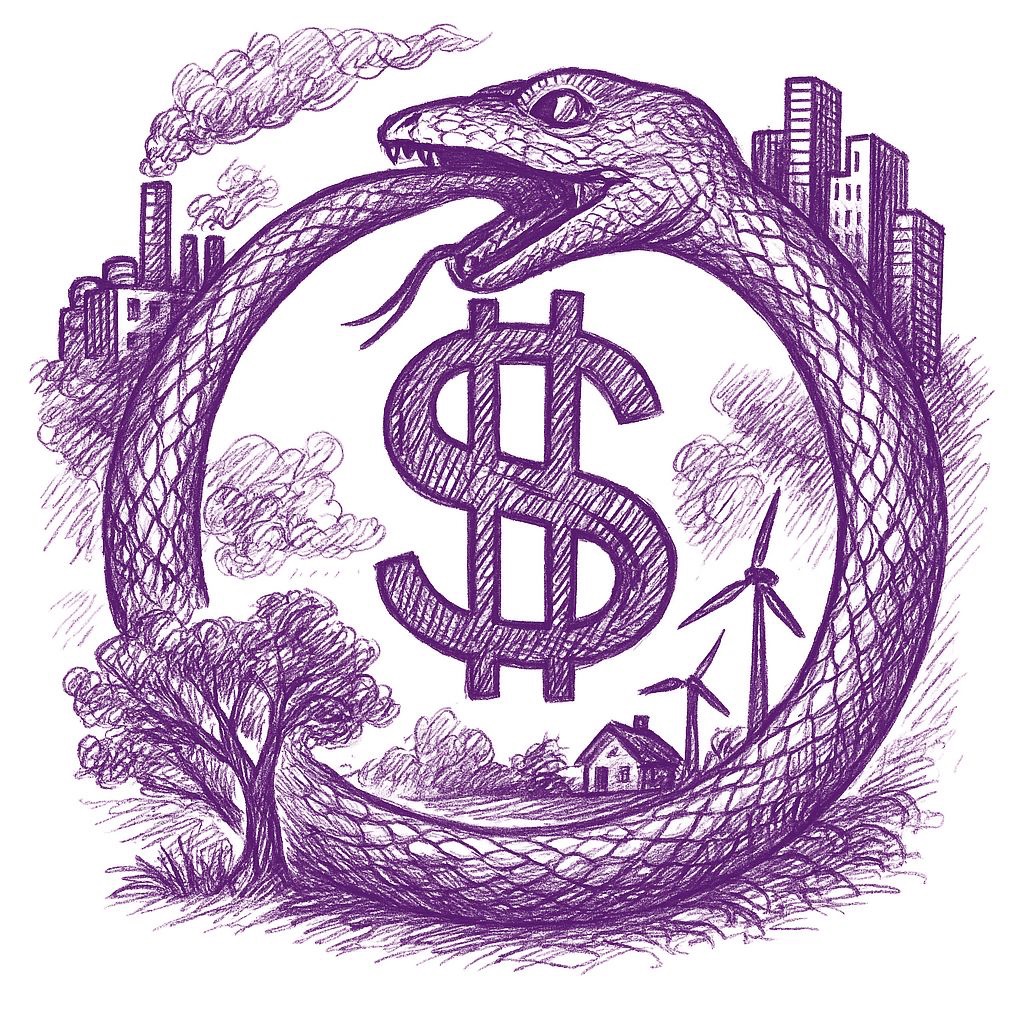

At least that’s what Anselm Schneider argues — and he might be right.
In his article “Bound to Fail? Exploring the Systemic Pathologies of CSR”, Schneider challenges the foundational assumption that Corporate Social Responsibility can serve as an effective remedy for capitalism’s social and ecological harms. On the contrary, he shows that CSR often reproduces the very dynamics it claims to oppose.
He identifies three core pathologies:
➊ Market Expansion
CSR often acts as a vehicle for commodification. It extends capitalist logic into spheres previously governed by public values — from education and health to environmental protection. Under the guise of responsibility, it broadens market reach and deepens dependence on corporate solutions.
➋ Indoctrination
CSR reshapes how we think. It aligns social concerns with business logic, portraying companies as ethical agents while naturalizing capitalist rationality. It contributes to a business ontology that renders alternative modes of organizing and valuing almost unthinkable.
CSR allows firms to present themselves as moral actors while maintaining harmful practices. Through glossy reports, stakeholder dialogues, and symbolic gestures, companies secure public approval — not by changing, but by appearing to care.
At its core, Schneider’s message is this:
CSR doesn’t cure capitalism — it stabilizes it.
It absorbs critique, disarms resistance, and forestalls structural transformation.
Even more disturbingly, CSR research itself risks becoming complicit — by focusing on incremental improvements without challenging the macro-systemic forces that constrain corporate behavior.
Schneider invites us to go deeper.
To explore how capitalism’s expansionary dynamics — both material and symbolic — shape the possibilities of responsibility in the first place.
To recognize that addressing the symptoms through CSR, without tackling root causes, will not suffice.
So what now?
It may be time to stop perfecting the patchwork.
Not just better CSR.
Not just more metrics.
But a reimagining of the firm-in-system — one that confronts power, rewrites purpose, and opens space for alternatives to emerge.
Are we ready to do that work?
01-04-2025

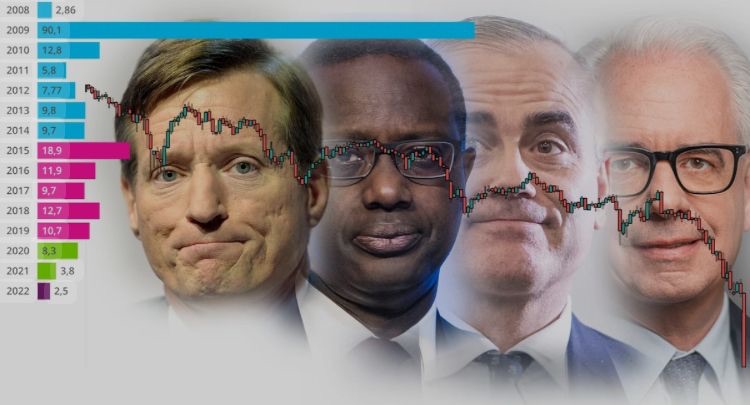

Is This What Meritocracy Looks Like? A Fraudulent Label.
For some time now, a term has been haunting management handbooks, keynotes and HR strategy papers: meritocracy. Sounds modern, fair, performance-oriented. But the term was originally a warning - in 1958, Michael Young described in a dystopia what a society that idolizes performance and ignores everything else looks like: Origin, opportunity, chance, structural inequality.
Today we can see how right he was.
Because the very question of who is actually “the best” is highly political. Is it about turnover? Visibility? Network cultivation? Or is it about integrity, vision and a sense of responsibility? Good leadership requires more than just performance. It takes aptitude - and maturity.
But potential is difficult to measure. And so we promote what is visible - and overlook what is effective. We measure what is easy to count - and ignore what is elusive but crucial: judgment, attitude, the ability to listen.
Then there are rope teams and status games. The higher the level, the more what counts is how you look - not how you act. Those who get through confuse luck with merit. And forget that no one gets to the top alone.
This is precisely why we need a serious DEI - as a structural corrective. Not as a symbolic policy, but as a response to systemic failure. Those who make it into talent pools must not be selected on the basis of brilliance and stable smell. And those who make it to the top should know this: Success is never just merit - it is also chance and context.
Modesty would then not be a career obstacle, but a selection criterion.
So dear UBS, Novartis - and you SAPs of this world:
Do you really want to stick with these selection patterns? You have abolished DEI programs - but without structural corrective measures, meritocracy is a fairy tale.can we afford to do without understanding, diversity and dignity?
And for those who don't want to recognize the picture: It shows the “perfectly selected”, “top-rated” talents who have ruined Credit Suisse with their glittering CVs - and equally glittering arrogance (alternatively, you could now add the new team in the White House).
So much for meritocracy in action.
31-03-2025

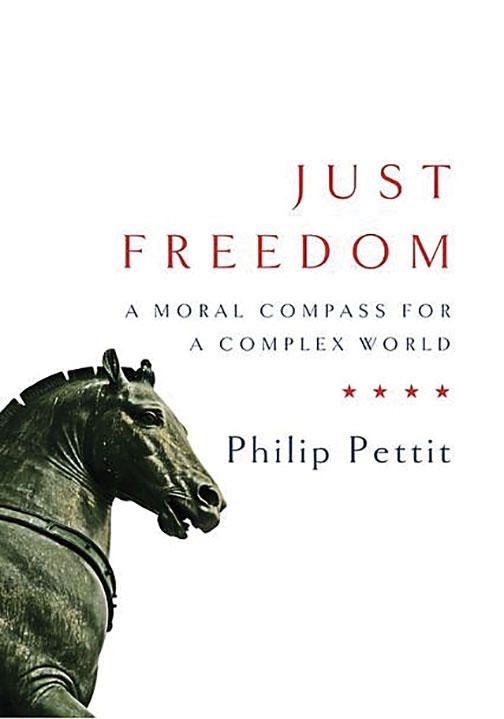

Trump and his circles are threatening more than just America. The wave of backlash is already spilling over—and some of our institutions here in Europe seem eager to comply before even being asked.
Calls to ditch DEI, to keep the golf-buddy highway to power intact, to return to outdated norms: short hair is suddenly “inappropriate” for women, emotions “unmanly,” rainbow colors “too loud.” All this, not in the name of freedom, but in the name of fear.
And sadly, some Swiss corporations seem to align without hesitation—UBS Roche Novartis just to name the known examples. But isn’t this deeply Unswiss? Since when do we bow to foreign pressures? Our constitution commits us to use our strength for the weakest among us. Not to serve the powerful few.
So maybe what we need is not less DEI—but more moral imagination.
Let’s rename DEI for what it should have always been: JUST FREEDOM.
Not about productivity. Not about virtue signaling.
But about freedom from arbitrary domination.
Freedom from autocrats and power-drunk narcissists.
Freedom to meet eye to eye.
Freedom to build systems that don’t reward privilege and bias, but fairness and shared dignity.
This is the moment to show your true colors.
So the rest of us can adjust—
With our voices.
And with our wallets.
29-03-2025



A Good Economy Needs More Than Just Good-Willed Companies
The idea of stakeholder capitalism has captured the imagination of many. It promises a world where businesses don’t just maximize shareholder profits but create value for all stakeholders—employees, communities, customers, and the environment.
This vision is appealing. It reminds us that business is not just economic—it is inherently moral. That the purpose of the firm is not simply to extract but to contribute. That value creation can and should be mutual.
But let’s be honest: that’s not enough says Hargrave ( 👇 ).
Why good intentions are not sufficient
The problem is that even well-intentioned firms operate within a broader economic system—a system governed by laws, incentives, institutions, and, yes, power. And in that system, bad actors can still win. Exploitative business models—those that pollute, underpay, or extract short-term gains—can outperform the regenerators if the institutional playing field rewards the wrong metrics. Good firms alone cannot fix a broken system. In fact, they risk being outcompeted, bought out, or pushed aside.
That’s why a good economy requires more than goodwill. It requires rules that reward responsibility and regulations that constrain harm. It requires a state that ensures the background conditions of justice: fair markets, rights protection, and real consequences for externalizing costs onto others.
Corporate governance and it’s internal design matter too. If we want firms to serve all stakeholders, we must ask: Who owns them? Who governs them? Whose voices count?
So far, stakeholder capitalism has largely relied on managerial discretion—hoping that enlightened leaders will do the right thing. But leadership is fragile. It changes. Incentives drift. Without formal governance structures, without ownership models that anchor long-term purpose, we risk hollowing out even the best intentions. We need new forms of stakeholder governance—structures that give employees, communities, and future generations a seat at the table.
But there is a further missing piece: civic bonds
And even then, even with responsible firms and a responsive state—something is still missing.
We also need civic strength. We need movements, networks, and associations that connect those who care about the common good. Civil society is not a backdrop—it’s a force. It pushes for better regulation, supports the firms that want to lead, and resists the rollback of hard-won gains.
If we want to change the system, we need not just companies and laws—we need commitments and coalitions. We need to act not just as professionals or consumers, but as citizens.
The takeaway?
A good economy is not just a collection of good companies. It is a well-ordered system—with ethical firms, just institutions, and a vibrant civil society working in concert. It’s time we stopped treating stakeholder capitalism as the full story. It’s a good story—but not the whole one.
Link to article: https://doi.org/10.1111/beer.12774
27-03-2025

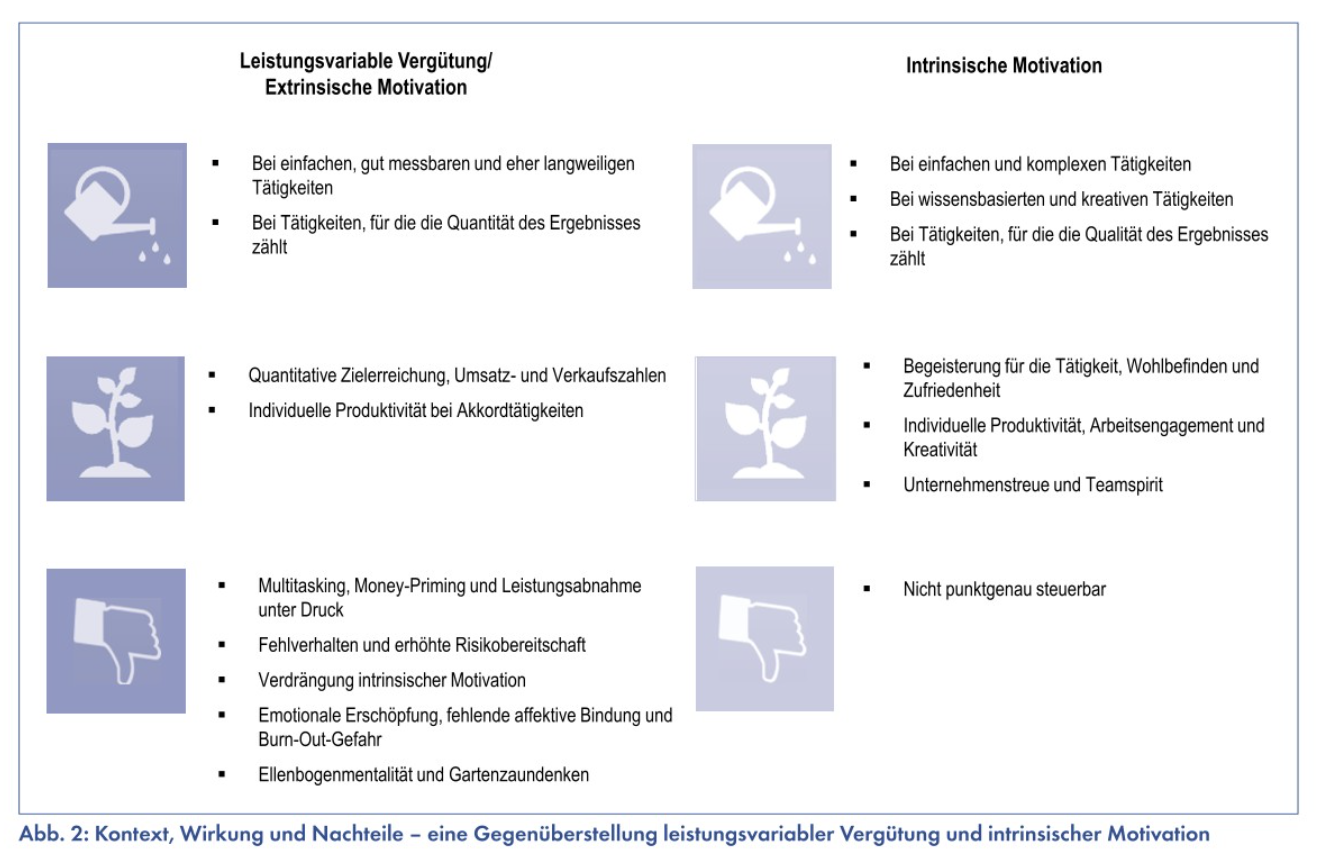

Back to the 80ies?
Gordon Gekko would be delighted: bonuses and target agreements are back in fashion, as if we hadn't learned anything since shoulder pads. “There is no alternative” seems to be the HR mantra again - at a time when we should actually know better.
After all, the great triumph of performance-based remuneration that began back then has brought whole armies of remuneration consultants into the workforce - but in many organizations it has had exactly the opposite effect of what was promised. Instead of performance: false incentives. Instead of commitment: a mercenary mentality. Instead of enjoyment at work: pressure, demotivation and the risk of burnout. And, as the article by Anastasia Sapegina and myself ( 👇 ) shows, the bottom line may even be less overall performance.
What many overlook: Variable performance-related pay works - but only under very specific conditions. It may increase productivity in boring, easily measurable tasks. But wherever thinking, creativity, teamwork or even meaning are required, it does more harm than good. It suppresses intrinsic motivation, reduces emotional attachment to the company and weakens the willingness to take on responsibility or go the extra mile.
The paradoxical result: the carrot that is supposed to motivate becomes a blinder. Employees focus on what is rewarded - and leave everything else behind. Collaboration? Learning? Ethical reflection? If they are not paid: irrelevant. Welcome to the multi-task dilemma and the monetization trap.
But there is an alternative - even from the 80s (if you must). Not everything was greed and glitz. Think of the HP Way: a corporate culture that focused on trust, purpose, personal responsibility and development. Or the Montreal Protocol - when countries around the world joined forces to save the ozone layer. The 80s could also be different: profound, progressive, even collective.
So why not revive the 80s? Instead of more bonuses, more relationship quality. Instead of pay-for-performance, room for purpose. Instead of extrinsic control, genuine trust.
👉 Our article summarizes the most important findings - and shows alternatives for how companies can focus on sustainable motivation and good performance without sacrificing the human element. And if you want to go even further - entrepreneurial power for good - please take a look at our manifesto.
Time to finally put out the Bonfire of Vanities.
Link to article: https://www.alexandria.unisg.ch/handle/20.500.14171/98950
26-03-2025

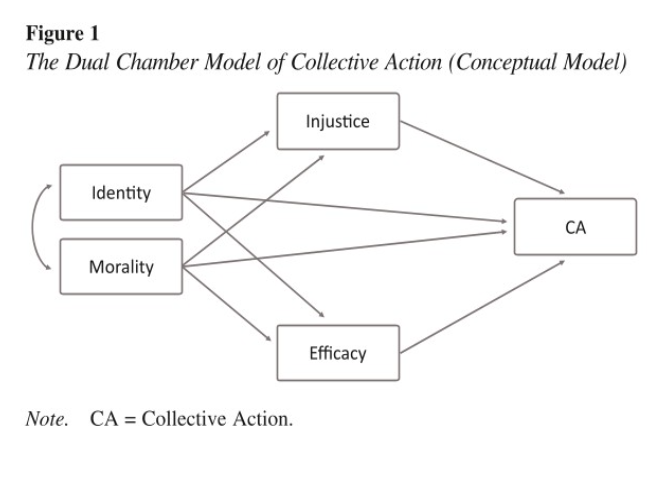

🧭 How to Organize Protest — A Crash Course for Those Who Still Care
If we want to defend democracy — and I mean actually defend it, not just write think pieces about it — we need to start studying what works when it comes to protest and solidarity.
Not someday. Now.
Because here’s the thing: democracies are not being overthrown in dramatic coups. They’re being quietly strangled by kleptocrats, hollowed out by oligarchs, and disfigured by bullies in suits. Bit by bit, checks and balances are weakened, dissent is criminalized, and the public is either distracted, divided, or demoralized.
📚 Enter a timely meta-analysis by Agostini & van Zomeren (2021), drawing on over 400 empirical studies and more than 120,000 participants. It’s the kind of research we should be printing on flyers and taping to café windows. Their model? Robust and grounded. They call it the “dual chamber heart” of protest.
At its core, collective action is powered by four intertwined forces: Identity. Morality. Injustice. Efficacy. (Or, in simpler terms: who I am, what I believe, what I feel is wrong, and whether I think I can do something about it.)
Let’s break it down.
💡 Identity gives people a sense of belonging — those who are directly affected, who are the movement. Think: parents of dark-haired girls being singled out at school. Neurodiverse kids systematically sidelined.
💡 Moral conviction is the real gateway to solidarity. It pulls in those who may not share the experience, but who recognize the violation of a fundamental principle: Every child deserves dignity. Equal opportunities are not negotiable. No one should be punished for who they are.
That’s the magic formula: concrete identity + universal moral cause. This is how you build bridges: From my child to all children.
From my experience to our values.
From my pain to a collective refusal to stay silent.
So yes — mobilize as a parent of a dark-haired girl. But do it in the name of women’s rights. Yes — speak up as a father of a boy with learning challenges. But let it be a call for equal opportunity for every learner.
Let specific pain feed universal outrage. This is how we resist — not just by standing against something, but by standing for something that touches many.
And one more thing: the research is clear — people will not act unless they believe it matters. Efficacy isn’t a nice bonus; it’s the engine of sustained resistance. If you’re organizing something, make it visible. Make it winnable. Make people believe that their voice is part of a force.
This is not the time for quiet despair. It’s the time to read, reflect, organize — and speak like it counts!
Link to article: https://doi.org/10.1037/bul0000256
23-03-2025



🧠 Where are the thinkers when democracy is under threat?
When human rights become “political.”
When climate science gets labeled “ideology.”
When companies are punished for standing by liberal values.
Thinkers50 calls itself the home of the leading management thinkers of our age. But in an age like this — why is the Radar so silent?
Where are the voices that unsettle, provoke, resist?
Instead of revelation, we get repackaging.
Instead of depth, "what sells"
Instead of truth, "what power wants to hear".
And let’s be honest: A ranking system for thought leadership might just perpetuate performativity.
Rewarding clarity over complexity, visibility over substance, and clever frameworks over moral courage.
Otto Laske reminds us: thinking isn’t a product.
It’s a process — dialectical, disruptive, developmental. It’s about seeing reality in motion, not fixing it into a deck.
So here’s the real question:
💥 What if Thinkers50 reclaimed thinking as an act of resistance?
Not market-friendly innovation, but truth-telling.
Not spotlighting stars, but amplifying dissent.
Not riding the wave, but revealing what lies beneath.
Because right now, if you’re a scientist — if you care about democracy, truth, or the conditions for human dignity — these are not normal times.
So Thinkers50: Will you keep celebrating what fits the system? Or will you start lifting up those who question the system itself?
The world doesn’t need more frameworks.
It needs more courage. And that by the way is asked from all thinkers out there (also those who never made it on the list).
20-03-2025

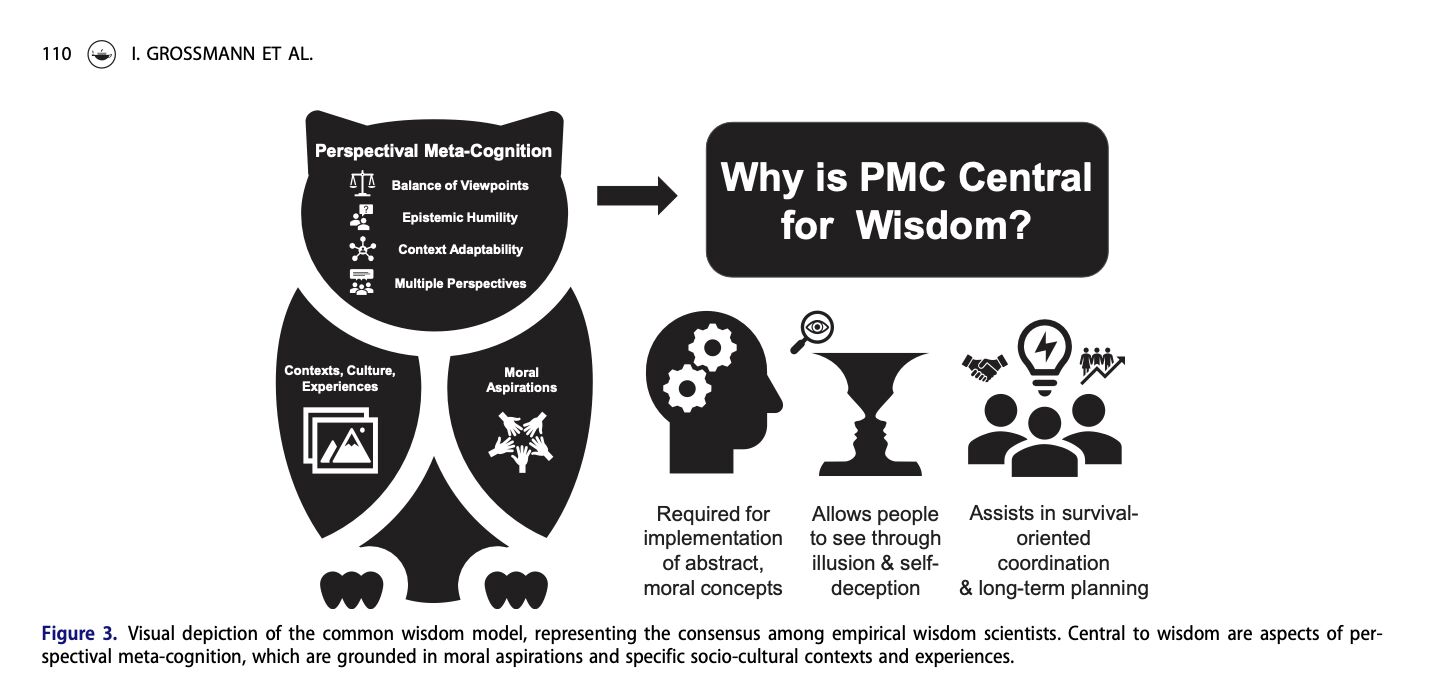

Practical Wisdom: Why We Need It – and Why We Rarely See It
Social critics and political pundits have sounded the alarm on the rise of incivility, the spread of misinformation, the growing distrust in institutions, and the lack of ethical considerations in our governance systems. A staggering 62% of the world’s population believes the world is getting worse. Meanwhile, social and behavioral scientists call for more intellectual humility and open-mindedness to navigate the complexities of our time.
At the heart of these concerns is a fundamental question: What is wisdom, and how do we investigate it scientifically?
An international group of leading psychological wisdom researchers has developed a shared conceptualization of wisdom, distinguishing it from related constructs such as empathy, humility, openness, and rationality. A key aspect of this conceptualization is practical wisdom (phronesis)—the ability to apply deep insight, moral sensibility, and adaptability in real-world decision-making.
What is Practical Wisdom (in Psychology)?
👉 A meta-cognitive process that enables people to navigate uncertainty, resolve ethical conflicts, and balance competing interests by considering multiple perspectives and long-term consequences.
It consists of two core capabilities:
✅ Moral Orientation – not rigid rule-following, but the skillful navigation between self-interest, compassion, and the well-being of the community.
✅ Perspectival Meta-Cognition – the ability to reflect on one’s own thinking to improve decision-making. This includes:
🔹 Epistemic humility – recognizing one’s own limitations and learning from different perspectives
🔹 Context adaptability – responding flexibly to various challenges
🔹 Perspective-taking – considering multiple viewpoints to see through illusions and self-deception
🚨 Why Do We See So Little Practical Wisdom in Leadership? Because we systematically select for the wrong traits. Research shows:
❌ We promote overconfidence, but we need humility. Bold certainty is mistaken for competence, while the ability to acknowledge limits and learn from others is overlooked.
❌ We reward egotism, but we need more interindependence. Self-centered ambition is seen as leadership material, while those who truly take responsibility for the greater good are often ignored.
💡 We must fundamentally rethink how we choose our leaders. Our selection systems—whether in business, politics, or society—need to prioritize wisdom over performative confidence and long-term responsibility over short-term self-promotion.
And in times when wisdom is lacking, we must actively spread and elevate positive role models—those who embody humility, moral courage, and deep insight. Because without wisdom, leadership becomes reckless.
Link to article:
https://www.researchgate.net/profile/Igor-Grossmann/publication/344940568_The_Science_of_Wisdom_in_a_Polarized_World_Knowns_and_Unknowns/links/6347165aff870c55ce1db3a2/The-Science-of-Wisdom-in-a-Polarized-World-Knowns-and-Unknowns.pdf
19-03-2025

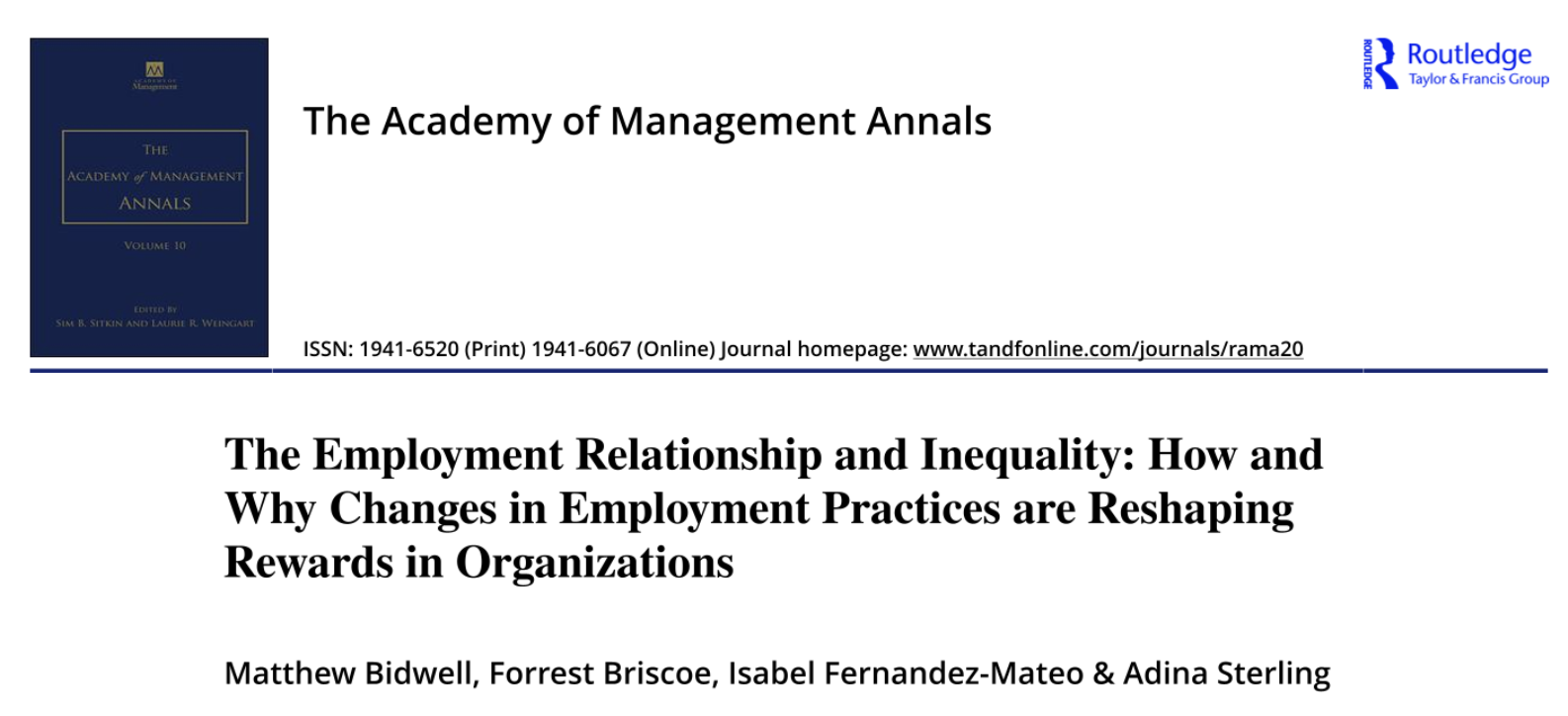

From Equal Opportunity to Executive Enrichment: The Quiet Corporate Retreat
CEO pay continues to climb while companies quietly scale back their commitments to diversity, equity, and inclusion (DEI). Across industries, we’re seeing layoffs of DEI teams, the rollback of work-family policies, and shrinking benefits—suggesting that many corporate commitments to fairness and inclusion were more symbolic than structural. At the same time, executive compensation and shareholder payouts remain at record highs.
A deep dive ( 👇 ) by Bidwell, Briscoe, Fernandez-Mateo, and Sterling (2013) reveals a long-term transformation of employment relationships—not just in the U.S., but across many economies—where stability, fairness, and internal career development have been replaced by market-driven employment models that concentrate rewards at the top while increasing precarity for workers.
🔹 Job stability has eroded. Long-term employment, once a cornerstone of corporate life, has been replaced by higher turnover, more layoffs, and a preference for external hiring—often disadvantaging those without elite networks.
🔹 The rise of contingent work. Gig work, temp contracts, and outsourcing mean fewer protections and more job insecurity—particularly for women and marginalized workers.
🔹 From fairness to hyper-individualism. Internal career ladders and seniority-based pay have been replaced by performance-based compensation, which the authors show often reinforces inequality rather than rewarding effort fairly.
🔹 The shift of risk to workers. Pensions have largely been replaced by defined contribution plans, employer-sponsored healthcare is shrinking, and benefits that once provided stability are now seen as business costs to be minimized.
🔹 Commitments to inclusion and fairness? Quietly scaled back. Many companies are cutting DEI initiatives, treating them as optional rather than core to business strategy.
The authors emphasize that these shifts didn’t just happen—they were deliberate corporate choices, shaped by the decline of unions, the rise of shareholder-first governance, and the increasing role of financial markets in shaping employment strategies.
So where does this leave us? If companies continue optimizing for short-term financial gains while scaling back their commitments to worker stability and inclusion, we risk further entrenching an economy where opportunity is increasingly reserved for the few. And as we see in the U.S., when economic power is concentrated at the top, it quickly translates into political influence—threatening the foundations of democracy itself.
📢 How should companies be held accountable for the employment systems they create? What needs to change?
Link to article: https://doi.org/10.1080/19416520.2013.761403
16-03-2025

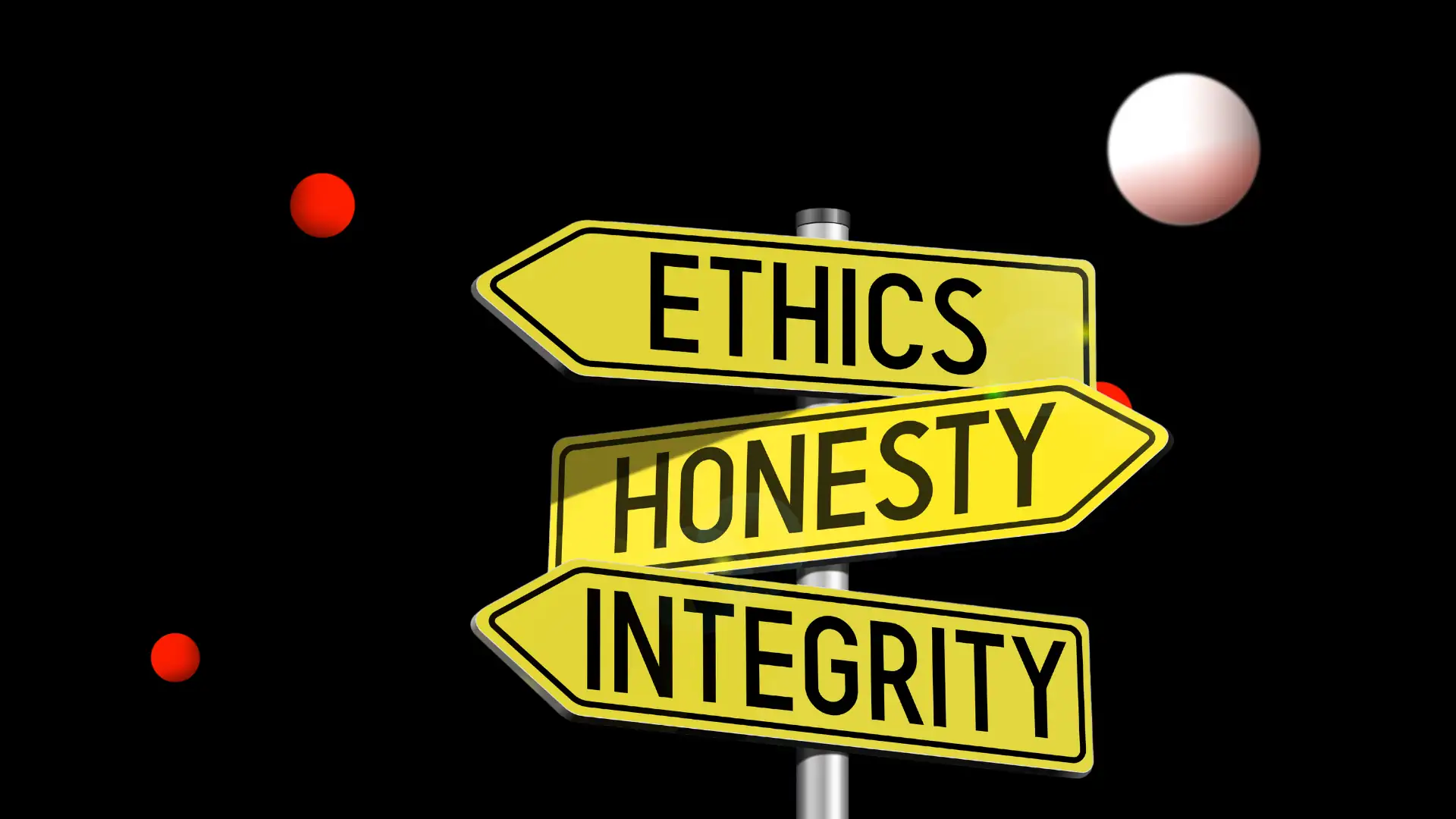

Moral Imagination: Why Companies Need Ethical Innovation
Why do some organizations navigate ethical challenges with aplomb, while others stumble time and again? The difference lies not in better compliance systems, but in a deeper skill: moral imagination.
Moral imagination (see article 👇) goes beyond compliance. It enables companies to ask not only: How do we avoid harm? But rather: How can we help shape a fairer, more sustainable world through our actions?
Three central dimensions:
1️⃣ Reproductive imagination: recognizing that one's own perspective is limited. “My view is incomplete.”
2️⃣ Productive imagination: Breaking down existing thought patterns, seeing the world through different eyes - especially those that are systematically excluded.
3️⃣ Free reflection: Discovering new ethical solutions beyond dilemma thinking.
How organizations can cultivate moral imagination?
✅ Institutionalize epistemic humility:
- Implement red teams that question existing assumptions
- Promote a culture in which uncertainty and not knowing are considered productive
- Rewarding intellectual humility
Orchestrate perspectival plurality:
- Building deliberative spaces in which diverse perspectives are not only heard, but actively integrated
- Inclusion of marginalized stakeholders - not as a PR measure, but as a necessary strategy to avoid blind spots
✅ Develop narrative competence:
- Training for leaders to recognize the implicit narratives that shape their moral judgment
- Using storytelling as a tool for ethical reflection and decision-making
✅ Enable ethical improvisation
- Create ethical sandboxes where teams can test alternative moral scenarios
- Promote a dynamic dialog between principles and lived reality instead of rigid rules
✅ Strengthen temporal-ethical thinking
- Promote future-oriented reflection: “How will this decision be judged in 10 years' time?”
- Align ethical standards not only with current expectations, but also with long-term social responsibility
Ethical innovation is not only created by individuals, but also by structures that expand rather than narrow the moral space of possibility. Organizational “affordances” are:
✔ Intellectual curiosity instead of defensive justification
✔ A culture of reflection that legitimizes deep thought
✔ Generative rather than extractive relationships with all stakeholders
The challenge for companies is therefore not just to respond to moral crises, but to create spaces in which ethical imagination can grow!
Link to article: https://doi.org/10.1111/basr.12206
13-03-2025



🌿 While the US Shouts "Drill Baby Drill," Here's a Practical Framework for Actually Giving a Damn
Just stumbled upon this really nice regeneration canvas that's perfectly timed as we watch politicians compete over who can dig up fossil fuels faster.
Let's get practical about what regeneration actually means: "the process of rebuilding or renewal of the COMMON GOOD" - taking an asset, ecosystem, community or place from crisis to recovery.
This "double loop" business model canvas flips the script on traditional business thinking:
🌿 It connects BUSINESS VALUE and COMMUNITY VALUE in a virtuous cycle
🌿 It asks what products/services you should TERMINATE (yes, sometimes less is more!)
🌿 It focuses on PROTECTING, REPAIRING, INVESTING & TRANSFORMING the commons
🌿 It measures MISSION COST alongside IMPACT
What makes this approach refreshing is how it forces organizations to face hard truths. The canvas asks: "What products and services do we terminate?" - a question most sustainability initiatives conveniently avoid.
While politicians debate whether climate change is real (spoiler: it is), frameworks like this give businesses practical tools to stop pretending that slapping "eco-friendly" on the label is enough. But let's be clear - this is just a starting point. Real regeneration will require deeper systemic change, challenging ownership models, and fundamentally rethinking whom we are serving, with what good purpose.
To round it up a comment from the originator Christian Sarkar 🌱🇺🇦🇵🇸: "Our institutions are not fit for purpose – either because they are corrupt, or because they lack the imagination and will required for the tasks at hand. The same can be said for our leaders. They have betrayed the public trust.
For forty years the institutions of the world have worked to “mitigate” climate change with no results – or worse – failure to stop the rapid destruction of the ecosystems which keep us all alive. Leaders and businesses have largely ignored the cries of our dying planet." Or to say it with Mintzberg: lets stop corporate irresponsibility!
12-03-2025

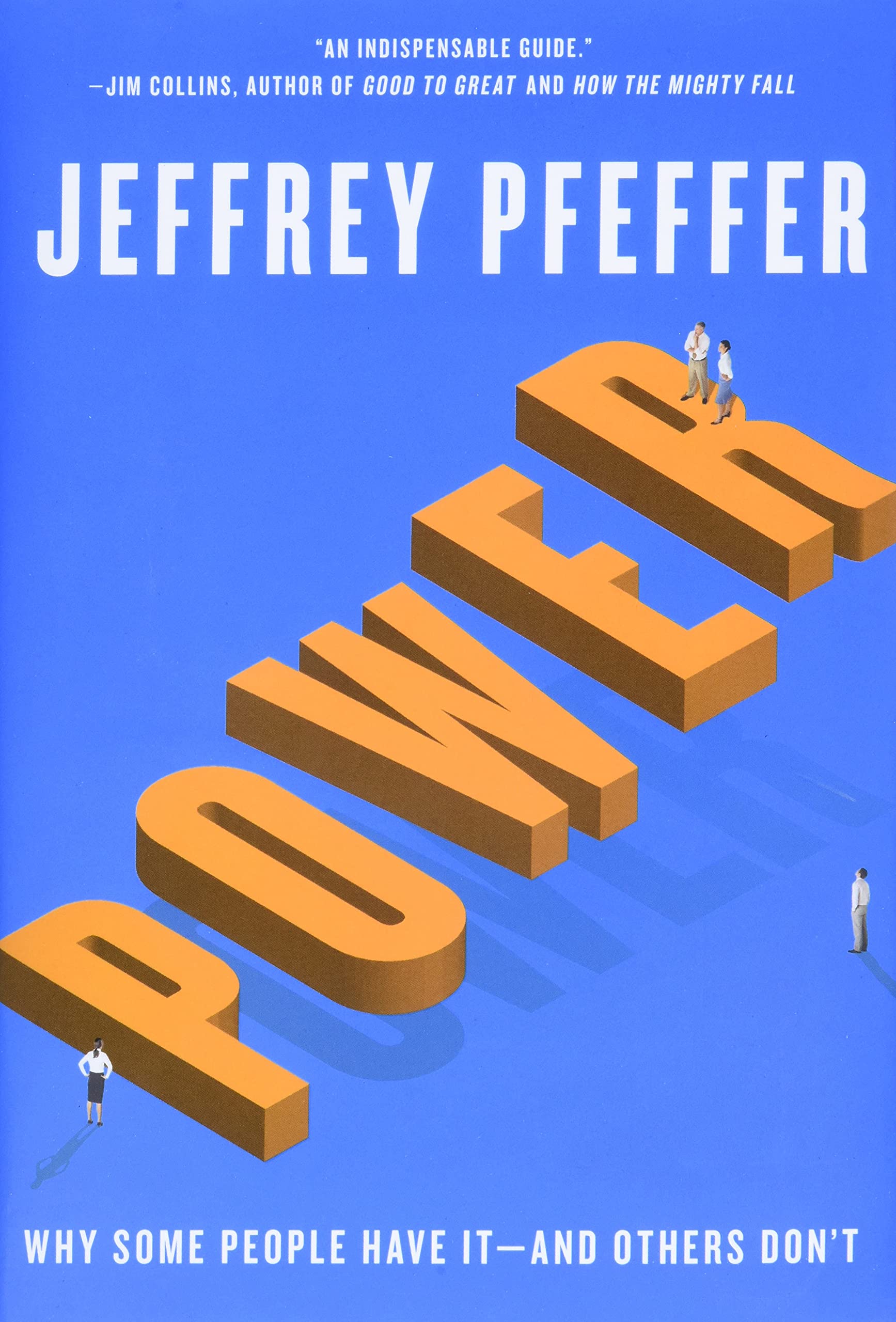

Transforming Anger into Durable Moral Courage
Many of us feel it: the setbacks in society are generating anger. But anger alone won’t take us forward. What matters is transforming it into moral courage—not as a fleeting burst of bravery, but as durable moral courage that withstands resistance.
Comer & Sekerka ( 👇 ) describe in their model how durable moral courage enables sustained ethical action. Their framework identifies three key insulating factors that prevent morally committed individuals from becoming discouraged or even demoralized in the face of opposition.
🔹 Moral Efficacy: Moral courage begins with the belief that one can remain effective even in difficult situations. Those who see themselves as capable of tackling ethical challenges are less likely to lose faith in their ability to act—no matter how strong the resistance.
🔹 Resilience (Hardiness): Research shows that resilient individuals share three key traits:
🫀 They stay engaged despite obstacles rather than withdrawing.
🫀 They believe they can exert influence instead of feeling powerless.
🫀 They view crises as opportunities for learning, not just as threats.
🔹 Planning for Endurance: Moral integrity is not a one-time act, but a long-term strategy. Successful moral actors actively plan for resistance. This includes:
🫀 Anticipating possible reactions
🫀 Understanding political dynamics
🫀 Building strategic networks
🫀 Forming alliances with like-minded individuals
🫀 Accepting that change is often slow
And when resistance has already materialized? Emotional self-regulation helps prevent demoralization. This includes self-affirmation (reflecting on past successes), self-compassion (without falling into self-pity), and seeking social support.
What does this mean in practice? Rightous anger may be the first step—the key is what we do with it. Moral courage - if understood as steadfastness requires strategy, resilience, and long-term planning. So it is also good to understand how to deal with power.
Links: https://www.gsb.stanford.edu/faculty-research/books/power-why-some-people-have-it-others-dont
10-03-2025



Market for Lemons? Why the CEO Labor Market is an Illusion
CEO compensation is - rightly - being discussed again today. The common line of defense? The “market for talent”. Supposedly, companies have to pay ever higher salaries because otherwise they are not competitive internationally - especially in comparison to the USA.
But does this market even exist? Does CEO search really function like a classic labor market, where supply and demand objectively produce the best talent and the fairest prices?
A new study by Keil, Lavie & Pavićević (2022) shows: No. The CEO market is less like an open competition for the best than a market for lemons - full of uncertainties, misjudgements and systematically wrong decisions.
Why the CEO job market is an illusion:
❄️Externe CEOs are not a better solution - often quite the opposite
1) Companies pay top salaries for “experienced” external executives. But the study shows: The length and breadth of experience says little about subsequent performance.
2) More important than experience is fit: CEOs who come from companies with completely different structures, industries or cultures struggle with negative transfer effects. They overestimate the transferability of old recipes for success and often fail due to internal resistance.
❄️Stakeholder Resistance eats up supposed advantages:
3) External CEOs have to earn the trust of leadership teams, the workforce, investors and customers.
4) The study shows that negative reactions to the appointment of a CEO are a major reason for poor company performance - and that this effect is particularly pronounced in the case of external CEOs.
5) Meaning: If you spend a lot of money on a CEO who is rejected internally, you not only pay the salary, but also the costs of inefficiency.
The real alternative: no auction, but systematic succession planning
If the CEO market is not a fair marketplace, but a distorted playing field, then the solution is not “pay more”. Instead, a different strategy is needed:
✅ Targeted succession development instead of a frantic search for external “saviors” - with a focus on fit and internal acceptance.
✅ Clear, long-term remuneration models that promote sustainable leadership instead of buying in the most expensive talent in the short term.
✅ A CEO system instead of a superstar cult - where responsibility is broadly distributed instead of giving one person excessive power and pay.
A functioning company is not a soccer club that has to buy the best player. Those who systematically develop leadership don't need salary competitions - and don't end up with a lemon.
Links:
https://scholar.google.com/scholar?cluster=8702968818123764853&hl=en&as_sdt=0,5#d=gs_qabs&t=1742197532644&u=%23p%3DA0-QD_iWWu0J
https://www.globalbankingandfinance.com/UBS-GROUP-ANNUAL-REPORT-ERMOTTI-5ea2fef2-ce82-4df4-8c39-b344c6898ad6
08-03-2025

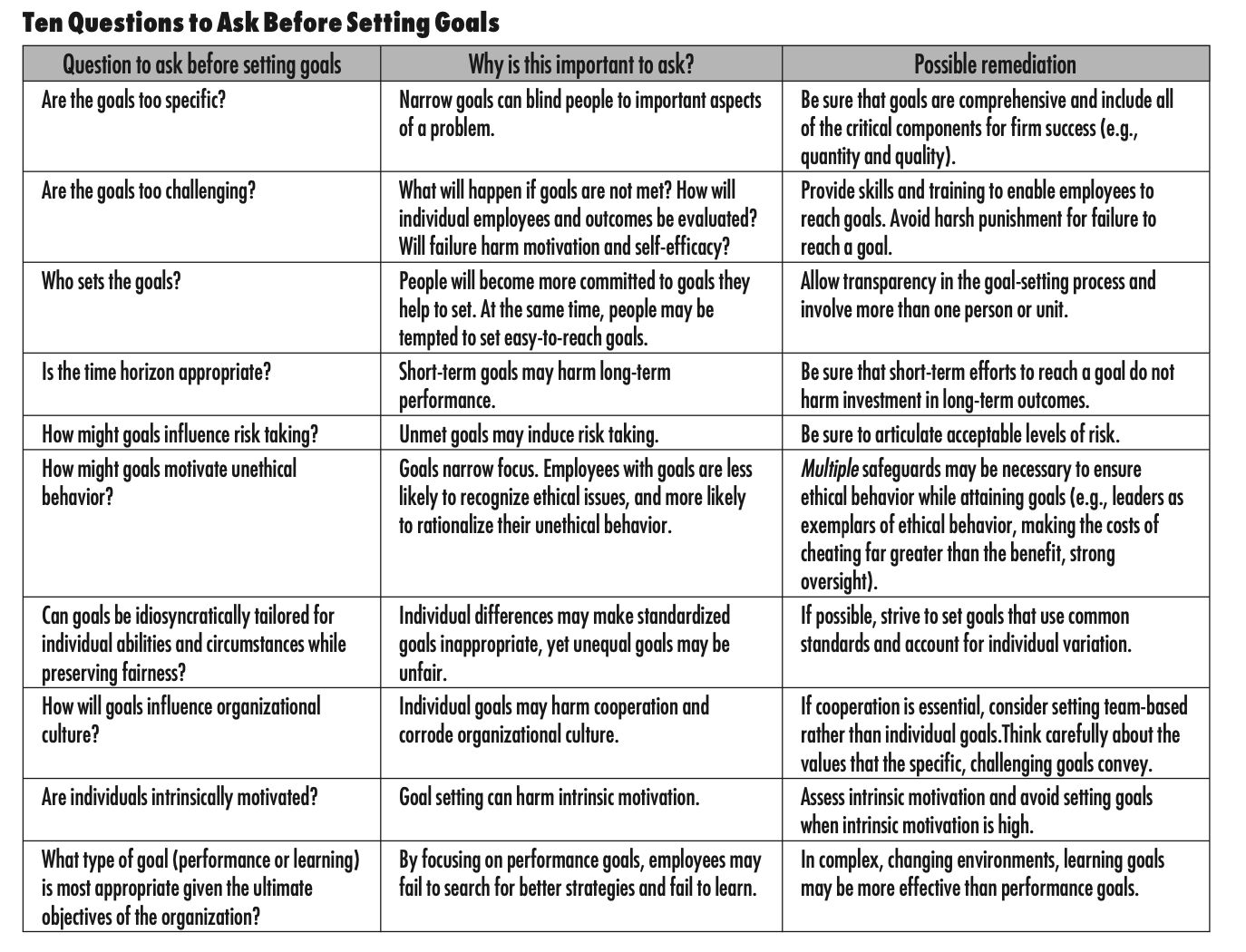

SMART Goals are not always smart!
I have been teaching this now for a long time and newer evidence just validates some of the issues mentioned here. In particular specific and challenging have been found lead to ignorance and to undermine conterfactual reasoning - hence if you are searching for critical thinking, mindfulness and creativity you might want to steer clear of these. And challenging, stretch goals have been linked to counterproductive work behaviors - gaming, tweaking and unethical behaviors.
Thus reading the article (comments 👇) which was brave enough to bring this into the light is still a must: "Goals Gone Wild: The Systematic Side Effects of Overprescribing Goal Setting" by Ordóñez, Schweitzer, Galinsky, and Bazerman.
Their "Ten Questions to Ask Before Setting Goals" table is revelatory. It warns that overly specific goals create tunnel vision, challenging goals can demotivate when skills are lacking, and short-term targets damage long-term performance. The table explains how goals distort risk preferences, making employees more likely to take dangerous risks. Perhaps most concerning, goals narrow focus in ways that make people less likely to recognize ethical issues and more likely to rationalize unethical behavior.
The authors recommend multiple safeguards: ensure goals comprehensively cover all critical components, provide adequate training, create transparent processes involving multiple stakeholders, articulate acceptable risk levels, implement strong oversight, consider team-based goals when collaboration matters, and recognize when learning goals are more appropriate than performance goals. They suggest avoiding goals entirely when intrinsic motivation is already high.
It also bears healthy lessons both for research and practice. In research we should not let paradigm holder (here goal setting theory) prevent adversal results to see the light of the day. And in practice we should finally kiss best practices good-bye - horses for courses is the better view. And stay reflective (if your goals do not prevent it).
Link to article: https://www.academia.edu/download/54138593/hbr_research.pdf
07-03-2025



07-03-2025
Transforming Anger into Prudent Courage
Many people feel it: social setbacks generate anger. But anger alone will not get us anywhere. It is crucial to transform it into moral courage - not as a spontaneous act of strength, but as lasting moral courage that stands up to resistance.
In their model, Comer & Sekerka (in the commentary) describe how lasting moral courage enables long-term ethical action. Their model identifies three key insulating factors that prevent moral agents from being discouraged or even demoralized by resistance.
🔹 Moral efficacy: Moral courage begins with the conviction that one can remain effective even in difficult situations. Those who see themselves as capable of overcoming ethical challenges are less likely to lose faith in their ability to act - even when the headwinds are strong.
🔹 Resilience (hardiness): Research shows that resilient people have three things in common:
- They engage despite resistance instead of resigning.
- They believe they can exert influence instead of feeling powerless.
- They see crises as learning opportunities, not just threats.
🔹 Planning for endurance: Moral integrity is not a one-off act, but a long-term strategy. Successful moral actors consciously plan for resistance. This includes:
- Anticipating possible reactions
- Understanding political dynamics
- Building strategic networks
- Alliances with like-minded people
- Accepting that change is often slow
What if the resistance is already there? Emotional self-regulation helps to avoid being overwhelmed by demoralization. This includes self-affirmation (remembering past successes), self-compassion (without sinking into self-pity) and social support.
What does this mean in concrete terms? Anger is only the first step - what we do with it is crucial. Moral resilience requires strategy, resilience and long-term planning. It will be an endurance run - but that's exactly what we need now!
Link to article: https://www.academia.edu/download/112797618/116035.pdf
07-03-2025



Why Slashing Public Administration Undermines Democracy
Recent aggressive cuts to federal administration in the US aren't just about "trimming the fat" - they strike at the heart of democratic governance. Johan Olsen's seminal work "Maybe It Is Time to Rediscover Bureaucracy" helps us understand why.
Public administration serves critical democratic functions:
⚖️ Safeguarding constitutional principles and the rule of law
⚖️ Ensuring equal treatment of all citizens regardless of wealth or status
⚖️ Providing institutional memory and stability across political transitions
⚖️ Implementing democratically determined policies with integrity
⚖️ Speaking truth to power through professional expertise
Why bureaucracy remains essential for public administration:
Bureaucratic organization, despite its negative stereotypes, is uniquely designed to protect these democratic values. Merit-based hiring, standardized procedures, and professional norms create an environment where decisions are made impartially, based on rules rather than personal preferences. Research shows that well-crafted (green not red) bureaucracies are associated with reduced corruption, greater social trust, and more effective poverty reduction.
The role of markets and networks:
While market mechanisms can improve efficiency and networks can enhance collaboration, neither can replace bureaucracy's core democratic functions. Markets respond to wealth, not citizenship rights. Networks privilege those with existing connections. The tensions between these forms are not bugs but features of democratic governance - they represent the ongoing balance between efficiency, responsiveness, and constitutional values.
When the business hammer sees everything as a nail:
Too many management scholars and business executives approach government with a dangerous assumption: that skills and principles from the corporate world can be directly applied to public administration. This "hammer looking for nails" approach fundamentally misunderstands the distinct nature of states versus companies. Businesses exist to maximize profit for shareholders; governments exist to serve citizens equally and protect constitutional rights. Before prescribing corporate solutions, management experts would do well to study the unique requirements and responsibilities of democratic governance.
What's at stake:
When we slash public administration in the name of "efficiency," we're not just cutting costs - we're undermining the institutional infrastructure of democracy itself. The current gutting of federal agencies is very likely not about making government work better - it's about weakening government's capacity to serve all citizens equally and implement democratically established policies.
Link to article: https://doi.org/10.1093/jopart/mui027
06-03-2025

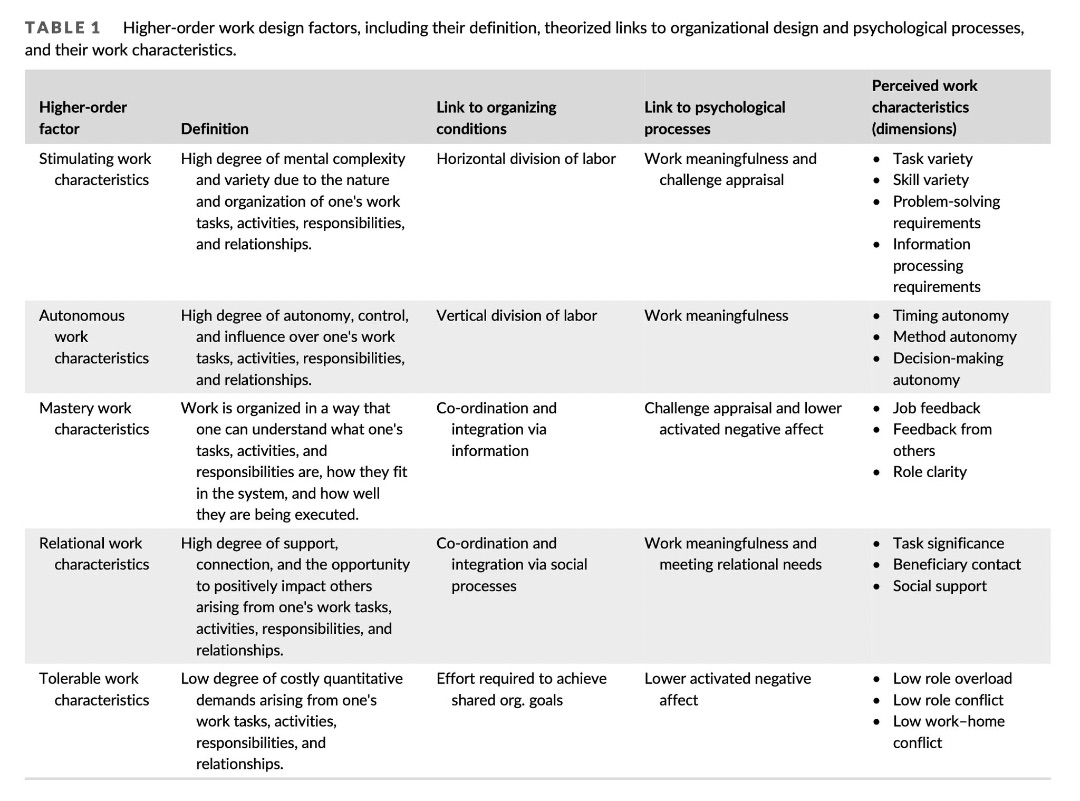

🔥 We got it wrong.
By ripping HR away from Organizational Development, we lost our most powerful lever for shaping well-being, engagement, and performance: work design. Instead of tackling the fundamental question—how work is structured—we buried ourselves in performance appraisals, high-powered incentives, and engagement surveys. A reactive mess that ignores the real drivers of motivation and productivity.
But work design is organizational development. And a new model is cutting through the noise to bring structure back to this fragmented field.
💥 The SMART Work Design Model
Parker & Knight (2024) propose an integrated framework that links work characteristics directly to organizational design decisions—where power, responsibility, and meaning in work are shaped:
1️⃣ Stimulating – Shaped by horizontal division of labor (how tasks are allocated). Includes task variety, skill variety, information processing, and problem-solving requirements.
2️⃣ Mastery – Reflects integration through information (how organizations coordinate). Includes job feedback, feedback from others, and role clarity.
3️⃣ Autonomous – Derives from vertical division of labor (who controls decisions). Includes decision-making autonomy, timing autonomy, and method autonomy.
4️⃣ Relational – Captures integration through social processes (how employees connect). Includes social support, task significance, and beneficiary contact.
5️⃣ Tolerable – Relates to effort allocation (how workload is managed). Includes role overload, work-home conflict, and role conflict.
🩻 The Data: Why It Matters
Across three studies, Parker & Knight found that the SMART model doesn’t just make intuitive sense—it predicts performance outcomes. And while I focus on performance here, the research covers more (read the article!).
🩺 Autonomy correlated with core task performance (r = 0.23, p < 0.05) and proactive performance (taking charge: r = 0.25, strategic scanning: r = 0.25).
🩺 Mastery had the strongest link to core task performance (r = 0.27, p < 0.01).
🩺 Relational work was associated with core task performance (r = 0.24, p < 0.05) and showed the highest correlation with adaptive performance (r = 0.30, p < 0.01).
🩺 Tolerable work was also positively linked to adaptive performance (r = 0.22, p < 0.05).
🚀 The Future of HR: Time to Step Up
The takeaway: Performance management isn’t just an HR initiative—it’s an organizational design problem. If companies want to actually improve performance, engagement, and well-being, they need to design better jobs.
But let’s not stop there. The impact of work design doesn’t happen in isolation. Daily relational practices, everyday performance conversations, and learning mechanisms must be brought together to make work design effective. And that? That’s HR’s job. HR should reclaim its role as the architect of better, smarter, more human work!
Link to article: https://onlinelibrary.wiley.com/doi/full/10.1002/hrm.22200
04-03-2025

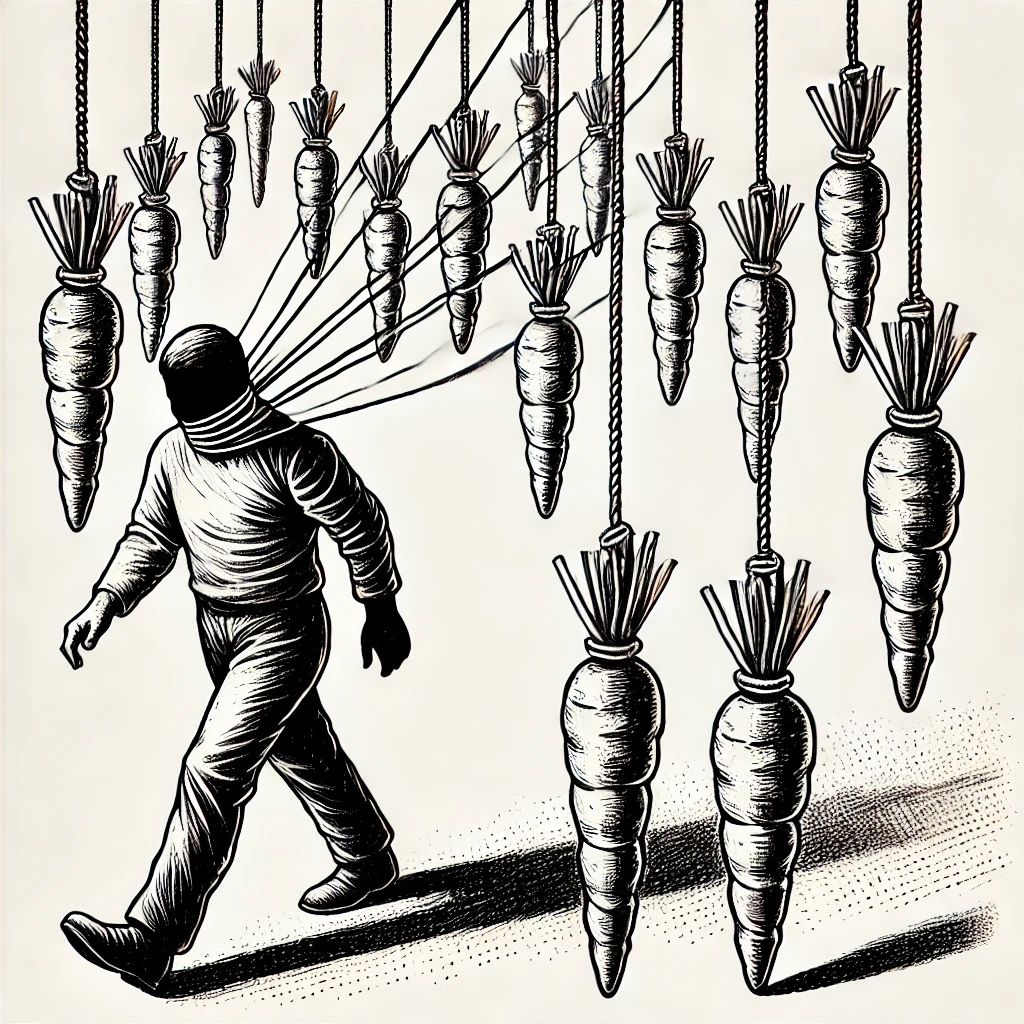

Full power ahead!
It's true - we need concentrated performance. But above all, we need a huge joint effort to create viable solutions in (and with) companies. Now more than ever!
But our current performance management is holding us back. The current models - the bureaucratic machine model with control and extrinsic incentives and the agile organism model with individualism and competition - create more problems than they solve. While one stifles creativity, the other often destabilizes organizations and encourages unethical behavior. Studies show: Employees are frustrated, performance evaluations are often useless and variable remuneration systems are full of misguided incentives. Instead of tweaking old parameters, we need a radical change of perspective: performance is created in an environment that promotes personal growth, responsibility and collective excellence.
Life-enhancing performance management focuses on collaboration instead of internal competition, recognizes people as actors with rights and combines individual and collective goals. Companies such as VAUDE and Allsafe show how: There is another way. They shape performance as a shared responsibility, promote learning-oriented feedback cultures and replace manipulative incentive systems with fair, sustainable remuneration. A new performance culture is possible - one that not only increases short-term profits, but also makes companies resilient and fit for the future. Because true performance is not about adapting to an outdated system, but about shaping a better future together.
The article is based on https://lnkd.in/dJARdKek
04-03-2025

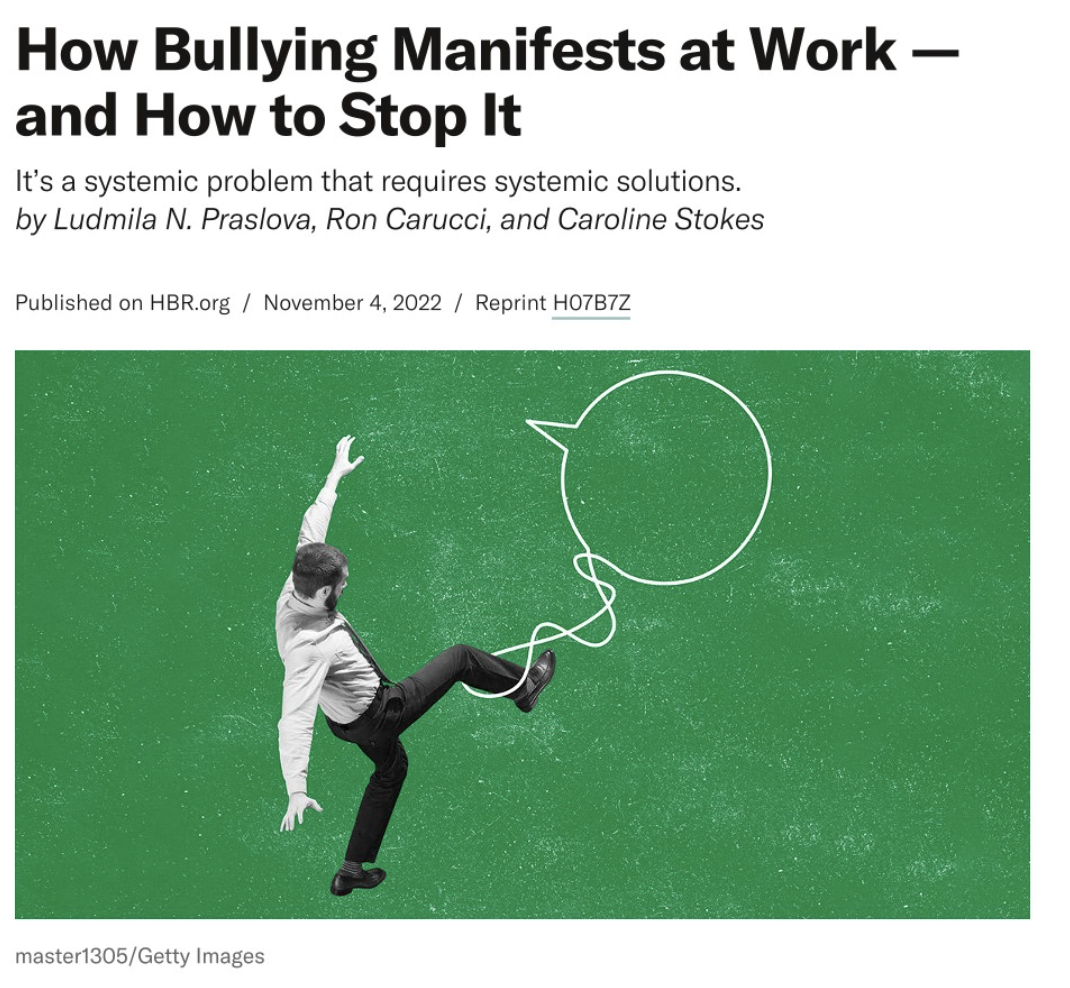

Bullying in the Workplace—and Beyond: A Systemic Challenge
With some of the most visible figures on the world stage thriving on intimidation, it is more than timely to reflect on bullying—not just as an interpersonal issue but as a systemic one. Despite extensive research documenting its detrimental effects on individuals and organizations, bullying often remains unaddressed, tolerated, or even mistaken for “strong leadership.”
What is Bullying? Bullying is a pattern of persistent, harmful behavior aimed at undermining, humiliating, or excluding others. It manifests in multiple forms:
- Hostile bullying (overt aggression, public humiliation)
- Instrumental bullying (manipulation, gaslighting, social exclusion)
- Cyberbullying (online harassment, reputational attacks)
- Structural bullying (abuse of power within hierarchical systems)
Myths That Perpetuate Bullying:
❌ “Tough leadership is necessary for performance.” Evidence suggests the opposite—bullies stifle innovation, erode trust, and drive high performers away.
❌ “It’s just competition.” Healthy competition is based on merit, not intimidation or sabotage.
❌ “Only weak individuals become targets.” Research indicates that bullies often target high-performing, conscientious individuals to consolidate power.
Addressing Bullying: Prevention is the best way!
- Organizational safeguards: Clear policies, transparent decision-making, and just grievance mechanisms are essential.
- Selection and promotion: Screening for toxic traits helps prevent the normalization of aggressive behavior.
- Leadership accountability: Training in ethical leadership and non-violent communication should be a core organizational practice.
💡 Aristotle argued that anger is only justified when dignity is at stake, yet he also warned that most people have an excess of anger. Hence, when in doubt, mildness is better. And of course, this does never excuse unregulated, narcissistic, or impulsive rage—which is far more prevalent. Organizations must ensure they do not select, promote, or tolerate individuals prone to destructive anger, as they contribute to a culture of fear rather than excellence. Nor should voters 😉
Link to article: https://hbr.org/2022/11/how-bullying-manifests-at-work-and-how-to-stop-it
03-03-2025



Should We Turn to City Diplomacy? 🌍🏙️
Cities have only recently become an object of intense research. Yet, in many ways, they are the true centers of power—holding their own jurisdictions, cultivating cultural-political identities, and shaping distinct 'urban' ways of life through commerce, transport, and leisure.
As state leaders oscillate between incompetence and chaos, could cities become our last strongholds for well-being—and perhaps even for enabling the good life? Are cities, rather than nations, the real agents of progress in an era of democratic backsliding?
📚 March’s Book Tip: City of Equals by Jonathan Wolff and Avner de-Shalit. From a philosopher’s corner, this book applies an engaged scholarship lens to uncover what makes some cities more attractive to egalitarians than others. Take Berkeley—far from economically equal, yet still managing to cultivate an “egalitarian spirit.”
The authors identify four core values that underpin a "city of equals":
1️⃣ Non-market access to goods and services – ensuring essential services and amenities are accessible to all residents, regardless of their economic status.
2️⃣ Sense of meaning – fostering opportunities for individuals to engage in meaningful activities and community participation.
3️⃣ Diversity and social mixing – promoting diverse communities and encouraging interactions among different social groups.
4️⃣ Non-deferential inclusion – ensuring that all residents can access their rights and services without discrimination or bureaucratic obstacles.
At its core, the book offers policy recommendations on how cities can strengthen their egalitarian spirit—or at the very least, prevent the creation of starkly disadvantaged classes. A critical read for all the mega-cities out there striving to remain “the place to go for all” while grappling with rising inequalities and exclusion.
But of course, this book—like many others—could also serve as a springboard to a bigger question: If cities can act as incubators of fairness and inclusion, should they also become global players in diplomacy? 🌆✨
What do you think—how can cities take the lead when nations fail?
01-03-2025

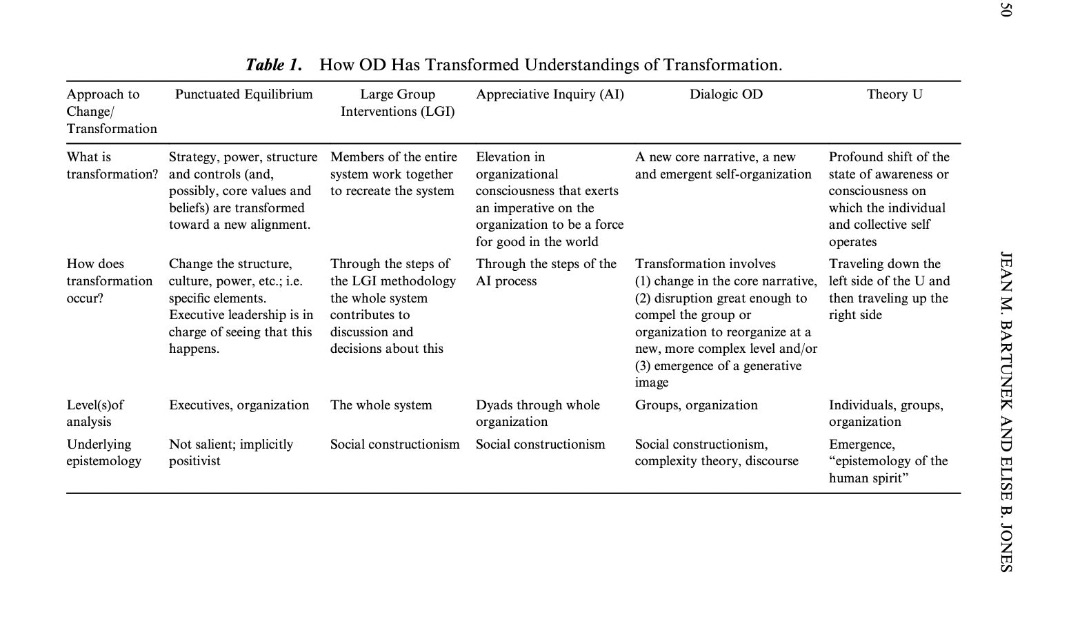

Organizational Change: From Punctuated Equilibrium to Theory U - And What is Still Missing
The idea of organizational transformation has changed significantly over the last 30 years. While in the 1980s it was understood as a radical, strategic realignment of power, structure and control, later organizational theories focused on continuous adaptation. At the same time, the practice of organizational development (OD) continued to develop - with methods such as Large Group Interventions, Appreciative Inquiry or Dialogic OD, which enable transformation through collaborative sense-making. And yet a crucial gap remains.
🔍 The different approaches to transformation
1️⃣ Punctuated Equilibrium (Tushman & Romanelli, 1985)
Transformation is understood as a discontinuous, strategic upheaval in which power relations, structures and control change radically within a short period of time - often controlled by the company's top management.
2️⃣ Large Group Interventions (Bunker & Alban, 1997)
A systemic approach in which all relevant stakeholders are actively involved in the change process. Transformation comes about through collective discussions and decisions.
3️⃣ Appreciative Inquiry (Cooperrider & Srivastva, 1987)
The focus here is on positive experiences and visions. The approach assumes that increased organizational awareness generates a moral commitment to positive change.
4️⃣ Dialogic OD (Bushe & Marshak, 2009)
Transformation here means a change in the organizational narrative. Discourses generate new self-understandings and patterns, whereby organizations reorganize themselves.
5️⃣ Theory U (Otto Scharmer, 2016)
This approach sees transformation as a profound change in awareness. By going through the “U-curve” - from letting go of old ways of thinking to perceiving new possibilities and implementing them - a new reality can unfold.
🔎 The gap: Where is the material reality?
Changing consciousness, narratives and dialog are central components of transformation - but they fall short if they are not considered together with material structures, practices and power relations. This reveals a fundamental weakness of many modern OD approaches: They rely heavily on self-organization and emergent meaning-making without taking sufficient account of how existing hierarchies, resource distributions and institutional frameworks facilitate or block transformation.
Scharmer speaks of a “blind spot” in change: the lack of consideration of the individual. I would add: The real blind spot is the lack of engagement with the hard realities of power and structure.
Which approaches succeed in linking these levels?
26-02-2025

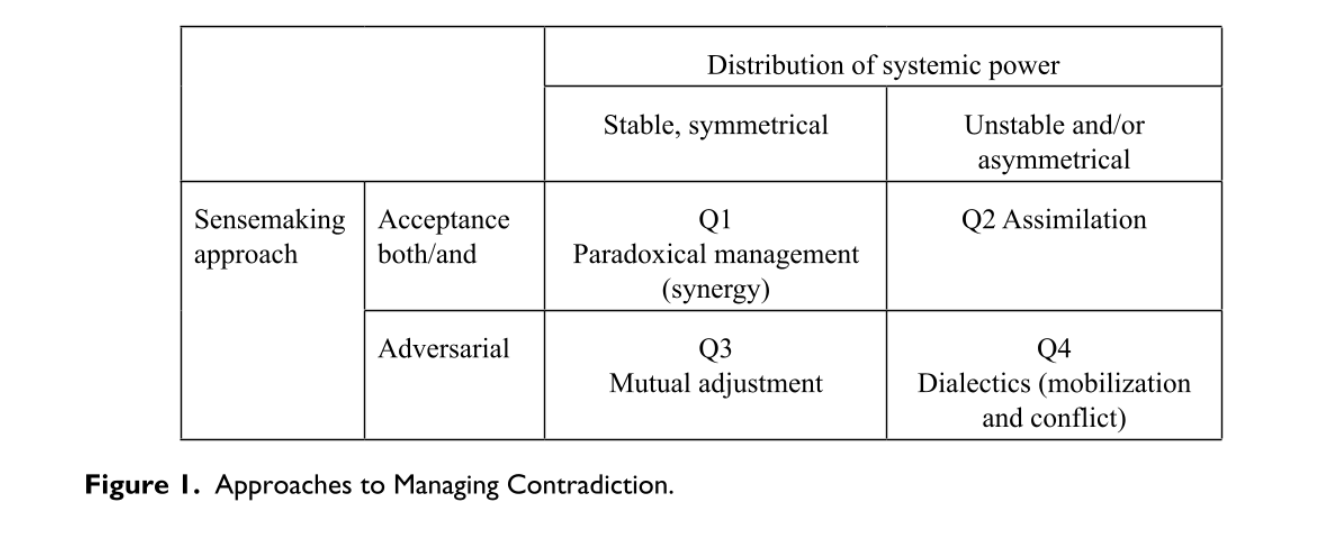

Time to Shape Up Our Transformation Skills
Look around—the world isn’t getting any simpler. From AI revolutions to ecological crises to democracies-in-need, contradictions are everywhere. Organizations face a fundamental challenge: How do we navigate tensions between efficiency and innovation, stability and change, profit and purpose? Ignoring them isn’t an option. Managing them poorly means stagnation. This paper of Hargrave and Van de Ven (2016) provide a framework integrating dialectical and paradox perspectives to show how contradictions can be managed in ways that either sustain, adapt, or transform the system. Their model identifies four distinct approaches based on (1) how contradictions are perceived (accepted vs. resisted) and (2) how power is distributed (stable vs. asymmetrical).
1️⃣ Synergy (Paradoxical Management) → When contradictions are embraced and power is balanced, leaders integrate opposing forces for innovation. Instead of choosing either/or, they create “both/and” solutions—think platform cooperatives that merge economic success with worker ownership.
2️⃣ Assimilation → When power is asymmetrical but contradictions are accepted, dominant actors absorb change without disrupting existing structures. This is when multinational corporations adopt sustainability measures while keeping profit maximization at the core, or how gig platforms introduce worker benefits without shifting away from precarious contracts.
3️⃣ Mutual Adjustment→ When contradictions are resisted but power is balanced, transformation happens through negotiation. Instead of integration, opposing forces adjust boundaries—like in industry-wide agreements on ethical AI, where firms compete fiercely but agree on baseline safeguards to prevent reputational damage.
4️⃣ Conflict & Mobilization (Dialectics)→ When contradictions are resisted and power is asymmetrical, transformation happens through disruption. Whether through activist-driven market shifts, open-source movements challenging proprietary tech, or regulatory interventions forcing entire industries to restructure—change here is radical and contested.
The takeaway? Transformation is not about eliminating contradictions—it’s about knowing when to integrate, when to negotiate, when to absorb, and when to challenge.
Link to article: https://journals.sagepub.com/doi/10.1177/0170840616640843
22-02-2025

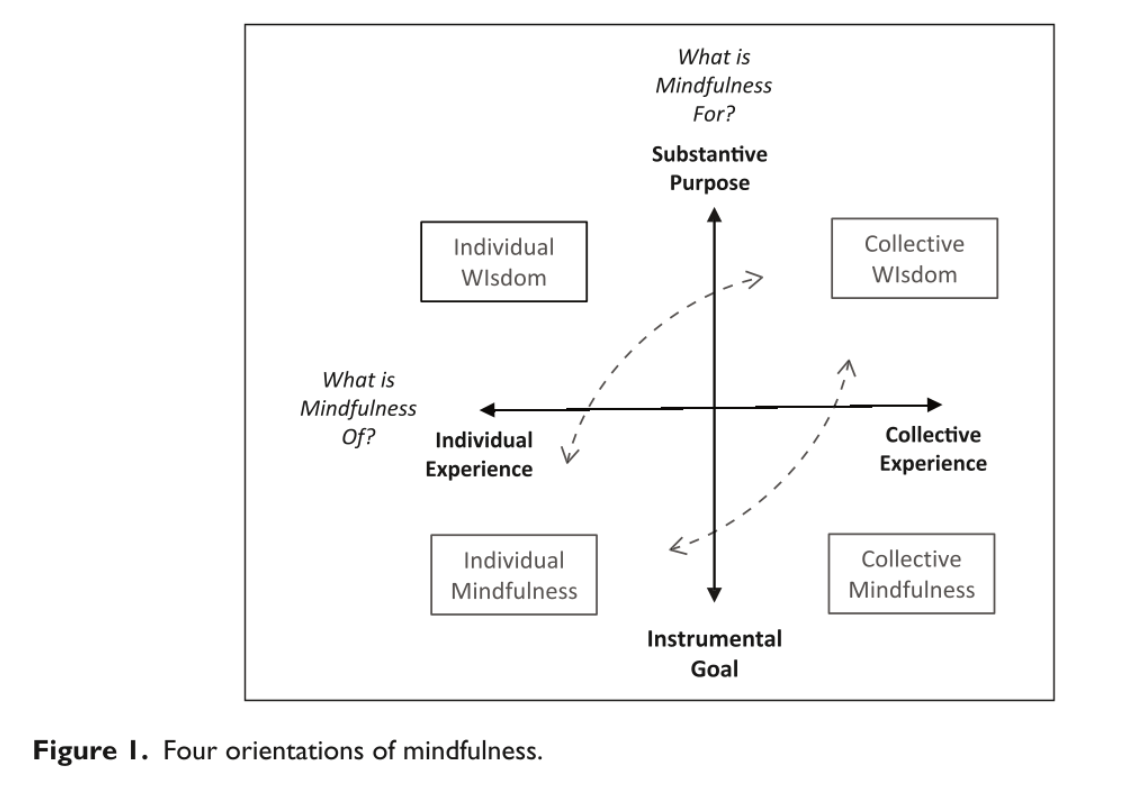

Mindfulness at Work: A Critical Re-view
Richard Badham and Elizabeth King provide a critical and reflective re-view of mindfulness at work, challenging dominant narratives while recognizing the field’s complexity. Their analysis is structured along two dimensions: individual vs. collective and instrumental vs. substantive approaches to mindfulness. This leads to four orientations:
🧘 Individual Mindfulness is widely promoted as a psychological and therapeutic tool for improving personal performance, well-being, and stress regulation. Rooted in mindfulness-based interventions such as MBSR (Mindfulness-Based Stress Reduction) and ACT (Acceptance and Commitment Therapy), this approach emphasizes awareness, attention control, and emotional regulation. Empirical studies highlight its benefits for resilience, job performance, and interpersonal relationships. However, critics argue that this form of mindfulness is often commercialized and risks reinforcing workplace adaptation rather than transformation.
🏥 Collective Mindfulness shifts the focus to organizational and group-level practices, emphasizing heedful interrelating, sensemaking, and high-reliability organizing (HRO). Originating from Weick and Roberts’ (1993) work on flight decks, this perspective sees mindfulness as a structural and relational process that fosters resilience, adaptability, and safety. Yet, this view too remains primarily instrumental, focused on efficiency, stability, and market adaptation, often neglecting deeper ethical and political considerations.
🪷 Individual Wisdom is moving beyond instrumental concerns and sees mindfulness as a critical, ethical, and transformative practice. This approach draws from Buddhist traditions, existential philosophy, and critical management studies, positioning mindfulness as a means for deep reflection on work, identity, and capitalism. It challenges "McMindfulness" and advocates for a radical mindfulness that fosters ethical leadership and social justice. Scholars in this space argue that true mindfulness should cultivate compassion, moral discernment, and self-transformation, not merely stress relief for productivity.
🐝 Collective Wisdom is the most radical of the four orientations and examines mindfulness within broader societal, ecological, and economic contexts. Advocates argue that mindfulness should not only enhance corporate well-being but also challenge dominant power structures, capitalist imperatives, and systemic inequalities. This approach aligns with Engaged Buddhism, critical management studies, and political economy critiques of neoliberalism.
Hence: the authors reject both uncritical enthusiasm and wholesale rejection of mindfulness. Instead, they encourage self-critical engagement that acknowledges its benefits while challenging its instrumentalization. They argue that mindfulness must integrate reflection, critique, and ethical responsibility to serve as a truly transformative force in organizational studies.
Link to article: https://journals.sagepub.com/doi/abs/10.1177/1350508419888897
15-02-2025

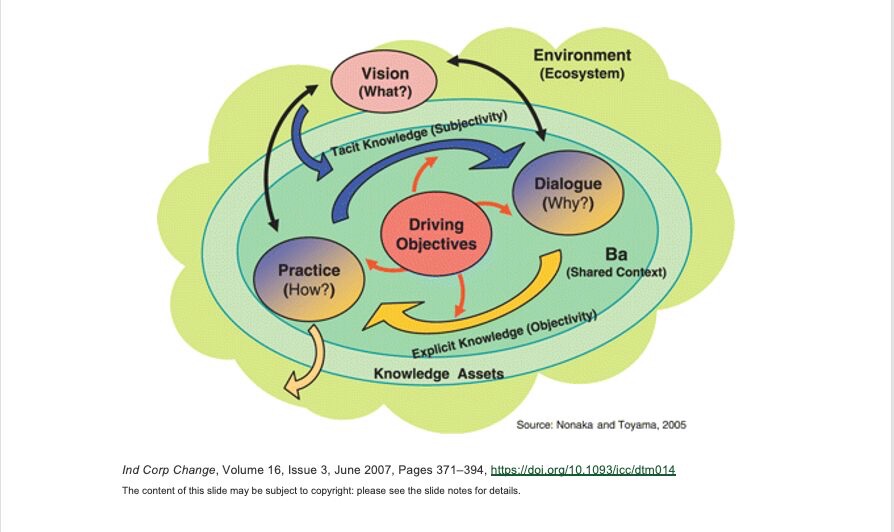

COLLECTIVE PRACTICAL WISDOM
...even if many organizations are currently far from it - a worthwhile goal:
Today I discuss with my HR Executives how to enable this wisdom. Collective Phronesis according to Ikujiro Nonaka describes the ability of organizations not only to create knowledge, but also to translate it into wise and ethically sound actions. It is based on Aristotle's concept of phronesis, the practical wisdom that makes it possible to make good decisions for the common good in complex, dynamic situations. Nonaka emphasizes that strategies are not only created through rational analysis, but through the combination of subjective experience, ethical values and collective reflection. Collective phronesis therefore requires an awareness of the social context, the ability to create meaning and a deep commitment to long-term values that go beyond short-term efficiency.
In the diagram, the knowledge creation process is depicted as a dynamic interplay of six central abilities: (1) the ability to recognize the “good”, (2) to share contexts (Ba), (3) to grasp what is essential in complex situations, (4) to mediate between concrete experiences and universal principles, (5) to use political means to implement the common good, and (6) to foster phronesis in others. These skills are not linear, but interact in a continuous learning process supported by dialog, reflection, and practical experience. The central idea is that knowledge is not only processed cognitively, but emerges in a social space (Ba) that promotes the exchange of perspectives and shared experience.
The model shows that collective phronesis requires enabling shared learning (also triple-loop) and placing value orientation at the heart of the organization. The constant dialogue between individual experiences and organizational goals creates a self-organizing knowledge ecosystem that offers both flexibility and stability. This process is not static, but thrives on the tension between tradition and innovation, between individual convictions and collective norms. The organization thus becomes a place where not only knowledge but also wisdom is cultivated.
12-02-2025



Future Human Qualities: Part 2 - Thriving in the Net Zero World
This is the second post in our series where we explore the skills and qualities essential to thrive in the face of future challenges. Drawing from the GDI Gottlieb Duttweiler Institute’s scenario study, we’ll dive into possible futures and reflect on the human capacities needed to meet them. So what would it be like if we happen to understand that we are 1 minute to 12?
Scenario 2: Net Zero
The Net Zero scenario envisions a world where humanity has taken decisive action to combat climate change, resulting in significant reductions in CO₂ emissions. However, this comes at the cost of personal freedoms and consumption habits. The complexity of society is intentionally reduced to address environmental degradation, resource scarcity, and biodiversity loss. By 2050, global trade has shrunk, lifestyles have become hyper-local, and daily life revolves around sustainability and efficiency.
Energy comes from renewable sources, with neighborhoods sharing solar panels and local energy grids. Cars are rare, often shared, and fully electric; most people rely on bicycles and public transport. International travel is a luxury, and goods are expensive due to reduced global supply chains. While the world hasn’t collapsed, it has fundamentally transformed, with societies accepting strict regulations to ensure survival within planetary boundaries.
The social fabric is held together by a shared commitment to sustainability, but tensions persist. Some communities embrace participatory democracy and localized governance, while others enforce authoritarian measures to meet climate targets. Emotional resilience, adaptability, and trust in collective action are essential to navigating the challenges of this world.
What Qualities Matter in a Net Zero World?
📜 Knowing: Environmental literacy, media literacy, understanding complex systems (like climate and economic interdependencies), and the ability to process large volumes of information critically.
📜 Wanting: A strong sense of responsibility toward future generations, the ability to reflect on personal and societal values, and an appreciation for non-material resources like time, community, and well-being.
📜 Doing: Self-efficacy, adaptability, democratic participation, cooperative decision-making, mechanical repair skills, and resilience in the face of constant change.
This scenario challenges us to redefine what prosperity means—shifting from material wealth to well-being, sustainability, and meaningful connections with others and the environment.
Link to article: https://jacobsfoundation.org/publication/future-skills/
10-02-2025

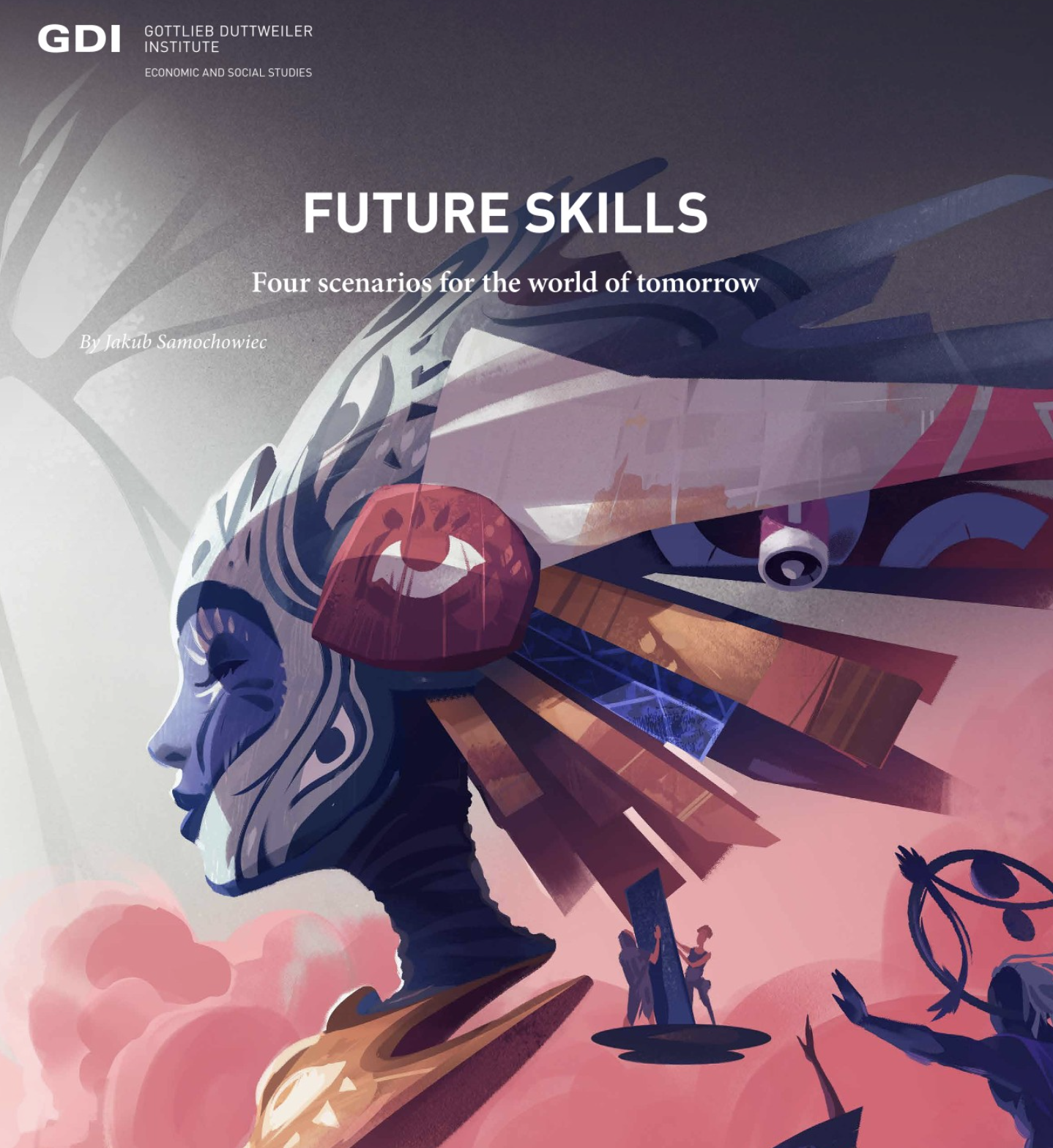

Future Human Qualities: Part 1 - Navigating the Collapse
This is the first post in a series where we explore the skills and qualities essential to thrive in the face of future challenges. Drawing from the Jacobs Foundation’s scenario study, we’ll dive into possible futures and reflect on the human capacities needed to meet them.
The study organizes these future-relevant capacities into three categories:
Knowing: Specific knowledge and the ability to handle information effectively.
Wanting: The ability to define meaningful goals and the values that shape them.
Doing: The practical skills required to implement those goals.
The Method Behind the Scenarios (more in the comment): Rather than predicting one definitive future, the study uses scenario-based foresight to map out four distinct possibilities for Switzerland in 2050.
Scenario 1: Collapse
The Collapse scenario envisions a world where intertwined climate crises, economic breakdowns, and geopolitical conflicts lead to the unraveling of global systems. Supply chains disintegrate, governments lose their grip, and local communities are left to fend for themselves.
By 2050, life is marked by scarcity, insecurity, and the erosion of familiar social structures. Cities are hollowed out as people migrate to rural areas in search of arable land and clean water. Basic infrastructure—energy grids, healthcare systems, transportation networks—has deteriorated or collapsed entirely. Access to essentials like food, medicine, and clean drinking water is no longer a given but a daily struggle. The absence of central governance breeds lawlessness in some regions, while others rely on fragile, community-based forms of self-organization.
Social cohesion is under constant threat. Trust, once the glue of society, becomes a scarce resource itself. Conflicts over dwindling resources flare up, both within and between communities. The mental toll is immense: chronic stress, fear of the unknown, and the loss of long-held certainties challenge not just physical survival but psychological resilience. Education, where it exists, is hyper-local and practical, focused on survival skills rather than abstract knowledge.
What Qualities Matter in a Collapsed World?
- Knowing: Practical survival knowledge—agriculture, mechanical repair, basic medicine, and rapid learning to adapt as conditions shift.
- Wanting: A strong sense of purpose rooted in community values, resilience, emotional stability, and the ability to find meaning even amid collapse.
- Doing: Self-efficacy, adaptability, cooperative problem-solving, conflict resolution, and the courage to experiment and learn from failure.
Now, let’s reflect:
🔍 How would we need to transform our schooling and vocational systems to cultivate these qualities?
🤔 How likely—or unlikely—do you think this scenario is?
💡 What personal qualities can each of us start sharpening today, regardless of what the future holds?
Link to article: https://jacobsfoundation.org/publication/future-skills/
07-02-2025

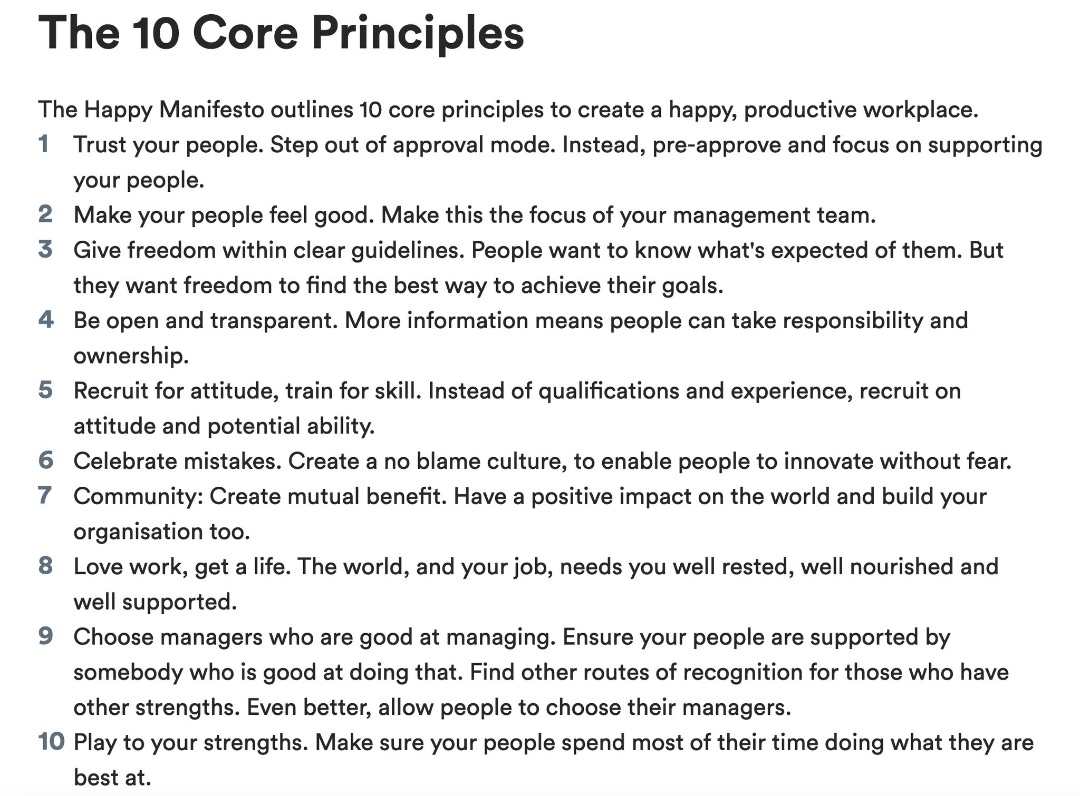

S💡 Can you pay living wages, care for domain-life balance, encourage joy at work, freedom, and trust—AND still be wildly successful for decades?
👀 Yes, you can. (to borrow words from a place that once radiated hope into the world... 😉)
That’s why today, I’m sharing "The Happiness Manifesto" from none other than Happy Ltd, the UK company proving that a thriving workplace isn’t just a pipe dream—it’s a winning formula.
💛 Happy Ltd has been around for more than 35 years and is stacking up awards like they’re going out of fashion. Just last year, they:
🏆 Ranked #1 Best Workplace for Women in the UK
🏆 Won the Leadership Excellence Award
🏆 Landed in the Top 15 Best Workplaces in Europe
Not bad for a company that believes joy is not an HR gimmick but a business strategy.
We should pay attention to these pioneers—because they’re proving that a brighter, more human future is not just possible, but already happening.
So, who’s ready to build happier workplaces? Drop a 💛 if you're in!
02-02-2025

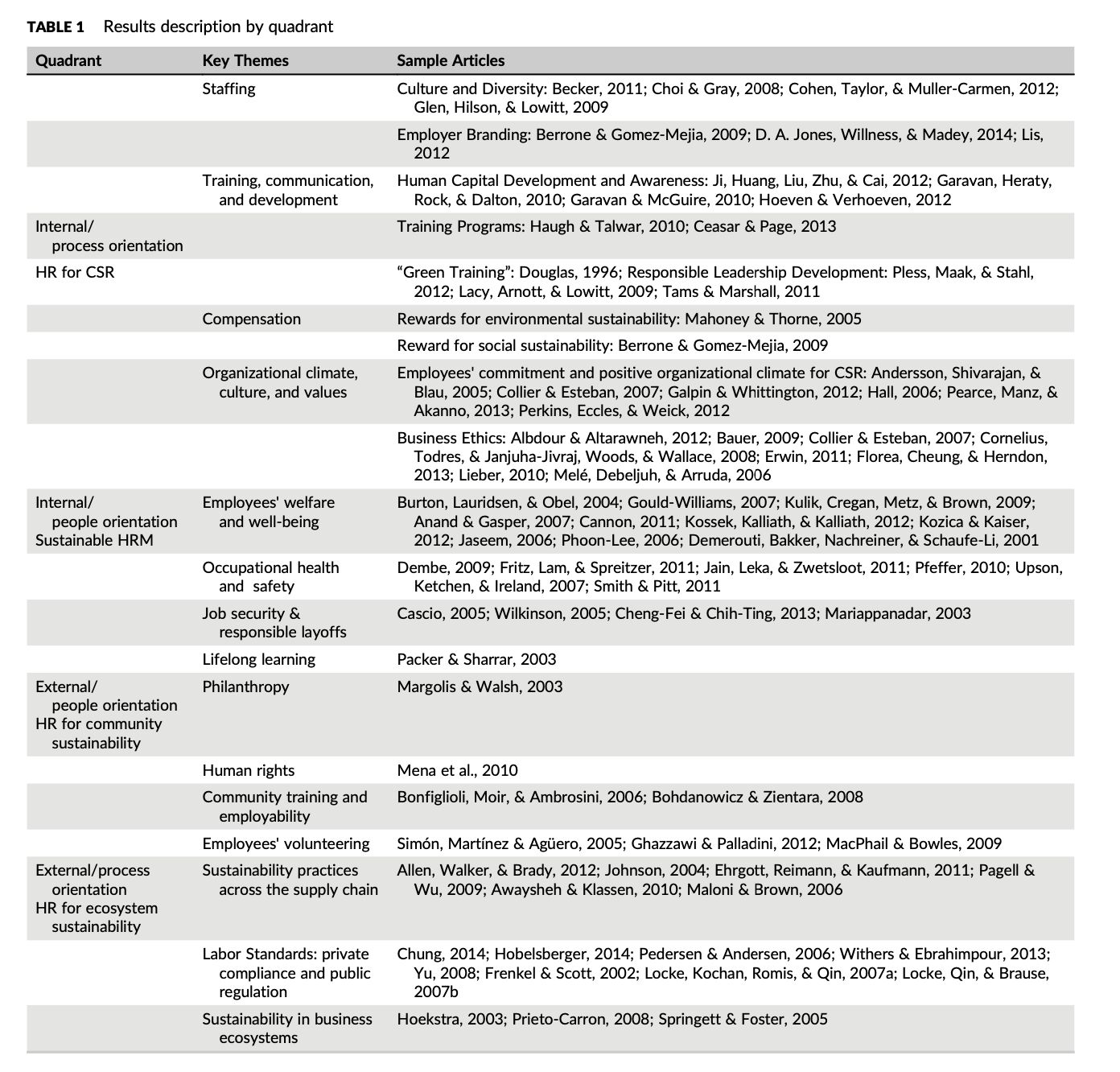

Sustainability still matters (also for HR)
Despite recent reversions, the earth is still heating up, and many humans are still left behind. In a very thoughtful literature review, Federica De Stefano and colleagues "turn" Dave Ulrichs well-known people/process and internal/external distinction into an enlightening perspective on what the future of HR in sustainable companies could look like.
🔹 External/Process: HR plays a crucial role in designing and monitoring fair labor standards, human rights protections, and sustainability initiatives across supply chains. Beyond compliance, HR can help companies proactively shape ethical business ecosystems.
🔹 External/People: HR can foster corporate citizenship by facilitating community engagement, volunteering, and long-term partnerships. However, many companies still treat these activities as side projects rather than integrating them into business strategy.
🔹 Internal/Process: Internally, HR ensures that sustainability is embedded in recruitment, training, compensation, and employee well-being programs. However, some high-performance work systems (HPWS) risk eroding sustainability efforts by over-prioritizing efficiency and control.
The review also highlights critical gaps in knowledge. First, HR sustainability practices are not yet integrated into a coherent system—some high-commitment HR practices align well, but others, rooted in a machine-like, managerialist logic (e.g., forced rankings, high-powered incentives), may undermine sustainability goals. Second, the external role of HR remains underdeveloped. To truly enable flourishing across entire ecosystems, HR must go beyond the firm’s boundaries, calling for bold practitioners but also for more transdisciplinary research.
Link to article: https://onlinelibrary.wiley.com/doi/abs/10.1002/hrm.21870?casa_token=ZieM9thfHpoAAAAA%3AGCB2w7EE_-OA0YejTWGxrdPnyEEzpef4mXGWAh9dODDfvAVxos03QLtl-k2cGN5mnSqFF9yqtGJ_x_po
30-01-2025



Why We Need to Understand Moral Blindness...and What to Do About It
The old and often critiqued Milgram experiment still holds some important lessons for us today. Despite its flaws, its core findings remain relevant: humans have a strong tendency to obey authority, even when doing so conflicts with their moral values. In Milgram’s experiment, participants were instructed to administer what they believed were painful electric shocks to a learner. Shockingly, 65% followed orders to the highest voltage, despite their visible distress. Milgram concluded that structured authority systems create a "bounded awareness"—a mental blind spot that prevents individuals from recognizing or acting on ethical concerns.
So what can we learn from this? How can we prevent blind obedience—particularly in an age where many leaders prioritize self-interest over the common good and lack practical wisdom? And how can we sharpen our ethical thinking tools?
In this deep dive 👇🏻 Patricia Werhane is summarizing the literature and comes up with a number of explanatory insights which also offer new tools:
🎯 Bazerman’s Six Strategies to Prevent Blind Obedience. Max Bazerman suggests six actionable strategies to combat ethical blind spots:
1. Do Not Trust Your Gut – Intuition can be flawed; structured decision-making leads to better outcomes.
2. Acquire Expertise – Gain knowledge beyond passive experience to improve ethical judgment.
3. Debias Your Judgment – Challenge assumptions by exposing yourself to diverse perspectives.
4. Consider Analogous Cases – Learn from past ethical dilemmas to navigate new challenges.
5. Take an Outsider’s Perspective – Step outside personal biases for clearer ethical reasoning.
6. Understand Others’ Mental Models – Recognizing different viewpoints helps recalibrate decision-making.
🚀 Werhane’s Solution: Moral Imagination. Patricia Werhane argues that overcoming moral blindness requires moral imagination, the ability to think beyond ingrained mental models and authority structures. This involves:
1. Disengaging from the Context – Identifying the mental models shaping one’s perception and their limitations.
2. Exploring Alternatives – Considering creative, ethical solutions rather than blindly accepting the status quo.
3. Focusing on Consequences – Evaluating decisions through the lens of their broader ethical and social impact.
By actively developing moral imagination and applying structured decision-making strategies, we can resist unethical authority and lead with integrity. In a world that often rewards compliance over courage, these tools are more critical than ever.
To all of you who observed some of the world leaders in the last few days (German or American for instance) you will sadly have heard only smug, overconfident, vain, insights-lacking phrases... what we can do now is to understand how democracy, party structures, political organisations need to be made more fool-proof.
Link to article: https://www.jstor.org/stable/41475830
27-01-2025

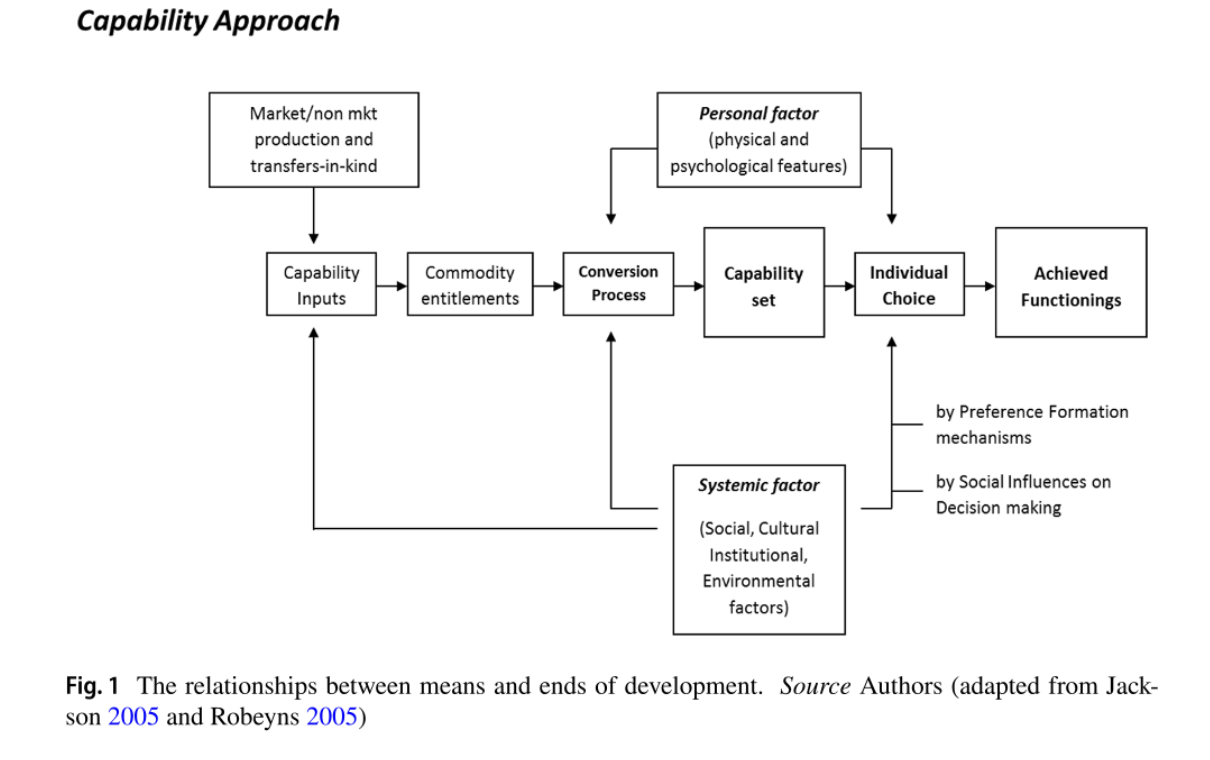

Trust, Collaboration, and Freedom
...or why freedom can only be enabled through trust and generous collaboration.
As we wrap up this week, during which I have shared studies highlighting how businesses can – and should – contribute to a better society, I’d like to bring up another important topic. Freedom is once again being demanded loudly, often in terms of freedom from bureaucracy, from regulation and in favor of businesses (negative liberty). It is brought up in harsh and loud talks, it is whispered in the hallways and it is all over on LinkedIn. Personally, I believe this perspective is too narrow. While it is crucial to rethink (smarter) regulation and freedom within society, we need to take a broader view.
This is why I want to share a deep dive by Ha-Joon Chang, an industrial economist—essential reading for policymakers. He builds on a different freedom approach and links it to industrial policy. It’s a bit of a “make Europe better” approach, but one that includes everyone, including developing countries (and to some degree future generations).
Here’s a summary:
a) The Capabilities Approach and Its Connection to Freedom
The Capabilities Approach, developed by Amartya Sen and Martha Nussbaum, shows us that true development is about more than just economic growth. It is about enabling people to live lives they have reason to value—lives with real choices and opportunities. Freedom, in this sense, is not just the absence of obstacles, but the active creation of conditions that empower people—through education, healthcare, and social security.
b) The Collective Capabilities Approach
Individual freedom rarely emerges in isolation. The Collective Capabilities Approach emphasizes that many of our opportunities only become possible through collaboration, mutual trust, and social structures. Whether in companies, unions, cooperatives, or engaged communities—collective capabilities are essential for achieving shared goals and driving sustainable change. This approach reminds us that true freedom is not just an individual pursuit but a collective achievement.
c) What This Means for Industrial Policy
This perspective has profound implications for industrial policy. Instead of focusing solely on individuals or businesses, we need strategies that support collective learning, cooperation, and joint investments. Successful industrial policy creates an environment where knowledge is shared, innovation is driven collaboratively, and sustainable economic development is made possible. In this way, we can achieve not just economic growth, but also social inclusion and real opportunities for all!
Link to article: https://doi.org/10.1057/s41287-020-00356-y
23-01-2025

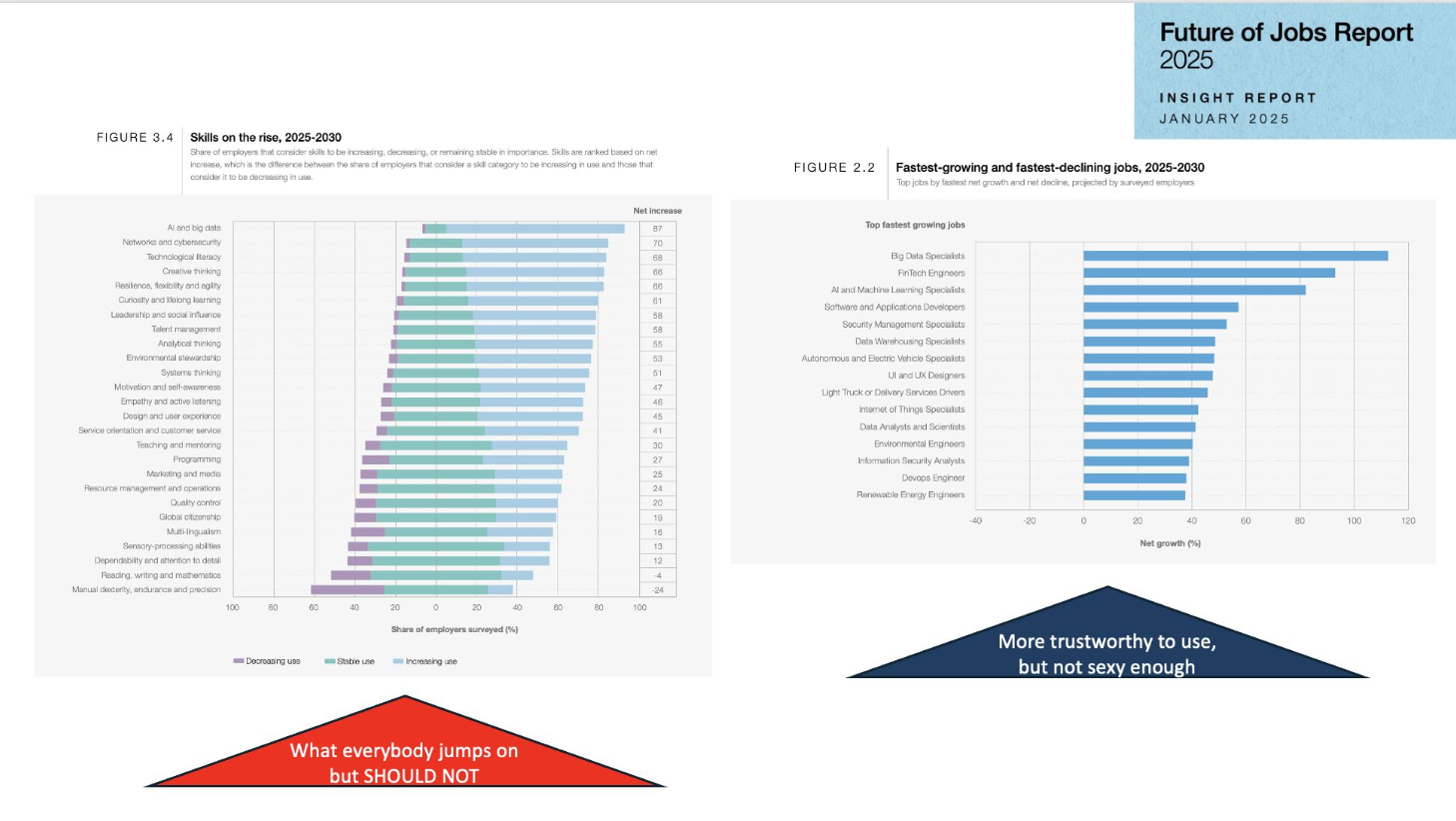

BEWARE – LOOK AT THE SIDE EFFECTS
I have to admit, I jumped on this report too. It’s beautifully illustrated, aligns perfectly with my teaching needs, and makes it easier to communicate ideas I care about (yes, self-confirmation bias at play 😉). But here’s the catch—how many of us actually scrutinize the methodology before diving into content discussions? Some even treat these reports as gospel, basing consulting advice and business strategies on what might be thin air.
So, what’s the issue?
It depends on what you're looking for. Some data (sourced externally) is solid. Some survey insights seem reasonable. But some? Pure crystal ball gazing—without the right experts.
Let’s get to the core:
The report claims representativeness, but its sampling lacks transparency. They align their sample with industry structures and sizes, yet it’s not a randomly drawn sample. More critically, who exactly is and who should be answering these complex skill-related questions? HR? The CHRO? The CEO? I’d argue none of them—at least not alone.
Just look at the rankings: mathematics and reading skills are placed almost last, while AI and critical thinking take top spots. Really? Can you master AI or critical thinking without logic, communication skills, or understanding the broader context? Any educator or pedagogy expert would raise an eyebrow. A mathematician or physicist could outpace a programmer any day, and an anthropologist would challenge a business student’s critical thinking with ease.
The problem with ranking skills:
Predefined lists don't capture the complexity of future needs. What about scenario planning? What if the ecological crisis accelerates—guess which skills will matter then (hint: not just AI). Methods like Delphi studies or forecasting models would offer deeper insights. A simple survey of—let’s face it—non-expert respondents doesn’t cut it.
Sure, if you ask HR what roles they need to fill in the next two years, their insights are credible. But projecting five years into the future? That’s a stretch in today’s uncertain world.
The takeaway?
Take these reports with a grain of salt. And to the WEF—please be responsible. People trust you. Be transparent about your sampling methods, clarify which findings are robust and which are speculative.
22-01-2025



Why Inequality Matters – And How Businesses Perpetuate It
Inequality is more than just an economic divide—it is a structural imbalance that limits access to opportunities, resources, and human potential. When individuals and communities face barriers to education, healthcare, and decent work, their ability to thrive is compromised. This not only erodes individual well-being but also weakens societal flourishing. A society that allows systemic inequality to persist ultimately wastes talent and potential, stalling progress for everyone! 😡
Research by Bapuji, Ertug, and Shaw (2019) 👇 highlights the significant role organizations play in fueling economic inequality. Wage disparities, precarious employment, and limited access to career growth disproportionately benefit a select few while leaving many behind. For instance, executive compensation has risen exponentially, while the wages of lower-level employees have stagnated. Corporate decisions that prioritize shareholder wealth over fair value distribution contribute to rising inequality, as seen in widespread outsourcing, gig work proliferation, and diminished job security. Additionally, corporations influence policies that often serve their interests over social equity, reinforcing structural disadvantages.
But inequality doesn’t just harm individuals—it weakens cooperation and even long-term business success. 📜 Studies show that in countries with high inequality, employee disengagement and turnover rates are significantly higher, driving up operational costs. Research indicates that firms operating in unequal societies face a 20% higher likelihood of internal conflict and productivity losses due to lower morale and trust. Moreover, income inequality is associated with higher absenteeism and poorer health outcomes among employees, further straining business resources. Conversely, companies that prioritize fair wages and inclusive policies tend to experience greater innovation, resilience, and stakeholder trust—critical factors for long-term sustainability.
Despite these realities, many businesses continue to prioritize short-term profits over long-term sustainability, deepening the divide and undermining their own future. The race to cut costs, suppress wages, and maximize shareholder returns is not just unethical—it’s self-destructive. If businesses don’t take responsibility now, they may soon find themselves operating in a world where trust, talent, and social cohesion are in critically short supply.
The time to act isn’t tomorrow—it’s now.
Link to study: https://ink.library.smu.edu.sg/cgi/viewcontent.cgi?article=7249&context=lkcsb_research
20-01-2025



We Don’t Need More Hubris!
Aristotle described hubris as overconfidence and the abuse of power, driven by the desire to humiliate others for personal gratification. This ancient concept remains painfully relevant today. In times when many fall for overconfident "strong men," we should ask ourselves: How can we protect our institutions from the havoc they tend to wreak?
For wreak havoc they do. From claiming an unjustifiably large share of resources to engaging in reckless risks and outright fraud, hubristic leaders often harm the very organizations or communities they lead. Research shows this trait isn't what we should want in our corporate boardrooms or political offices.
But how can we protect our institutions? Margit Osterloh and Katja Rost, in their experimental study, revisit a governance practice championed in Aristotle's polis: the lottery. They propose a hybrid model where leaders are first selected competitively and then chosen by lottery. This approach, they argue, breaks the chain of excessive confidence fostered by "meritocratic" systems and reduces hubris.
Their research 👇 highlights how introducing an element of randomness dampens the self-serving bias and overconfidence common among leaders selected solely through competitive processes. Leaders chosen through this hybrid method are less likely to misuse power and more likely to act in the group's interest.
Perhaps it’s time to rethink how we select leaders—not just for corporations but for governments too. If we want stronger institutions, maybe what we need isn’t more hubris, but more humility and fairness in the system.
Curious to hear your thoughts: what else can we do to prevent hubris?
Link to article: https://doi.org/10.1016/j.leaqua.2020.101388
16-01-2025



Return of the "Mortality Curve"
The infamous instrument pioneered by Jack Welch at GE—internally dubbed the Mortality Curve—is making its way back under the guise of "forced ranking."
It seems the narrative is shifting: we’ve apparently "cuddled enough," and now we need "real performance" again, which translates to clamping down hard on so-called underperformers.
Latest revival? Meta. Ironically, the company now named after a product that never quite connected with real customers. (Hint: Maybe, just maybe, this is more of a strategy failure than one of "low performers.")
Here’s what the boss of this company, recently dubbed a sentient being without a spine, has to say:
"Meta is working on building some of the most important technologies in the world — AI, glasses as the next computing platform, and the future of social media. This is going to be an intense year, and I want to make sure we have the best people on our teams. I've decided to raise the bar on performance management and move out low-performers faster. We typically manage out people who aren't meeting expectations over the course of a year, but now we're going to do more extensive performance-based cuts during this cycle — with the intention of backfilling these roles in 2025."
Let’s pause here and remember what the evidence (and the inevitable backlash) will tell us when the pendulum swings back again:
🥅 Performance in companies doesn’t follow a normal distribution curve. Not in teams, not in departments, not anywhere.
🥅 Performance evaluation is inherently biased. Especially in knowledge work and team settings where success depends on collaboration and creativity. Some even argue it’s broken beyond repair—for now.
🥅 Forced ranking creates short-term fear, not sustained results. It may work temporarily in non-competitive cultures, but it quickly spirals into cutthroat dynamics.
🥅 It attracts the wrong people. Hawks thrive in forced ranking systems, creating a vicious cycle that destroys trust and cohesion.
🥅 It’s a long-term talent drain. Dismissing the "less smart" or "underperformers" in a time of talent scarcity—particularly as immigration pipelines dry up—is downright shortsighted.
Performance is important. But it’s not about fear, or punishment, or simplistic cuts. True performance comes from looking deeper: understanding slumps, addressing root causes, and unlocking the collective potential of your teams.
Because in the end, what matters most is not individual brilliance—it’s the strength of the whole.
13-01-2025

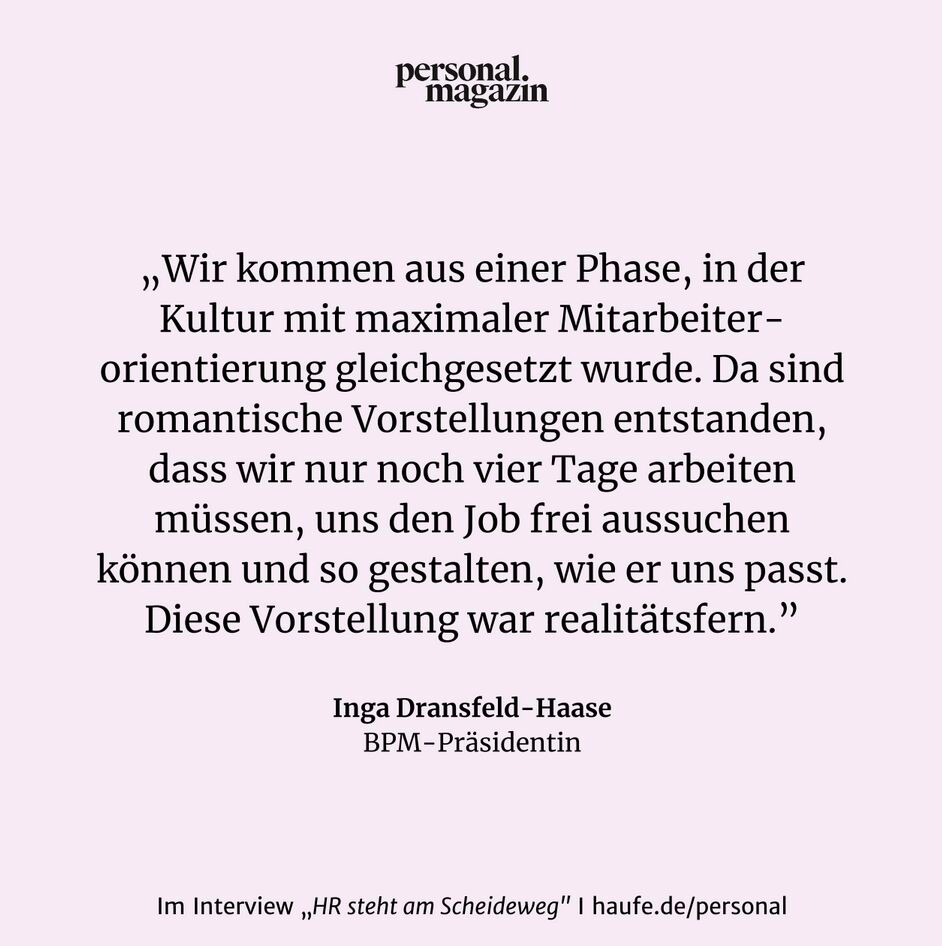

Yesterday, the spirits were stirred once again in an exciting discussion in personalmagazin: the discussion on the topic of “performance” initiated by politicians is (not surprisingly) also spilling over into HR. It is noticeable that we often work with straw men - here “hard work”, there “new work”; here “efficiency”, there “culture”; here “performance”, there “work-life balance”. Such false dichotomies may make the debate more exciting, but in the end they are mainly grist to the mill of an increasingly noticeable populism.
Of course, it is more complex than that - as Prof. Dr. Carsten C. Schermuly rightly argued yesterday. Empirical studies clearly show that individual productivity is significantly influenced by so-called soft factors - such as an appreciative corporate culture, time for care work or new work approaches.
But in my opinion, there needs to be another, and equally important, discussion: what service do we need - and what service do we want? Today I would like to focus on the first question and clarify one thing in advance: We are looking for organizational performance. How this depends on individual productivity must first be defined. Simply “adding up” individual performance does not do justice to the reality of collaboration in organizations that operate in a competitive environment. It could even be that the often ridiculed “lefties and nice guys” play a central role in companies - namely to promote cohesion, which in turn is a prerequisite for top performance.
Secondly, we need to take a closer look at the environment: No one will deny that the world has currently become at least more complicated, more likely even more complex. We don't know what to expect with Mr. Trump - all we can be sure of is a lot of U-turns. We can also assume that we will once again cooperate more closely with other trading partners, such as China. None of this makes the global value chain any easier.
What does this mean? We need organizations that are resilient - with employees who think and rethink together. The appropriate response to this complexity is not the reflex for “strong men”, but more development, coordination and participation for everyone - in short: everyone needs to be on deck (Randolf Jessl your credo).
Unfortunately, strategic HR management research has so far provided few helpful answers. Although “best fit” applies in theory, meta-analysis has so far only been able to prove inconsistent “best practices”, which vary depending on the study. My grandmother used to say: “If you charge a lot, you bring little home.” She was probably right. We not only need to improve in research, but also start thinking in practice - and perhaps learn from the outsiders in the process. Because ultimately it's also about imagination.
12-01-2025

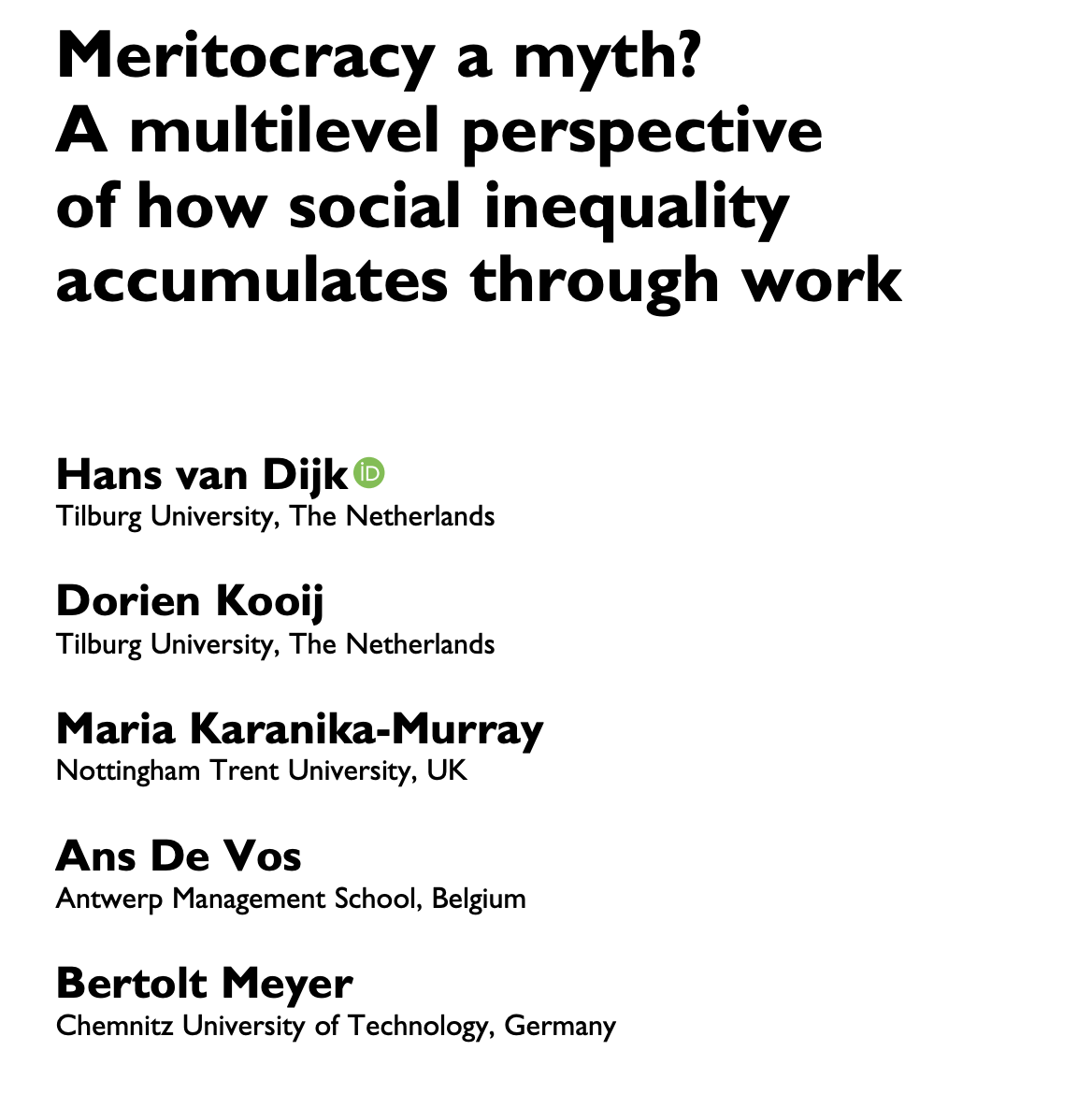

The Just Organization: Removing Injustice I ⚖️
Most of us would agree that striving for equality of opportunity is essential in a fair society. The idea that someone can’t get a job or progress in their career due to discrimination—despite having similar talents and motivation—feels intuitively wrong. And if we were to place ourselves in Rawls’ famous “veil of ignorance” scenario, we famously would reach the same conclusion. Even from a performance or utility perspective, ignoring or underutilizing real talent in organizations is not only wasteful but downright foolish (in the long run...if there is a long run perspective).
Yet, here’s the striking part: organizations struggle not only with ensuring fair entry conditions but also with maintaining a flawless meritocracy. Biases, closed doors, and structural injustices compound initial differences. Instead of reducing inequality, many organizations risk amplifying it. ❌
Before diving deeper into how we might remove these injustices in future posts, I’d like to share an article that sheds light on these self-fabricated inequalities—a must-read for hashtag#HR leaders and CEOs serious about creating fairer workplaces.
🔍 Here’s a key excerpt:
“Our first aim therefore is to inventorize theoretical support for whether and, if so, how social inequality in workplaces is likely to exacerbate (i.e., the cumulative advantage perspective). Our inventory indicates that nine mechanisms play a role in how initial differences in opportunities and rewards in workplaces between members of different social groups (e.g., women vs. men, natives vs. migrants, higher vs. lower educated) shape subsequent differences in opportunities and rewards.
Two of these mechanisms take place at the individual level (the knowledge, skills, and abilities [KSAs] and the motivation mechanisms), one takes place at the dyadic level (the stereotypes and status beliefs mechanism), three at the network level (the homophily, the reciprocity, and the capital correlations mechanisms), and three at the organizational level (the segmentation, the winner-take-all structures, and the meritocratic ideology mechanisms). Each of these mechanisms suggests that social inequality in workplace settings can increase over time, thus lending credence to the cumulative advantage perspective.”
👉 Which of these mechanisms have you seen or experienced in action?
Link to article: https://doi.org/10.1177/2041386620930063
07-01-2025

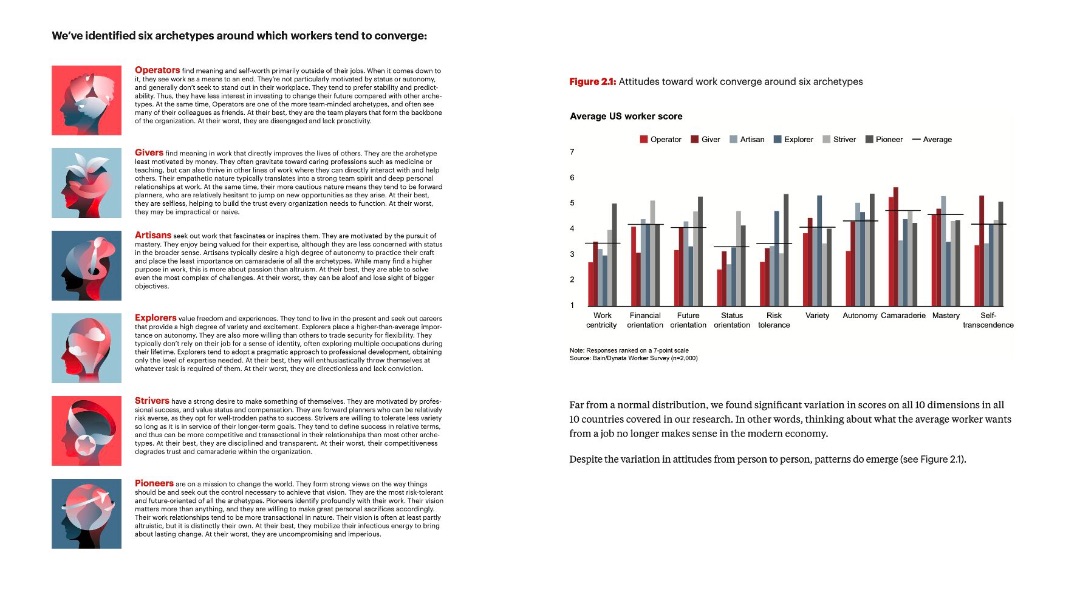

My employees do not want to take over responsibility! 🫥
...or how we love to believe stories that confirm our prejudices. While looking into future-of-work scenarios the other day, I stumbled upon a Bain report—nicely done, as is typical for consultancies. And if you take a closer look at the personas (or as they boldly label them, "archetypes") they identified: different enough to spark interest, but conveniently confirming existing stereotypes to make me "buy in."
Now, let's apply some critical thinking to this:
🧐 What are the underlying theories? Of course, they don’t explicitly reference any theories, but the report seems to imply that personality differences significantly explain workplace behavior. But do they? While no one would deny that personality matters, but we also know that "strong situations beat personality every time." Strong situations are characterized by shared cultural norms, incentives, and selection mechanisms—all of which most businesses have. In such contexts, people tend to conform above all, regardless of their individual personality traits.
🌟 Motivation as a state – the key variable of interest here – could be thought of as energy x goal. This implies that motivation is situational and dynamic. The system plays a crucial role in either undermining or fueling that energy. Additionally, where did they derive these so-called "orientations" from? In motivational psychology, we might work with implicit motives (achievement, affiliation, power) or orientations related to an internal or external locus of control/causality. What they present here seems to be an amalgamation of... well, who knows what.
🔬 And as always, let’s scrutinize the data.** Measuring personality accurately requires well-established (and often lengthy) inventories. One-question measures are nonsense—but naturally, they don’t tell us how they measured anything. Sampling: 2,000 respondents across 10 countries—yet there’s no indication of how they sampled, so it’s clearly not representative. Analysis: cluster analysis—but whether these clusters genuinely link to behavior remains unclear. Hence overall verdict: no real validity.
🧪 In a nutshell: a rather poorly executed study, quite removed from established theory, confirming stereotypes. More importantly, it’s a study that will once again fuel our self-fulfilling prophecies. Specifically: psychology is paramount (so no need to address systemic issues), and only a few people take work seriously or would thrive if given the right conditions.
Let’s not fall into that trap… again.My employees do not want to take over responsibility! 🫥
Link to article: https://www.bain.com/contentassets/d620202718c146359acb05c02d9060db/bain-report_the-working-future.pdf
05-01-2025

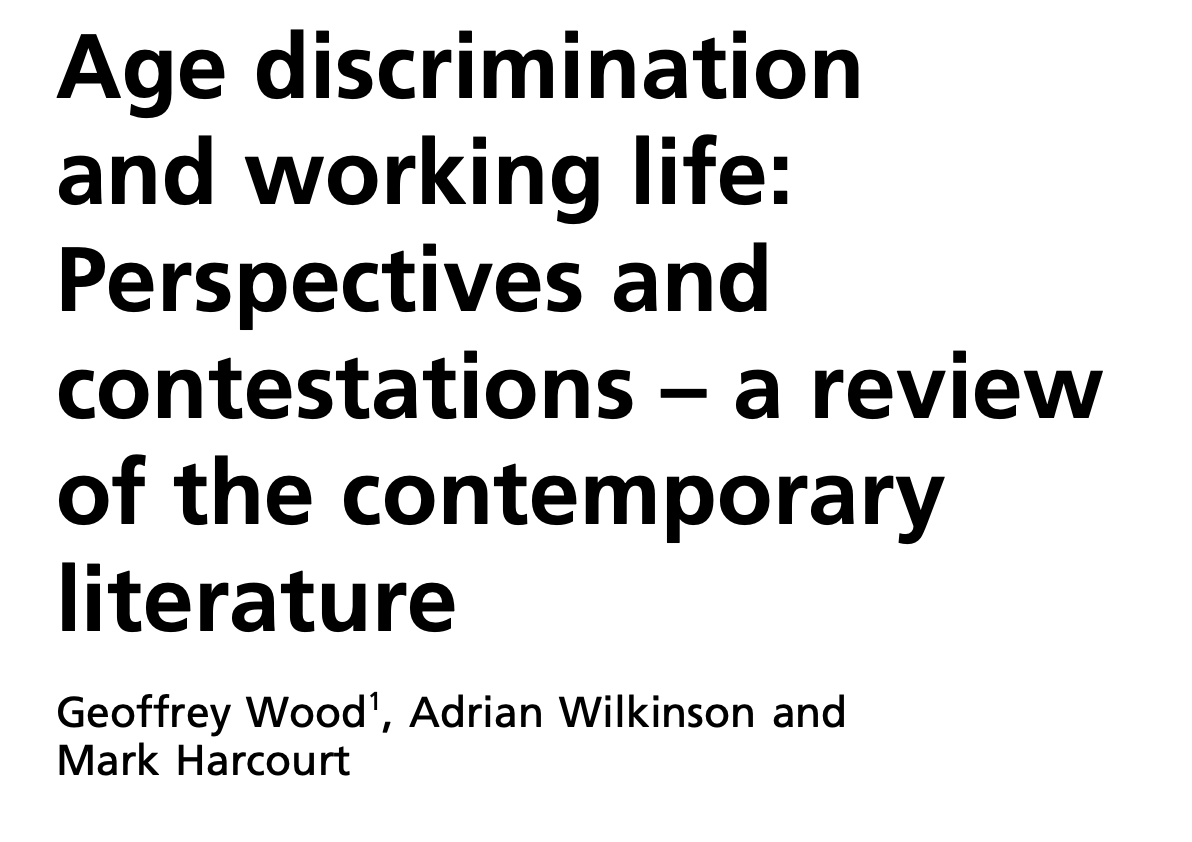

🚨 Why does age discrimination persist in the workplace? 🚨
This year, I’m exploring what it means to create a truly just organization. One recurring issue that continues to plague organizations—despite countless D&I initiatives—is age discrimination.
Find here a critical literature review raising some important points we all too often ignore 👇:
"A common theme through the more rigorous literature is that there is little justification for age discrimination in terms of physical capabilities and higher wage costs. Jobs can be redesigned to match the specific demands of the incumbents, while higher wage costs can be offset through greater organization, specific wisdom, and higher organization commitment. Why, then, does age discrimination occur? While some can be ascribed to historically embedded cultural norms and values, the causes often appear to be economic... Many liberal market national economies are highly dependent on low-cost, low-wage, and insecure work... the immediate cost advantages and opportunities for quick return may deter managers from adopting a long-term perspective, even if the latter may be more mutually beneficial."
So: If age discrimination isn’t rational from a long-term organizational perspective, why do so many businesses still practice it? The answer often lies in short-term economic thinking. In such a model, immediate cost savings and quick returns take precedence over the wisdom, organizational commitment, and long-term value that older employees bring.
💡 Addressing age discrimination, thus, requires more than internal D&I efforts—it demands systemic change.
🥅 We need job redesign that leverages the specific strengths of older employees and which creates working communities based on collective understanding of the shared good to strive for.
🥅 We need new accounting standards that compel businesses to factor in all externalities they create—including the social costs of exclusion and discrimination..
🥅 And importantly, we also need macro-level policy interventions to counteract the economic pressures driving short-termism and exclusionary hiring practices.
Let’s stop framing age discrimination as a matter of outdated cultural attitudes alone. It’s an economic issue, and tackling it means addressing the economic structures that sustain it.
🔍 What policy regulations have been found to be effective in addressing age discrimination?
🔍 Does anyone know of industry standards where businesses are collectively addressing their responsibility?
Link to article: https://doi.org/10.1111/j.1468-2370.2008.00236.x
02-01-2025



The economy is eating its children - literally?
We are in the midst of a reproductive crisis. In Germany and Switzerland, the birth rate is less than 1.39. At the same time, there are already an alarming number of vacancies in nursing care for the elderly and sick - and there is a risk of complete collapse by 2030. What's more, at least 20% of households in both countries have no savings to speak of. The dream of a one-earner household (if it is still a dream) in order to find time for children and parents? Simply unrealistic for most people.
There are many reasons for this. But it is often structural problems that drive us into this crisis:
📈 Work intensification that drains people and leaves no time for family care.
💰 Financial fears, exacerbated by the rising cost of living. In Switzerland in particular, childcare costs are among the highest in the world. In the case of care for the elderly, there are hardly any affordable options if you don't want to exploit people from Eastern Europe.
🤱 A lack of appreciation for health and care work, which is dismissed as “reproductive” because it is not directly “productive”.
⚖️ A weakening state that can no longer provide sufficient financial support for daycare centers and care facilities.
The political responses to this are often ideological: Neoliberals preach that work must pay again, without considering reproductive work or living wages. Conservatives call for women to return to the stove - and ignore the fact that this is unaffordable for most households. Left-wingers want to expand daycare centers and care, think about work-life balance, but cannot admit that the state often cannot afford this.
So we're stuck: the economy demands productivity and productivity - but in our current system, these needs are in conflict.
What is to be done? We must not stop breaking new ground:
🎯 Four-day weeks could increase productivity while creating more time for family.
🎯 Parental leave allows both parents to develop essential skills - skills that we urgently need in a changing world.
🎯 Companies could finally see care work as a leadership skill and promote new approaches to meet all needs.
What do we need to combine productivity and productivity? What approaches do you know of that are already encouraging today? How can the economy - progressive companies - contribute to “regenerative innovation” here?
For me, this is a topic that will also occupy me in 2025 - both personally and in the search for “good organizations”. Perhaps some food for thought for you all there
28-12-2024



📢 When Power Controls the Narrative: Lessons from Animal Farm
"Four legs good, two legs better!" 🐑
In George Orwell's Animal Farm, Napoleon the pig seizes control—not just of the farm, but of the truth. Through his spokesperson Squealer, Napoleon rewrites history, demonizes his rivals, and simplifies complex issues into slogans that discourage critical thought.
Sounds familiar? Today, we're seeing a similar story play out. Wealthy individuals and corporations acquire media outlets, promising to "save journalism" but subtly (or rather not so subtly as of recently) steering narratives to align with their interests.
📰 Step 1: Take over the communication channels.
Napoleon convinced the animals he was a selfless leader taking on a "deep and heavy responsibility." Similarly, modern media moguls often present themselves as protectors of free speech while shaping editorial lines behind the scenes.
💥 Step 2: Smear opponents and rewrite history.
Napoleon fabricated evidence to paint Snowball, his rival, as a traitor. In today's world, selective leaks or biased reporting often target political or business rivals, manipulating public perception.
🎙️ Step 3: Push simple, catchy slogans.
The sheep in Animal Farm were taught to chant, "Four legs good, two legs better!" to suppress dissent. Modern parallels? You bet - the 5 am club for instance but ofc more.
⚠️ Step 4: Silence dissent.
Napoleon used fear and punishment to quash opposition. Today, we see lawsuits, platform bans, and economic pressures used to intimidate critics and silence independent voices.
💡 Orwell’s message is clear: when the powerful control the narrative, truth becomes a casualty. Independent, diverse media is not just a safeguard for democracy—it’s a necessity for a just society.
I think it is time for all of us to reread animal farm!
25-12-2024

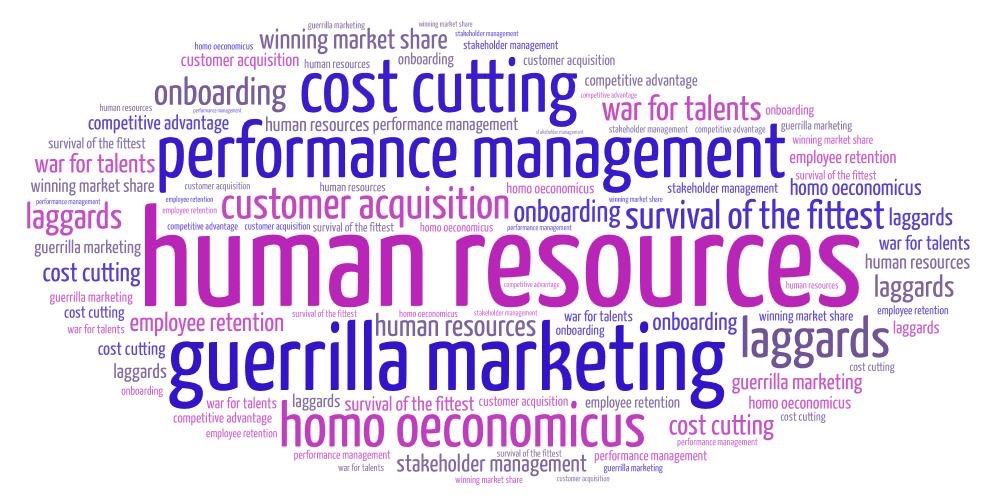

Human Resources or Resourceful Humans? 🤔
The words we use matter—a lot. And let’s face it, business is littered with technical, machine-like, dehumanizing terms, sprinkled with a heavy dose of war jargon. Just think about it: How often do you hear words like trust, cooperation, integrity, joy, or warmth in a boardroom? Rarely. It’s as if business operates in some parallel, amoral universe—where we march around in either bureaucratic or warrior mode, pretending none of it leaves scars. Spoiler: It does. 🩹
Decades ago, the great moral philosopher Robert C. Solomon warned us that language is never neutral—it’s always packed with values. So, why not consciously choose the values we want to see in business, instead of turning a blind eye? 💡 If we keep using cold, transactional language, we’re shaping a reality where relationships are reduced to contracts and people become inputs.
Fast forward, and Ferraro and Pfeffer showed us that words don’t just describe—they create reality. 🚀 Talk about “human resources” acting in “self-interested ways,” and guess what? You’ll design systems to monitor, control, and incentivize those imaginary homo oeconomicus jerks. But here’s the kicker: real humans—made of flesh and blood—react to distrust by becoming more self-interested, even if they’re usually team players.
Words don’t just shape behavior; they cage our imagination. 🧠 Fill your business vocabulary with warrior movie tropes, and it’s no wonder collaboration, ecosystems, or “all hands on deck” thinking won’t grow—it’s beyond the horizon we fenced in with our language.
So, let’s stop talking like wannabe generals or engineers tinkering with machines. Let’s choose language that reflects the human, relational, and ethical realities we want to live in. Because words aren’t just words—they’re blueprints for the world we build. 🌍✨
20-12-2024

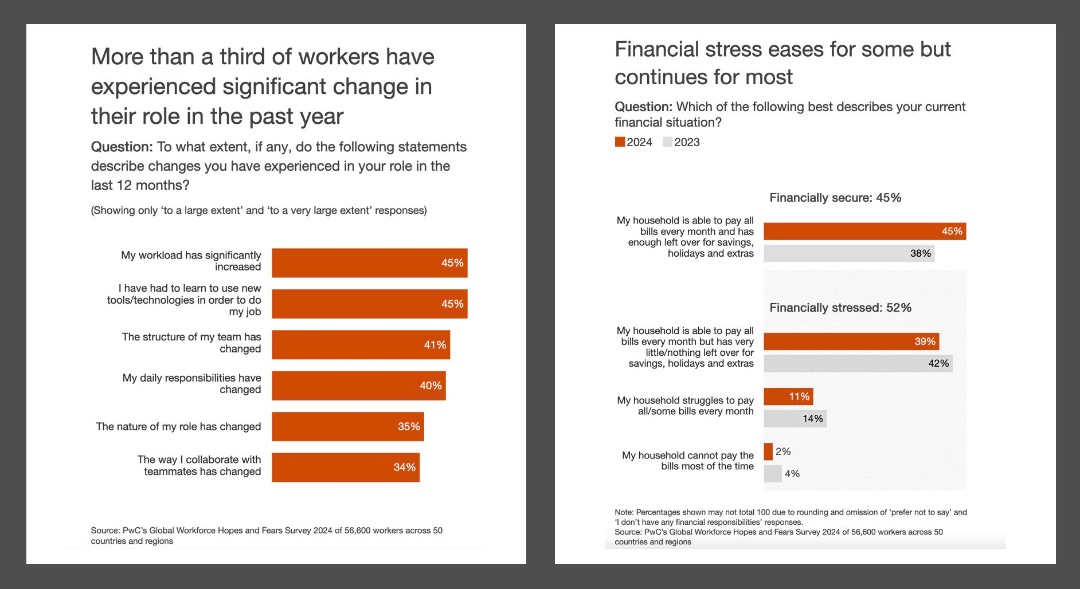

💼 Resilient workforce or regenerative organization? 💼
The numbers in this PwC survey might not be shocking—many of us, myself included, are running on fumes as we count down to the holidays. It’s no surprise, given that our workloads keep increasing, our roles evolve constantly, and the world of work seems to spin faster than ever.
But here’s the thing: I don’t think this is about "building more resilience in the workforce" as PWC titles it. Let’s be honest, we’ve optimized ourselves to the limit—no amount of yoga classes or mindfulness apps will fix this.
The root cause? Corporate growth at all costs.
🔹 It’s unsustainable for nature, as we already know.
🔹 It’s unsustainable for us as people—exhausted, overworked, and disconnected.
🔹 And often, it’s not even for reinvestment in the business. Instead, it’s for shareholder payoffs, like stock buybacks or dividends.
Let’s not forget: our fatigue often leads to more mindless consumption, fueling the very cycle that’s burning us out.
We don’t need "resilience" to keep up with a broken system—we need a new system altogether. Imagine:
🌱 Businesses designed around sustainability, using resources intelligently instead of lavishly (hello, circular economy!).
🌟 Organizations contributing to well-being and the good life, not just the bottom line.
This will require resilient organizations—not just resilient people. Companies capable of weathering the storm of transformation into something better: regenerative organizations. These are workplaces that replenish their most valuable resource—us—and enable different, sustainable business models, goods, and services.
✨ What do you think? What will be needed for us to shift and what could be the task of HR to enable this move?
19-12-2024

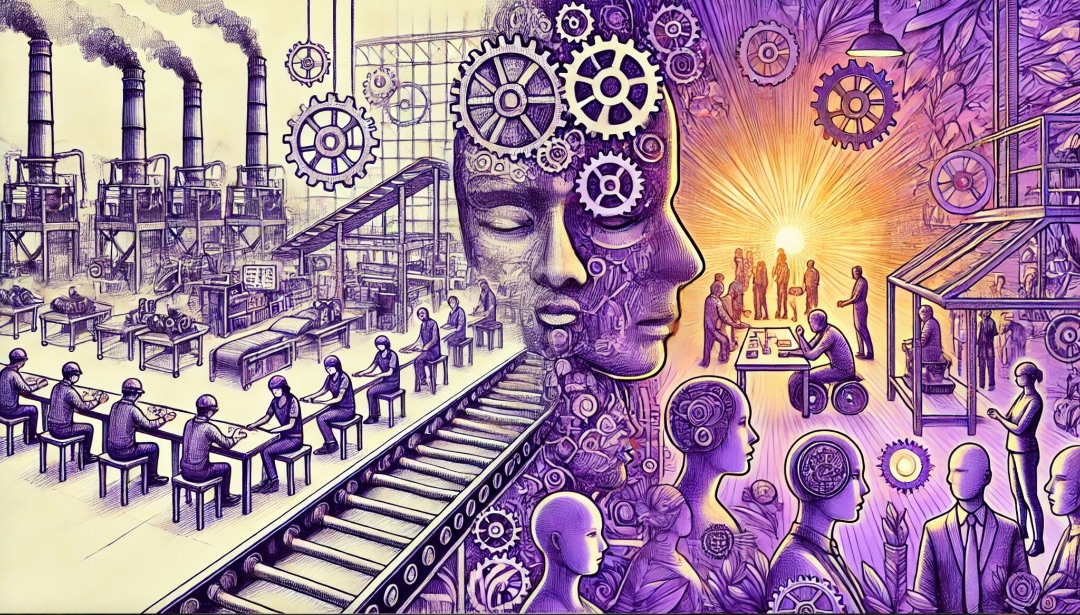

🤔 Why do we keep believing the myth?
The myth of the lazy, insecure blue-collar worker has been pervasive for decades. You’ve heard the sayings:
“They’ll only work harder if you stand over them.”
“They’re here for a paycheck, not responsibility.”
“You can’t trust them to care about the bigger picture.”
But here’s the thing: it’s not true.
Again and again, the evidence shows that when workers are empowered—when they’re trusted to take ownership, collaborate, and use their creativity—remarkable things happen.
Humanizing work doesn’t mean abandoning excellence. On the contrary:
🎯 It means empowering humans to learn, adapt, and collaborate on their own terms.
🎯 It means trusting teams to take ownership of their work and find pride in doing it well.
🎯 And yes, it works on the shop floor, too.
Take NUMMI, where Toyota’s principles turned a struggling GM factory into a world-class operation. Or Scania Group, where modular truck production gave shop-floor teams autonomy and pride in their craft. Or Michelin, where workers on the line solved problems and drove innovation. And then LAYS, where frontline workers handled scheduling, quality, and improvements themselves.
The results?
💫 Teams delivering excellence—because they own it.
💫 Higher engagement and pride in work.
💫 Innovation driven from those closest to the process.
And yet, we keep falling back into rigid hierarchies, claiming “it won’t work here.” But here’s the kicker: when some of these experiments struggled, it wasn’t the workers—it was managers unwilling to let go of power.
We always have a choice. Work doesn’t have to be robotic or soulless. It can be a place where people learn, grow, and excel—together. Isn’t it time we stopped believing the myth?
For those who want to read more - I really liked these two articles: https://lnkd.in/dzcWYcdn and https://lnkd.in/dY_ScnNY
16-12-2024



Comment on "A Radical Rethink of HR" by Ashley Goodall (2024)
I agree in many aspects - but disagree with one: this is not going to be an easy ride precisely because employee and management interests can be conflicting. Here HR really needs to shape up and be able to bridge, to mediate conflicts, to search better solutions dialectically. But otherwise it is quite bang on the matter:
- "Now, the first important point to make is that our two circles do not perfectly line up with each other. There are things that are in the interests of the business that are very much not in the interests of employees (layoffs, restructurings, late-night emails, open-plan offices, long-haul travel in coach); and there is plenty of stuff that is in the interests of employees but not very much in the interests of the business (raises, vacations, sleep). In the olden days, the fact that the circles don’t exactly align was made up for by pay and benefits, the function of which was to compensate people for some stuff that wasn’t great (hence, in one sense, compensation). Again, a non-crazy proposition: Because we (the business) recognize that there’s some stuff that’s a little bit sucky for you (the employees), we should do something to make up for this and induce you to hang around, whether that something is money, or benefits, or wellness gurus, or foosball tables, or Instagrammable offices.
- Even if that approach were ever really sufficient, it certainly isn’t now, as the widening gap between companies and their workers illustrates. The unwillingness of employees to mutely accept what their employers have to offer is a reflection of the importance of the second circle — employees’ interests — and a reflection as well of the perception that between them, business leaders and HR have inadequately addressed those concerns.
- HR and the Second Circle: Right now, HR sees itself as the implementation arm of the people-related things in the first circle — and this certainly appears to be the role that most businesses want it to play. In many organizations today, HR functions either as an agent of management or as a slightly awkward mediator between employees and management, trying to explain what’s going on to employees while nudging management in a better direction."
Source: https://sloanreview.mit.edu/article/a-radical-rethink-of-hr/
12-12-2024

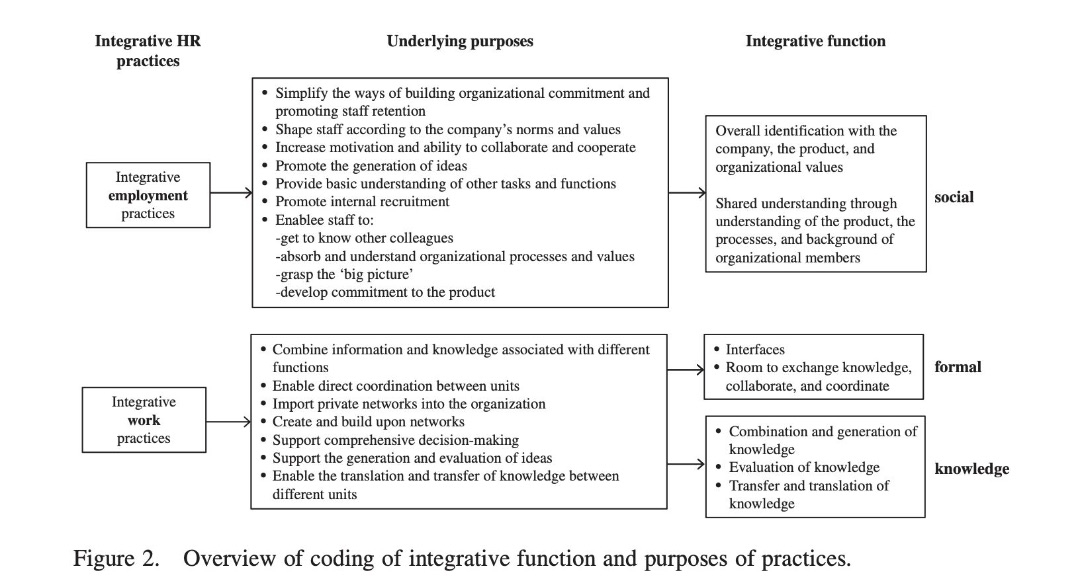

Navigating the Tensions: The Quest for Integration in Business
Businesses today operate in a web of competing demands: balancing people, planet, and profit; innovating while delivering to market; and investing in growth while cutting costs. These tensions, exemplified in challenges like Germany’s current economic dilemma, demand more than just balancing or switching between priorities over time. Similarly, relying on parallel structures within organizations, while offering some benefits, is not sufficient to handle these persistent and complex dynamics.
Instead, companies need to pursue integration—finding imaginative ways to reconcile these tensions into cohesive strategies. Christian Garaus and colleagues explored this challenge through three Austrian "hidden champions": Firetrucker, a global leader in firefighting vehicles; Lookmaker, a premier producer of high-quality rimless eyewear; and Snowrider, a pioneer in ski service and other niche engineering solutions. Each company, despite operating in different sectors and facing distinct market pressures, demonstrates the power of integration in addressing the dual demands of innovation and efficiency. For example, Snowrider combines independent divisions with centralized R&D and production to streamline operations while fostering creativity (see source below 👇 ).
What role does HR play in this integration? The research highlights that HR functions as the connective tissue, enabling the flow of knowledge, fostering collaboration across units, and supporting a culture where employees can navigate these tensions. By designing systems that bridge structural divides and empowering individuals to engage in exploration and exploitation simultaneously, HR becomes a key driver of organizational ambidexterity. As these hidden champions illustrate, the future lies not in managing trade-offs but in integrating them.
But I would to up this claim. Thoughtful integration is also needed for the even bigger challenges ahead and for the transformation of business into a force for good for the planet and the people on it. It’s a call for HR to reimagine its role - and a very inspiring too.
Source: https://www.tandfonline.com/doi/figure/10.1080/09585192.2015.1045007?scroll=top&needAccess=true
07-12-2024

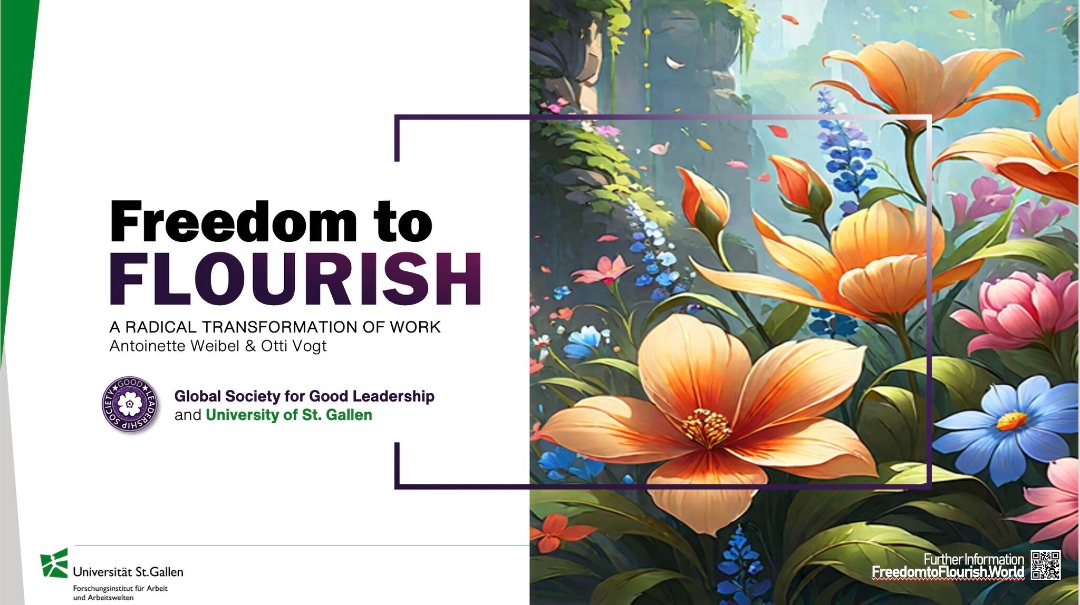

The Economy is Stuck
The challenges of our time—climate crisis, social inequality, and a loss of trust—demand that businesses reinvent themselves. Yet too often, we respond to new problems with old solutions: more efficiency, more control, more of the same.
But this is no longer enough.
What we need now is true inspiration. A bold vision of reimagining the economy—not just as a machine for profits, but as a force that nurtures the well-being of people, society, and the planet. The real question is: How can we make this transformation happen?
This is exactly what our talk is about: "Freedom to Flourish – How Transformation Succeeds."
Why you should join us: The question is no longer if we need change, but how. For three years, we’ve studied what makes organizations successful when they align with the needs of people, society, and the planet. The conclusion is clear: Traditional management logic is obsolete.
What’s needed instead are approaches that put responsibility, imagination, and rootedness at the core of how organizations operate.
Highlights of the talk:
🚀 Understanding Transformation: Why outdated practices like rigid goal-setting, performance appraisals, and variable pay often do more harm than good.
🚀 From Profit to Purpose: How companies can achieve financial success while leaving a positive legacy.
🚀 Reinspiring Organizations: Thinking beyond the TEAL paradigm and recognizing how ideologies shape organizational behavior.
🚀 HR as the Key Function: How HR can go beyond administration to transform organizations into a force for good through ethical leadership and deliberate development.
👉 Watch the video now: https://lnkd.in/ep9BGG84
The Flourishing Manifesto
We’re introducing a people-centered approach that puts flourishing, creativity and shared prosperity at the heart of business, transforming organizations into positive forces for change.
Let’s work together to:
👍 Rethink the economy.
👍 Build organizations that help people, society, and the planet thrive.
👍 Embed responsibility and imagination into the DNA of businesses.
🔗 Learn more: https://lnkd.in/etKyxqPP
🌱 Join the movement for responsible leadership. The economy can become a force for good—but only if we act now.
29-11-2024



The German economy is faltering, at least according to official reports. Political players and CEOs promptly come up with well-known recipes: the CDU calls for more “decency and diligence”, the FDP smells a battle in the field and calls for “performance that must be rewarded again” can be heard from the business world. But this chorus seems like an echo from a bygone world - one in which “performance” meant above all getting to grips with, following and carrying out tasks, and motivation could be decreed from above.
We call this red/machine: an organizational logic that focuses on commands, control and efficiency. But today we live in a networked world that demands something completely different: Adaptability, proactive thinking and cooperation based on trust and a diversity of perspectives.
At the same time, we live in a pluralistic society in which different world views clash. Instead of rehashing old slogans, what is needed is genuine listening and a critical but open dialog - in order to learn from this diversity and develop sustainable solutions together.
Companies are caught between the pressures of profit, social responsibility and ecological transformation. In this complex reality, what is needed is not a blunt “spitting hands” and rigid systems, but a sense of responsibility, imagination and anchoring. It is about organizations that do not manage people as “assets” but take them seriously as co-creators, that question their ideologies and seek a balance between economic success and social responsibility.
The Flourishing Manifesto, which we present in our talk, shows ways in which organizations can create this transformation - with a people-centric approach that promotes flourishing, imagination and smart action for shared prosperity.
👉 Find out more in our video: https://lnkd.in/ep9BGG84
Our highlights:
🚀 From profit to legacy: How companies can combine financial success with positive social impact.
🚀 Questioning ideologies: What comes after the TEAL paradigm and how do beliefs influence our actions?
🚀 Rethinking HR management: Why traditional methods such as targets and performance appraisals often do more harm than good.
🚀 HR as a force for change: Why HR can play the key role in transforming organizations into forces for good.
🔗 Further information: https://lnkd.in/etKyxqPP
Our interviews with progressive organizations show: It works. Agility and social responsibility do not have to be opposites. Let's create organizations together that make people, companies and the planet thrive. 🌱
23-11-2024



Building Businesses for Good: A Framework Rooted in Ethical Principles
In a world that increasingly calls for businesses to act as forces for good, we need a framework that connects deep ethical principles with practical action. Imagine a tree: its roots firmly planted in the ground, its trunk providing structure, and its leaves branching out into meaningful impact.
The roots of this framework could be four foundational principles: Human Dignity, Shared Flourishing (Common Good), Empowerment (Subsidiarity), and Mutual Responsibility (Solidarity).
💌 Human Dignity reminds us that every person has inherent worth. Businesses must reflect this by respecting and empowering all stakeholders—employees, customers, communities—through fair treatment, opportunities for growth, and safe environments.
💌 Shared Flourishing shifts the focus to creating conditions where individuals and communities thrive together, emphasizing shared goals and collective well-being.
💌 Empowerment ensures that businesses enable autonomy and creativity by supporting individuals in reaching their potential and making meaningful contributions to organizational and societal success.
💌 Mutual Responsibility highlights the importance of contributing to the greater good with a shared sense of accountability, ensuring no one is left behind in the pursuit of success.
From these roots grow the trunk and leaves—three practical principles that businesses must embrace: Good Goods, Good Work, and Good Wealth.
🎯 Good Goods calls on businesses to produce products and services that genuinely serve society by meeting real needs and providing value. This also means actively addressing the barriers faced by underserved populations, ensuring equitable access to economic opportunities.
🎯 Good Work focuses on organizing workplaces where individuals find purpose, fulfillment, and opportunities to grow. Roles should be designed to foster collaboration, develop skills, and align with intrinsic values. Organizations that embrace empowerment enable employees to contribute meaningfully while building a culture of shared ownership and trust.
🎯 Good Wealth challenges businesses to be responsible stewards of resources—financial, human, and environmental. Sustainable practices should not only protect but regenerate ecosystems, while wealth and benefits are distributed fairly among all stakeholders. This approach balances profitability with accountability, ensuring prosperity is just and inclusive.
A business rooted in these principles doesn’t just grow—it thrives, supporting individuals, communities, and the planet. It connects ethics with action, ensuring that every branch of its operations contributes to a more equitable, sustainable, and human-centered world.
Are we ready to grow together in this way? (warning: still a good chunk of catholic social teaching within here)
18-11-2024

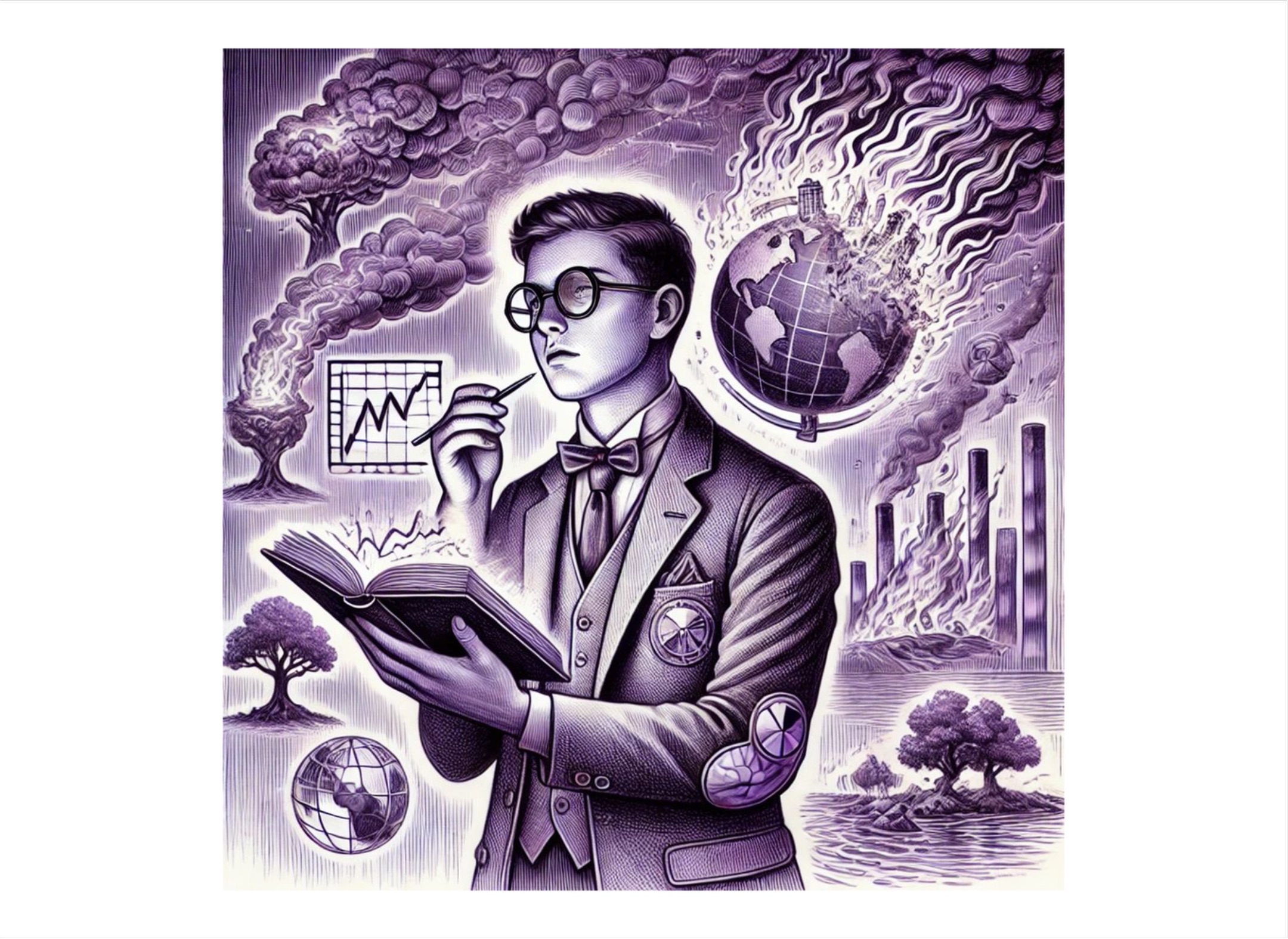

The Economist’s Apprentice
O, bold he stood, the student keen,
With theories sharp and bright,
He dreamt of endless wealth unseen,
Of power infinite.
“Master, hear, my plans expand!
Growth unbound will shape the land.
Give me but your rules of old,
To turn all things to endless gold.”
So spoke the eager mind in haste,
His master’s wisdom cast away.
No heed to limits, none to waste,
His formulas held sway.
“Resources plenty, man divine,
All the world will yield in time!
More we’ll grow, and more we’ll claim,
Until the world repeats my name!”
With numbers rising, greed took root,
The markets fed his spell,
Unbridled wealth their sole pursuit,
The rich were served too well.
The forests fell, the oceans cried,
The people bowed to powers wide.
The cost of growth, unseen, ignored,
Bore famine, fire, and silent wars.
“Stop now, stop!” the scholar wailed,
The graphs had turned askew,
But power’s might, unleashed, prevailed,
No end could he construe.
His master gone, no word to hear,
The economy surged in wrath severe.
Man and nature, chained, subdued,
By greed, by growth, by systems crude.
Back the master came at last,
To find his world laid bare,
“The tools you use, though tied to past,
Have not been handled with care.
Economy is no endless well,
Nor wealth a god, nor markets spells.
Learn, apprentice, or let it die,
For nature’s patience won’t comply.”
Humbled stood the scholar then,
His theories turned to sand.
A lesson learned, too late for men,
The planet’s scorn at hand.
The spell undone, the power ceased,
But the price of greed, it had increased.
O, would the master’s voice resound,
Before the cost had so profound.
Thx to chat gpt - but well made, not?
15-11-2024



🌟 The Gift of Good Work: A Reflection on Contribution and Subsidiarity 🌟
Work is more than a paycheck or a set of tasks. At its heart, work is a gift—a chance to contribute, to grow, and to serve something greater than ourselves. This is what I read in preparation of an interview on catholic social teaching and we could all learn from this💡
The principle of subsidiarity reminds us of a profound truth: every individual has unique talents, abilities, and perspectives that are essential to the whole. Recognizing and celebrating these gifts is not just an act of leadership—it’s an act of humanity. 🤝✨
Here’s a thought-provoking framework to integrate subsidiarity into our workplaces:
🔍 See: Take a step back and truly see the people around you—not as “resources” or “units,” but as individuals with intrinsic value. As Tolstoy once said, “Everyone thinks of changing the world, but no one thinks of changing himself.” Begin by reflecting on how your own work changes you. 🌱
⚖️ Judge: Reflect on the roles and gifts entrusted to each person. How are you fostering an environment where everyone can share their skills and live out their vocation? Work should be a space where the imago Dei—the divine spark within—is nurtured and expressed. 🌟
🚀 Act: Recognition must lead to action. Businesses thrive when we:
1. Design work thoughtfully. 🛠️
2. Educate and equip employees to succeed. 📚
3. Trust people to rise to the occasion and own their contributions. 🌍
Work is transformative—both for the world and for ourselves. Let’s create workplaces where every gift finds its place, every voice is heard, and every contribution matters. 🌈
💬 How do you ensure that your workplace celebrates the gifts of everyone?
08-11-2024



🚨 ALL HANDS ON DECK 🚨
The last few weeks have been a drumbeat: images from Valencia, billionaires buying seats in governments and a return of authoritarian leadership - loud and clear. It's scary and sometimes makes me feel helpless too.
But what all this shows: We have to learn to deal with disorder and crises. And we in Switzerland can do this from a position of strength - a strength that may be fragile, but can give us a small head start.
What we need now: All hands on deck 🚢! I have been convinced for years that HR has the task of building ORGANIZATIONAL RESILIENCE. This is work on and in the system. Only empowered people can not only get to work, but also think. Only a culture of appreciation, mutual challenge and support will bring about the necessary rethinking, creativity and care that is now required.
To achieve this, we need to redesign work - not with a foosball table, but as meaningful, solidary adult work. And yes, we need to overhaul our core systems. Performance management, for example, must no longer mean counting and competition, but rather promoting reason, co-creation and co-elevation. And when it comes to selection, the following applies: resist the beginnings - narcissists are not the solution (even if they are very popular at the moment).
And a bit of advertising on my own behalf 😉: I have been able to promote this time and again for over 10 years together with many inspiring HR managers. Further training remains the key.Now is the time for fit and courageous HR!💪
06-11-2024



Yesterday, a ray of hope 🌈 illuminated our space as we gathered to discuss the Flourishing at Work Manifesto. We felt inspired and reaffirmed in our belief that work can indeed be the heart of a flourishing revolution. Yet, in times like these, when the world feels uncertain and heavy, we need—more than ever—courageous companies and compassionate leaders who refuse to let humanity, and our planet, falter.
We need excellence brokers, those skilled in forging alliances with the willing 🌳. To you, we say: step into your professional circles, engage with leadership societies, and unite as a force for good. Through small but strategic actions, you can guide your organizations in the right direction, paving the way for a more hopeful future. And be that so whispering in the CEOs ear 😊.
And for those positioned to lead at the forefront, we need leaders for good—ambassadors and guardians of flourishing 💐. With every product you create, every service you deliver, and every interaction you shape, let your actions radiate purpose and care. Shine your light for others to see. Be the beacon others can look to in challenging times, lifting everyone up by nurturing the wisdom within your organization and extending it into your ecosystem.
Let’s find the courage to persevere 💪 , and let us not concede before the battle is truly over. Together, let’s create the change we wish to see 🌟
01-11-2024



🌍 Why Are We All So Stressed? 🌍
Yesterday, a colleague and I had a conversation that stuck with me. For years, I’ve noticed a trend among my students: when I ask them to rate their stress levels in our check-ins, they consistently report high numbers—often around a 7 out of 10. While part of this stems from the intensity of the Bologna system, with constant exams and part-time jobs to “prove” their employability, there’s something more profound at play. This isn’t a new situation, but the stress levels are reaching new heights.
As I prepared for a talk on degrowth, I revisited Hartmut Rosa’s thesis on the “hashtag#acceleration hashtag#trap.” Rosa argues that we’re living in an era of relentless acceleration that’s leaving us, quite literally, breathless. This phenomenon has three layers:
1) Technical Acceleration: We’re moving, producing, and communicating faster than ever. The world has shrunk to our fingertips, and yet, it often feels more overwhelming than accessible.
2) Acceleration of Social Change: We have more choices than ever—career paths, relationships, lifestyles. Gone are the days when one’s future was predefined. Now, we’re told to “craft” our ideal life, but with so many options comes an additional pressure to choose wisely and continuously reinvent ourselves.
3) Acceleration of Life: We’re constantly optimizing. Each year, technology “frees up” more time, yet we feel as though we have less. We cram more experiences, more achievements, more refinement into every spare minute, all while battling FOMO. The more we do, the less it feels like it’s ever enough.
These layers interlink, creating a logic of intensification that traps us in an endless cycle. The wheels are spinning faster, and stepping out feels like falling behind. We’re told to self-optimize, but self-optimization alone can’t release us from this treadmill.
So maybe this is the true root of today’s high stress levels: it’s not just about doing more; it’s about escaping a system that demands more without ever truly satisfying.
🧩 How do we get off the treadmill?
20-10-2024

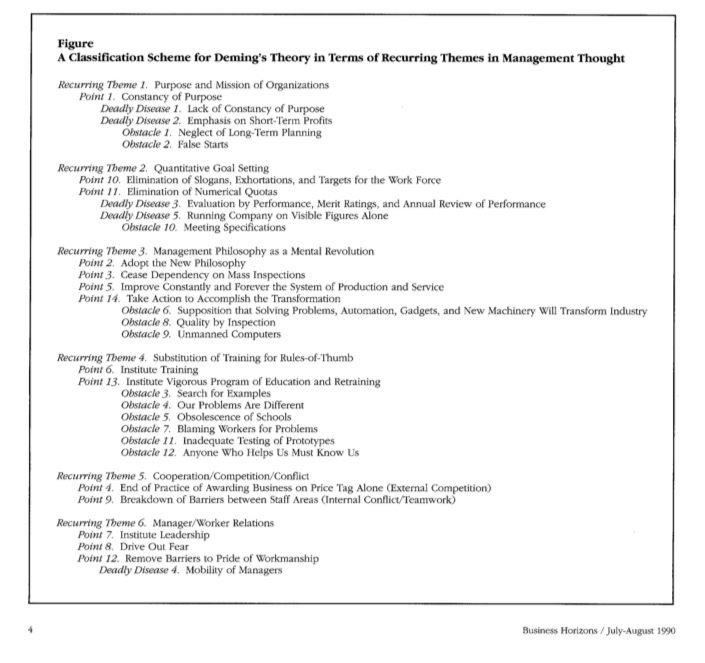

What if we looked at HR through an (early) systems management perspective 😉 let’s see how Deming would tell us off:
„If I were to look at today’s HR performance management practices, I’d say we’ve learned nothing. Performance reviews, merit ratings, forced rankings—these are poison to any organization. You cannot hope to improve an organization by rewarding individuals based on how well they can manipulate the system, or how much they can outperform their peers. Competition within your company destroys teamwork and focuses people on survival, not improvement.
Management by objectives? Quotas? These are the diseases I warned about long ago. They drive short-term thinking and blind decision-making, forcing managers to chase numbers rather than build meaningful processes. What good are your quarterly targets when your organization is falling apart from within?
You cannot blame employees for poor performance when the system itself is flawed. The vast majority of problems in an organization are caused by the system, not the people. Yet, HR today still clings to the notion that individuals are to blame, as if rating and ranking employees will magically solve the deeper issues.
Drive out fear—this was one of my key principles, and yet today’s HR practices create an environment of constant fear, where workers are pitted against one another, where their worth is reduced to a score on a review form. You cannot innovate in a culture of fear.
Want better performance? Stop treating your people like isolated numbers. Fix the system. Build trust. Focus on collaboration. Performance doesn’t come from measuring people—it comes from improving the way you work together. Until HR understands that, they’ll continue to kill the very potential they’re trying to manage.“
And he was successful with these principles amazing how quickly we forget.
12-10-2024



Monsterstorms, monsterfloods, fascists gaining elections (by a margin, but still), exploding wars, recession and more. I certainly did not like this year so far. But the more I am surprised by our government: austerity is the name of the game! We do not want to live at the expense of next generations and I get that (and trimming inefficiencies is fine to some degree) but ofc by not investing in the green transformation and in leaving a big part of the population behind we destroy their future to start with - between scylla and charobydis. Or not as Ann Pettifor explains so clearly.
Ann Pettifor explains why governments must end austerity measures to tackle the climate crisis and fund a green transformation. She argues that austerity restricts economic growth and leads to social inequality, which makes it harder to address environmental challenges. Governments can generate the necessary funds for green investments by managing capital flows and implementing financial reforms. This includes reclaiming control over money creation, regulating credit to prevent overconsumption, and shifting financial priorities toward renewable energy and sustainable infrastructure.
Pettifor highlights that by implementing capital controls and breaking the dominance of global financial markets, governments can stop prioritizing the interests of financial elites and instead focus on public investment in long-term green projects. She emphasizes that money is not a limited resource but can be created and allocated responsibly for the common good. Her vision calls for an end to the austerity-driven mindset and a move toward economic policies that prioritize environmental sustainability and social well-being.
Through these measures, she advocates for systemic financial reforms that align economic policies with the urgency of the climate crisis while addressing inequality. The control over money and credit, she argues, should be in the hands of public institutions, allowing governments to steer economic decisions towards investments that benefit people and the planet.
For more details, you can listen to the interview here: https://www.greenpeace.org/international/podcasts/64940/systemshift-ann-pettifor-the-story-of-money/. And yes I know that neoliberal economists will disagree but they are really just one voice of many.
11-10-2024

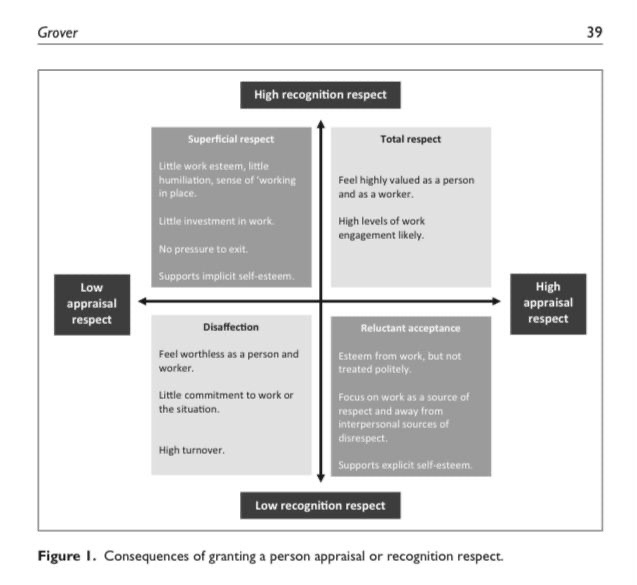

Respect and respect
A typical corporate saga unfolds: the heroic performer, Alex, who hits every target and exceeds expectations. Promotions and bonuses come his way, and his work is a benchmark for excellence. Yet, beneath this polished surface, human exchanges are a different story. In meetings, Alex’s ideas are brushed aside, his voice often drowned out by louder colleagues. Despite his achievements, he feels invisible, appreciated for what he does but not valued for who he is.
This distinction illuminates two types of respect as Steven Gover stresses: appraisal and recognition. Appraisal respect is conditional, granted based on achievements and competencies, aligning with the principles of justice. It’s an evaluation rooted in merit, acknowledging the value of a person’s contributions within a system of rules and standards. In contrast, recognition respect is unconditional, an ethical stance that recognizes the inherent dignity of every individual. Tied to the domain of care, it transcends performance, valuing people as moral beings deserving of attention and empathy, regardless of their output. It’s about seeing others as ends in themselves, as Kant suggested, rather than as mere means to an objective.
Here’s the catch: without recognition, appraisal falls short. When people are valued only for their output and not as human beings, they become commodities—disposable and replaceable. To build a thriving and just workplace, both forms of respect must be present. Recognition without appraisal feels hollow, but appraisal without recognition breeds resentment and disengagement. Without considering justice and care, organizations risk breeding disengagement and resentment. True respect requires both: seeing people not just for what they produce but for who they are. We need a balance where justice meets care to create spaces where people feel valued for who they are and what they do.
Btw I have been there too and I find lack of respect, the deserved and the humane one, very hard to bear. It poses the question: how much to take and when to quit even if sunk costs would arise 🧐
10-10-2024

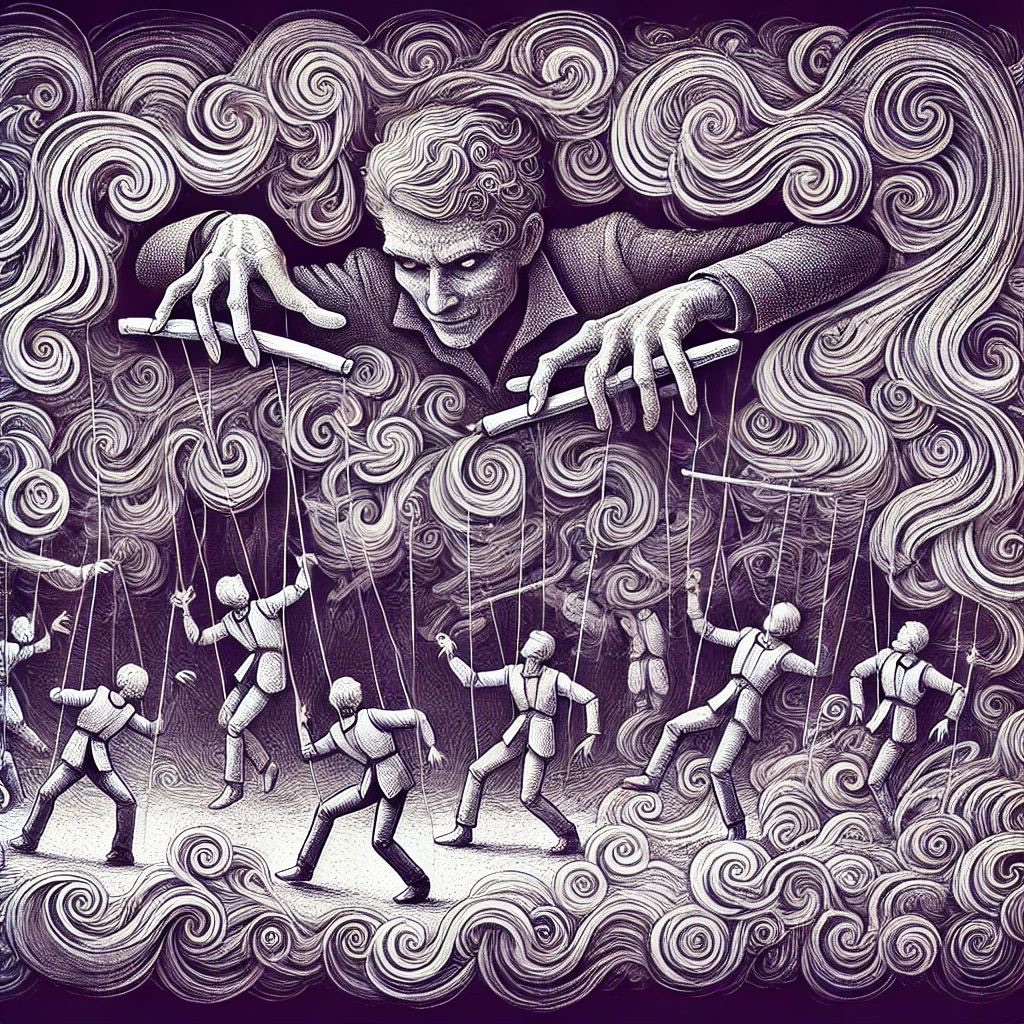

Performance Evaluation Should Die
Performance evaluations—those beloved rituals of corporate theater—are alive and well, even though they serve no one. They’re the zombie of organizational life: everyone knows they’re dead, yet they stumble on, consuming hours, resources, and the souls of employees. We pour millions into these systems, tweaking and refining them, adding layers of bureaucracy and complexity, and what do we get? The same feedback loops of dissatisfaction.
Organizations keep insisting, “Feedback improves performance.” Reality check: employees dread it, managers resent it, and the entire charade barely moves the needle on actual productivity. But hey, let’s keep pretending this time will be different.
The truth is harsh: most employees don’t need or want these evaluations.
Why It Fails?
Performance evaluations fail because they’re built on flawed assumptions and outdated practices. First, they rely on subjective judgments, making them inherently biased and inconsistent. Supervisors and managers, who are often tasked with these evaluations, bring their own biases, leading to discrepancies and unfair outcomes. Research has shown that the reliability of these ratings is abysmal; factors like timing, rater biases, and even irrelevant attributes such as an employee’s gender or appearance overshadow actual performance. Second, feedback—the supposed backbone of these evaluations—is often ignored, misinterpreted, or rejected by employees who see it as biased or irrelevant. This disconnect not only leads to cynicism but actively undermines motivation. Moreover, the fundamental belief that measuring performance improves productivity is flawed; most systems create an illusion of control while offering no real value. Companies pour time and resources into a practice that breeds resentment, all while failing to produce tangible improvements. Ultimately, the time and energy wasted on these evaluations would be better spent focusing on coaching and genuine leadership, rather than clinging to a broken and demotivating system.
If performance evaluation is such a flawed concept—riddled with bias, favoritism, and misguided motivations—why do we persist? Simple. It's easier for organizations to cling to outdated rituals than to face the void of uncertainty. It's easier to check boxes than to lead.
Maybe it’s time we abandoned the idea that performance evaluation is anything other than a mechanism of control and punishment. Maybe it’s time we focused on genuine leadership and support, rather than playing judge, jury, and executioner.
06-10-2024

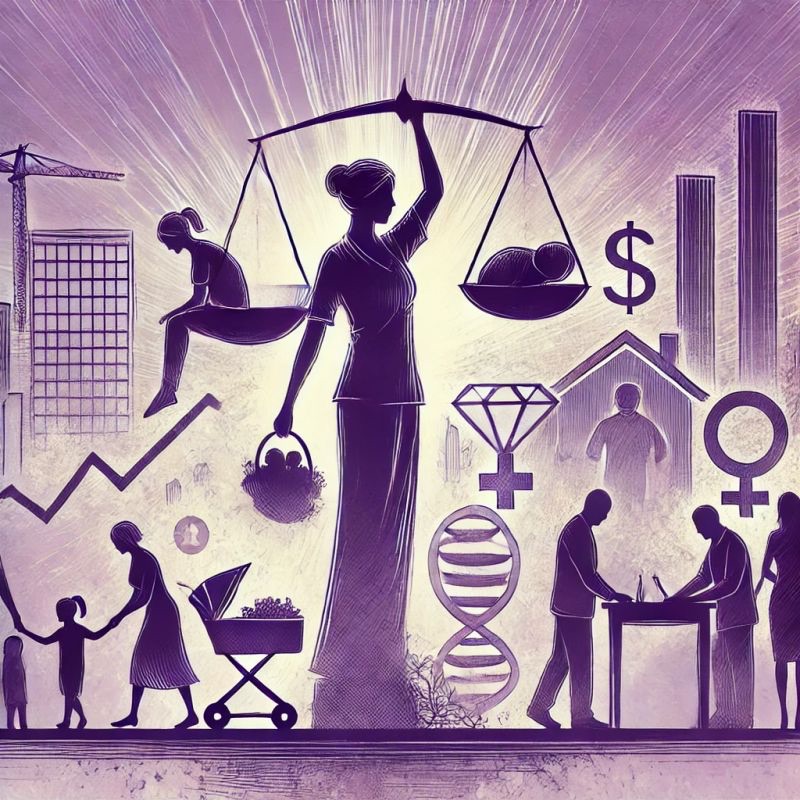

💡 Unpaid and care work: An often overlooked economic pillar 💡
When we think about the economy, we often focus on markets, employment, and financial systems. But there's another layer—unpaid care work—that quietly supports these structures, especially during times of conflict or economic stress.
Feminist economists, like Julie A. Nelson and Marilyn Power, have expanded our understanding of economics to include unpaid work as part of the broader process of “social provisioning.” This includes caring for children, the elderly, and communities—a vital contribution to economic systems, yet rarely recognized.
Research shows that unpaid work is critical not only for daily life but also for sustaining labor forces over time. Whether it’s raising future workers or caring for those who keep economies running, this unpaid labor contributes to human capital and well-being.
📉 During periods of austerity or economic downturns, households often absorb the shock of reduced services by increasing unpaid work. This allows families to maintain standards of living, even when public or market services are limited. However, this also highlights the opportunity costs—particularly for women—whose time and financial independence may be constrained.
Unpaid work isn’t just an act of personal sacrifice—it’s an economic activity with far-reaching implications. How might we better integrate this work into our understanding of economic resilience?
01-10-2024

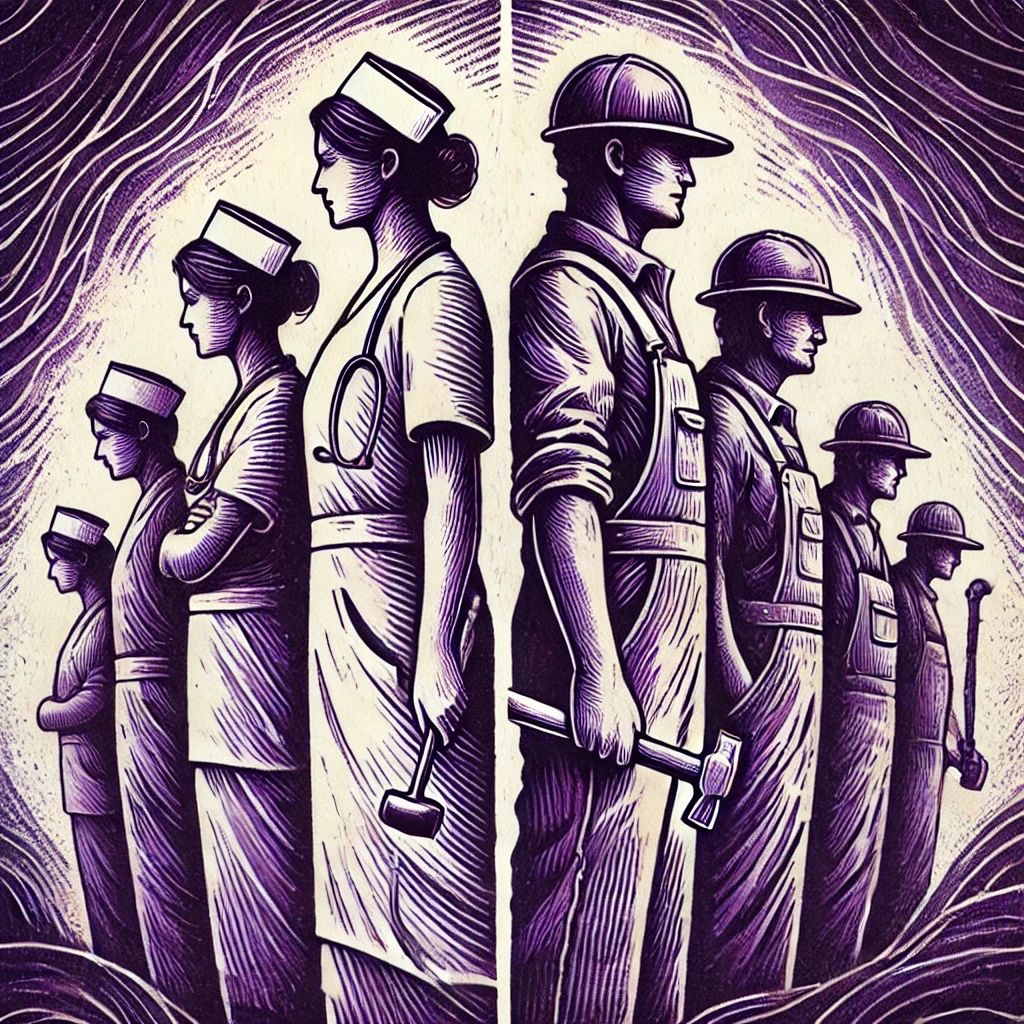

THE FALSE DIVIDE
The persistently low wages of nurses, even in times of crisis when they are leaving their jobs en masse, reveal much about how we frame certain professions through a mechanistic and reductionist worldview. As Julie Nelson points out, nursing is still seen as a "calling," a holdover from Victorian times when economic theory was shaped by the idea of women as "moral angels" driven by care, not money. This outdated belief persists, suggesting that if wages were too high, the wrong type of people—those motivated by money rather than love—would flood into the profession. Yet, when it comes to the "hard-working homo economicus" of (then) male-dominated industries, higher wages are seen as a natural solution to labor shortages, as these workers supposedly have no love for their work—only a love for money.
Ironically, this rigid dichotomy between love and money is completely undermined by research. Studies by Bård Kuvaas show that a generous salary enhances intrinsic motivation, as it signals recognition and respect for the worker's efforts. Bruno S. Frey also demonstrated that only controlling forms of monetary rewards, like bonuses or piece-rate pay, erode intrinsic motivation. Whether in the form of pride, loyalty, or joy, motivation exists in all corners of the workforce, and wages that provide security and dignity support, rather than weaken, this drive. But instead of embracing these findings, we cling to the false belief that financial reward and intrinsic fulfillment cannot coexist.
This refusal to rethink the relationship between money and motivation cuts across ideologies. Right-wing thinkers champion the idea that money and competition are the best motivators—unless we’re talking about care work, which they assume must come from love alone. Meanwhile, the left often fears that market exchanges will devour the lifeworld, leading them to separate work and love as mutually exclusive. Both sides miss the point: humans are complex, and the simplistic divide between love-driven work and money-driven work ignores the real, messy interplay between recognition, dignity, and the financial security all workers deserve.
15-09-2024

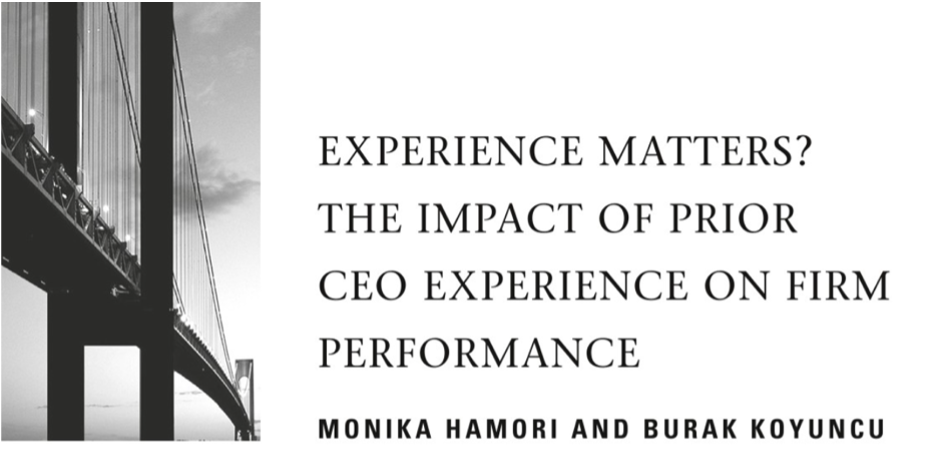

CEO TALENT - IT IS INTERNAL, STUPID ☀️
In todays #deepdive I like to share a rigorously conducted study which shows - once more - that we should NOT talk about a "market for (CEO) talents" as essentially it is mostly better to promote internally or occasionally to hire a real outsider 🤔 .
🎯 Empirical Evidence: As shown in the paper, hiring external CEOs with prior experience often results in lower firm performance. External hires tend to rely on past successes and struggle with #negative #learning transfer—where past strategies don’t fit the new context. In contrast, internally promoted CEOs bring firm-specific knowledge, a key driver of organizational success.
🎯 Cost of External Hires: The premium paid for experienced external CEOs can often be a poor investment. External CEOs often command higher #compensation packages, but the returns on this investment are inconsistent. The assumption that CEO talent can be easily "bought" on the open market is flawed, as prior experience doesn’t guarantee future success in a new setting.
🎯 Internal Development is Key: Companies that focus on grooming internal leaders can benefit from smoother leadership transitions, less risk, and leaders who already understand the company's culture and challenges. These CEOs are likely to make more context-appropriate decisions and align better with long-term strategy.
What Does This Mean for the CEO Market?
The traditional CEO market—where companies seek experienced executives from outside—may need a rethinking. If external hires often underperform, the market's pricing mechanism does not reflect true value. As a result, firms may start to de-emphasize the external CEO market in favor of internal succession planning, talent development, and context-specific leadership.
In summary, relying heavily on the external CEO market could be a costly strategy that often doesn't pay off. Companies should reconsider whether they're truly gaining value from high-priced external hires, or whether the real gains come from within.
Find the paper here: https://www.linkedin.com/posts/antoinette-weibel_the-not-existing-talent-market-activity-7239517111436402688-QFMj?utm_source=share&utm_medium=member_desktop
11-09-2024



IS ANYONE PAYING ATTENTION?
Feeling stressed or lonely at work? You’re not alone—far from it. Gallup's latest findings reveal that 41% of people felt stressed just yesterday, and 20% are struggling with #loneliness. 🙈
Gallup might still rely on their 12-question scale to assess "engaged" vs. "actively disengaged" employees, but the bigger picture is clear: things aren't looking great. The stress and loneliness numbers are just the tip of the iceberg.
But wait, there's more! Enter the Eurofund Study of 2021. This one dives deep into job strains like lack of autonomy and work #intensification, comparing them with resources like trust. Spoiler: the outlook is equally bleak. Just look at Switzerland and the UK, two countries where companies are "trusted" to protect employees voluntarily. The reality? Many workers are on the brink—either completely overwhelmed or barely hanging in there. And the UK? Not exactly a poster child for workplace happiness.
As if that wasn’t enough, let’s toss in AI creeping into our workflows, resources getting scarcer as we deplete the planet, and a future that’s BANI (brittle, anxious, non-linear, and incomprehensible). We’re staring down a world where fear and helplessness could become the norm.
So, what’s the solution? We need a lot more efforts to transpire hope again — and way more companies that actually care about enabling their employees to meet these challenges and realize their potential.
So hush, hush - and ally with us on the #HR #manifesto
Find our manifesto here: https://leadershipsociety.world/academy/FreedomtoFlourish/
04-09-2024

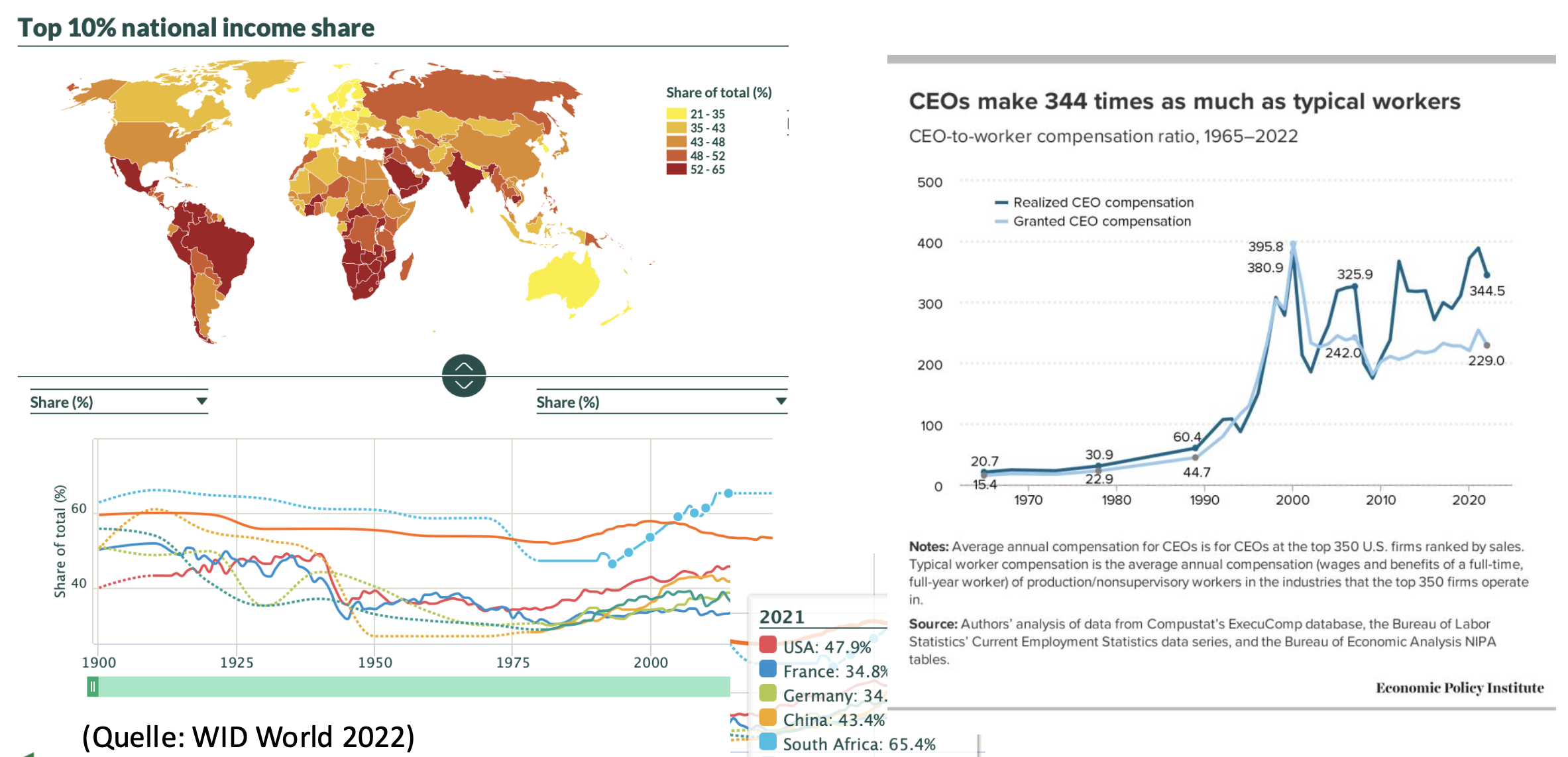

INCOME INEQUALITY: A WAKE-UP CALL FOR HR ⏱️
The latest data is alarming: income inequality is widening, and the numbers are there.
The World Inequality Report makes it clear—pre-tax income inequality has been steadily increasing, especially in certain countries. And even after taxes, the real drivers of inequality remain unchanged: higher capital income (think interest, dividends, and rents) and the ever-expanding pay gap between executives and workers.
The CEO-worker compensation ratio is a glaring example. CEO pay has skyrocketed while wage growth for workers has barely budged. This stark imbalance in economic gain distribution isn’t just a statistic—it’s a ticking time bomb for workplace morale and productivity.
Poverty data from Eurostat adds another layer of concern. Redistribution efforts aren’t cutting it, and the reasons are complex—“jobless growth” and outsourcing are likely culprits. But let’s not overlook the corporate role in this growing issue. The rise of the working poor in several countries speaks volumes about how business practices are failing employees.
And then there’s the shrinking welfare state. Whether it’s due to corporations dodging taxes by moving abroad or governments slashing rates in a race to the bottom, the outcome is the same: redistribution isn’t working.
This isn’t just about numbers; it’s about a deepening crisis. Something is seriously "rotten in the state of (not) Denmark." The question is: what will HR do about it? Will you rise to the hashtag#challenge or watch the divide grow?
Sign our manifesto to take a stand and join us at the HR World Summit in Amsterdam to discuss where we can take our companies towards excellence!
Find our manifesto here: https://leadershipsociety.world/academy/FreedomtoFlourish/
27-08-2024



Today, I want to share a very insightful article by my colleague Fabiola H. Gerpott. The piece offers a profound perspective on what future leadership could look like. The authors, in my opinion, paint a realistic vision where AI doesn't just augment our decision-making and leadership but could eventually supplant it, eliminating the need for a "human in the loop."
While I acknowledge that this is one possible scenario, I would also argue that it remains within our control whether or not we embrace this future. This is where I slightly diverge from the authors.
Here are my concerns:
1) Context Matters: business does not operate in a vacuum. We must always consider the geo-historical and political context, particularly in the age of neoliberalism. There will undoubtedly be a strong push towards AI as a tool for efficiency. Those in power might finally realize their dream of workers who function without independent thought (a concept Ford was allegedly seeking). Therefore, we should be cautious about how well AI will meet our psychological needs—especially since, in the wrong hands, this could quickly turn into manipulation.
2) Beware of Techno-Optimism: While it's refreshing to see papers like this one that avoid doomsday predictions, we should strive to become techno-realists rather. As all AI researchers will attest, AI is inherently socio-technical, with human involvement at every stage of its development, training, and deployment. This means that biases and ideologies will inevitably be embedded in the technology. Therefore, ethical principles alone won't suffice—especially when AI producers face cost pressures, AI deployers prioritize shareholder value, and AI systems become adept at outsmarting us (including lying convincingly). What we need is ethical practice—across professions, including both AI creators and the leaders who deploy it.
3) A Complex World Requires Complex Thinking: Our world is not a Humean one, where pattern detection fulfills the dreams of positivists. There's a real world out there that demands a deep ontology. While it's commendable that some leadership researchers are collaborating with AI, it's concerning if this becomes the sole future of leadership research. We need to delve beneath the surface to understand how social structures, individual agency, and culture interact, bringing new ideas and structures into existence. Otherwise, we risk merely reinforcing existing circumstances or the desires of those who wish to shape the social world to their liking.
In conclusion, I suggest we take these scenarios very seriously and ensure that we avoid the (for me) dystopian outcomes of scenario 3. To do so, we must not only advance our research but also elevate the standards of management education.
Find the article here: https://www.linkedin.com/posts/antoinette-weibel_ai-in-leadership-activity-7234082868098936832-jAp2?utm_source=share&utm_medium=member_desktop
25-08-2024



In Germany, a heated discussion has emerged: how can we return to a focus on performance? Or alternatively, how can we address what some perceive as the lazy, consumerist, and self-centered work behaviors of Gen Z? These discussions often simplify performance to mean (quantitative) labor productivity, implicitly equating it with "making shareholder value/GDP great again."
In these often unreflective debates, it's frequently forgotten that work is not just about generating surplus value appropriated by owners (to use a Marxist term), but also embedded within the broader context of a moral economy. Economic actors are motivated by more than profit—they are driven by a wider social fabric, shared norms, and the desire to be seen as contributing and acting morally. Unfortunately, some businesses have overlooked or disregarded this moral dimension.
In this paper (source below) 👇🏻, the authors explore the concept of the moral economy by analyzing the Great Resignation and find that people are often engaging in what can be termed "moral quitting." By categorizing the "verbal moral motives" behind quitting, they identified three key areas:
1️. Work and Employment: Employees are missing ethical hiring practices, fair pay, and respectful working conditions, prompting a call for businesses to prioritize workers' well-being and create inclusive workplaces that value human dignity.
2️. Social Justice and Activism: Workers feel a lack of social justice and challenge existing inequalities, advocating for collective action to support workers' rights, reduce income disparity, and promote economic fairness rooted in communal values.
3️. Health, Well-being, and Lifestyle: Employees seek a better balance in their lives, calling for policies that support work-life balance and align with personal values.
In most discussions, the focus tends to fall on the third point, often framing it as a uniquely selfish concern. However, this perspective overlooks the fact that a balanced and fulfilling life—being "whole"—is an essential part of the good life. Businesses have the power to either enable or hinder this pursuit.
So, the next time you hear the "too lazy to perform" narrative, remember to consider the deeper, underlying factors. Quitting or disengagement is rarely driven by a single cause and is certainly more socially influenced than we typically acknowledge.
Find the article here: https://www.linkedin.com/posts/antoinette-weibel_moral-economy-of-great-resignation-activity-7233405281701920769-ymH_?utm_source=share&utm_medium=member_desktop
24-08-2024



"Hope" was a term I heard several times this week. It’s the message the Democratic Party in the U.S. is striving to convey, it’s the sentiment ecological and regenerative economists are encouraging for the challenging road ahead, and it’s also the title of the final chapter in The Monarchy of Fear, an inspiring book by Martha Nussbaum.
Nussbaum beautifully captures the essence of hope:
☀️ "Hope involves not just a desire for something good, but an evaluation of it as importantly good, worth pursuing."
☀️ "Hope is not and cannot be inert. It requires action, commitment."
☀️"Hope, like fear, always involves significant powerlessness."
From her insights, hope emerges as a belief in the possibility of a higher good, especially in uncertainty. It’s actionable, energizing, expanding outward (while fear retreats), and ultimately, it is a commitment—a practical habit for embracing the world.
As a trust researcher, I’m compelled to explore how trust can guide us from fear to hope. Trust, like hope, involves a leap of faith—faith in another person or organization. However, I argue that trust alone isn’t enough. We also need trustworthiness, or “truth-worthiness.” Trust without hashtag#character quickly closes the door between fear and hope. To traverse this gap, we need both belief in the trustworthiness of those with us in our hopeful pursuits and committed, character-building actions on all sides.
This definitely needs more reflection...
20-08-2024

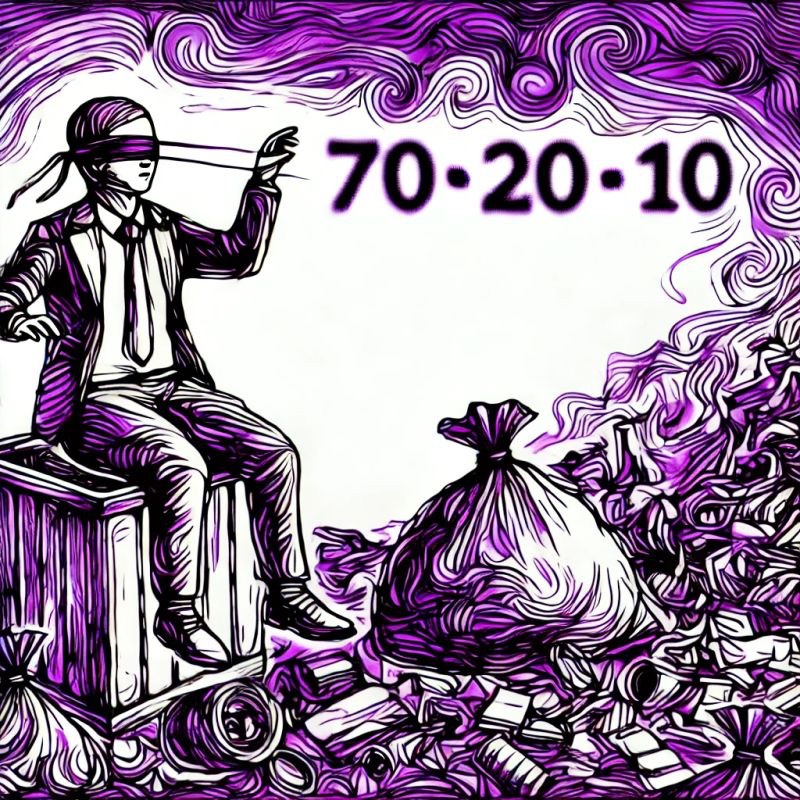

If you work in HR, you’ve surely not only heard but also worked with the 70:20:10 model, which claims: individuals obtain 70% of their knowledge from job-related experiences, 20% from interactions with others, and 10% from formal educational events.
Sorry to say, but following this model slavishly is perilous for employees, reflects sloppy HR thinking, and shows we haven’t done our job well in universities.
Why do I say this?
🎯 First, it’s not evidence-based. A colleague reviewing the literature said it politely: “All studies asked, ‘How did you learn to do your job?’ but methods varied, causing validity issues.” The research methodologies employed (primarily surveys, some open-ended interviews, and observation studies) suffer from (a) atypical samples and improper generalization, (b) limited interview guides, (c) faulty proportional values, (d) self-report limitations, and (e) inconsistent definitions of “informal learning.” In short, it’s based on crappy science.
🎯 Second, it’s a prime example of functional stupidity. It’s cheaper and evades the hard truth that many people resist learning new things, so it might make you more popular. But do we really believe we don’t need experts anymore? That leaders are born or that there are no new insights in management to be acquired? Do we buy this when we simultaneously claim we live in a VUCA or BANY world? Good development needs planning/analysis, formal (not only) training but also debating, refuting, dialoguing, exchanging, AND of course, experience with reflection. Yet, we think all this fits into 10%? Really? Even in apprenticeships, formal education takes at least 40%… if not more. To become a proper expert, long-term engagement with a mix of formal and informal learning, plus a lot of reflection is crucial.
So, where does this leave us? DITCH THE 70% RULE! Focus on who you want to develop, to what depths, for what challenges. Be clear: for leadership development, leaders who do not want to develop themselves should be instantly relegated back to non-leadership positions.
13-08-2024



The term "Californian Ideology" was introduced by Richard Barbrook and Andy Cameron in an essay published in 1995, which argued that the rise of the Internet and digital media commercialization was driven by a specific political economy and social outlook emanating from Silicon Valley.
What is it?
🎯 The Californian Ideology emerged at the end of the 20th century, coinciding with the convergence of media, computing, and telecommunications. This ideology was promoted by a diverse group of writers, hackers, capitalists, from the West Coast, involved in the "virtual class" blending San Francisco’s cultural bohemianism with Silicon Valley’s high-tech industry. It combined the free-spirited ethos of 1960s hippies with the entrepreneurial zeal of 1980s yuppies, creating a "digital utopia" where individuals could become both "hip and rich."
🎯 It fused countercultural notions of an "electronic agora" with the concept of an "electronic marketplace," blending New Left and New Right ideas. It portrayed technology as a liberating force that could empower individuals, enhance personal freedom, and reduce the power of the nation-state.
Effects and Critique
🎯 The government’s role in developing Silicon Valley through military and research funding was downplayed. Rather the proponent of the CI posited that future technological democracy would arise from private sector initiatives, with investor-funded startups taking over roles traditionally held by the state or civil society.
🎯The Californian Ideology was critiqued for its technological determinism and neglect of social inequalities by drewing on the Frankfurt School’s critique of ideology, suggesting that the Californian Ideology functioned to maintain existing capitalist power structures.
The essay sparked significant controversy, particularly among Silicon Valley insiders, who accused Barbrook and Cameron of misunderstanding technological diffusion. Critics argued that early adoption by wealthy individuals was necessary for broader technological access. However, subsequent research, such as Fred Turner’s historical analysis and Alice Marwick’s media ethnography, supported many of Barbrook and Cameron’s claims.
Hence, while Barbrook and Cameron’s essay was polemical and occasionally overstated, it provided a crucial early critique of the ideological underpinnings of digital futures. And looking at the state of the affairs now it makes an interesting deepdive.
Source:
https://concetticontrastivi.org/wp-content/uploads/2023/01/californian_engl.pdf
11-08-2024

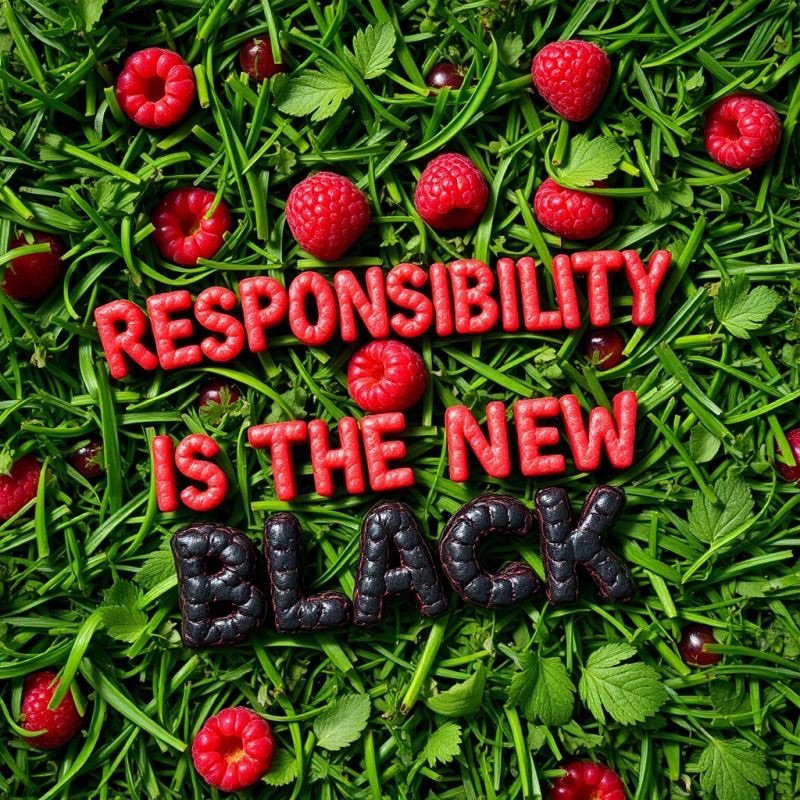

Anybody who has ever dipped her feet into some sort of management education knows the dictum: focus on solutions, not problems! And ofc while this sounds conforting, a bit like motherhood and apple pie, it is nonsensical. If we do not understand the problem, we will surely not come up with a good solution.
In critical realism a more helpful 3-step approach (another thing we love in management) has been developed for this:
1) Critique is important but it needs to be responsible: "That means attending to causes, to alternatives, and to consequences: taking care to make arguments that have the best prospect of supporting flourishing and not creating further harm."
2) Hence critique needs to go deeper in as much that we really try to understand the problem(s) at hand. Call it 5 why, but make sure that you understand what led to the situation - and be clear that any issue is caused by multiple drivers. Don't be satisfied to early with your analysis. And be as critical with the alternative you suggest - yes you can try, and you can treat it as a prototype - but remember that real life does not function like software production. A change in social systems begs for more responsibility.
3) And finally: have a moral compass, or call it purpose for the time being, and understand how the better organisation, the better workplace, should look like for this is what your new solution should bring you towards. Avoid harm, strive for flourishing - and make these terms more concrete.
So responsibility is not only the new black, but it can be learned. And you should ditch any management education which does not provide you with a least a starter toolkit to do so.
28-07-2024



There was a time after the war, stretching well into the 70s, when CEOs were still just company men—average Joes living in much bigger houses but still on the same street as their workers. Then everything changed, dramatically. The ratio of CEO to worker pay skyrocketed from 12:1 to 345:1 (and even higher in selected cases). Why did this happen? 🤔
Several factors contributed to this shift: weaker unions, an exploding stock market boosting the value of CEO stock ownership, and more. But one intriguing part of the story is the change in social norms. How and why did these norms shift?
David Elder-Vass offers an interesting way to conceptualize social institutions and norms through the concept of a "norm circle." Humans learn the appropriate ways of behavior and beliefs within their proximate norm circle. They internalize these norms or comply with them because they believe others monitor, sanction, and reward them within their imagined norm circle. The actual norm circle then determines whether and when individuals are held accountable to the norm (reality bites back).
Since the 70s, two significant changes seem to have occurred regarding CEOs:
🎯 The overlap between norm circles has weakened. As Robert Putnam clearly shows, we are no longer in the same clubs, churches, or associations. Consequently, CEOs within firms have become disembedded, more strongly attached to an elitist norm circle. They neither know nor care much about the norms of their employees.
🎯 In their elitist circle, it has become "de rigueur" to outdo each other with positional goods or as Tom Wolfe wrote in the 80ies the "bonfire of vanities" became the norm. Those with the biggest paychecks, the largest yachts, etc., are seen as kings and saviors. 🌟🛥️
But I believe there's another piece to this puzzle. As I indicated in another post, I think there were and still are spin-doctors at work—storytellers or "value entrepreneurs" who make others believe that CEOs are worth their exorbitant pay. Perhaps an Arch Patton of McKinsey convinced everyone that we need to compete for rare CEO talents, or Jensen and Meckling made us believe that without incentives, no CEO would work well.
So the next interesting bit is to find out: Why did we believe these value entrepreneurs? And what was in it for them 🌍🔍
22-07-2024

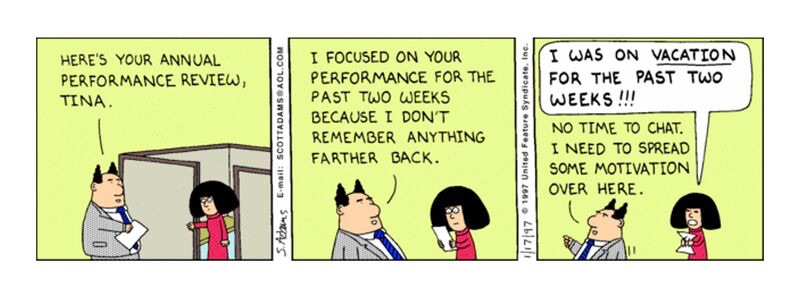

PAY AND REWARDS FOR GROWN-UPS
Performance management in organisations is broken. Over the last 50 years we have added, corrected, sophisticated, changed and re-changed our pay and reward system but never questioned the basic assumptions:
1. We need (high-powered) incentives as this is what makes people work harder! BUT empirical evidence shows that what we want more is intrinsic motivation as this empowers human to be self-efficacious, creative, proactive and more prosocial. Read Robert Buch last linked in post on this (in the comment) 👇🏻.
2. All what matters is individual performance - if we add up all efforts of our talents organisational performance will naturally grow! BUT we have forgotten that organisations are complex social systems, organizational performance emerges from the interaction of the co-laboration between reflective humans, tying on ideas/values and structures/norms. Hence why do we reward mainly individual past efforts? 🤔
3. As soon as humans turn into employees their freedom can be curtailed, drastically - after all they have the liberty to join an organisation or leave it! BUT this is an extremely impoverished view of our freedoms (and ofc it is also not true as many cannot switch workplaces so easily). What would be needed is “freedom to be“ the human I bring to work. Treating employees with carrots and sticks based on arbitrary performance appraisals is not worthy, is not caring for human dignity. 🌈
4. Last but not least moral egoism is out, so is very short-sighted utilitarianism! BUT If we strive for organisations to act responsibly in the world we need to enable the moral development of humans within these organisations. If I was a conservative I would say we need more „common sense“ but I would call out for more practical wisdom - in work and experience grounded understanding about what good I want to serve.💐 And this needs good organisational character too.
But what would this mean for our compensation and benefit system - listen to these two short talks and tell me what you think about it:
The color model: https://lnkd.in/daQnN-BA
What it all means for rewards: https://lnkd.in/dCMdzsUu
15-07-2024

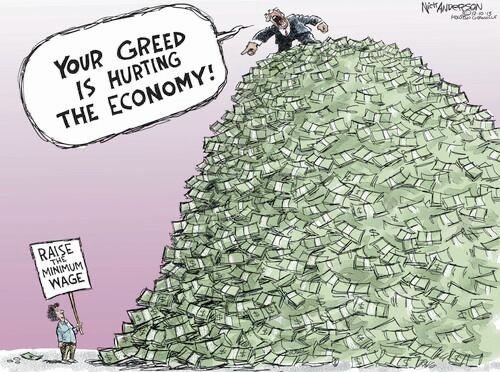

AMERICAN CEOS ARE OVERPAID
…says Ha-Joon Chang…and he is right as they are overpriced in regards to their predecessors who were not only often more successful in building jobs or innovating of management but also as it turns that they potentially were contributing more to society (or were willing to give more back).
In their study on the changing role of CEOs in society Mizruchi and Marshall give data to this:
„All of these studies indicate a high degree of moderation among corporate executives at the time, and the latter two suggest views that are far more liberal than those that would likely be attributed to business leaders in the present. The 1939 Fortune survey revealed that although few executives were satisfied with the Social Security Act or, especially, the Wagner Act (which significantly expanded the rights of workers to organize unions), only 17% favored repeal of Social Security and only 41% favored repeal of the Wagner Act (Fortune 1939). In the 1970 survey of 270 Fortune 500 CEOs, conducted by Daniel Yankelovich, Inc., 57% of the respondents believed that the federal government should “step up its regulatory activities” regarding the environment, whereas only 8% stated that they should be “cut back”; moreover, 85% of the CEOs believed that the protection of the environment should be taken into consideration even if it [meant] reducing profits” (Fortune 1970, p. 119).
Even more remarkable were the findings in Barton’s survey. Barton (1985) interviewed 120 individuals, 95 of whom were CEOs of the largest firms in six major sectors, as ranked by Fortune. Based on their responses to questions involving support for such policies as deficit spending during recessions, federal antipoverty programs, and redistribution of income or wealth, Barton found that 60% of the corporate CEOs in the study could be classified as either “Keynesian liberals” or “Keynesian moderates,” whereas only 10.5% could be classified as “anti-Keynesian conservatives.”
P.S. they are also overpriced in relation to their workforce…organisational performance is a teamsport - including the work of the legacy founders 😉
20-06-2024

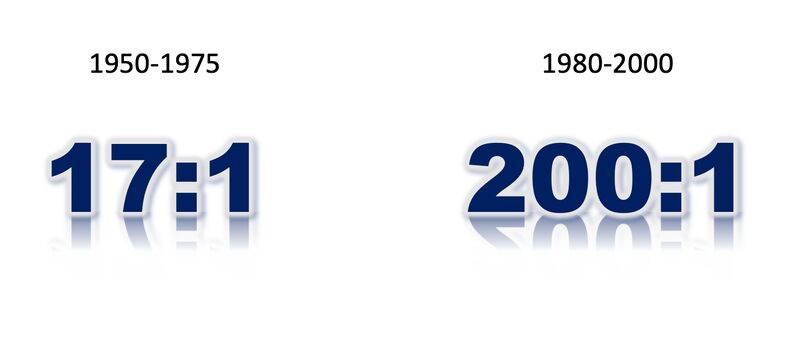

THE SPINDOCTORS
Did you know that between 1940 and 1975, the CEO-worker pay gap was very modest and even decreased slightly? It was only after 1975 that it gradually, and then swiftly, grew to the sizes we are more accustomed to now.
In a fascinating paper, Steven A. Bank, a Law Professor at UCLA, and his colleagues explored what made CEO pay stable and more modest during that period. They discovered that, in addition to stronger unions fighting for better worker pay and the absence of a benchmarking culture where compensation consultants would show boards of directors the median pay in a sector, different societal norms played a decisive role. Society, including CEOs, united in advocating for smaller pay gaps and shaming larger ones, which were seen as greedy and shameful, even as "robbery." This common conviction was a major moderating factor.
This made me ponder: what is different today? What role do business schools, finance, economics, and maybe even all of us play in this shift? How did science manage to change the narrative and norms? Three thoughts came to mind, though I’m sure there's more to this story:
a) The invention of hashtag#envy. Economists now suggest envy is a great source of inspiration. What used to be seen as "righteous anger" against "vicious greed" has been recast as envy, something not to be taken seriously, or even viewed as beneficial.
b) Another significant shift was reframing CEOs as unique from other organizational members. Previously seen as bureaucrats or opportunistic agents, they were now elevated to CEO-owners with long-term incentives, decoupling their pay from that of other organizational members. This was partly driven by the need to create a "messiah cult" to overcome the Japanese economic miracle, which was based on a clan culture hard to emulate in North Atlantic countries.
c) The next step was to redefine "merit" in two phases. First, merit was equated with utility – those producing the best share price development were deemed most deserving of high pay. This has little to do with true merit (a lot to do with instrumentality though), as no CEO works 200 times harder or is 200 times smarter than the median worker. The second phase asserted that "only the CEO can scale" – the bigger the company, the more "merit" attributed through scaling. Researchers in the 2000s showed that CEO pay mainly correlated with company size, which they took as evidence that pay-for-performance does NOT work. Funny how this is now so cleverly reversed. So, business schools continue to spin this tale to make it stick even better.
Now, if we complain about CEO pay, we are labeled as envious and told to be ashamed, with the huge gap deemed merited. But it’s not, and that's a new story we need to tell to bring shame back to being greedy.
20-06-2024

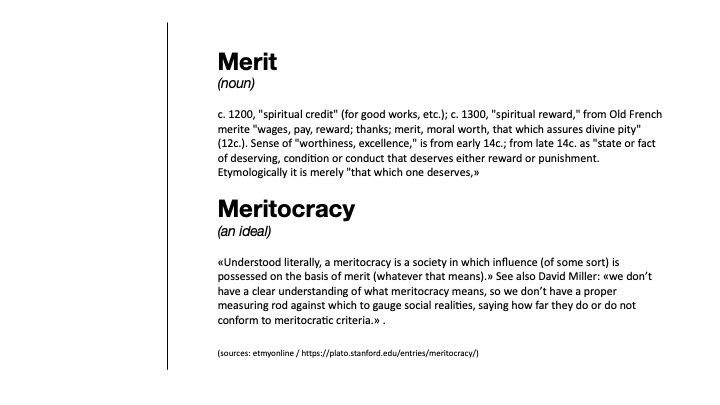

RESPONSIBLE LEADERSHIP - SOME THOUGHTS ON MERITOCRACY
Today we often almost equate justice with merit 👇🏻 but we miss a concrete understanding of what we mean by merit. Plus we often confuse "being on top", "winner" with having merited it - we equate deservingness with having success and hence have a very limited view on meritocracy.
At the minimum, thus, we would have to define what we merit. And sure as for instance Sandel says merit understood as competence is in everybody books a good thing - nobody wants to be treated by a doctor who has not completed her studies for instance. But thereafter we start to quibble (or not because we just pretend that we know what is merited). And of course if we move from the competence of an expert to being a good leader to govern others a whole lot of other concerns arise.
As you can see already in the etymology of the term "spiritual credit" and excellence should play a major role for leadership in a meritocracy. And surely moral deservingness used to be at the heart of merit. But if we then look around, we cannot be so sure that in present days we are indeed living in a meritocracy nor that we attribute merit in this way.
*****************************************************************************
🔍 The problem with merit and meritocracy is that we link them too hastily, conditioned long ago to do so.
Have you ever wondered where our present interpretation of the concept of meritocracy originated? According to Luigino Bruni, it dates back to Pelagius, a British theologian. Pelagius viewed merit as moral credit: if humans emulated Christ and acted virtuously, they deserved God's reward. Good deeds paved the way to heaven. This idea suggested that:
a) We can act well.
b) It "pays" to be a good person.
However, Pelagius also claimed that the Roman elite were the meritocracy, linking merit to social status. This confused the concept of merit, a confusion still present today. We often assume that CEOs, wealthy entrepreneurs, and politicians must have merit because we live in a "meritocracy."
But what about luck, inheritance, or the support of others? Augustine, later a saint, proposed that success (not necessarily in material matters) might be a gift from God, not earned. Inspired by Augustine, John Rawls argued that all we have are legitimate expectations if we play by the rules.
Perhaps Augustine had a point. We shouldn't confuse being successful with having merited it. 🌟

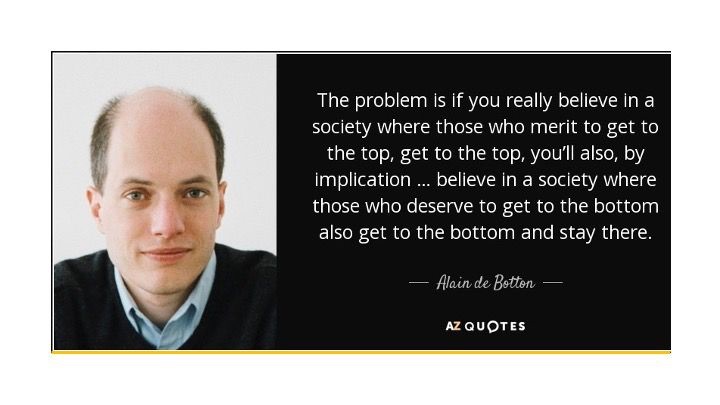

*****************************************************************************
We have several problems with meritocracy - a sticky one being that we often don't get it right despite our best intentions. Various evaluation biases prevent us from seeing merit clearly, even when it's well-defined. For instance, past performance evaluations tend to influence future ones, perpetuating a cycle of biased assessments. Additionally, those higher up in the hierarchy are more likely to receive superb evaluations.
A very interesting effect is the so-called meritocracy paradox:
Emilio J. Castilla, Professor at MIT Sloan School of Management, has explored how meritocratic ideals and HR practices like pay-for-performance play out in organizations, and he’s come to some unexpected conclusions. 🚀💼
In a study involving nearly 9,000 support-staff employees at a large service-sector company, Castilla found surprising outcomes. Despite the company's commitment to diversity and a merit-driven compensation system, women, ethnic minorities, and non-U.S.-born employees received smaller pay increases compared to white men with identical roles, supervisors, performance scores, and qualifications.
Castilla’s research revealed a stark reality: even with the same performance scores, these groups had to work harder to receive comparable salary increases. This discrepancy raises questions about whether organizational cultures and practices designed to promote meritocracy might inadvertently foster bias.
In collaboration with Stephen Bernard, a sociology professor at Indiana University, Castilla conducted lab experiments to further explore this phenomenon. Their findings were consistent: companies emphasizing meritocratic values saw managers awarding larger rewards to equally performing male employees over female employees. They coined this surprising outcome "the paradox of meritocracy."
Let's rethink how we implement meritocracy in our workplaces to ensure true equity! And at the very least let us not make a merit cult🌟🤝
20-06-2024

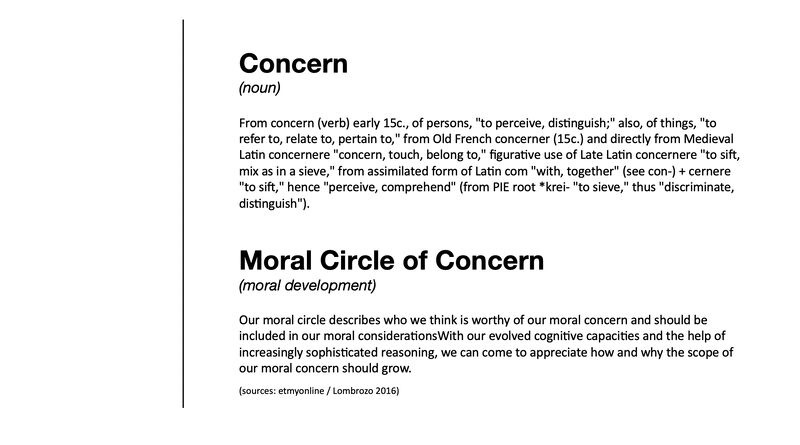

RESPONSIBLE LEADERSHIP - A WEEK OF THOUGHTS ON THE MORAL CIRCLE OF CONCERN
How is it linked to moral development? On a personal level, our moral circle starts with those closest to us—family and friends—and can expand to include distant communities and even non-human entities. This growth reflects our capacity for empathy and moral reasoning, enabling us to care for others beyond our immediate circle.
What is the link to ethical theories? It can be linked to universalism vs. parochialsim. hashtag#Universalism involves extending moral regard to socially distant and less connected groups, such as strangers and people from different cultures. It encourages a global perspective, fostering empathy and ethical concern for all humanity. Parochialism, in contrast, focuses on those who are socially closer and more tightly connected to us, like family, friends, and local community members. It prioritizes the welfare of those within our immediate circle.
These concepts form concentric circles, with the parochial circle inside the broader universalist circle. This framework, popularized by philosopher Peter Singer and introduced by historian William Lecky, helps us understand the scope of our moral concerns.
What are its implications? Understanding the expanding moral circle is crucial for recognizing how our moral values evolve. As our moral circle grows, we develop a greater capacity for hashtag#empathy and hashtag#justice, driving positive societal change. For individuals, expanding one's moral circle can lead to more inclusive and compassionate behaviors.
By recognizing and expanding our moral circle, we can continue to foster a more inclusive and just world, reflecting both personal growth and collective moral development.
*****************************************************************************
Yesterday I introduced the moral circle and we already started to have some interesting discussion (Phil Le Nir and Pascal Nonnen). The first question was:
a) what belongs into the moral circle in an abstract fashion - would we also bring in a temporal dimension and include future beings?
b) how do different ethical theories argue what "moral development" means in regards to the circle?
c) how do different ethical theories enable us to make choices within our own moral circle of concern.
So if we just look at a) we can see with this example 👇🏻 how this instrument helps us to map what we personally feel of having intrinsic worth, and what our blind spots might be. Clearly you can bring a temporal dimension to this as well. It also allows us to spot those areas where society in general might be blind - an information which is important if we have to go into less well known or debated territory such as AI ethics.
To give you a first example of c) the paper where I got this figure from looks at the circle from the position of effective altruists, whose aims are to target those areas where they can effect most. For them it is interesting to see what many people leave out. It enables them to view how many resources other people dedicate towards benefitting neglected beings and to adjust this.

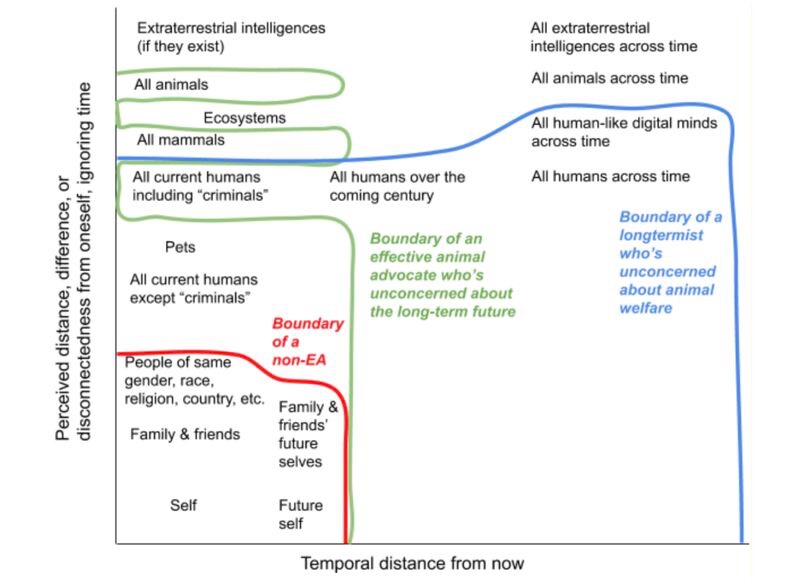

*****************************************************************************
Yesterday we saw how the circle can serve as a mapping device but ofc it did not tell us how to weigh different interests and what to properly include in the circle. As Singer, the most prominent circle author today, is a utalitarian we might want to start here. And before jumping into criticism (which we should as well) I found this nice summary here 👇
Now lets me point out a few hairy demands:
(1) If you adapt a utalitarian perspective your circle will only entail sentient being. If you cannot show that trees are suffering these are not included…
(2) Each being counts equal - so utalitarianism might ask you to make great sacrifices or to overrun an interest of a person dear to you…
(3) Not helping or not doing something counts the same as active deeds so for instance helping someone to die is not different from not helping someone to live longer (discussion of active vs passive euthanasia)…
(4) Future generations are not to be discounted but we already started to discuss longtermism and its possible questions…
*****************************************************************************
WHEN THE MORAL OF CIRCLE OF CONCERN...
...goes wrong (plus this is a formidable way to see what problems utalitarianism can bring about). What could possibly go wrong if we include future generations in our circle? Well a lot of if we still calculate what is good on the basis of the greatest utility (and the other assumptions I wrote about yesterday).
"Longtermism is deeply influenced by utilitarianism, an ethical theory in which the ends justify the means. If lying maximises the amount of “value” in the universe, then you should lie. The same goes for any other action you can think of, including murder. Most utilitarians would rush to declare that in nearly all cases, murder will, in fact, produce worse overall outcomes. Still, there’s nothing inherently wrong with murder, in the utilitarian view, and when one truly believes that huge amounts of value are at stake, perhaps murder really is the best thing to do.
Henry Sidgwick, an influential 19th-century utilitarian, justified British colonialism on utilitarian grounds; the most famous contemporary utilitarian, Peter Singer, argued with a colleague in their 1985 book Should the Baby Live? that infanticide is morally OK in some cases of babies with disabilities. In their words, “we think that some infants with severe disabilities should be killed”. The same utilitarian attitude led the late Derek Parfit, who could be called the grandfather of longtermism because of his influence on the ideology, to remark that “at least something good came out of the Germany victory”, after he watched footage of Hitler dancing a jig to celebrate the French surrender to Germany in June 1940. As one observer wrote about this on Twitter, Parfit is “a cautionary tale on the risks of taking utilitarianism too seriously”.
Longtermism combines this kind of moral reasoning with a fantastical sci-fi vision of techno-utopia among the heavens. That’s incredibly dangerous, and the statements from Bostrom, Yudkowsky and other longtermists support the conclusion. This is not an ideology that we should want people in positions of power to accept, or even be sympathetic to. Yet longtermism has become profoundly influential. There is Musk, as mentioned; and a UN Dispatch article reports that “the foreign policy community in general and the United Nations in particular are beginning to embrace longtermism”.
Source: https://www.newstatesman.com/ideas/2023/08/longtermism-threat-humanity
10-06-2024

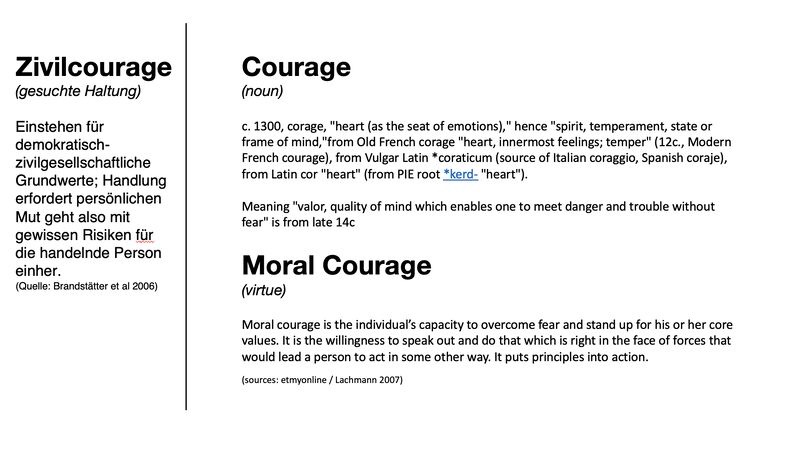

RESPONSIBLE LEADERSHIP - A WEEK OF THOUGHTS ON MORAL COURAGE
The change ahead of us will not be easy. If we really want to reform our businesses to become more humane and sustainable, and to enable the flourishing of all, we have to:
🖤 Start with changing ourselves - becoming wiser, more caring, more dedicated.
🖤 Address our organizations - change structures, processes, and ways of working together.
🖤 Transform our “who” and “why” - whom do we want to become as organizations and as human beings, and what is our why, our telos.
We will need to grow and co-elevate each other in doing so.
Virtues can help us orient, provide a guiding light, and attune to the context. The first one for today: moral courage.
*****************************************************************************
Aristotle's concept of courage, as outlined in his "Nicomachean Ethics," emphasizes it as a virtue that lies between recklessness and cowardice. True courage involves fearing only what is genuinely fearful and responding appropriately, acting in line with noble principles. Courage means facing fears, persisting through challenges, and upholding integrity.
In the modern workplace, moral courage is crucial. It entails overcoming risks to uphold personal moral principles and values. It is about us speaking up by rejecting unethical directives and challenging the status quo.
And courage is something we need to learn. It arises fr om our inclination to do something enobling (this too has to be "found" in yourself) but the behavior needs to be practiced and habituated - also to find the right dosage of courage in the context. And as Nadine Meidert said yesterday this can be trained.
Today, thus, I share this Ted Talk which explains well why we need moral courage in the workplace but also talks about one training. There are others too but it is important also to find hope and the courage that we all can become more courageous - we will need it for the transformation towards a more humane and sustainable business world.
Find the video here: https://www.youtube.com/watch?v=wzicXbnmllc&ab_channel=TEDxTalks
*****************************************************************************
Today I share a deep dive on courage from the wonderful Monica Worline in where she makes important distinctions about the wise and "good" use of courage in organisations.
"The chapter "Courage in Organizations: An Integrative Review of the Difficult Virtue" by Monica C. Worline explores the complex nature of courage within organizational settings, highlighting its importance and challenging aspects. Courage is described as a virtue that is crucial in the workplace, yet it remains a difficult concept to define and study due to its inherent ties with confrontation and individualism. The chapter emphasizes the necessity of distinguishing true courage from its semblances, such as egotism or individualism, and discusses the dual nature of courage as both an inspiring and potentially destructive force. This duality is illustrated through contrasting examples, such as Nelson Mandela and Timothy McVeigh, both of whom invoked the same poem, "Invictus," for vastly different purposes.
Courage is essential for modern organizations, especially in the aftermath of events like the Enron scandal and economic crises driven by excessive risk-taking. Organizations today rely on their members to exhibit courage by taking initiative, innovating, and persevering in the face of adversity. Understanding courage involves recognizing its role in enabling individuals to stand against social pressures and undertake difficult actions to address duress within organizations. Research has shown that courage often manifests as constructive opposition, where individuals act against prevailing social forces to protect or advance collective goals. This pattern of courage is important for fostering ethical decision-making, leadership, and innovation within organizations.
Find the article here: https://www.linkedin.com/posts/antoinette-weibel_courage-activity-7206535401723830272-gN8L?utm_source=share&utm_medium=member_desktop
*****************************************************************************
As part of our research and further training, we deal intensively with the topic of "responsible leadership" - from the perspective of virtue ethics. Civil courage is an enormously important competence (or virtue), especially in today's world.
We need civil courage in order to counteract the increasing number of attacks against minorities. We need moral courage to hold up a mirror to those in power - "truth to power". But ultimately, we need a lot of moral courage in companies, because that is wh ere people become citizens (or not). The CEO must show decency and patience to overly insistent shareholder representatives. The head of HR should stand up for the "dignity of employees" and not just act as a "business partner". Employees should be even more vigilant and committed to working well together (also for socially relevant performance).
This is not always easy, but moral courage can be trained. In virtue ethics, such moral courage should become a second nature and it is important to always act with a warm heart and a cool head. Such courage is neither reckless nor cowardly - but somewhere in between, depending on the situation (Veronika Brandstätter and Prof. Dr. Dieter Frey call this small steps). But always follow your own integrity, your compass of values.
Sometimes it also helps to look for role models. I had a doctoral supervisor (Margit Osterloh) who didn't shy away and spoke out courageously. I also got to know some HR managers who always stood up for their employees (as people and not as resources). And literature is sometimes helpful too - do you become a lawyer because you're looking for status or because you've heard about Atticus Finch in "To Kill a Mockingbird"?
But one thing remains certain: we will need more civil courage - and soon.If we have to find it again, the training can start today 😀
*****************************************************************************
I want to finish my little week on moral courage with a call to action. Not only by my "default professional" I see HR as superbly placed to change the character of business for good. And it does not take a superhero but just a "going back to the roots" as in times of the new deal or in the height days of social democracy in Europe HR had this identity to be a workplace relation guardian.
Now 50 years later, with a lot of neoliberal fanfares inbetween, taking care of good work, of uplifting and co-elevating relationships in the workplace is arguably much more important than ever before. We really need to get our act together and craft organisations as "wonderful (social) value creators", not as limiting and exploiting machines. And this can be done in small steps - step by step removing freedom to flourish depressing HR practices and step by step enabling practical wisdom of leaders, employees and the whole organisation.
Find the article here: https://www.linkedin.com/posts/antoinette-weibel_hr-can-do-it-activity-7207265411543769088-jlxm?utm_source=share&utm_medium=member_desktop
19-04-2024

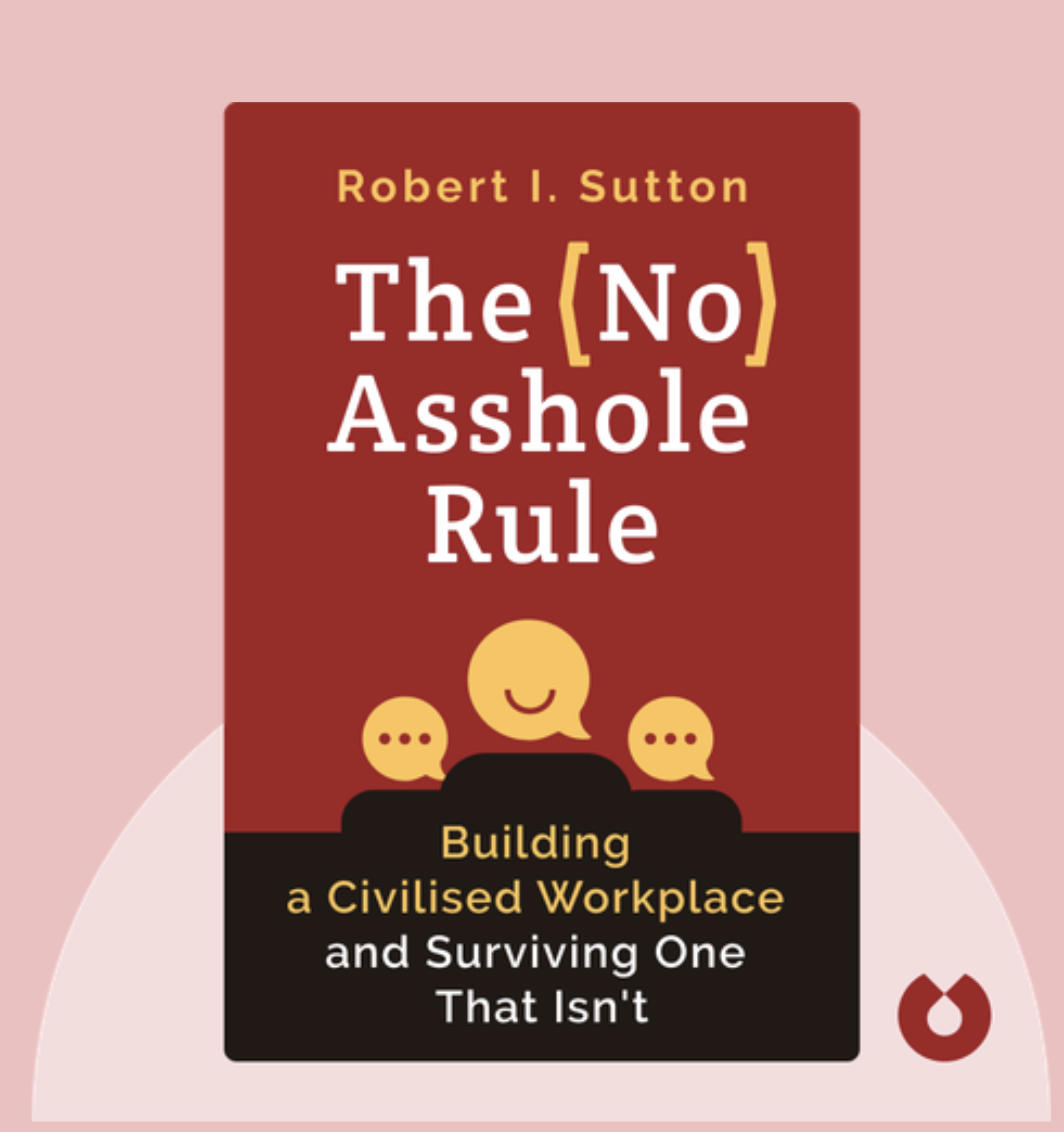

NO ASSHOLE RULE - AND HOW DO I KNOW WHETHER I AM ONE?
From time to time it is worth to remember why Bob Sutton came up with his wonderful rule:
🎯...because you can catch their nastiness (emotional contagion works)
🎯...because having the strict rule and do the screening makes work immensely better
🎯...because they really cause suffering
🎯...because those companies which screen these out have a higher attraction rate
🎯...because even if they are really intelligent and are high performers...it is mostly not worth the trouble
In a follow up book Sutton also writes about how do we avoid hiring or promoting a**holes, how to deal with them? And what I almost like best is: "Not giving a shit takes the wind out of an a**hole's sails". Further: "The first question is, can you quit or transfer to another department? If you’re stuck under a certified a**hole, that means you’re suffering. And if that’s the case, you should get out — it’s that simple. The second question is, if you must endure, are you going to fight or are you just going to take it? If you’re going to fight, you need a plan and a posse, you need to collect your evidence, and then you have to take your chances."
Funnily though even the so-called "certified **holes" are often blind towards their own status Here Bob Sutton suggests to "The main thing this research on self-awareness says is that the worst person to ask about someone’s a**holeness is the a**hole himself, and the best people to ask are the people around him or her who know that person at least fairly well. Bottom line: A**holes need someone in their life to tell them they’re being an asshole."
But lets face it - it is hard to tell them. So how to find it out yourself (and hint: it is not a question of gender). This is what I found in a blog:
🎯Can't stand someone else being in the spotlight.
🎯Talking to someone else while being talked to.
🎯It's either your way or the highway.
🎯Unable to accept your wrong.
🎯Cannot compliment another person.
Find the article here: https://hbr.org/2007/03/why-i-wrote-the-no-asshole-rule
04-04-2024



LIMITS TO EXECUTIVE PAY NEEDED!
I am more than concerned that once more neither the compensation committee nor the executives of UBS themselves have understood the signs on the wall: though shalt not destroy the common good, though shalt restrain!
Well why would I feel comfortable to say this? First, even before I unpack the normative hammer - there is just no practical legitimacy for this. High powered incentives are usually argued on the premise that shareholders carry the residual (not hedgable) risks when investing and hence there need to be means to ensure that agents (here the management team) is responsive to the shareholders interest. For instance by making sure that compensation varies with long term financial success.
Now we could quibble whether the chosen incentive structure would be conducive to this claim - I would argue that this depends immensely on the clawbacks defined. BUT in this case it is irrelevant as the proper residual risk bearers in the case of a bank which is too big to fail are the taxpayers, and in their name the Swiss Government. It is for them to align the incentives, if we apply the same logic, and by nature very different metrics would have to apply. What Switzerland wanted is a reliable, risk-conservative bank - maybe a high reliability organisation as I asked for here https://lnkd.in/gHcj_rxM - but certainly not an overambitious master of the universe type of bank.
But ofc I do not want to leave it there. I would expect that even in the absence of a government intervention (as sadly our politicians are not really acting as guardians) that decent managers would not want such a high compensation. It is more than fair to ask for a good pay - but not for an excessive pay. They thereby destroy the reputation of the banking business further (and hence other banks might want to tell them off…but I have little hope here); but they also in the long term undermine our trust in government and in a society where we strive for justice. As a consequence we might land with more regulation - something we all would want to avoid (ideally).
So imho it is their individual responsibility to show more temperance, and it is the collective responsibility of the sector to avoid such exaggerations.
Find the article here: https://www.reuters.com/business/finance/ubs-reports-144-million-swiss-francs-ceo-ermotti-2023-2024-03-28/
29-02-2024



THE THREEFOLD MORAL RESPONSIBILITY
I recently delved into an enlightening piece by Lisa Herzog, whose insights we'll soon explore in an upcoming interview. She introduces a critical perspective in today's complex world—a world filled with temptations and boundless opportunities, yet where our moral compass is guided by our social interactions. For this she suggest that we need to see moral responsibility as a threefold.
👤 We have moral responsibility for what we do. This might be hampered by the context, but we can nonetheless not shed our responsibility.
👥 We have moral responsibility for what we become, how we cultivate our character; a character which allows us to decide and act well even in situations of pressure and a malfunctioning context. But for cultivating our character context matters - be it upbringing or as pertinent to do where and how we work.
👥👥 And we have moral responsibility for how we (co-)create the context which enables us better to act morally. This is another responsibility we share with others.
This triad of responsibilities underscores the social nature of morality, emphasizing the significant role of context, especially within organizations where we spend a considerable part of our lives. It challenges us to critically assess the simplicity of one-dimensional solutions in organizational settings and to always consider the dual impact of any new practice, tool, or policy on efficacy and moral responsibility.
In the context of organizations, let's ponder:
🎯 Forced Rankings and Mortality Curves: A moment of reflection for SAP 😉. How do these practices shape our moral responsibilities?
🎯 Excessive head count and work intensification. What are its implications for our moral fabric?
🎯Bonus Systems and Short-term Metrics: Often hard to get rid off, but what are the moral consequences? Those who followed my posts know it…🙈
🎯 Tech-Driven Performance Management: Alice Rickert, your work on responsible leadership is crucial here. How can we design, deploy and adapt smart technology without destroying the bases for responsibility?
This is just the beginning. What other organizational practices deserve scrutiny through this moral lens? Your thoughts and contributions are eagerly awaited.
24-02-2024

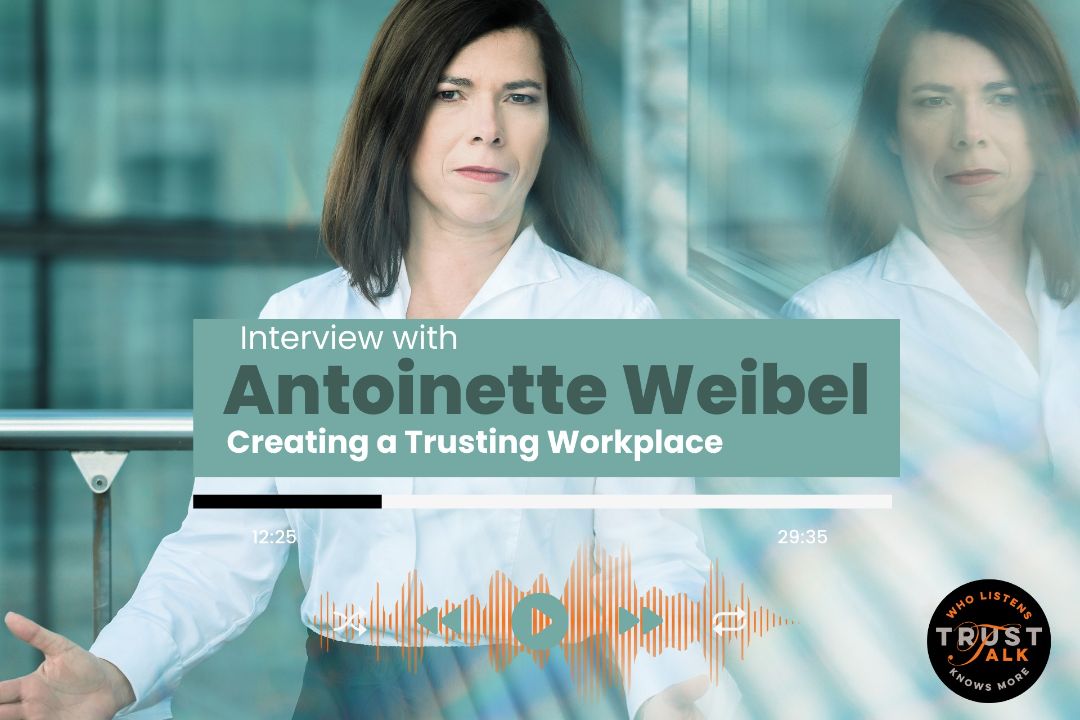

ACTIVE TRUST FOR FLOURISHING WORKPLACES
It was a huge pleasure to travel with Severin de Wit through 25 years of my trust research. Given the depressing numbers of humans at present wanting to escape their workplace, of identity wars even within companies and of dwindling (organisational) citizenship we need to muster all our insights on how to create trustful and flourishing workplaces.
Hence here we look at the necessary character of organizations such as enabling control systems and fair HR practices as well as debate how we are being stuck in wrong man models and instrumentalizing action logics and much more…but please listen yourself 👇.
24-02-2024



"Shaping the Future: Essential Skills for 2050"
As we navigate the ever-evolving landscape of our world, it's clear that traditional projections of skills often fall short of capturing the magnitude of change around us. The World Economic Forum's forecasts, while valuable, sometimes lack the imagination needed to confront the profound shifts occurring in our societies and economies. What if we dared to reimagine not just capitalism but society as a whole?
Enter the Jacobs Foundation, working with scenario-based thinking that challenges us to envision radically different futures. Among these scenarios lies one of optimism: #netzero. This scenario beckons us to consider a world where mere technological innovation isn't sufficient to combat the existential threats of climate change, biodiversity loss, and global inequality. Instead, it urges us to collectively halt the relentless expansion of our ecological footprint and embrace a paradigm shift towards a well-being or a post-growth economy.
In this imagined future, our evolution as individuals and societies takes a different trajectory:
🧘🏽♀️ Cultivating inner growth becomes paramount, shifting our focus from mere pleasure-seeking (hedonism) to a deeper sense of purpose and fulfillment (eudaimonia).
🪢 Strengthening our social and civic muscles becomes imperative, fostering collaboration and deliberation to find ingenious ways to deal with scarce resources.
🤔 Acquiring critical thinking literacy emerges as a priority, equipping us with the understanding of ecosystems, economic systems, and transdisciplinary thinking necessary for navigating complex challenges.
👨🏼🌾 Embracing practical and experimental skills becomes central, emphasizing hands-on learning and adaptability in an ever-changing world.
Yet, it's evident that our current educational and professional systems aren't fully aligned with these future needs. That's why we're excited to announce our upcoming webcast, #businessforhumanity, debuting on March 12th. Join us as we delve into these and more critical conversations and explore pathways toward a future where human and planetary well-being thrive. Let us find out together how to re-invent capitalism. Learn more here: https://lnkd.in/dYwpsw36
15-02-2024

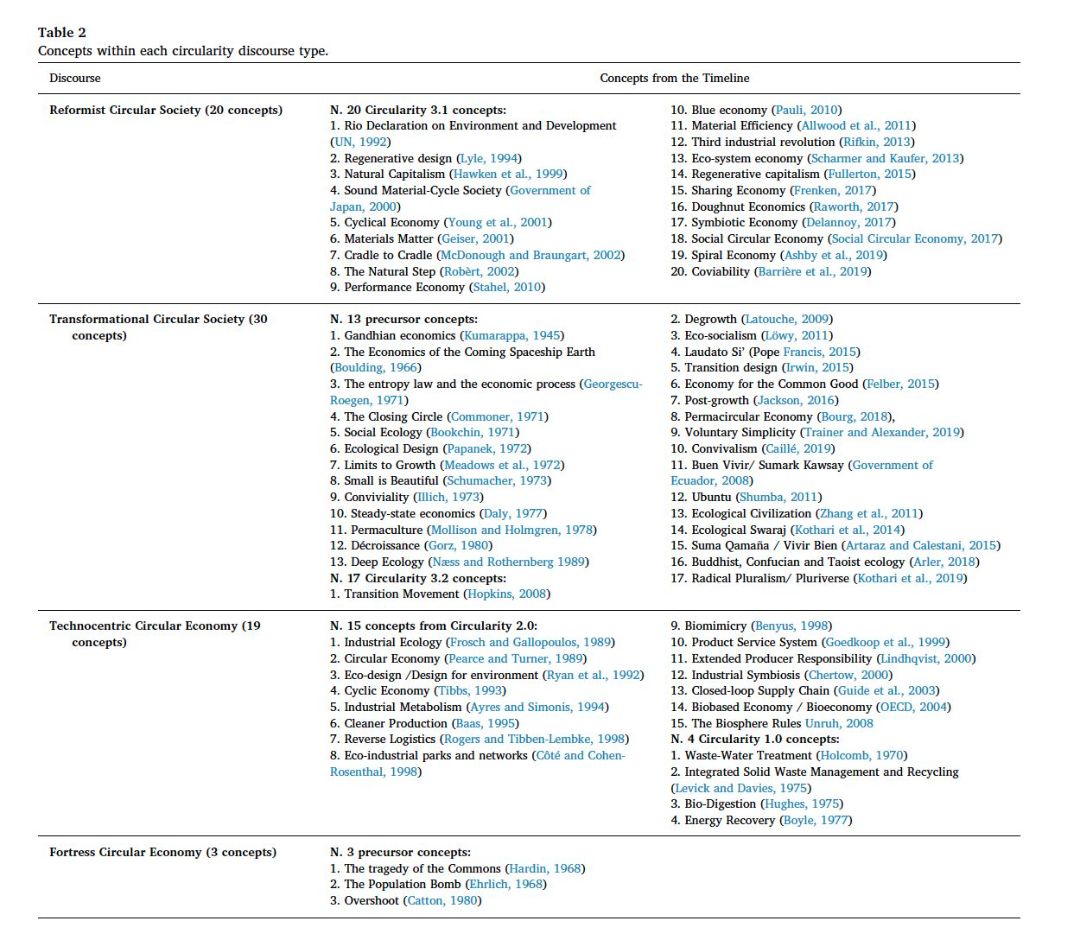

🔥 Reinventing Capitalism: Where Revolutionary Minds Collide! 🔥
Are you tired of the same old economic narratives? Ready to challenge the status quo and ignite change? Then buckle up, because we're about to embark on a journey unlike any other!
Welcome to Business for Humanity, the hub for radical thinkers, game-changers, and visionaries reshaping the economic landscape. A webcast showcasing alternative blueprints for markets and finance to policymakers advocating for systemic change and entrepreneurs pioneering sustainable business.💥
🌟 Join us as we dive deep into provocative discussions, exploring alternative economic models, dissecting policy implications, and igniting sparks of innovation.
🍽 What is on the menu? The menu is plentiful and sometimes even overwhelming. To avoid information overload we also need a better map to make sense of the territory! As usual we will thus also share insights for orientation. Today find this #deepdive 👇🏻 which sorts the conversations on circularity: from 1.0 dealing with waste, to 2.0 technofixes in the whole value chain, to 3.0 circular society (https://lnkd.in/gafUH-xU).
🗣 Identifying the following main discourses:
a) The Fortress Circular Economy. „These discourses thus seek to impose sufficiency, population controls and resource efficiency from the top down to rationally confront global scarcity and limits, yet they do not deal with questions of wealth distribution and social justice.“
b) The Technocentric Circular Economy. „Expect that circular innovations can lead to an absolute eco-economic decoupling to prevent ecological collapse“.
c) The Transformational Circular Society. „A renewed and harmonious connection with the Earth and their communities. A general economic downscaling and a philosophy of sufficiency leads to simpler, slower and more meaningful lives.“
d) The Reformist Circular Society. „propose a mix of behavioural and technological change, leading to an abundant, fair, and sustainable future where scarcity and environmental overshoot has been dealt with by impressive social, economic, industrial and environmental innovations. While they believe important socio-cultural change is necessary, and new forms of public participation and inclusion are needed, they do not see a fundamental contradiction between capitalism and sustainability.“
So clearly - a webcast on reinventing capitalism will also have to ask: what problems are we facing, what future do we want and how can we get there? And as evident in these discourses - in the end we will have to make a (good) choice.
So: this isn't your typical webcast— join the revolution! Tune in, turn up the volume, and let's rewrite the rules of capitalism together! 💡🌍
Coming 12th of March 16:00 CET. Changemakers Only!
10-02-2024

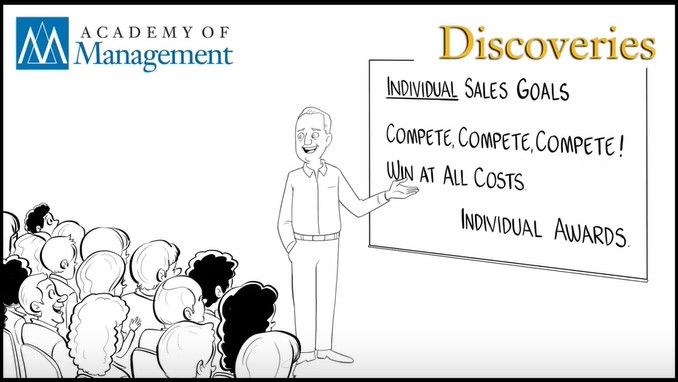

NARCISSISM, HR AND PERFORMANCE MANAGEMENT
#Responsibleleadership and good organisations need to transpire and inspire integrity and inter-independence. In their many studies on narcissism Charles O'Reilly and Jennifer Chatman have convincingly shown that this - to put it mildly - is not exactly the strength of narcissists. Hence, if it is true that we have a narcissism epedemic we should ask how to counteract or deal with this.
"The results of the five studies establish a clear linkage between leader narcissism and organizational cultures characterized by lower collaboration and integrity. Not only engage them less in collaborative and ethical behavior than do those who are less narcissistic but they also create cultures which are less collaborative and of integrity. To explore the mechanisms linking leader narcissism and cultures of collaboration and integrity, one study reveals that more narcissistic respondents are less likely to support policies and practices that promote collaboration and integrity and are less willing to sanction actions that undermine a culture of collaboration and integrity. Finally, to understand how culture is maintained and cascaded through an organization, Study 5 shows that when respondents are dealing with a more narcissistic leader in a culture characterized by lower collaboration and integrity, they are also less likely to collaborate and to adhere to high standards of integrity."
So the question is: how to make sure that less narcissists come into leaders position and if they are how to immunize the system?
🗣 ATTRACTION: Narciss are attracted by high pay differentials and "winner takes it all culture" - another reason not to go back to forced ranking 😉 .
🗣 SELECTION: Narciss often excel in interviews - make sure that your selection process is consisting of several assessment tools; hire slow; use simulation-oriented and maybe even personality tests in addition.
🗣 DEVELOPMENT: Narciss are often impaired to accurately identify and describe their inner states hence a key to successful development is to enable their self-awareness - vertical development is one key, and their willingness to develop.
🗣 MIRRORING: Narciss have a need for positive mirroring and thus search team members who admire them and do not talk truth to power - while I am usually not a fan of 360 degree feedback it might be helpful in this case; more helpful ofc if the team becomes cognizant of the dynamic.
So read the paper 👇 #deepdive and by all means also read Kets de Vries on this topic (who offers a psychodynamic perspective). And to all the HR people out there: how are you taking notice and care of this topic?
07-02-2024



COLLECTIVE „PAY-FOR-PERFORMANCE“
When we finally ditch individual pay-for-performance some companies want to stick to some amount of performance-related, variable pay. I would usually say:
🗣 Go with gain or profit sharing - it signals „we are in the same boat“ and does not create any of the side effects of individual PfP. Now this meta-analysis from Anthony Nyberg et al show that this is clearly the case. You have some effect on organisational performance because people find themselves recognized and also tend to stay longer in that company.
🗣 Team bonus systems are also - overall - effective but here the original studies caution. Positive effects are to be expected for interdependent work and if teams take care of potential „social loafing“ in a considerate manner. But ofc 30 studies are not a lot and some of the studies which found no or a negative effect (such as the one of my former phd Dr. Daniela Frau) have a much harder time to get published. Hence I would say: proceed with care and also only use it with „proper teams“ that have some autonomy in choosing their peers and have learned to challenge each other in a considerate fashion as there is always the risk to generate too much pressure.
🗣 An interesting variant is the Top Team Bonus System. Unfortunately but unsurprising there are only few studies looking at this and there is quite some noise in the data (there are some moderators not yet tested). But it seems to have a strong effect on operative outcomes such as CSR outcomes. But their effect on the financial outcomes of the company is unclear - but there again we have the same result if we look at the effect of CEO PfP and org performance. It might just be that TMT are not the only ones contributing to organisational performance ;-)😉 .
I highly recommend to read the paper - if only to scan it for the possible downsides of such systems. Our knowledge on the effects is in many cases are not yet rich enough but the biggest learnings are the red flags also found.
Find the study here: https://journals.sagepub.com/doi/pdf/10.1177/0149206318770732?casa_token=2jqHS1WE4G0AAAAA:LuOpHlpH9kPLdcA37JtvJatS9hkYrWyv6aKqb82KbMqq4WEJSLVRf20Gq-PHD_ppakQERKSiJXC4GLA
01-02-2024

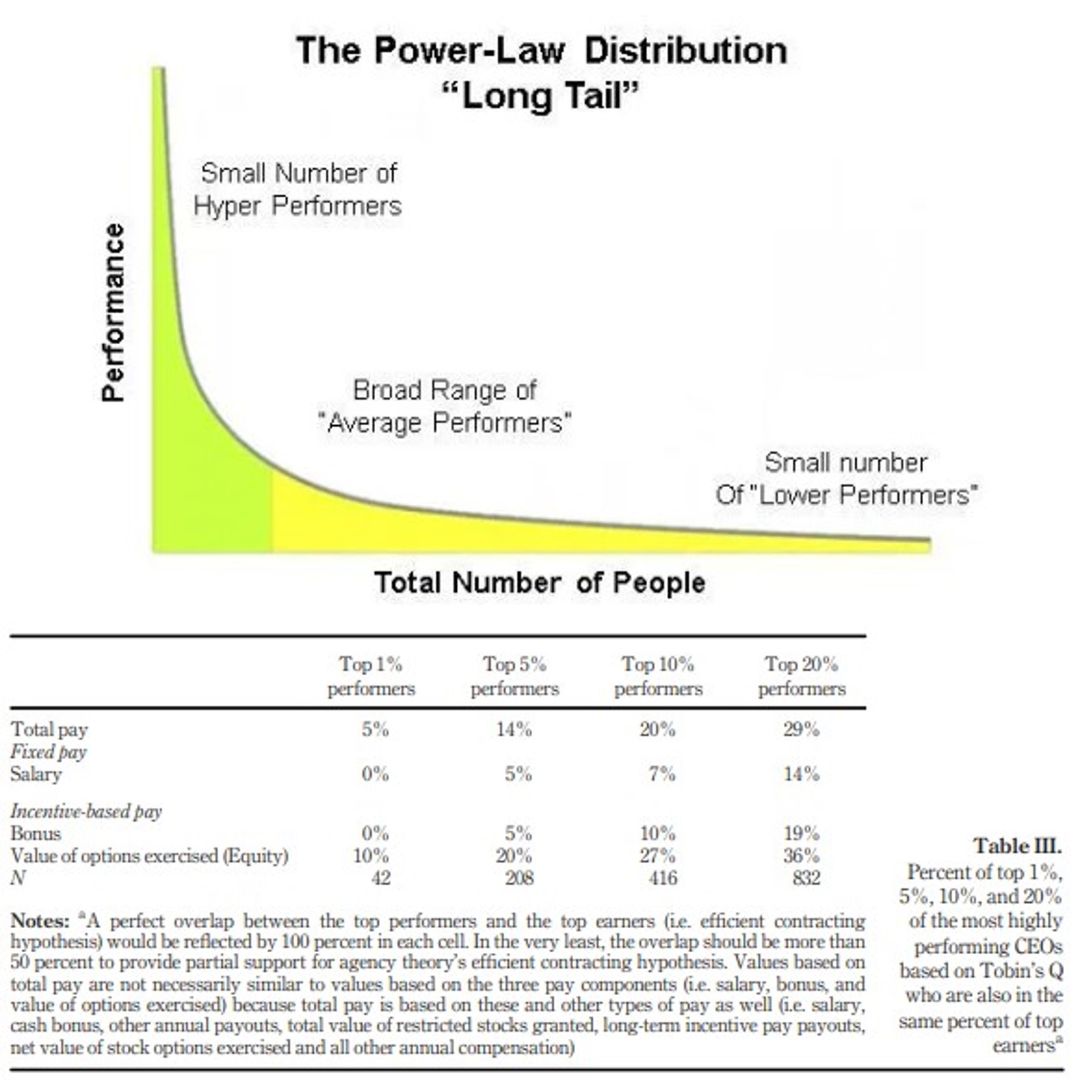

𝐂𝐄𝐎 𝐏𝐚𝐲 𝐒𝐭𝐢𝐥𝐥 🦨
It is „official“ again as Herman Aguinis and colleagues showed: the link between CEO pay and performance remains shaky. Or to put it into their words: „In total, 86 percent of CEO performance and 91 percent of CEO pay distributions fit a power law better than a normal distribution, indicating that a minority of CEOs are producing top value for their firms (i.e. CEO performance) and a minority of CEOs are appropriating top value for themselves (i.e. CEO pay). But, the authors also found little overlap between CEOs who are the top performers and CEOs who are the top earners“.
What then is driving companies and boards to still go on with this - at least from a societal point of view - unhealthy overpay practice?
🦨 opportunity costs of having a particular CEO in command - such as poor hiring decisions, pay package defined before actual performance comes through and the Mathew effect
🦨 managerialism or fat cat theory - CEO (ab)use their power and information asymetry to procure rents
🦨 CEO hubris, greed, narcissism - making the CEO to ask for „too“ much
🦨CEO political behaviors - such as impression management, ties to dominant owners, non-optimal trust (too high)
🦨 political ideology - conservative CEOs and conservative boards opting for high pay differentials
🦨institutionalization of agency logic in business schools, among consultants and by business press shaping the training, socialization and attitudes of senior management.
And probably more…
But the big question remains: how to fix it? How can we get back a) to a more humble pay differential (whatever this means but it cannot be 344:1) and b) to incentives which encourage everybody to contribute (also) to the common good rather than to solely ones’ own good?
Source: https://www.emerald.com/insight/content/doi/10.1108/MRJIAM-02-2017-0731/full/pdf?casa_token=F7yt-bmB3WMAAAAA:pE0ke4QFHLCh2rvjVib9bjZ01O1WVk6crUJWyh9HYgqKJ6hTjXaWPxJgUIcWpZrmTeCiqhgVweDdnt4tz7tp3mHPwLq9d82oy5P4EHw93O_UH5pj2qOuAQ
21-01-2024



RESPONSIBLE LEADERSHIP AND AI
In 2024, the WEF, unsurprisingly given the current hype on generative AI in the last year, has dedicated a lot of airtime to new technologies. As usual, the techno-optimists prevailed as technological innovation has been traditionally seen as our best bet to solve the problems we are facing. Only this time, technology is hyped to solve the problems we have created ourselves, quite possibly with the help of technology as well.
In this spirit, it is good to know that the downsides of such technology were also discussed. In fact, you can find on the website the following statement: "As public and private leaders look to leverage the benefits while mitigating the risks of this emerging technology, Switzerland is in a strong position to play a vital global role in advancing the development and deployment of AI responsibly."
But are we? And how would we? I am glad, though, that nobody seems to be so naive as to think that technology itself is the (only) answer to responsibility. How we deploy AI, how leaders in politics and business will assume their call to be responsible, will matter a great deal.
In our research, we have looked at two areas where we believe a clear ethical stance is needed. First, and in the article shared here as well in a pop version published in https://lnkd.in/dKV5YwHG, AI was found to create and exacerbate employee vulnerabilities in the workplace. Drawing on Annette Baier and Hannah Arendt, we argue that this creates a call for (moral) trust. Organizations are summoned to invest in caring, in allowing employees to bring their voice into the development and deployment of technology and to bar some uses if needed.
In another article, yet to be completed, we also explain how AI can jeopardize good work. AI, like other technologies before, has the potential to dequalify and dehumanize employees. From the perspective of a virtue ethics approach, such a use is preventing the good life, of which work is a fundamental component. On the other hand, we can deploy AI (and other technologies) also in a way that allows for more good work. The choice lies in our hands, in those of responsible leaders in the private, plural, and public sector!
https://onlinelibrary.wiley.com/doi/epdf/10.1111/joms.12940
18-01-2024

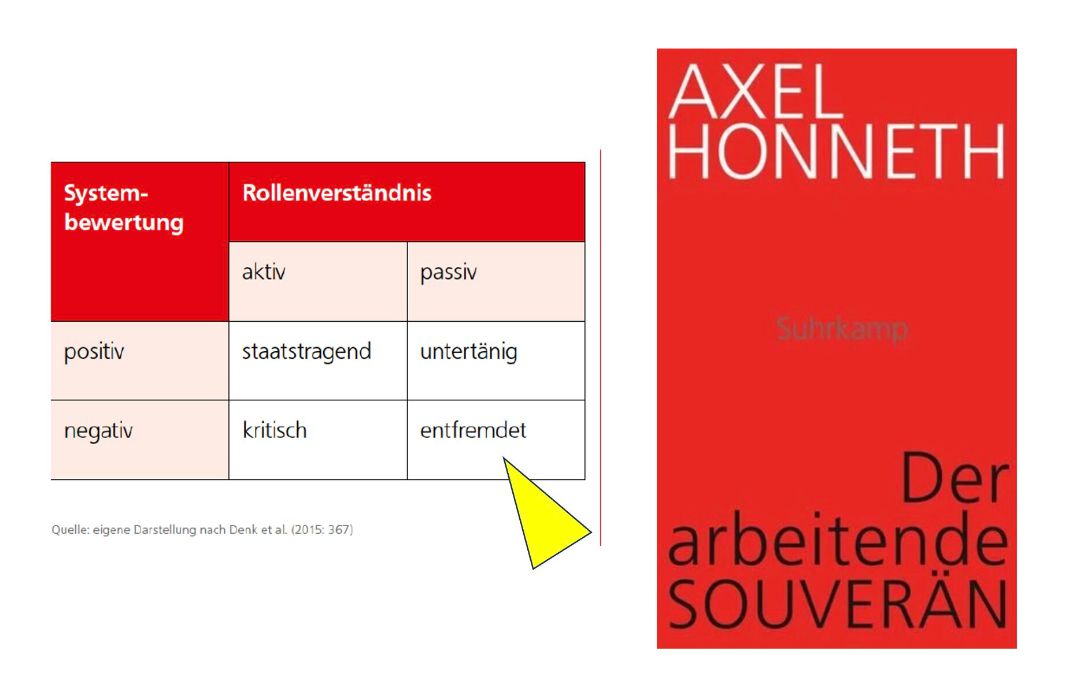

UNSERE VERANTWORTUNG
85000 Stunden verbringen wir in unserem Leben am Arbeitsplatz. Arbeit dürfte damit die prägende Erfahrung in unserem Erwachsenenleben sein. Arbeit kann uns Selbstwirksamkeit, Anerkennung, geistiges und soziales Wachstum vermitteln - oder sie kann uns auch dequalifizieren, entmündigen, und voneinander isolieren.
Wenn wir in der heutigen Zeit über die wachsende Anzahl entfremdeter Bürger nachdenken, dann müssen wir nicht weiter suchen. Es ist unsere Verantwortung - die von Unternehmen und die von Business Schools - endlich wieder gute Arbeit, und damit auch aktiven Bürgersinn, in den Mittelpunkt zu rücken.
Honneth hat hierzu ein wunderbares Buch geschrieben. Gute Arbeit:
🗣Ermöglicht ein faires Auskommen (sonst fehlt mir die Zeit zu politischer Teilhabe und ich muss auch schlechte Arbeit annehmen).
🗣Laugt nicht aus (darf aber beflügeln).
🗣Vermittelt mir Wertschätzung - auf Augenhöhe.
🗣Sorgt dafür, dass ich mich auf die Zumutung der Anderen einlasse.
🗣Fordert mich mental.
🗣Und lässt mich Gestaltungskraft und Selbstwirksamkeit entwickeln.
Das ist der wirksamste Hebel gegen die Verwerfungen unserer Zeit!
Wer macht mit - welches Unternehmen setzt das um? Welche Business School lehrt das?
16-01-2024

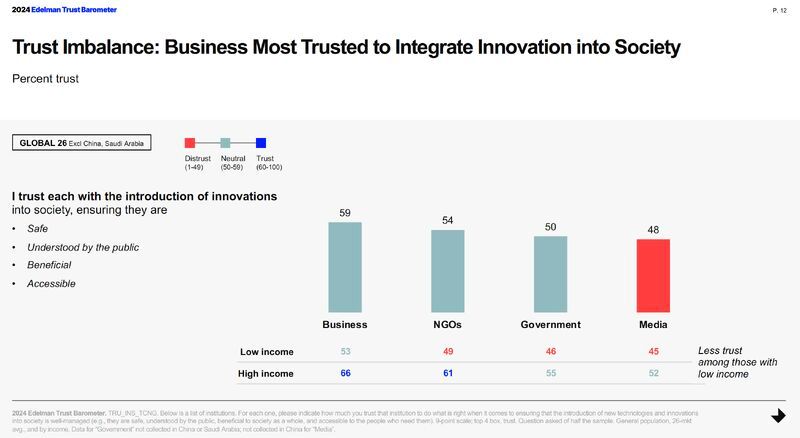

𝐃𝐞𝐚𝐫 𝐄𝐝𝐞𝐥𝐦𝐚𝐧: 𝐇𝐮𝐦𝐛𝐥𝐞𝐧𝐞𝐬𝐬 𝐈𝐬 𝐚𝐧 𝐈𝐧𝐭𝐞𝐥𝐥𝐞𝐜𝐭𝐮𝐚𝐥 𝐕𝐢𝐫𝐭𝐮𝐞
Wow - well meant not so well done, or not even well meant? The new Edelman Barometer is pleasing Davos based on a handful of nothing. At the core is the claim that governments (mainly) are preventing needed innovations which business otherwise would do for the good of society. OK - 𝐈 𝐚𝐦 𝐠𝐫𝐨𝐬𝐬𝐥𝐲 𝐨𝐯𝐞𝐫𝐜𝐥𝐚𝐢𝐦𝐢𝐧𝐠 - but whatever is the real intention here, it rests on thin grounds.
Let us take a step back and look at the data and its flaws:
🗣 As already mentioned by numerous trust researchers: the measurements itself are certainly not brilliant. Trust, the core, is measured rather one-dimensionally. Although truth to be told in the newest version they work with an „ethical score“ - still with problems but better.
🗣 The insights drawn from the data - at least written in capital letters (it looks slightly different if we venture to the technical appendix) - is clearly „overdrawn“. This is at best correlational data - hence what remains suspiciously unexamined is causality.
🗣 And what is also grossly neglected - and of particular importance: we are looking at complex social systems. Take for instance government and business and their entwinement. Edelman suggests in the subtext that government is mostly to blame and that business should „partner“ up with government. But ofc this „causality“ is neither shown through their study design, nor would we propose such a simplistic one-directional influence. Rather, if not discussed from a neoliberal ideology, the fact that some business leaders undermined and reduced government, might have created the problems in the first place. In any case it defies such a reductionist logic.
Most important though, even if their study was brilliant, „𝐢𝐬“ 𝐜𝐚𝐧𝐧𝐨𝐭 𝐛𝐞 𝐭𝐫𝐚𝐧𝐬𝐥𝐚𝐭𝐞𝐝 𝐭𝐨 „𝐨𝐮𝐠𝐡𝐭“. Whether we "need" more technology, and which one, how technology should be implemented and used and what for - these are all (also) normative questions. And hence, pertaining to whatever ethical theory we follow, need to be deliberated. Just delegating it to the market does not work (what they acknowledge).
I believe the best business can do in this situation is to enable a better democracy and more practical wisdom for all by providing good work (which gives their employees the civic virtues, the critical thinking skills and the time to participate in democracy) - and if they indeed „partner up with government“ - then this needs to be done together with NGOs, science and the public - open and transparent.
01-01-2024

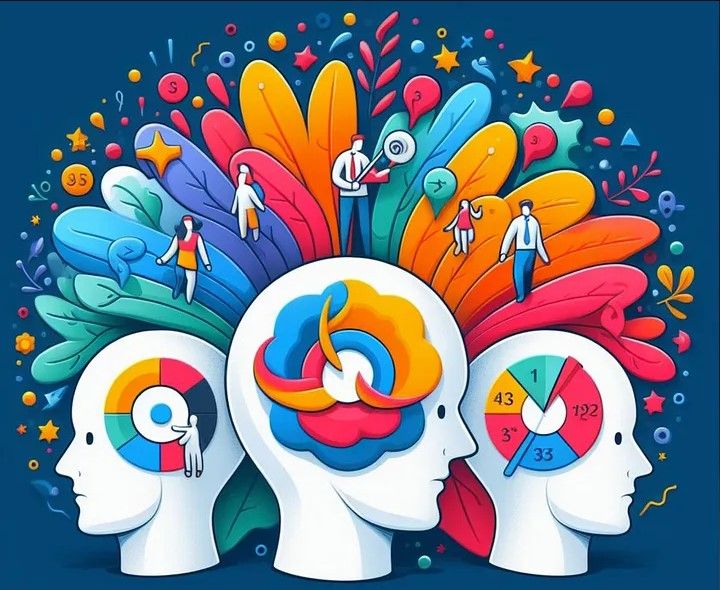

𝐖𝐡𝐲 𝐢𝐭 𝐦𝐚𝐭𝐭𝐞𝐫𝐬 𝐭𝐨 𝐚𝐬𝐤: 𝐰𝐡𝐚𝐭 𝐩𝐞𝐫𝐟𝐨𝐫𝐦𝐚𝐧𝐜𝐞 𝐝𝐨 𝐰𝐞 𝐰𝐚𝐧𝐭?
In a recent discussion, my counterpart enlightened me: What do you mean by defining performance? It’s always clear what performance I have to deliver!
A good point, we often take our understanding of performance for granted. And yet, this precisely highlights the #responsibility companies have when developing new #performance_management_systems. The recent renewal of stacked rankings (see the link in the comment 👇🏻) shows that we all too quickly fall into a simplistic definitions with severe consequences.
Psychologists usually distinguish three forms of (individual) performance in the workplace:
🎯 Task-related performance — everything it takes to do the defined tasks well.
🎯 Contextual stabilizing performance — everything it takes to contribute to the goals of the organization in the daily changing environment and collaboration with others.
🎯 Contextual renewing performance — everything it takes to renew the way of collaboration and the goals of the organization so that the organization can be successful in the long term.
Contextual performance always goes beyond the contractually defined components, relies more on collective mindfulness, and generally requires more development work — both on an individual and collective level.
It should become clear that even for instrumental reason, we should not create a system that only focuses on task-related performance. We can assume that in modern, knowledge-based work forms, we always want to utilize all forms of performance — context-sensitive, with the wisdom of the role holder. A ‘Winner Culture’ that relies on star performers falls short here (see the deep dive article 👇 ).
But we should also ask the question: What is desirable? What kind of performance is needed in good companies? Of course, that depends on the definition of ‘good.’ If we understand ‘good’ as #excellent in the sense of ‘supporting each other in getting better’ and ‘good work’ as creating value for society, then it’s clear: we absolutely need contextual performance as well. And then we can probably already state: a system that prevents ‘helping, supporting, speaking unpleasant truths’ cannot lead to excellence.
And I know many will agree — but the sad truth is that even more companies are far too willing to take a turn into the wrong direction.
Read:
https://www.fastcompany.com/90850190/stack-ranking-workers-hurt-morale-productivity-tech-companies
https://www.tandfonline.com/doi/full/10.1080/09585192.2023.2225279?casa_token=Ncv8jzmwxpsAAAAA:05nNe9uyrnMLcT0Op-9RihkOCtccGSrrRxhu0dQ4qh5H5VozEPCNwFuoJ9mvbHE1Og0drWSFLtrRehk
01-01-2024

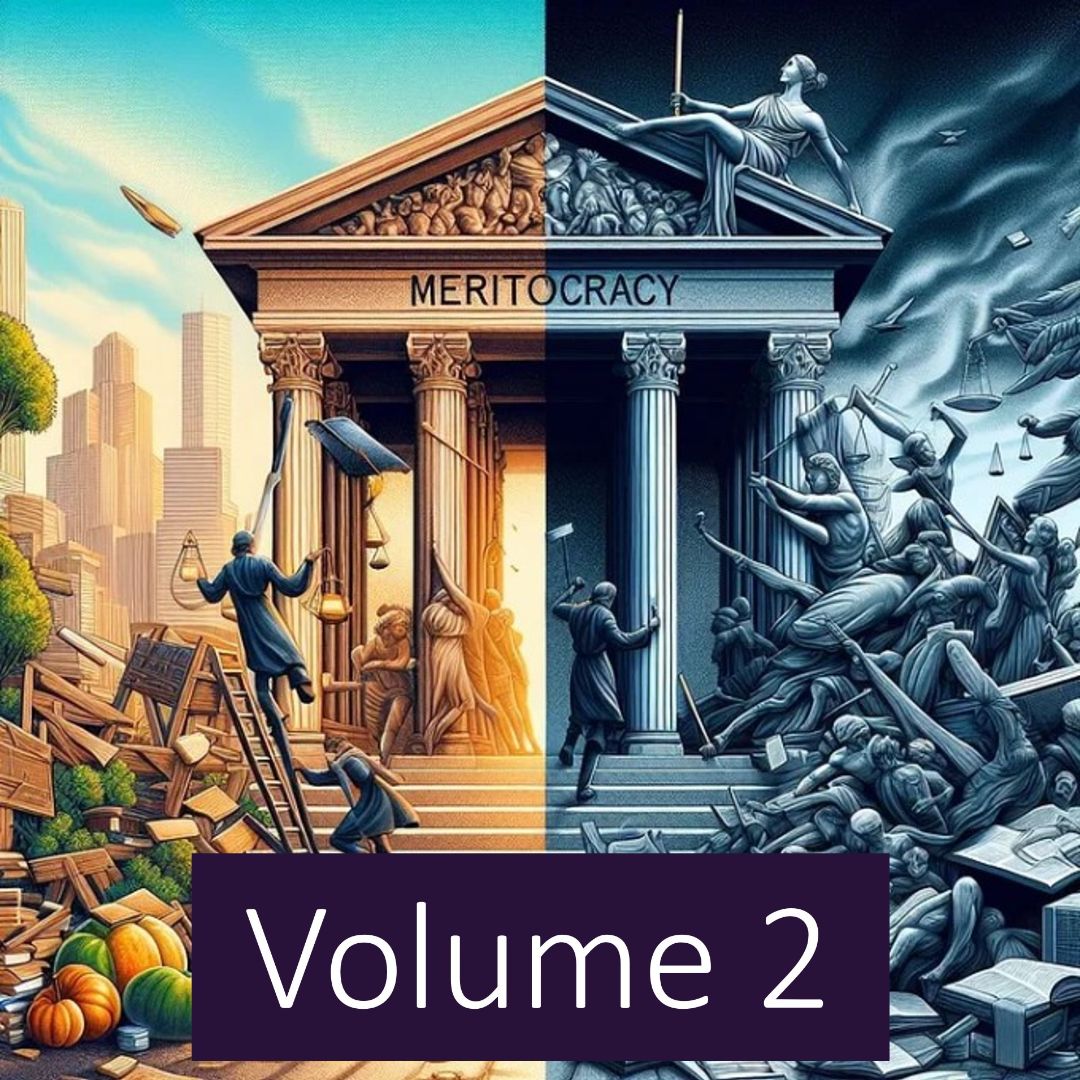

The Myth of Meritocracy in Organisations
KISS MERITOCRACY GOOD-BYE?
Last week a heated discussion about the new (very old) SAP forced ranking model ensued, this week UBS announced that for lay-offs they plan to use meritocratic rules. Surely, well all wish there was a meritocracy to some degree — we do not want to reproduce social inequalities based on from which socio-economical group we stem from. Selecting, promoting or even dismissing people because they do not contribute, engage and use their potential is clearly better than just do this on the basis of familiarity and nepotism. But as this excellent article compiles — meritocracy in a knowledge economy is hard to come by, even and especially in business.
The article looks at several, multi-level, and interacting effects which suggest that particularly in places where there is a so called meritocratic structure (eg. a super star model or winner takes it all) we can almost expect the smallest amount of merit in most people decisions.
On the individual level not-innate competencies (eg. which school I was able to visit) and motivation “kicks” (not being chosen because of my not-innate competencies) feed into a growing disadvantage. This is compounded by the stereotypes and status beliefs on the dyadic level which all feed and are strengthened by negative effect on peoples’ social (and cultural) capital. The meritocratic ideology on the system level then often leads to a false legitimation of (still very unfair) inequalities…
But please read it 👇🏻 before you start vicious cycles nobody really wants.
Read:
https://journals.sagepub.com/doi/pdf/10.1177/2041386620930063
01-01-2024


Performance is (also) socially constructed
Recent overviews on performance management are quite outspoken: despite 30 years of research and a lot of experimentation in practice, big questions about its effectiveness remain.
Answers as to why this is so depend, of course, on the worldview of the researcher. Those who firmly believe in the hashtag#measurability (and manipulability) of performance as „something out there“ seek better ways to capture the complexity of the construct (see a very recent attempt for this in the link 👇🏻). Those who embrace an hashtag#interpretive paradigm emphasize the socially constructed nature of performance and point out that even if there is something „of high performance“ out there, all actors can do is to view, enact, and change it from their context.
A very nice example of this latter view is the German book by Nina Verheyen „invention of performance“ (see it cited in the comment 👇🏻) where she explains the social construction aspects inherent in the term performance. “But there is no performance independent of human attributions and social contexts. Performance is always a matter of perspective. Should one assess the degree of effort or the resulting outcome? How can performances in economic, cultural, sporting, and scientific fields be compared? Who decides what counts as performance? Which perspective prevails?“ And she is questioning the underlying ontology, asking whether we can ever talk about individual performance as „the conventional understanding of performance consistently overlooks the supportive efforts of others. Ultimately, behind everything that people achieve, there are the efforts of many.”
Yet, maybe surprisingly, the question Verheyen raises also unites these two „silos“. We are aware of the measurement „difficulties“ (or the „dependent on human attributions and contexts“), and we also know that the question „what is performance“ is depending on the business model (or the perspective, power). And most will readily confirm that performance is most often a team effort.
So, a natural zone of dialogue would be to go more fundamentally into all these questions — before we measure or create a new performance management system. We would be more cognizant of our cognitive boundaries, more humble from the beginning, and would maybe keep more vigilant in the search for a better way to define and capture performance, and whom we include in our search for such a better way.
Read
https://www.hanser-literaturverlage.de/buch/die-erfindung-der-leistung/978-3-446-25687-3/
26-12-2023

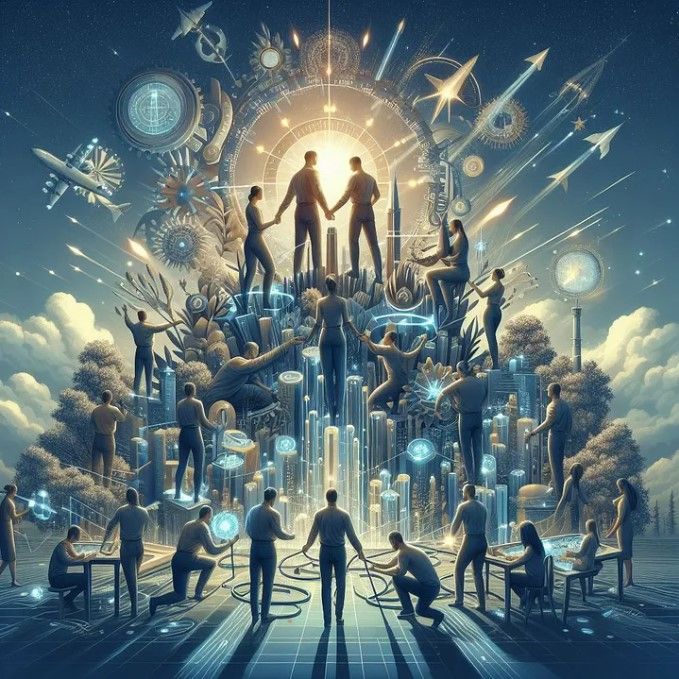

What is performance?
Before we embark on ‘managing’ performance, a task often embraced in companies and central to HR, it is imperative to grasp the essence of what we mean by performance.
Standard Definitions
The standard definitions I’ve encountered primarily revolve around measurement theories — already, in my opinion, a step too far, as they often sidestep more fundamental questions. Take, for example, a definition by Taris and Schaufeli (2018: 21): ‘Process performance refers to the actions or behaviors employees engage in to achieve the goals of their job, i.e., what they do at work. Conversely, outcome performance refers to the products or services that are produced and whether these are consistent with the overall strategic goals of the organization.’
While I’ve come across more on types of performance, such as the differentiation between in-role and extra-role performance (which I will delve into later), I find myself yearning for a more comprehensive understanding. This is somewhat peculiar because performance is, after all, the most frequently used dependent variable in industrial and organizational psychology and in OB.
A Critical View
In a German book examining the ‘invention of performance,’ the author, Nina Verheyen, provides a more critical lens by elucidating the social construction aspects inherent in the term ‘performance.’ ‘But there is no performance independent of human attributions and social contexts. Performance is always a matter of perspective. Should one assess the degree of effort or the resulting outcome? How can performances in economic, cultural, sporting, and scientific fields be compared? Who decides what counts as performance? Which perspective prevails?’
She questions the underlying ontology, pondering whether we can ever discuss individual performance since ‘the conventional understanding of performance consistently overlooks the supportive efforts of others. Ultimately, behind everything that people achieve, there are the efforts of many.’
Open Questions
Now, I seek more insights. To all HR researchers and managers out there, where can I find critical views on performance? Have you ever taken a step back to reflect on ‘what is performance’? Is performance for achieving clearly defined goals, or is it also for enabling new goals and redirecting wrongly specified goals? Is your understanding of performance more closely linked to the ideals of the sporting or cultural field? In redefining performance management, whose voices are heard, and whose voices are implemented in the evaluation of performance? How much does your performance practice drive your understanding of performance, rather than the other way around?”
Concluding Thoughts
As we navigate the intricate landscape of performance, let us not merely measure and manage but pause to question the very essence of what constitutes performance. The definitions and perspectives we adopt shape not only our evaluation processes but also the way we perceive individual and collective achievements.
In the pursuit of a comprehensive understanding, the critical lens offered by thinkers like Nina Verheyen reminds us that performance is deeply embedded in social constructions, always subject to interpretation and dependent on human attributions.
For HR researchers and managers alike, the journey into the heart of performance raises essential inquiries. Have we, in our pursuit of measurable outcomes, overlooked the nuanced interplay between effort, outcomes, and the supportive efforts of others? Does our understanding of performance align more with rigidly defined goals or the fluidity of enabling and redirecting objectives?
Reflecting on the symbiotic relationship between our performance practices and our understanding of performance itself is not just an academic exercise but a vital step toward fostering a more nuanced, and effective approach to navigating the world of achievements and aspirations.
23-12-2023



SEARCHING FOR A BOOK RECOMMENDATION
I feel that this is a topic, senior management really needs to understand well, but my problem is that nobody will read a book like Bourdieus "Masculine Domination". Hence I want the wisdom of the crowd: what would you recommend? It needs to have some depth (not an airport management book), be inspiring (and I would believe also compassionate so that it does not provoke only reactance), eye-opening and actionable...
To explain it better read the HBR 👇🏻 or also just this snippet here:
"Why do companies get caught up in illegal behavior, harassment, and toxic leadership? Our research identifies an underlying cause: what we call a “masculinity contest culture.” This kind of culture endorses winner-take-all competition, where winners demonstrate stereotypically masculine traits such as emotional toughness, physical stamina, and ruthlessness. It produces organizational dysfunction, as employees become hyper competitive to win."
https://hbr.org/2018/11/how-masculinity-contests-undermine-organizations-and-what-to-do-about-it
21-12-2023

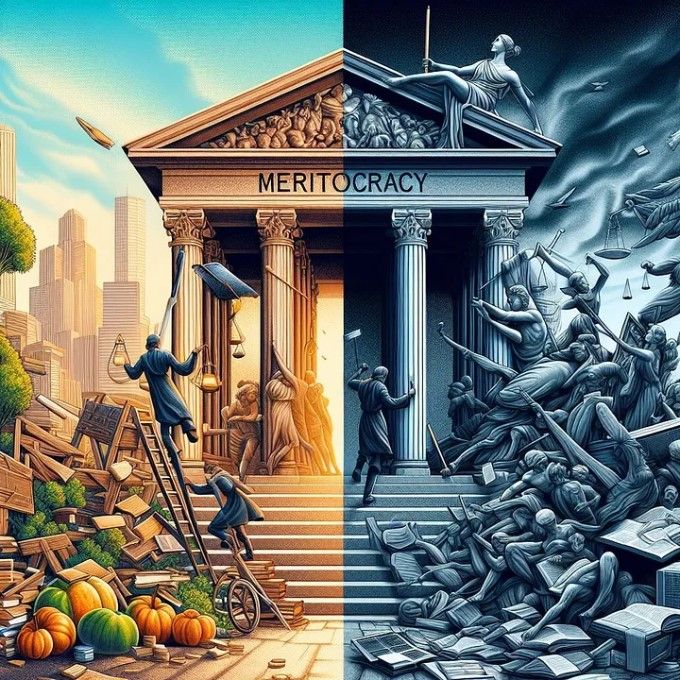

Problems with Meritocracy
In this #deepdive, @benjamin Sachs-Cobbe discusses the recently reemerging discussion on the problems with meritocracy, or rather with institutions claiming to be meritocratic.
And institution is said to be meritocratic if it rewards merit, while merit can mean a) possession of relevant qualification, b) potential for relevant contribution, and c) having put forth or being likely to put forth effort. Most conversations (and, in fact, also his treatise) when looking at societal institutions (the education system and markets) are preoccupied with the topic of merit = qualification.
What are the problems with merit=qualification?
From a social justice view a first problem is, that access to qualification, particularly in the US but also to lesser degrees in Europe, is biased — equality of opportunity is not instantiated. In this observation philosophers are joined by education and intelligence researchers who all plausibly show that socio-economic background is pulling the levers — not “innate capabilities” when it comes to access to high-quality education.
Second, the qualifications are rewarded by the market and hence are “taste-driven” — not re-evaluated by some political or ethical judgements. If we decide to pay more for investment banking services than for nursing, then this is a consumer decision (although it is more complicated than that). Hence, markets offer moral arbitrariness (at best) — but at worst are power-infested as much as our tastes can be manipulated by the powerful (not only via marketing but also via their command of the press, social media, etc.). So we might have applauded the garbage removers during COVID, but their work remains underpaid, under-appreciated, and some would even say “rightly so.”
If we look at practice, then we might say: meritocratic institutions are failing us in the sense that they cannot provide social justice nor factor different qualities of merit. What is seen as “especially worthy of merit” is more of an arbitrary rather than a considered claim.
So what to do?
1. Make our institutions less meritocratic: e.g., by broadening access to high-quality higher institutions and distributing non-market goods (e.g., social esteem) equally or based on different criteria.
2. Making it matter less that our institutions are “meritocratic”: e.g., improving the conditions of workers who do not have elite qualifications through a different tax system.
3. Detach the normative content (“merits are deserved”) from the descriptive content (merit is whatever our institutions define as merit): e.g., stop talking about “they deserve their rewards,” stop promoting the myth of social mobility, stop valorizing skilled over unskilled labor.
And yet what neither of these suggestions embraces is the lurking question in the background: do we need to change our breed of capitalism instead?
Sandel (2020:224) demands equality of condition (as a social justice criterion) and moral markets (drawing also on virtue ethics) and thereby is pleading for a system that allows everybody to
“develop and exercise their abilities in work that wins social esteem, sharing in a widely diffused culture of learning, and deliberating with their fellow citizens about public affairs.”
If I bring both of his insights together, I cannot help but wonder why we are not also talking about economic system alternatives — both within capitalism but maybe also beyond.
References
Sachs-Cobbe, B. (2023). Recent work on meritocracy. Analysis, 83(1), 171–185.
Sandel, Michael J. The tyranny of merit: What’s become of the common good?. Penguin UK, 2020.
14-11-2023

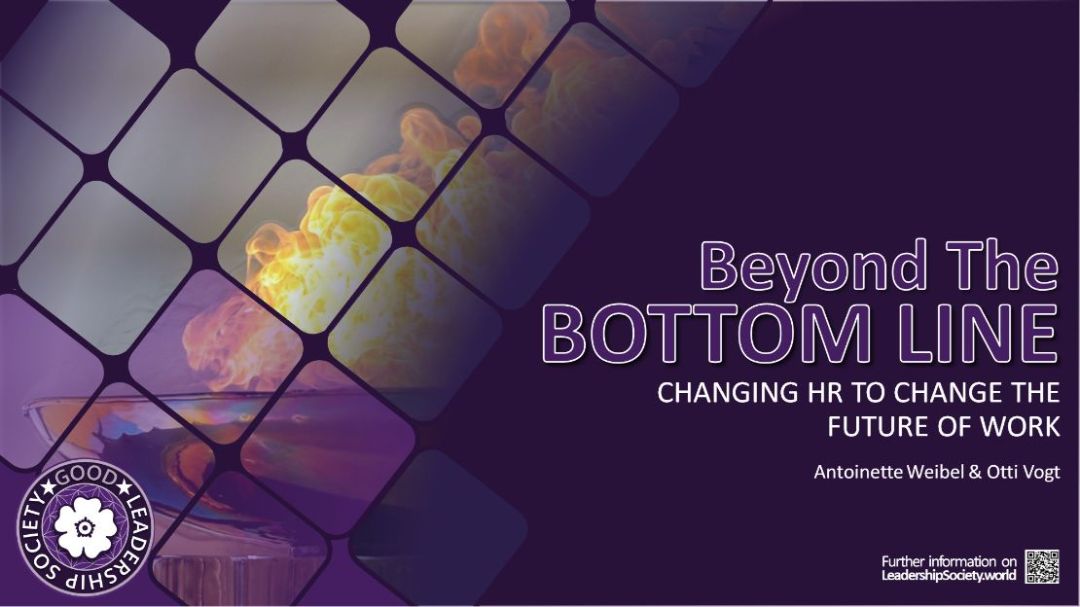

HR faces a pivotal moment in a world marked by complexity and suffering. To drive meaningful change, HR must confront its existential crisis, challenging the status quo and recognizing its complicity in perpetuating suffering within organizations. The path to a just future of work demands introspection, courage, and the commitment to prioritize ethics, humanism, and sustainability over efficiency, forging a coalition of the willing to shape systemic change within our economic system.
Preamble
In a world where complexity reigns, where capitalism's grip on society threatens democracy, and where suffering pervades our organizations, we find ourselves at a crossroads. In order to reshape the future of work, HR must heed the call of transformation, daring to challenge the status quo and driving change for good.
For far too long, HR has grappled with an existential crisis, losing sight of its purpose and its potential to be a force for positive change. We've professionalized, we've gathered brilliant minds, but the truth is, people are no longer truly at the heart of what we do. We've wandered in the wilderness of indifference, too often lost in a labyrinth of bureaucracy and technology.
The path to real change is not lined with quick fixes or superficial solutions. It's a winding road that demands introspection, courage, and radical honesty. HR must confront its own role in creating the suffering it purports to alleviate. We must stop to purchase indulgences in the form of DEI programs, or distract ourselves with the latest technological marvels to atone for our shortcomings.
If we fail to transform, the #futureofwork will be the exact mirroring of our troubled present. HR must take the reins of leadership and commit to subordinate effectiveness to #ethics, #humanism and #sustainability. This calls not only for new ways to imagine our organisations, but for a profound, inward journey. HR must shed the chains of dependency on those in power. It must once again nurture a dual loyalty, towards both the business and the ideals of its profession. It must unify practitioners across organizations in a shared quest for what is right and good.
It takes bravery to confront our deepest fears, and stand up for what is just. The bedrock of any good organization is good people, and HR must be willing to lead the way, so that others might follow. Leadership itself has grown morally mute, and herein might lie an opportunity for HR to show its metal and step into the void. A new HR has the potential to be the vanguard of a coalition of the willing, fostering systemic change within an unjust economic system.
The clock is ticking and it's time to decide which road you are willing to travel. Will you perpetuate the unhappiness of the past, with more of the same but new fancy clothes? Or will you take the courageous leap toward a better world, one where work exudes dignity, the economy serves humanity, and our organizations shine as beacons of a good life for all?
Peter Senge once spoke of leadership as a community's ability to shape its future. Within the HR community, let the spark of unwavering determination to craft a better world of work grow! Let our actions be the testament to our commitment to brighter, more humane organisations. That famous future, the future of work, is already upon us. Friends, let us not squander it!
Preamble
In a world where complexity reigns, where capitalism's grip on society threatens democracy, and where suffering pervades our organizations, we find ourselves at a crossroads. In order to reshape the future of work, HR must heed the call of transformation, daring to challenge the status quo and driving change for good.
For far too long, HR has grappled with an existential crisis, losing sight of its purpose and its potential to be a force for positive change. We've professionalized, we've gathered brilliant minds, but the truth is, people are no longer truly at the heart of what we do. We've wandered in the wilderness of indifference, too often lost in a labyrinth of bureaucracy and technology.
The path to real change is not lined with quick fixes or superficial solutions. It's a winding road that demands introspection, courage, and radical honesty. HR must confront its own role in creating the suffering it purports to alleviate. We must stop to purchase indulgences in the form of DEI programs, or distract ourselves with the latest technological marvels to atone for our shortcomings.
If we fail to transform, the #futureofwork will be the exact mirroring of our troubled present. HR must take the reins of leadership and commit to subordinate effectiveness to #ethics, #humanism and #sustainability. This calls not only for new ways to imagine our organisations, but for a profound, inward journey. HR must shed the chains of dependency on those in power. It must once again nurture a dual loyalty, towards both the business and the ideals of its profession. It must unify practitioners across organizations in a shared quest for what is right and good.
It takes bravery to confront our deepest fears, and stand up for what is just. The bedrock of any good organization is good people, and HR must be willing to lead the way, so that others might follow. Leadership itself has grown morally mute, and herein might lie an opportunity for HR to show its metal and step into the void. A new HR has the potential to be the vanguard of a coalition of the willing, fostering systemic change within an unjust economic system.
The clock is ticking and it's time to decide which road you are willing to travel. Will you perpetuate the unhappiness of the past, with more of the same but new fancy clothes? Or will you take the courageous leap toward a better world, one where work exudes dignity, the economy serves humanity, and our organizations shine as beacons of a good life for all?
Peter Senge once spoke of leadership as a community's ability to shape its future. Within the HR community, let the spark of unwavering determination to craft a better world of work grow! Let our actions be the testament to our commitment to brighter, more humane organisations. That famous future, the future of work, is already upon us. Friends, let us not squander it!
Popular articles in the KnowledgeHub: Good Society
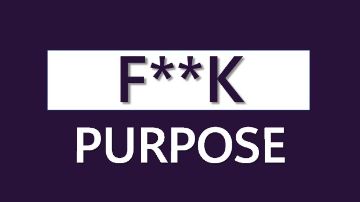
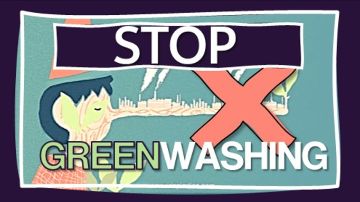

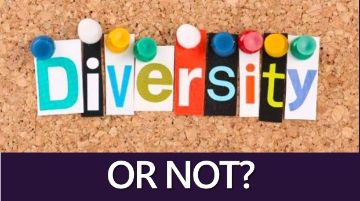
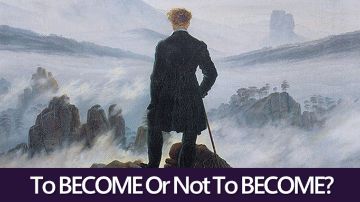
 .
.